












Mr. Andrew Lowman
Mr. Ryan Haynes
Principal Director of US Academic / Personal Counseling
extension: 213 extension: 224
email: lowmana@tas.edu.tw
Dr. Evelyn Chen
email: haynesr@tas.edu.tw
Ms. Melanie Brennand Hamre
Associate Principal Director of US College Counseling
extension: 214
email: chene@tas.edu.tw
Dr. Jill Fagen
extension: 228
email: hamrem@tas.edu.tw
Ms. Meagan Frazier
Associate Principal IB/AP Coordinator
extension: 214
email: fagenj@tas.edu.tw
extension: 222
email: frazierm@tas.edu.tw
Taipei American School’s mission is to cultivate an enduring commitment to learning, personal well-being, and service. We provide a broad American-based education with a global perspective that develops students of character who are committed to making the world a better place.
Students select courses in consultation with their teachers, academic and personal counselors, and parents. Students take between six (minimum) and eight (maximum) courses at a time. Grade 11 and grade 12 students may take five courses if they have three or more AP or IB courses, or if they have four core courses in their schedule.
TAS students must complete 22 credits earned in grades 9 –12. Please see the 4 Year Program Planning form in the back of this catalog to help guide the decision-making process.
The upper school schedule is on a 2-day cycle and alternates between an A day and a B day. There are five 80 minute periods in a school day and a daily flex period during which advisory, class gatherings, and club meetings are held. Please see the sample school schedule below.
It is important that students consider the TAS upper school attendance policy when making decisions about their course load. A student must have a satisfactory record of attendance in order to receive credit for each course. The guideline for satisfactory attendance is a minimum attendance of 85% (a maximum of six absences per class per semester). Students who fail to meet the minimum attendance requirement may lose credit for the semester, regardless of their grade point average. Each such case will be reviewed, and a decision will be made by the upper school administration.
Courses in the catalog are offered based on demand after initial course sign ups each spring. At the beginning of the
school year in August, students can contact their counselor and request to drop and/or add courses the first two weeks of the semester. Changes can only be made during this time based on room in course sections and availability in the student’s schedule. After the add/drop period is over, course changes can only be initiated by a teacher, counselor, or administrator.
Although a wide variety of courses are available, students are encouraged to look closely at the academic expectations and homework load for each course in order to plan for a balanced schedule, including consideration of maintaining study across core subject areas. Each course description includes a statement about how much time students can expect to spend on homework. The following is a guideline for average number of minutes per class meeting in the course of a week.
Light 0 – 30 minutes
Moderate 30 – 60 minutes
Heavy 60 – 90 minutes
Note that these are average amounts and may vary. Some students will be able to complete an assignment in 30 minutes, while the same assignment may take another student 45 minutes.
AP and IB courses usually require more homework than other courses. IB classes usually require projects that are done in addition to the daily class assignments.
We encourage students to use the Balance of Life Worksheet on the next page to help them think through their full student experience. There’s more to the life of a student beyond class! We encourage students and families to think through extracurricular activities, family commitments, and other pursuits outside of school. Make adjustments to establish balance and help ensure students have time to take good care of themselves – eat well, exercise, and sleep well.
Filling out this worksheet can give you a realistic view of your planned 2023-2024 schedule of class work, co-curricular involvements, study, home responsibilities, exercise, and sleep. Study the overall schedule to anticipate problems, and keep in mind that students must have a satisfactory record of attendance to receieve credit for courses they are signed up for (please see attendance policy on the opposite page). Make adjustments to establish balance and to protect against over-commitment that could negatively affect your health and academic success.
Each course description includes a statement about the amount of time students can expect to spend on homework. The following is a guideline for average number of minutes per class meeting during the course of a week.
Light 0 – 30 minutes
Moderate 30 – 60 minutes
Heavy 60 – 90 minutes
Note that these are average amounts and may vary. Some students will be able to complete an assignment in 30 minutes, while the same assignment may take another student 90 minutes.
AP and IB courses usually require more homework than other courses. IB classes usually require projects that are done in addition to the “daily” class assignments.
Things to Consider & Reflection
What are you doing for self-care?
(Exercise, healthy eating, making time for hobbies, etc.)
How much sleep are you getting and is it enough?
How do you organize your weekends?
Do you get to spend quality time with people you care about?
Four years of upper school attendance are required with a minimum of 22 credits to be earned in grades 9 – 12. Credits are awarded on a semester basis. The required 22 credits must include the following:


English
Grade 9: English 9 or Honors English 9
Grade 10: English 10 or Honors English 10
Grade 11 and 12: Full-year courses each year.
4 credits
Mathematics
3 Credits
Computer Science & Robotics
3 credits
Note: Journalism and the Writing Workshop & Seminar do NOT fulfill this requirement.
Public Speaking
1 credit
Students may satisfy the requirement by taking: Public Speaking, Debate, and Performance, International Relations/Honors International Relations/IB Global Politics, or AP Research; or, by taking 2 years of Theatre classes. IB Diploma students may fulfill the requirement automatically through TOK Year 2
Note that students may NOT satisfy both the public speaking and the performing & visual arts requirements with the same course.
History & Social Studies
Grade 9: History of Asia
3 credits
Grade 10: Modern World History or AP World History
Grade 11: United States History, AP United States History, IBHL 1: US History, and History of Minorities in America courses.
0.5 credit
All courses offered in the Computer Science and Robotics Department satisfy the graduation requirement.
Science
Grade 9: Physics
Grade 10: Chemistry
Grade 11: Biology
Full year course in each required for graduation
Performing Arts or Visual Arts
3 credits
1 credit
This requirement can be fulfilled by taking visual arts and/ or performing arts courses that total 1 credit.
Note that students may NOT satisfy both the public speaking and the performing & visual arts requirements with the same course.
World Languages or Greek and Latin
3rd year proficiency
Health and Physical Education
Required for ninth and tenth grade students
2 credits
The balance of the required credits will be made up of elective courses.
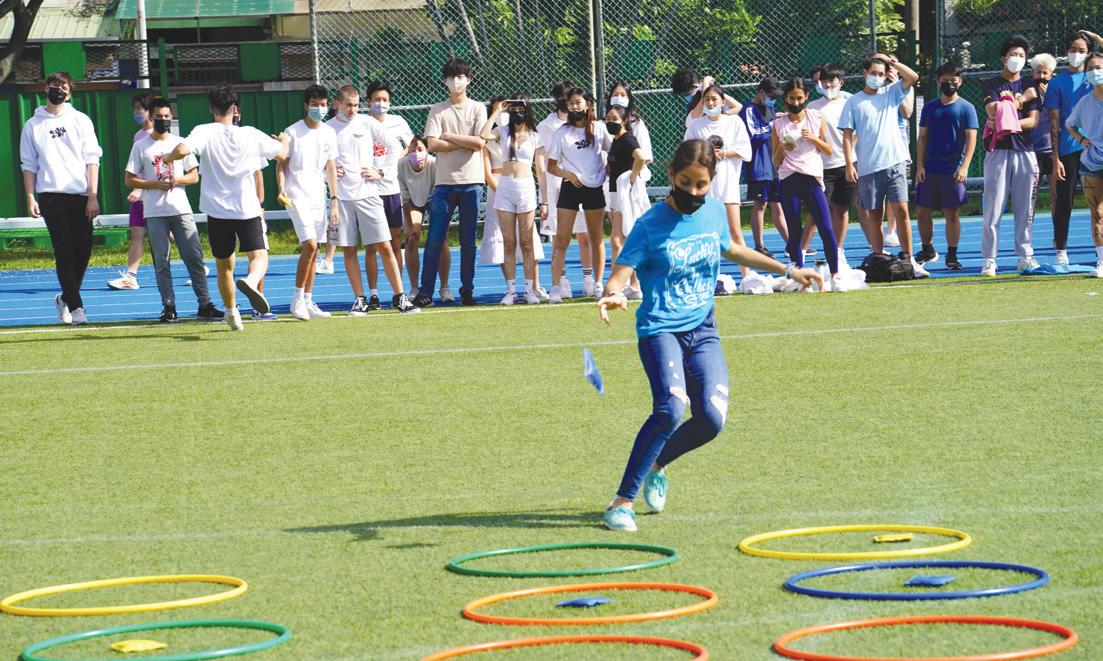
Taipei American School offers more than thirty Advanced Placement courses in a variety of subject areas. An approved curriculum is followed, and a standardized external examination prepared and scored by The College Board is administered by TAS in May of each year. College websites usually contain an accurate description of an institution’s policy on placement and what academic credit, if any, is awarded for an Advanced Placement examination score. Additionally, only students who are enrolled in the AP course may sit the AP exam at TAS.
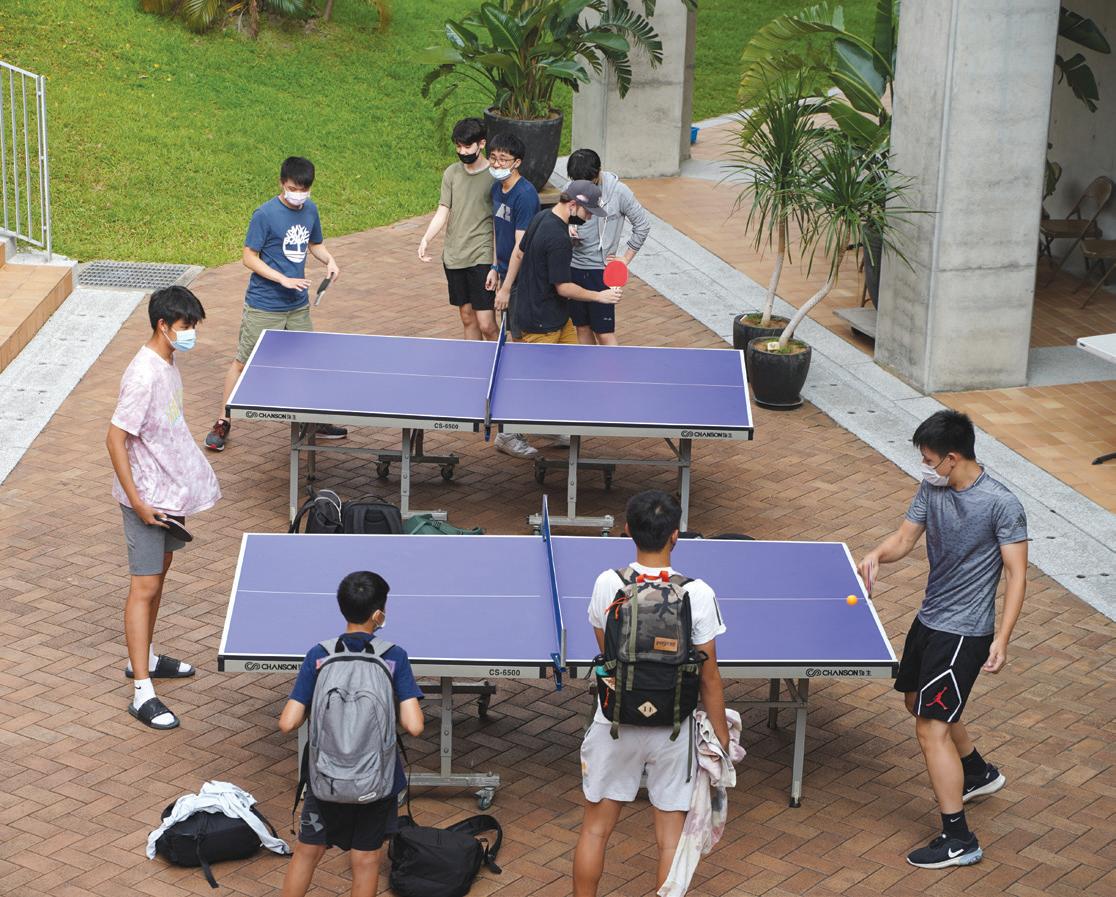
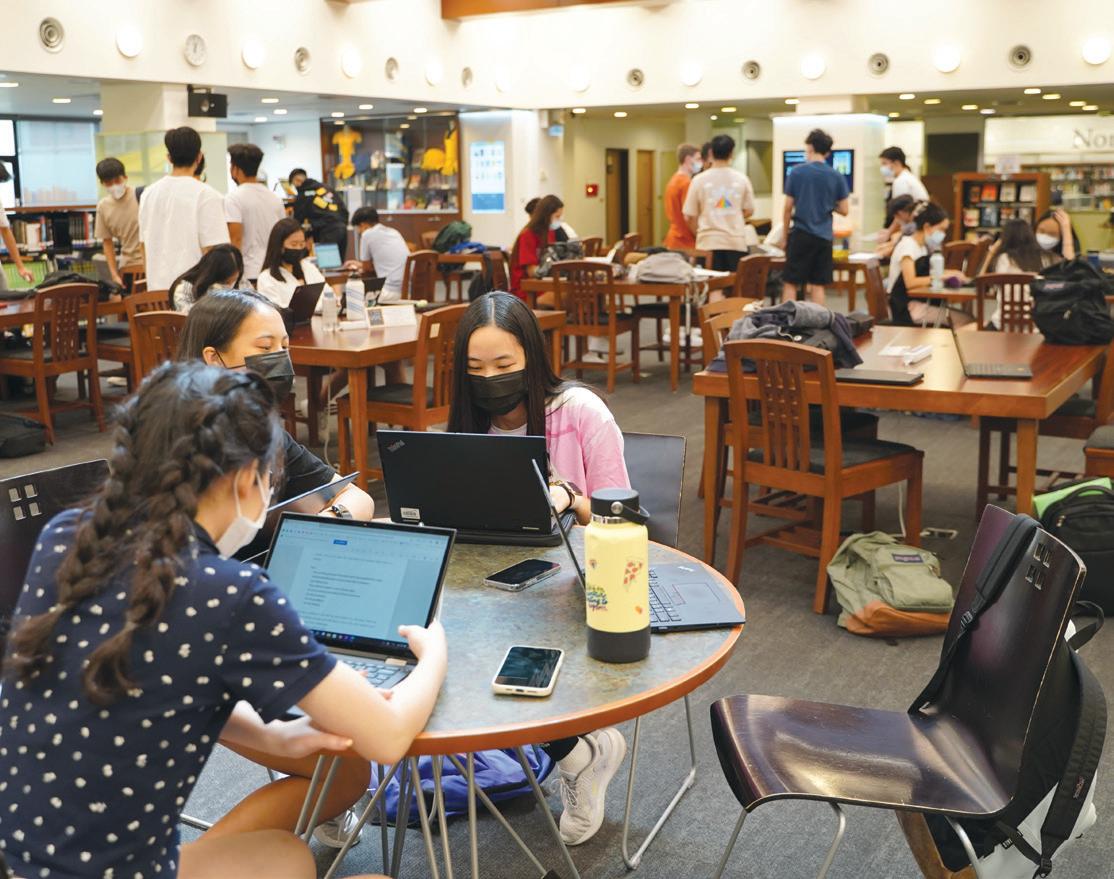
The AP Capstone Certificate is comprised of two courses, AP Seminar and AP Research, that are designed to complement and enhance discipline specific study in other AP courses. Students who complete the two AP Capstone courses (AP Seminar and AP Research) and earn a score of 3 or higher on four additional AP exams will earn the Capstone Diploma.
History & Social Studies
United States History
Economics
European History
World History: Modern
Art History
Psychology
US Government & Politics/Public Policy
Social Sciences
Mathematics
English
Science
Computer Science & Robotics
World Languages
Greek and Latin
Visual Arts
All students who take AP courses must sit the AP exam in order to receive AP credit and weighted grade.
AP Capstone Diploma TM
Students earn a 3 or higher in both AP Capstone courses and on 4 additional AP exams of their choosing.
Seminar
Research
Statistics
Calculus AB
Calculus BC
English Literature & Composition
English Language & Composition
Chemistry
Physics 1
Physics 2
Physics C (Mechanics, E & M)
Environmental Science
Biology
Computer Science A
Spanish Language & Culture
Spanish Literature & Culture
Chinese Language & Culture
Japanese Language & Culture
Latin
Art History
Drawing
2D Art & Design
3D Art & Design
Music Theory
AP SEMINAR (Year 1)
Team Project & Presentation
Individual Research-Based Essay & Presentation
End-of-Course Exam
AP RESEARCH (Year 2)
Academic Paper
Presentation & Oral Defense
4 AP COURSES & EXAMS
(Taken at any point throughout high school)
AP Seminar and Research
Certificate TM
Students earn a 3 or higher in both AP Capstone courses but not on the 4 additional AP exams will receive certificates.
The International Baccalaureate program is a two-year pre-university course of study that culminates with the IB Diploma. The awarding of an IB Diploma is contingent upon successful examination results in six subjects – three at Higher Level, and three at Standard Level. The six subjects must include English, a second language, individuals and societies, experimental science, mathematics, plus an additional arts, language, science, or social studies course.
IB Diploma candidates must also satisfactorily complete the Diploma Core which consists of Theory of Knowledge (a course which unifies and interconnects the other six courses through a philosophical perspective), write an Extended Essay, and participate in CAS (Creativity, Activity, and Service) activities.
All students who wish to pursue the IB diploma may do so, and will be advised on appropriate programs of study by the grade level academic counselor and the IB coordinator.
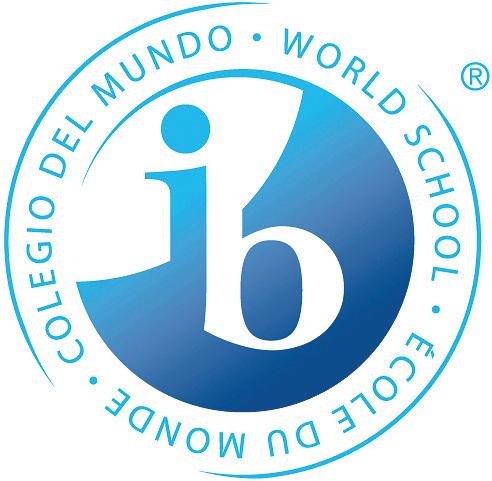
In all IB courses, a prescribed curriculum is followed, and a standardized external examination prepared by the IB is administered by TAS in May of each year. College websites usually contain an accurate description of an institution’s policy on placement and what academic credit, if any, is awarded for an IB examination score and/or for completing the DP. Additionally, only students who are enrolled in the IB course may sit the IB exam at TAS.
Students may elect to enroll in individual IB courses without pursuing the full diploma. Successful completion of the course, and the corresponding IB exam, will result in the awarding of an IB certificate.
Group 1 Studies in Language & Literature
All students who take IB courses must sit the external IB exam in order to receive IB credit and weighted grade.
Group 2 Language
Acquisition
English Chinese
Group 3
Individual and Societies
Group 4
Experimental Sciences
Chinese Japanese Spanish Greek and Latin
Chemistry Biology
Sports, Exercise & Health Science
Extended Essay
Theory of Knowledge
Creativity, Activity, Service
World Religions
Psychology
History
Global Politics
Applications & Interpretation
Analysis & Approaches
Group 5
Mathematics
Dance Theater
Visual Arts
Film Studies
Music
Group 6 the Arts
Group 1 Studies in Languages & Literature
(Literature Based)
Group 2 Language Acquisition (Communications Based)
English Language & Literature SL, HL
English Literature HL
Chinese A Language & Literature SL, HL

Spanish B: SL, HL, AB Initio
Japanese B: SL, AB Initio
Chinese B: SL, HL, AB Initio Greek and Latin: SL, HL
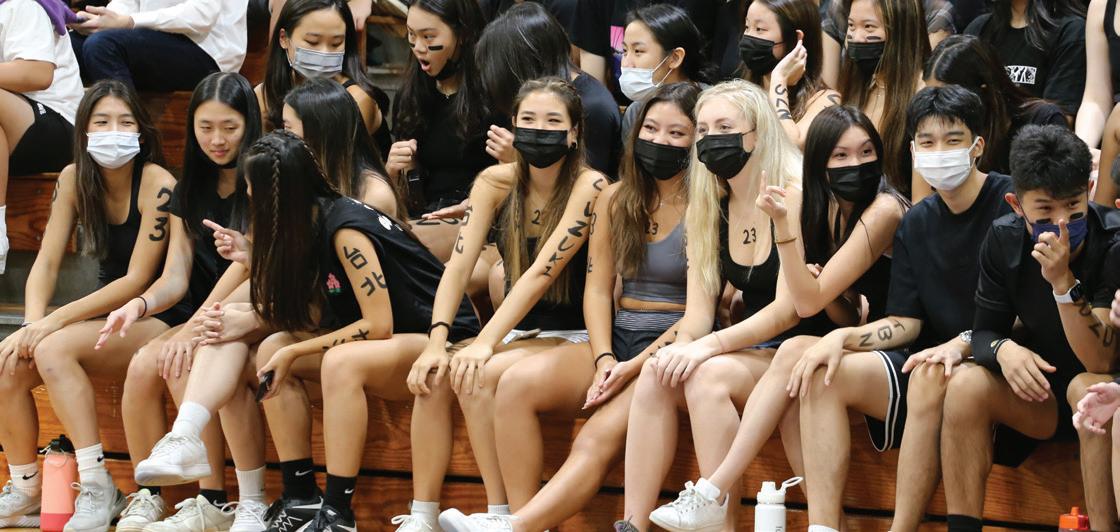
Group 3 Individuals and Society
History SL, HL Global Politics SL, HL Psychology SL, HL World Religions SL
Group 4 Experimental Sciences
Group 5 Mathematics
Group 6 the Arts
(Diploma Candidates must take either a Group 6 or a second subject from Groups 2, 3, or 4)
Biology SL, HL Chemistry SL, HL Sports, Exercise & Health Science SL
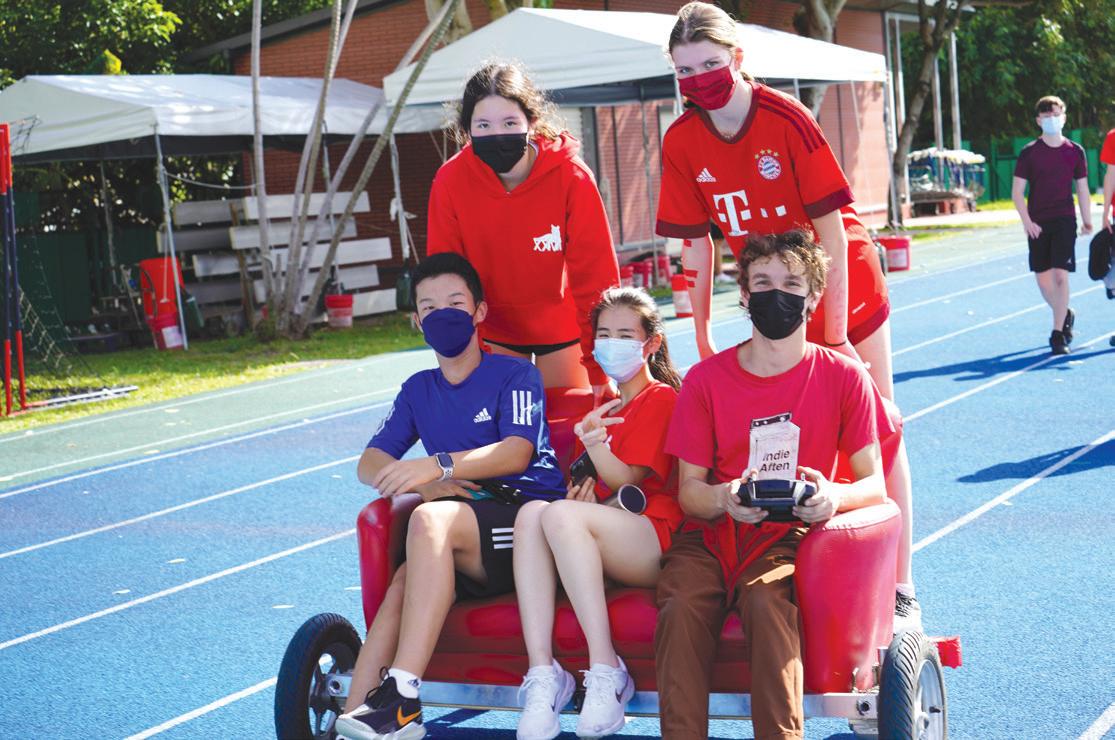

Math: Applications & Interpretation SL, HL Math: Analysis & Approaches SL, HL
Dance SL, HL Theater SL, HL Visual Art SL, HL Film Studies SL, HL Music SL, HL
Theory of Knowledge (Only available to diploma students in Gr. 11 and 12)
* We also have additional course offerings available for online instruction. Students who want to learn more should speak with the IB/AP Coordinator.
English is required in each of the four years in the upper school at Taipei American School. Content includes instruction in analytical and expressive writing, the writing process (prewriting, drafting, revising, and proofreading), in-class writing, reading and analyzing literature, discussing ideas in groups, delivering oral presentations, and applying correct vocabulary, syntax, and grammar.
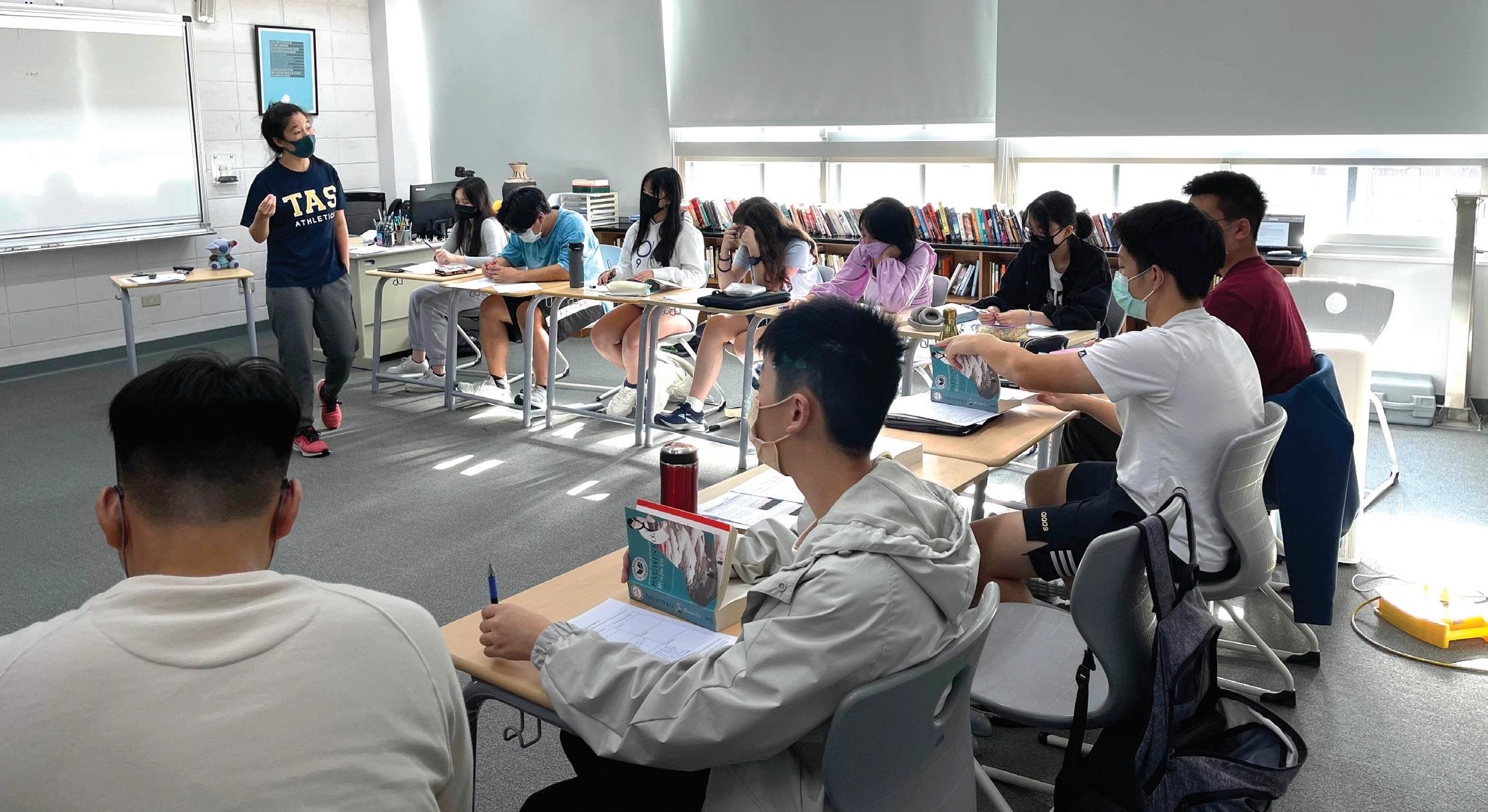
As students in grades 9 and 10 study literature, they will focus on genre, the varied modes of literary expression. A key goal in these grades is for students to examine how literary form influences their interpretations of the works they read. Thus, the study of genre is intended to provide students with the tools necessary to enhance their understanding of and pleasure in literature so that they may become life-long readers and life-long learners. Students are required to purchase personal copies of books in literature courses.
Required
Duration: 1 year
Credit: 1
Grade: 9
Homework: Moderate
English 9 is designed to generate critical analysis about the short story, novel, drama, poetry and nonfiction, and about the student’s own writing, while investigating the theme of identity. Identity, leadership, and the development of one’s character form the basis for English 9 literary selections. Students will work to develop effective study skills, enrich their vocabulary, gain proficiency in grammar, generate probing questions, develop research skills, learn and apply literary terms, and improve their writing. Students will receive a series of in-class and process-driven writing assignments. Also, students will have the opportunity to share their ideas
and perceptions through small and large group discussions and through oral presentations. The course work culminates in semester exams in which students analyze the characters and issues that they have encountered in their reading.
Texts may include: Coelho, The Alchemist; Ribay, Patron Saints of Nothing; Golding, Lord of the Flies; Gratz, Refugee; Of Mice and Men, Steinbeck; Shakespeare, Romeo and Juliet; Card, Ender’s Game; short non-fiction narratives; a teacher-selected unit on poetry.
Required Duration: 1 year
Credit: 1
Grade: 9
Homework: Heavy
Prerequisite: Teacher recommendation is required.
Through the study of personal essays, poetry, drama, and novels, Honors English 9 explores what it means to come of age, to have a voice, and to have agency. We ask, and attempt to answer, what it means to grow up and to read the world critically. As a foundational English course, Honors English 9 focuses on analytical writing, reading, and speaking. Close reading and passage analysis constitute the main focus for the fall semester; in the spring, students build on those skills to tackle more complex texts like Shakespeare’s Romeo and Juliet. Class discussions and student-run seminars are important components of the courses. Assessments take the form of timed writing, processed essays, and creative projects, providing students with a variety of ways to demonstrate their learning. Honors English 9 requires maturity and initiative; homework load may be significant due to the difficulty of the texts assigned.
Texts may include the following: Homer/Wilson, The Odyssey; Shakespeare, Romeo and Juliet; Cisneros, The House on Mango Street; selection of non-fiction, poetry, and short stories.
9
10
Honors Asian Literature; American Literature; Honors American Literature; World Literature; Honors World Literature; Literature, Law & Justice
Gr. 11, 12
Required
Duration: 1 year
Credit: 1
Grade: 10
Homework: Moderate
English 10 develops essential critical thinking and language skills. The course is built upon the premise that language has power, and students will analyze how language is used as an effective and powerful tool in three important areas: reading, writing, and speaking. Literature will focus on characters and narrators that are forced to face personal or sociopolitical issues. Students will express their ideas in argument-driven, analytic essays as well as class discussions.
Texts may include: Orwell, Animal Farm; Sophocles, Oedipus Rex; Shakespeare, Macbeth; Douglass, The Narrative of the Life of Frederick Douglass; selection of Gothic short stories and poetry.
Required
Duration: 1 year
Credit: 1
Grade: 10
Homework: Heavy
Prerequisite: Teacher recommendation is required.
Honors English 10 is a foundational course that builds on the students’ prior skillsets while also preparing them for future upper level courses. As such, emphasis is placed on argumentation and discernment in choosing evidence not only for written assessments but also oral presentations. Critical reading literacy in a variety of genres is a major component of the course to prepare students to showcase mastery of synthesizing higher order ideas across texts and disciplines. Students should also be able to demonstrate greater independent initiative when handling texts and when expressing ideas in class discussions. Texts for the Honors English 10 course, organized by genre, explore the extent to which language can be used in powerful ways to persuade us, to move us, and to aid us in instituting social change.
Texts may include: Imani, Read This To Get Smarter; Cho, Kim Jiyoung, Born 1982; Satrapi, Persepolis; Orwell, 1984; Hamid, The Reluctant Fundamentalist; Shakespeare, Othello; Alderman, The Power; Cho, Kim Jiyoung, Born 1982; Selected Poetry and Prose (provided by teacher)
Electives: these courses are supplementary and do not count for “Core” English credit.
Journalism 1 Gr. 9-12; Honors Journalism 2,3 & 4 Gr. 10-12
Creative Writing Workshop 1 & 2; Honors Creative Writing Workshop 1 & 2
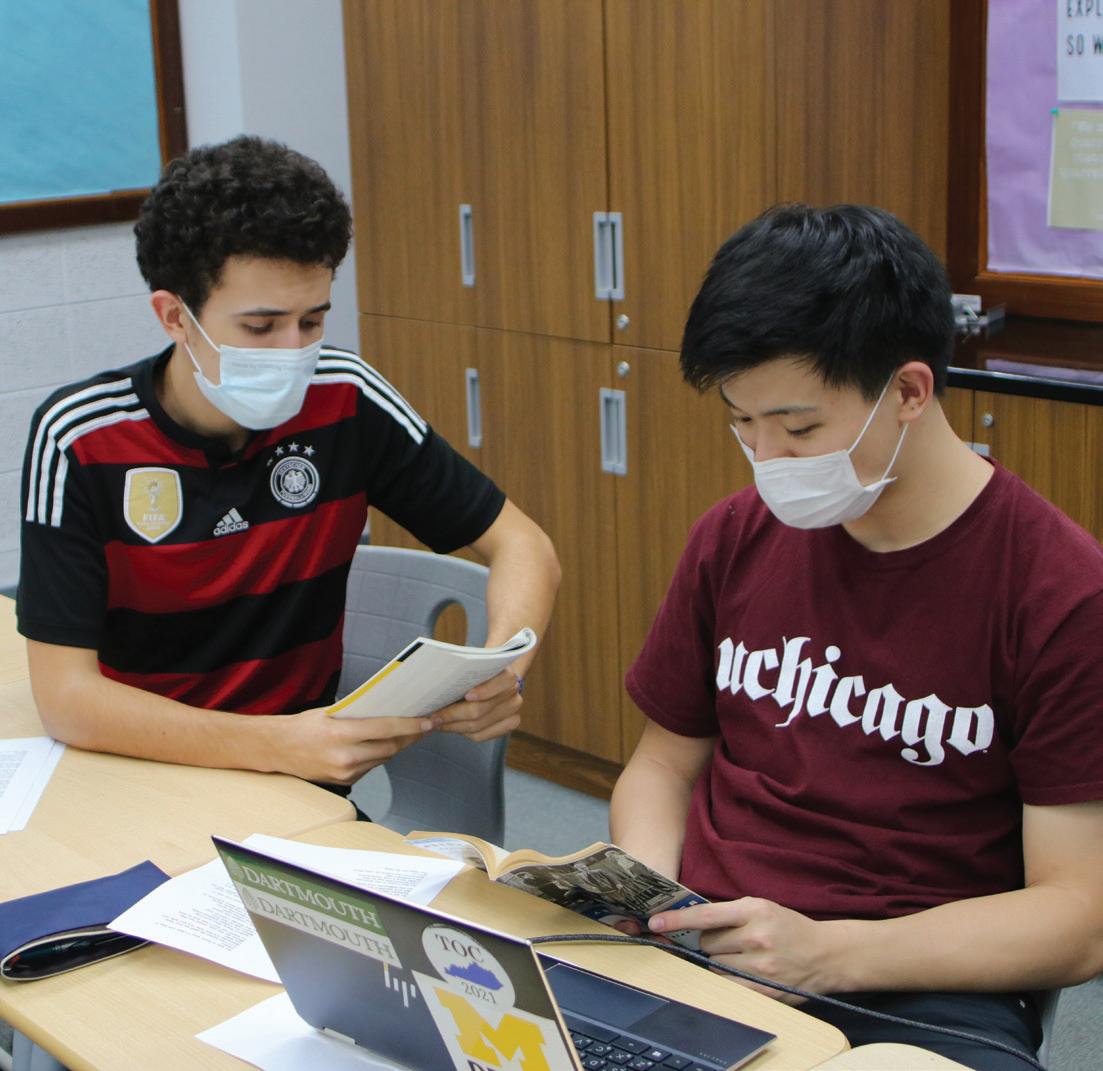
Elective
Duration: 1 year
Credit: 1
Grade: 11-12
Homework: Heavy
Prerequisite: Teacher recommendation is required.
In this course students will have the opportunity to engage in a close study of a variety of nonfiction works. Students in AP English Language will become critical readers and skilled writers who are able to identify and explicate an author’s purpose and use of rhetorical strategies. One of the many goals of this college-level course is to prepare students to write effectively and compellingly about topics across all disciplines, a practice in which they will regularly engage, in both the university and professional contexts. In May, all students will take the AP Language and Composition Exam.
Texts may include: Thoreau, Walden; Alexander, The New Jim Crow; McGhee, The Sum of Us; selected essays and speeches.
Elective
Duration: 1 year
Credit: 1
Grade: 12
Homework: Heavy
Prerequisite: Teacher recommendation and successful completion of AP English Language & Composition or permission of the Department Chair.
This course is a university-level seminar that explores important themes in literature in an intertextual context. Reading, critical thinking, seminar discussion, and writing are the essential elements of the course, all of which will be rigorously assessed. The reading load, which is typically in excess of 40 pages a night, is significantly heavier than other courses with an Honors weighting, and is assessed via daily closed-book quizzes. Major assessments almost exclusively take the form of timed in-class essays. In addition to course texts, readings will also include selections from works of critical theory. The class is for mature readers with open minds who have already demonstrated excellence in writing and critical thinking and who are eager to challenge themselves further. Students should be aware that the works studied in the course will frequently engage with emotionally challenging and politically controversial topics.
Texts may include: Brontë, Wuthering Heights; Conrad, Heart of Darkness; Achebe, Things Fall Apart; Woolf, Mrs. Dalloway; Wilde, The Importance of Being Earnest; Miller, Death of a Salesman; Edson, W;t; Desai, The Inheritance of Loss; Brontë, Jane Eyre; Nottage, Sweat; Hwang, M. Butterfly;
IBHL ENGLISH
IBHL
Elective
Duration: 2 years
Credit: 2
Grade: 11 & 12
Homework: Heavy
Prerequisite: Teacher recommendation is required.
IBHL English Literature is primarily a rigorous pre-university course in literature. It is designed for students who intend to pursue a course of studies at university that places a heavy emphasis on critical reading and analytical writing. As the International Baccalaureate Organization notes, the study of literature “enables an exploration of one of the more enduring fields of human creativity and artistic ingenuity, and provides immense opportunities for encouraging independent, original, critical and clear thinking." It also promotes a healthy respect for the imagination and a perceptive approach to the understanding and interpretation of literary works. The discussion of literature is itself an art which requires the clear expression of ideas both orally and in writing. The Language A1 program encourages students to see literary works as products of art and their authors as craftsmen whose methods of production can be analyzed in a variety of ways and on a number of levels. This is achieved through the emphasis placed on exploring the means used by different authors to convey their subjects in the works studied. It is further reinforced by the comparative framework emphasized for the study of these works in all parts of the program. The flexibility of the program allows teachers to choose challenging works from their own sources to suit the particular needs and interests of their students. During the course of two years, students will be assessed in a variety of written and oral formats.
Texts may include: Wilde, The Importance of Being Earnest; Garcia Marquez, Chronicle of a Death Foretold; O’ Neill; Long Day’s Journey into Night; Schlink, The Reader; Dillard, Teaching a Stone to Talk; selected poems by Emily Dickinson and other poets.
IBHL ENGLISH LANGUAGE & LITERATURE 1 (UENG17)
IBHL ENGLISH LANGUAGE & LITERATURE 2 (UENG27)
IBSL ENGLISH LANGUAGE & LITERATURE 1 (UENG16)
IBSL ENGLISH LANGUAGE & LITERATURE 2 (UENG26)
Elective
Duration: 2 years
Credit: 2
Grades: 11 & 12
Homework: Heavy
Prerequisites: Teacher recommendation is required. Students will select either the IBHL or IBSL level of the course for both years.
The course aims for students to develop an understanding of the role of language in the world and to develop skills of textual analysis of both literary (poetry, drama, novels, and short stories) and non-literary texts (essays, cartoons, advertisements, infographics, profiles, speeches, articles, films, music videos, social media posts, etc.), including texts in translation. Students will be encouraged to question the meaning and aesthetic dimensions generated by language and texts based on content and context. Students will also explore how language and texts interact with each other across time and cultures. The course will examine the ways in which authors use formal and stylistic elements to create meaning in a text and consider how that meaning is shaped by circumstances of production and reception. Students will create presentations, projects, and essays in response to texts to demonstrate their critical awareness of how texts and their associated visual and audio elements work together to influence the reader/audience. Higher Level (HL) students will submit an additional written assessment to the IBO and undertake at least one extra unit of study of literary and/or non-literary texts.
Texts may include: Duffy, The World’s Wife; Euripides, Medea; Adichie, The Thing Around Your Neck; Ibsen, Hedda Gabler; George Monbiot’s essays; Hawthorne, The Scarlet Letter; Kendall, Hood Feminism; Saadawi, Woman at Point Zero

Elective
Duration: 1 year
Credit: 1
Grade: 11-12
Homework: Moderate
Students will apply the reading and writing skills developed in the first two years of the English program to a representative study of American literature. The course syllabus will emphasize works that have earned a place in the literary tradition of the United States, while also including more recent writers whose works are expanding and redefining the American literary tradition. Instruction will be designed to help students respond to increasingly complex and challenging literary experiences. The composition component of the curriculum will include a heavy emphasis on journaling and practice in a wide range of writing modes. Work in practical grammar, academic writing, style (MLA), and vocabulary development will continue.

Texts may include: Fitzgerald, The Great Gatsby; Otsuka, When the Emperor Was Divine; Melville, Moby Dick; Bradbury, The Illustrated Man; Grann, Killers of the Flower Moon; Coates, Between the World and Me.
Elective
Duration: 1 year
Credit: 1
Grade: 11-12
Homework: Moderate
World Literature explores the interplay of class, gender, and race across cultures and time. Through the study of great works of Western and non-Western literature, students will gain greater perspective on their unique place within this rapidly globalizing world. This class promotes an understanding of the works in their cultural/historical contexts as well as the enduring values that unite humanity. This course is designed to challenge students as critical readers, writers, and thinkers.
Texts may include: Euripides, Medea; Su, Raise the Red Lantern; Esquivel, Like Water for Chocolate; Shakespeare, Othello; selected essays, poems and short stories.
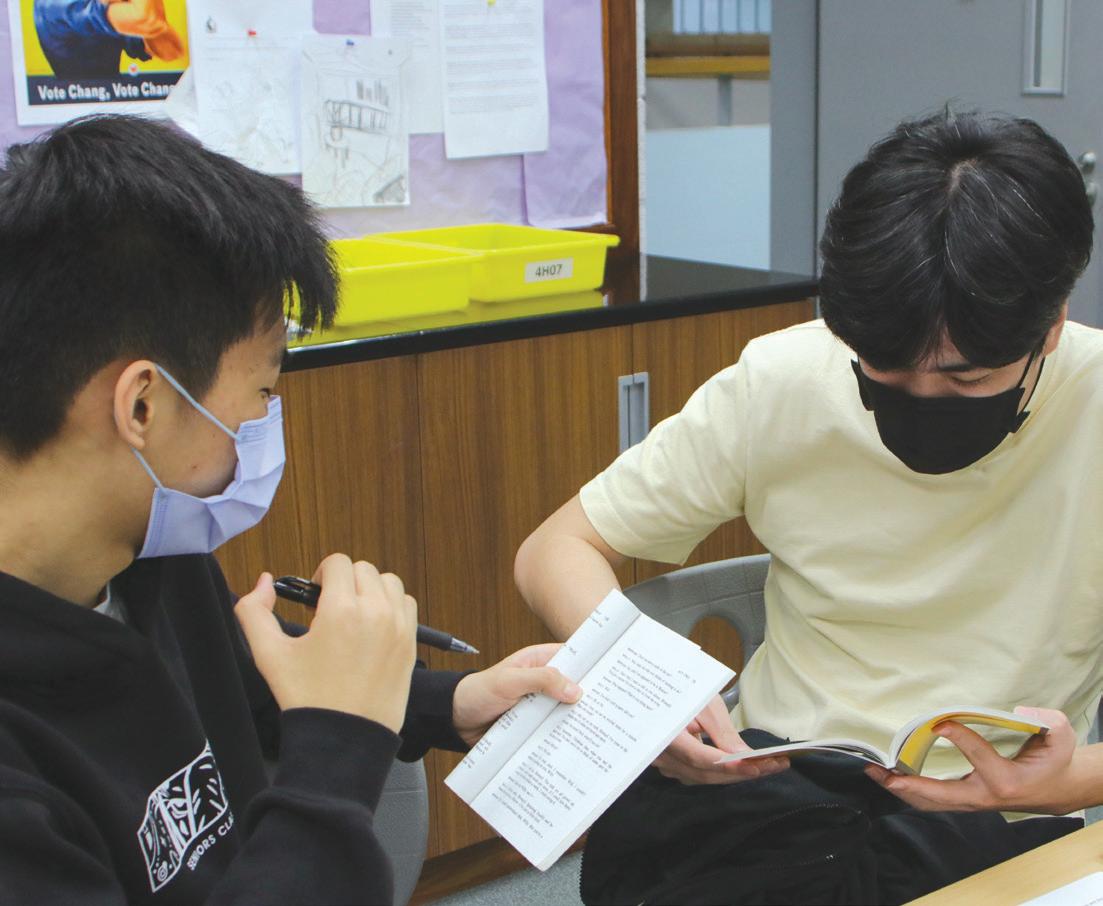
Elective
Duration: 1 year
Credit: 1
Grade: 11-12
Homework: Moderate
What lessons can be learned about law and justice, vengeance and mercy from great literature? How does literature depict the legal and judicial system? This course focuses on the execution of justice within literature. We will seek to discover the ways in which literature enhances our understanding of morals, ethics, and justice. Participants will analyze legal themes in literary and visual texts to better understand the tension between the laws we follow and our own code of ethics. Participants will also engage in a variety of immersive activities such as debates, mock trials, and reader’s theater. The class will be formatted around open-ended discussions, case examination, as well as reflective and analytical writing. Students will attend one-on-one writing conferences with the instructor to develop their analytical and argumentative writing skills. Course work culminates in an investigation essay where students are tasked with synthesizing a number of texts on a topic of their choice.
Texts may include: Camus, The Stranger; Erdrich, The Round House; Headley, Beowulf: A New Translation; Yoo, From a Whisper to a Rallying Cry; Gaines, A Lesson Before Dying; Christie, And Then There Were None; teacher-selected cases and short stories.
I am what I read. All the books, all the papers, all the stories.
Walter Dean Myers
Elective
Duration: 1 year
Credit: 1
Grade: 11-12
Homework: Heavy
Prerequisite: Teacher recommendation is required.
Honors American Literature will require a rigorous study of a representative sample of American literature with an emphasis on developing students’ critical reading and analytical writing skills. Students are expected to demonstrate independent initiative when handling texts and when expressing ideas in class discussions as well as in frequent in-class and take-home writing assignments. Reading load and homework expectations in the Honors class are significantly higher. The course syllabus will reflect works that have earned a place in the literary tradition of the United States, while also including more recent writers whose works are expanding and redefining the American literary tradition. Instruction will be designed to help students respond to increasingly complex and challenging literary experiences. The composition component of the curriculum will include practice in a wide range of writing modes. Work in practical grammar, style, and vocabulary development will continue. Teacher recommendation is required.
Texts may include: King, The Truth About Stories; Fitzgerald, The Great Gatsby; Otsuka, When the Emperor Was Divine; O’Brien, The Things They Carried; Morrison, The Bluest Eye; Coates, Between the World and Me; selections of poetry, short stories, and essays provided by the instructor.
Elective
Duration: 1 year
Credit: 1
Grade: 11 -12
Homework: Heavy
Prerequisite: Teacher recommendation is required.
Honors World Literature requires a rigorous study of the literary, cultural, and human significance of selected great works of classical Western and non-Western literary traditions, as well as a greater mastery of critical reading, thinking, and writing. Students should demonstrate greater independent initiative when handling texts and when expressing ideas in class discussions as well as in frequent in-class and take-home writing assignments. Reading load and homework expectations in the Honors class are significantly higher. The works studied in the course will be examined through the lens of different literary theories. An important goal of the class is to promote an understanding of the works in their cultural/ historical contexts and to reveal the enduring human values which unite the different literary traditions.
Texts may include: Sin-Leqi-Unninni, Gilgamesh; Virgil, Aeneid; Heaney, Beowulf (trans.); Cervantes, Don Quixote; Achebe, Things Fall Apart; Euripides, Medea; Ibsen, A Doll House; Narayan, The Guide; Marquez, Chronicle of a Death Foretold; She, Rickshaw Boy; selected essays, poems and short stories.


Elective
Duration: 1 year
Credit: 1
Grade: 11 -12
Homework: Heavy
Prerequisite: Teacher recommendation is required.
What does it mean to be Asian? What does it mean to be an Asian author? In this course, we will explore polyphonic voices from across the Asian continent and question what it means to be an Asian voice in the context of diaspora. The course aims to explore the diversity of cultures, concerns, and literary traditions across Asian cultures and to challenge the idea that Asian literature is monolithic. Students will conduct rigorous study of our texts through daily reading and writing homework assignments. Assessments will include analytical essays, student presentations, dramatic performances, and projects.
Texts may include: Eka Kurniawan, Man Tiger; Sayaka Murata, Convenience Store Woman; Su Tong, Raise the Red Lantern; Yiyun Li, A Thousand Years of Good Fortune; Min Jin lee, Pachinko; Shyam Selvadurai, Funny Boy; Balli Kaur Jaswal, Sugarbread; Ken Liu, The Paper Menagerie; Lysley Tenorio, Monstress; Yoko Ogawa, The Memory Police; Shawna Yang Ryan, Green Island; Souvankham Thammavongsa, How to Pronounce Knife; Mosin Hamid, How to Get Filthy Rich in Rising Asia; Duanwad Pimwana, Bright
Every word a woman writes changes the story of the world, revises the official version.
JOURNALISM 1: THE BLUE & GOLD (UENG 71)
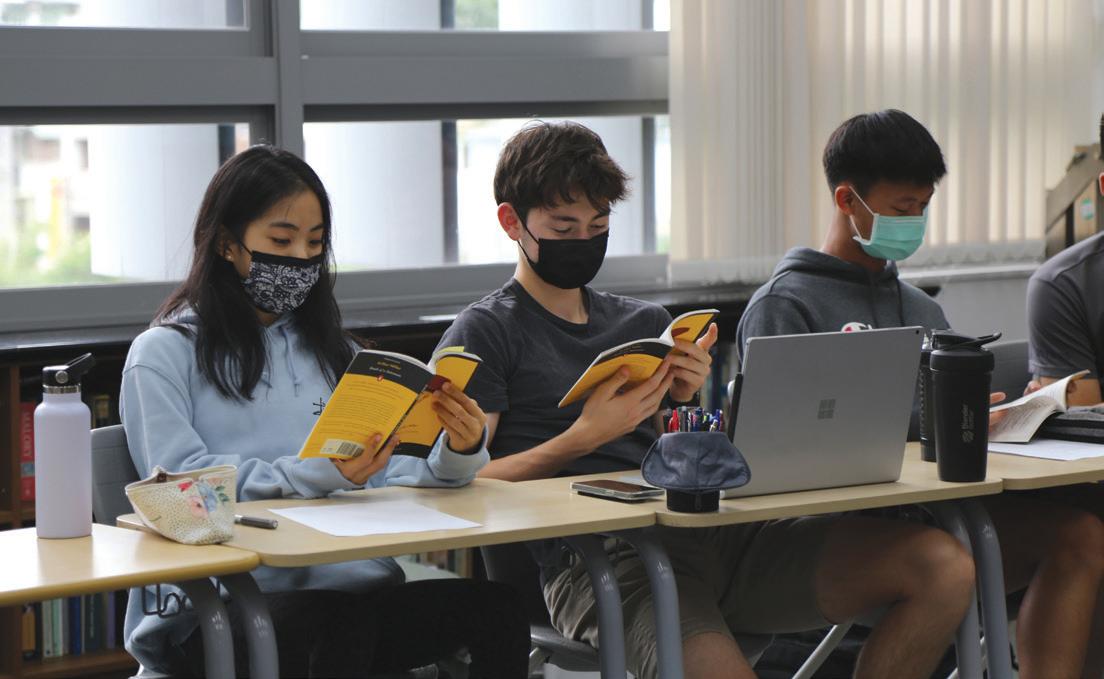
HONORS JOURNALISM 2: THE BLUE & GOLD (UENG 72H)
HONORS JOURNALISM 3: THE BLUE & GOLD (UENG 73H)
HONORS JOURNALISM 4: THE BLUE & GOLD (UENG 74H)
Elective
Duration: Full year
Credit: 1
Grade: 9-12
Homework: Heavy
Prerequisite: None for Journalism 1
Subsequent courses to be taken in sequence
Journalism is primarily a production class dedicated to creating the student newspaper, The Blue & Gold. In this class, students will gain a broad understanding of journalism by participating in the reporting, editorial, and publication processes for digital and print newspapers. Students will study and write in various journalistic genres including news, features, and opinion as well as produce photos, graphics, and designs to support their stories. They will use different technologies to create online, print, and audio-visual stories while learning to engage audiences across various platforms, including social media. Students need to work independently as well as collaborate in groups on all stages of newspaper production. They are expected to work as part of a team, show initiative, and manage their time effectively. Students and parents should be aware that students in this class are expected to spend extra time at school: they must be able to devote several evenings or weekend days each semester to the production of The Blue & Gold.
Students are encouraged to take the course for multiple years and will earn honors course credit for every year after the initial year of enrollment. Students in Honors Journalism will additionally be expected to take on mentoring and leadership responsibilities. The Blue & Gold managing and editorial roles are given to students who show exemplary expertise, commitment, and leadership.
Required Texts: Kovach and Rosenstiel, The Elements of Journalism; The Associated Press Stylebook
Books are the mirrors of the soul.

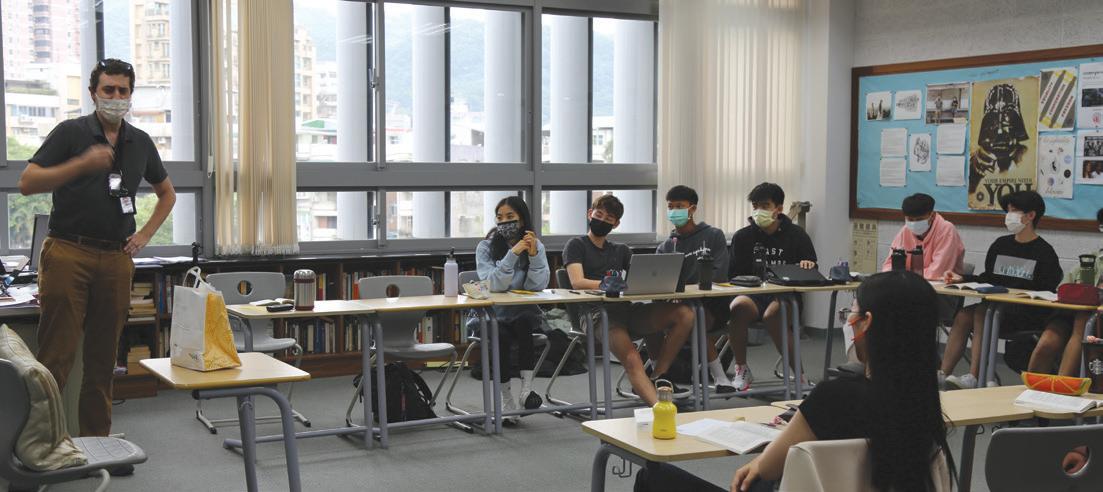
Elective
Duration: Full year
Credit: 1
Grade: 9-12
Homework: Light (Moderate for Honors)
Prerequisite: Teacher recommendation is required for Honors.
Subsequent courses to be taken in sequence
In this creative writing course, students will examine different forms of storytelling from a writer’s perspective and produce original work in various genres – creative nonfiction, fiction, poetry, and graphic narrative. As members of a college-style workshop, students will share works-in-progress in a relaxed and supportive environment, while developing both the skills and sensitivity necessary to give/receive feedback to/from their peers. This course is designed for students who have a passion for and independent rigor towards their creative work. Through these discussions, the collective goal is to first identify and subsequently refine one’s own habits that shape artistic choices and abilities as writers in order to establish one’s voice. Assessments will include: the creation of a portfolio of work in a variety of genres, the maintenance of a daily journal, and at least three submissions of their creative work to competitions, publications, and literary journals, as an exercise in sending personal, creative work out into the world.
Suggested texts may include work by Alexander Chee, Kyoko Mori, Chang-Rae Lee, Jhumpa Lahiri, Lorrie Moore, Ross Gay, Julia Alvarez, Susan Choi, Cathy Park Hong, Elizabeth Alexander, Ken Liu, Malaka Gharib
Public Speaking: 1 credit
Students may satisfy the requirement by taking: Public Speaking, Debate, and Performance, International Relations/Honors International Relations/IB Global Politics, or AP Research; or, by taking 2 years of Theatre classes. IB Diploma students may fulfill the requirement automatically through TOK Year 2.
Note that students may NOT satisfy both the public speaking and the performing & visual arts requirements with the same course.
Duration: 1 year
Credit: 1
Grades: 9-12
*Satisfies Public Speaking requirement
Homework: Light to Moderate
Note: Class is taught in semester sections. One semester will be taught by the Social Sciences teachers and one semester will be taught by the Theater teachers.
The ability to express, defend, and compare ideas in a confident and fact-based way is critical regardless of one’s profession or field of study. In this year-long course, students will receive formal training in effective public speaking and argumentation, as well as examine the physiological connections between thought, breathing, the physical body, and the performative aspects of speech. By experimenting with a variety of speech types and techniques, students will be able to create effective speeches with solid openings, main points, transitions and conclusions whilst
understanding the importance of audience analysis. Students will also be introduced to the structure of arguments and taught how to effectively construct, refute, and compare between them. Using NSDA Debate events as a vehicle, students will get extensive experience in a variety of formats including public forum and world schools debate. Through supportive critiques, observation of peers, rehearsal, examination of text, research, refutation, and a general understanding of presence in a room, students will be able to speak and debate confidently, fluently and prolifically in no time.
(UPSF04S1)
CIVICS AND
Duration: Students may take the class as a 1 semester or full year course.
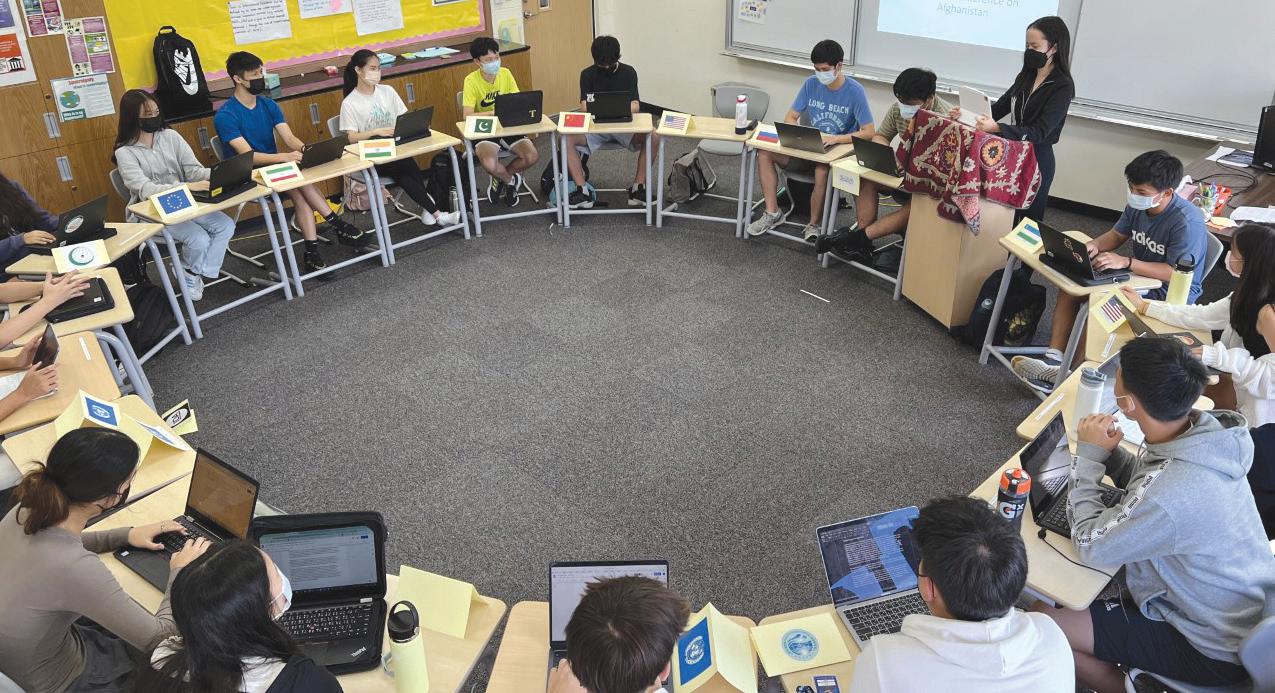
Credit: 0.5 or 1
Grade: 9-12
Pre-req: None
Homework: Light
The world around us is rapidly evolving and keeping up with current events can be challenging, even for the most committed news junkies. This new course strives to provide students with a place to explore those news developments, engage in meaningful conversations about the hot topics of the day, and prepare to engage in the political and social systems that will impact their lives. While the specific topics for each semester will be determined by current events and student input, some examples may include elections around the world, activism in sports, the rise of misinformation and authoritarianism, criminal justice reform and other social justice movements, global responses to climate change and health crises, and more. This course does not require previous understanding or awareness of the news, instead, its goal is to inform students about what is happening in the world around them and empower all students to be active participants in that world. Come be a part of the discussion!
Duration: 1 year
Credit: 1
Grade: 10-11
Prerequisite: For Sophomores - English/History teacher recommendation, or Social Sciences Department approval. For Grade 12 - Department approval.
Homework: Moderate to Heavy
AP Seminar will instruct students in the practice of research methodology, presentation skills and oral defense of argument while giving them the tools to apply those skills to real-world problems. Students will understand and think critically about social difference and social injustice, both in an individual and in a group setting. Specifically, the course will examine the role of classism and gender issues. AP Seminar will allow students to improve their argumentation, presentation skills, and research skills. Over the course of the year, students will have to complete several team research projects and presentations, a research-based essay and presentation, and take a written exam similar to other AP courses. Students should be able to act as agents of knowledge and change within and outside of their school communities. Successful completion of this course will allow students to qualify for AP Research.
Duration: 1 year
Credit: 1
Grades: 11-12
*Satisfies Public Speaking requirement
AP Research only Prerequisite: Students must have successfully completed the AP Seminar course. No Prerequisite for the Research in Social Sciences course.
Homework: Heavy
AP Research is the second year of the 2-year AP Capstone series. In this course, students further their skills from AP Seminar by independently designing, planning, and conducting a year-long, research-based investigation related to an academic topic, problem, or issue of individual interest. Students explore their skill development, document their research processes, and curate the artifacts of the development of their scholarly work in a portfolio. The course culminates in an externally graded, academic paper of approximately 4,000-5,000 words (accompanied by a performance or exhibition of product where applicable) and a presentation with an oral defense of approximately 15-20 minutes.
Duration: 1 year
Credit: 1
Grades: 11-12
Prerequisite: Completion of AP Seminar or Social Sciences Department approval.
Homework: Moderate to Heavy
This course will give students the opportunity to design and carry out a viable research project in the social sciences. Topics of inquiry may include, but are not limited to, subjects such as: psychology, political science, social policy, social movements, cross-cultural studies, and social change. Through the completion of their research project, students will: 1) develop their understanding of social science inquiry methods; 2) build their understanding of how to apply academic and ethical standards in research; and 3) be given the opportunity to defend and present their research. Those with especially promising projects may have the option to publish their findings in a journal or present at an academic conference. This course is ideal for students wishing to have a strong foundation in academic research and is designed to complement other research courses and programs.
NOTE: Students may use their Research in Social Science project to complete the requirements for AP Research. Students pursuing this option should enroll in both courses.

SOCIAL ENTREPRENEURSHIP (SEM. 1) (UPSF51S1)
SOCIAL ENTREPRENEURSHIP (SEM. 2) (UPSF51S2)
HONORS SOCIAL ENTREPRENEURSHIP (SEM. 1) (UPSF51HS1)
HONORS SOCIAL ENTREPRENEURSHIP (SEM. 2) (UPSF51HS2)
Duration: Students may take the class as 1 semester or full year course. Credit: 0.5 or 1
Grade: 10-12
Prerequisite: None
Homework: Light (Heavy for Honors)
Just as entrepreneurs change the face of business, social entrepreneurs act as change agents for society, seizing opportunities others miss to improve systems and invent new approaches to improving our communities and society. Through this course, students will learn how business tools
and techniques, including opportunity recognition, creativity, innovation, product/service development, marketing, entrepreneurial finance, and organizational leadership, are used to create new solutions to social problems by analyzing case studies of social entrepreneurs and social enterprises. Students will also learn by doing; they will take on the role of social entrepreneurs and identify a problem in our community, design an innovative solution, and implement their solution to make a short or longterm impact on our community.
IBSL GLOBAL POLITICS (UPSF022)
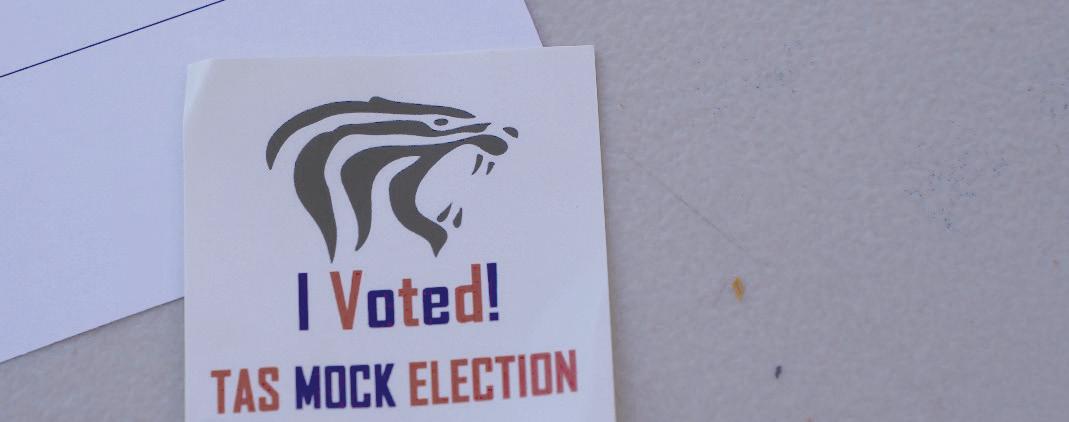
Duration: 1 year
Credit: 1
Grades: 9-12 (10-12 for Honors; 11-12 for IBSL)
*Satisfies Public Speaking requirement
Homework: Moderate for International Relations (Heavy for Honors and IBSL)
IBHL GLOBAL POLITICS 1 (UPSF031)

IBHL GLOBAL POLITICS 2 (UPSF032)
Duration: 2 years
Credit: 2
Grades: 11-12
*Satisfies Public Speaking requirement
Homework: Moderate to Heavy
Developing international mindedness is essential in our increasingly global and interdependent world. This course explores fundamental political concepts such as power, human rights, and conflict in a global context. It allows students to develop an understanding of the local, national, international, and global dimensions of political activity, and explore political issues affecting their own lives. The course will explore four core units: Power, Sovereignty, and International Relations; Human Rights; Development; and Peace & Conflict, helping students understand abstract political concepts with real-world examples and case studies. Moreover, students will develop conflict resolution and negotiation skills, emphasizing consensus-building exercises.
Honors students will be expected to complete an academic research paper and engagement activity project each semester. IBSL students will undertake an engagement activity through which they study a political issue of interest experientially. IBHL year 2 students must complete an in-depth research presentation on two themes studied.
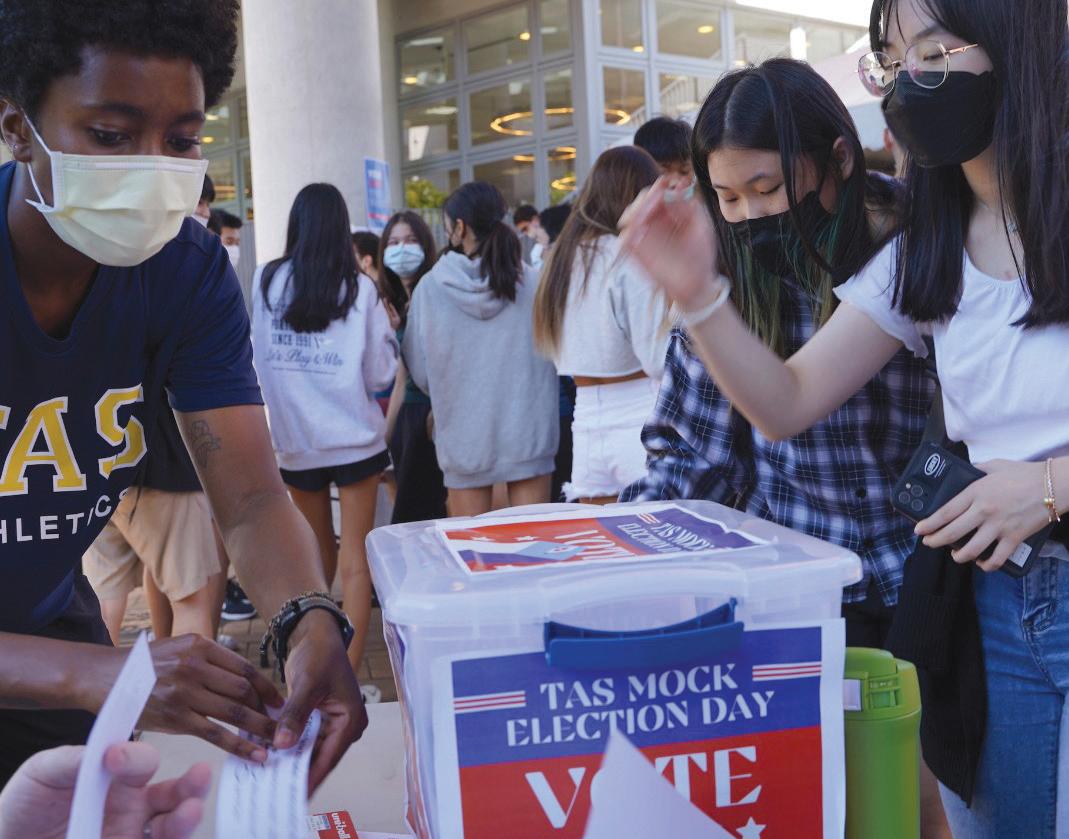
Duration: 1 year
Credit: 1
Grade: 11-12
Homework: Moderate to Heavy
The AP U.S. Government & Politics course provides an analytical perspective on government and politics in the United States. The course introduces key political concepts, ideas, institutions, policies, interactions, roles, and behaviors that characterize the constitutional system and political culture of the United States. The course is designed to equip students with the tools they need to be active participants in the American political system as they gain a deeper understanding and appreciation for civic engagement.
Once provided with that foundational knowledge and conceptual framework, students will engage in more nuanced evaluation of some of the policy questions currently dominating politics in the United States. While specific topics will be dictated by current events, students can expect at least some discussion of federal spending issues, the social safety net, and social issues that are featured in contemporary news coverage.
We have to transcend our differences to transform our future.
Social Sciences Courses
Political Science & Current Events
- International Relations
- Honors International Relations
- IBSL Global Politics
- IBHL Global Politics 1+2
- AP US Government & Politics/Public Policy
- Civics And Current Political And Social Topics
Social Entrepreneurship
- Social Entrepreneurship
- Honors Social Entrepreneurship
Research and Public Speaking
- Public Speaking, Debate, & Performance
- AP Seminar
- AP Research
- Honors Research in Social Science
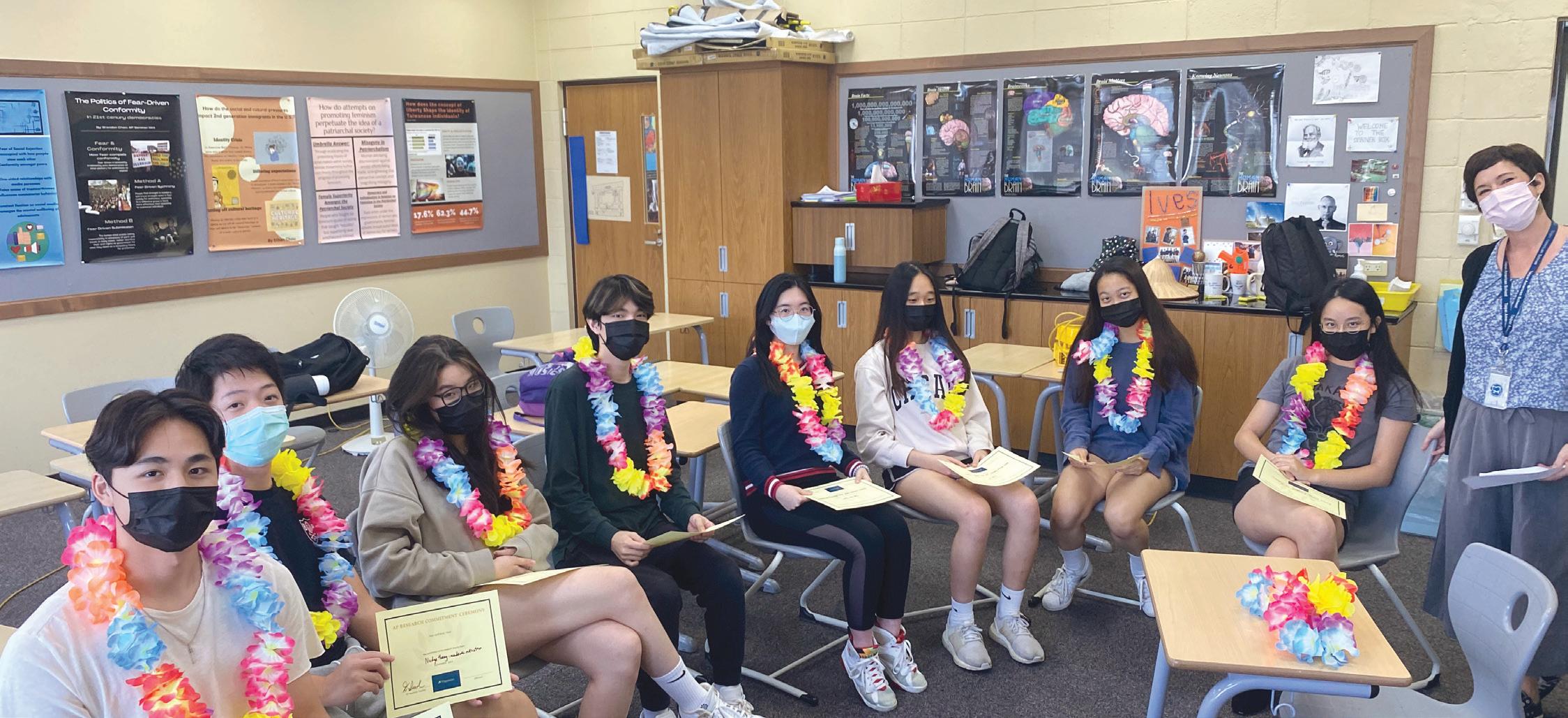
Theory of Knowledge
- IB Theory of Knowledge 1
- IB Theory of Knowledge 2
Psychology
- Psychology
- AP Psychology
- IBSL Psychology
- IBHL Psychology
Required for all IB Diploma candidates
Duration: 2 years
Credit: 1 per year
Grade: 11-12
*Satisfies Public Speaking requirement (in Year 2)
Prerequisite: IB Diploma Student
Homework: Moderate
TOK examines how knowledge is acquired and how it is utilized in areas such as mathematics, the natural sciences, the social sciences, history, and the arts. This two-year course places a heavy emphasis on class discussion, analytical writing and oral presentation skills. Students will explore knowledge questions in Year 1 and complete their required core IB diploma assessments in Year 2. These assessments include the TOK Oral Exhibition, the TOK Essay, the CAS Portfolio, and the Extended Essay. IB diploma candidates may fulfill the public speaking requirement with this course in year two.
Duration: 1 year
Credit: 1
Grade: 11-12
Prerequisite: Recommendation from current history teacher OR current Social Sciences Department teacher, OR completion of or concurrent enrollment in the following courses: AP History, AP Biology, or AP Environmental Science.

Homework: Moderate to Heavy
AP Psychology is an academically challenging introduction to the study of human behavior and mental processes. The course offers a broad and varied survey of psychological concepts and theorists, including research methods, biopsychology, sensation and perception, states of consciousness, learning, cognition, motivation and emotion, development, personality, abnormality, and social psychology. As such, it offers a oneyear introduction to Psychology as a discipline at the college/university level. Students are required to take the external AP exam upon completion of the course. Both Psychology and AP Psychology courses are embedded in the same classroom. Assignments and assessments will be differentiated accordingly.
Duration: 1 year
Credit: 1
Grades: 11-12
Prerequisite: IB Diploma Candidate. Non-diploma candidates: Recommendation from current history or science teacher, OR Social Sciences department approval.
Homework: Heavy
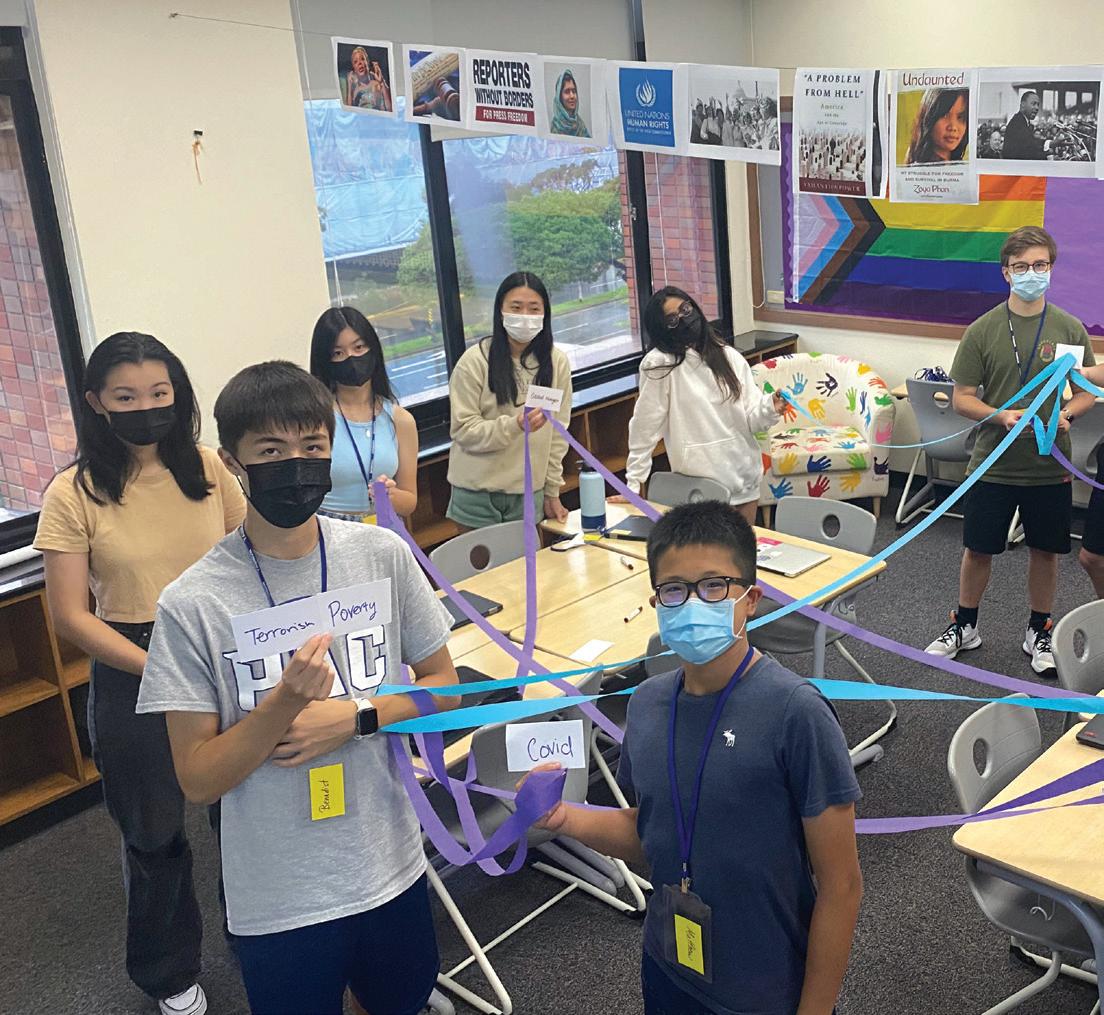
Duration: 1 year
Credit: 1
Grades: 11
Prerequisite: IB Diploma Student, History/Science teacher recommendation or Social Sciences Department approval
Homework: Heavy
IBSL Psychology introduces students to the scientific study of human behavior and mental processes using an integrative approach. Topics such as memory, cognition, cognitive biases, conformity, stereotyping, and enculturation will be examined through the interaction of biological, cognitive, and socio-cultural influences on human behavior. The course emphasizes the discussion and evaluation of research and ethics, and students will design and conduct an experimental study on human behavior to assess their understanding of experimental methodology. Additionally, the topic of abnormal psychology will be studied in detail, including investigation of depression, obsessive-compulsive disorder, phobias and eating disorders. Students are required to take the IBSL Psychology external examination upon completion of the course.
* NOTE: IBHL Psychology Year 1 is part of the two-year sequence; students take the external exam during the second year.
Duration: 1 year
Credit: 1
Grades: 12
Prerequisite: Successful completion of IBSL Psychology or IBHL Psychology Year 1
Homework: Heavy
This course is a continuation of IBSL Psychology. The core units from the prior year are elaborated upon to study the role of animal research in understanding human behavior, cognitive processing in a digital world, and the influence of globalization on individual behaviors. Students will also investigate the psychology of human relationships, including topics like altruism, bystanderism, attraction, prejudice, and violence, and will embark on an extended study into topics from abnormal psychology. As a secondyear course, IBHL Psychology will be student driven with an emphasis on project-based learning and seminar-style discussion. Students are required to take the IBHL Psychology external examination upon completion of the course.
Duration: 1 year
Credit: 1
Grade: 9
Homework: Moderate
This course presents students with an overview of Asian history through an examination of society, politics, culture, geography, and economics. This course will follow a chronological path with a focus on regions such as East Asia, Southeast Asia, South Asia, and the Pacific Rim. Students should expect to be engaged in the following activities throughout the year: writing in assorted styles, reading, a multitude of perspectives, refining research skills, debating controversial issues, reenacting key historical moments through simulations, annotating, and actively reading primary and secondary documents, watching, and analyzing documentaries and films, and authoring a persuasive research essay.
Duration: 1 year
Credit: 1
Grade: 10
Homework: Moderate
This course is designed to take students on a thematic and chronological journey of the world from the foundation of the modern world to the 21st century. The students will explore ideological, social, political, economic, cultural, and technological developments. With a focus on the how interaction between the “Global South” (Latin America, Africa, the Middle East, and South Asia) and European powers has created our modern world. In emphasizing these places and developments, the goal is to gain a greater understanding of when, how, and why this history shapes our lives today.
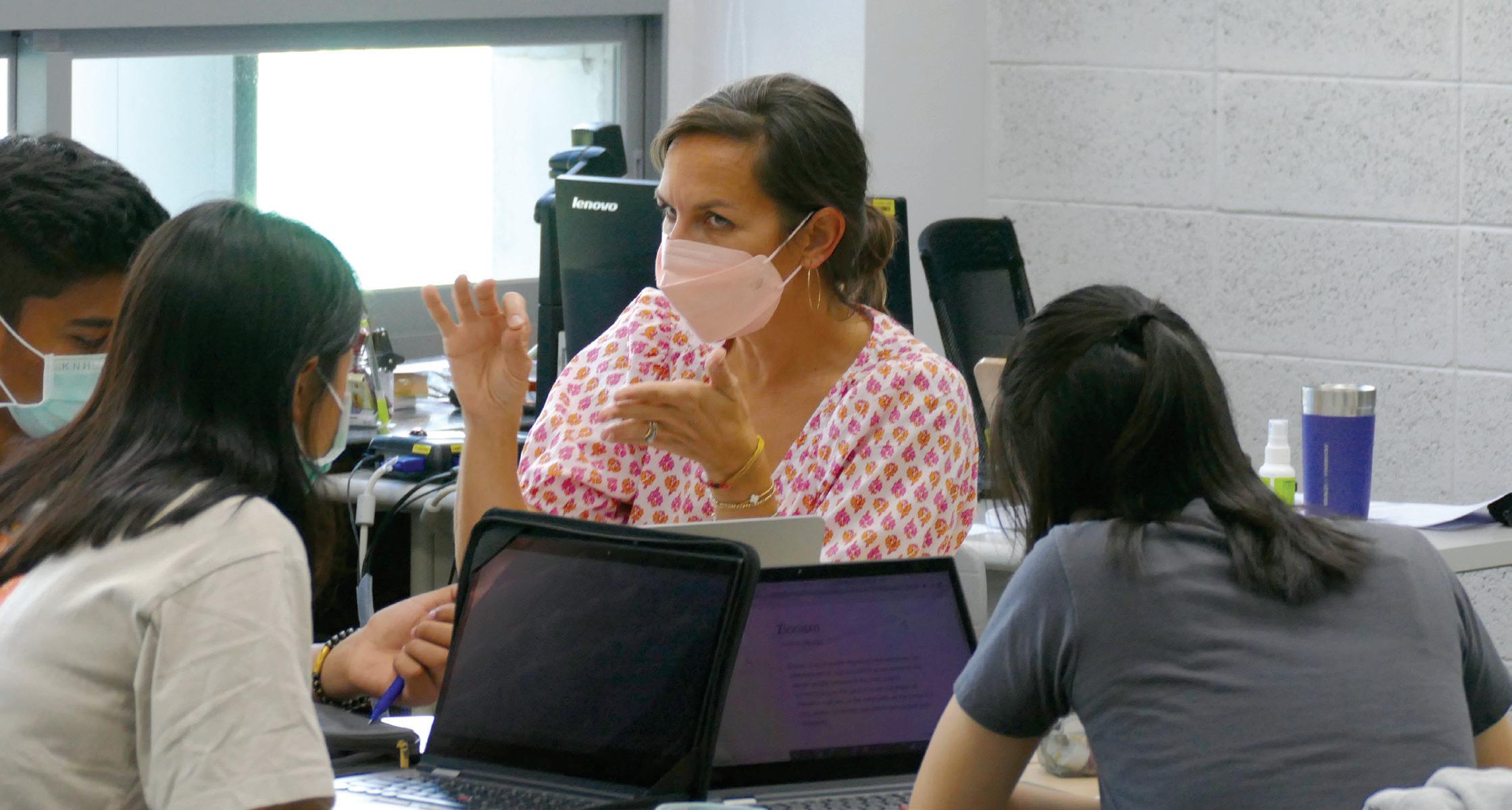
Duration: 1 year
Credit: 1
Grade: 10
Homework: Heavy
*Satisfies World History requirement
Prerequisite: History and Social Studies Department recommendation.
The purpose of the AP World History course is to develop greater understanding of the evolution of global processes and interaction between different types of human societies. This understanding is advanced through a combination of selective factual knowledge and appropriate analytical skills. The course highlights the nature and patterns of the changes in global communities along with their causes and effects by examining historical time periods from 1200 C.E. to the present. Students are required to take the external AP exam in May.
Duration: 1 year
Credit: 1
Grade: 11
Homework: Moderate
Who was in America before the Europeans came? How did America become America? How does that history shape and impact our future? What role do the people play in the development of the nation? These questions and more are answered in U.S. History, a thematic study of United States History. The year begins with the development of colonies, the quest for independence, forming of the new nation and its efforts to redefine that identity after the Civil War. Second semester covers the development of the United States as a global superpower through World Wars I and II, the turbulence of the Cold War era and the quest for minority equality from the Civil Rights movement to the end of Barack Obama’s historic presidency. Students are assessed based on written work, various oral presentations or projects, daily discussions, and a year-long research paper.
AP World History: Modern
AP US History
IBHL US History 1 Honors IB US History
Duration: 1 year
Credit: 1
Grade: 11
*Satisfies US History requirement
Prerequisite: Successful completion of an AP History course or History and Social Studies Department recommendation.
Homework: Heavy
The Advanced Placement US History program is designed to be a rigorous fast-paced course that explores in-depth the major events in American History from the Pre-Columbian Era to the 21st Century with a focus on historical thinking skills. AP US History students use primary and secondary sources to learn about, critically analyze, and develop historical understanding of the major, social, political, cultural, and economic movements and events of American history. This class requires that students read widely and carry out individual and small group research projects. As well, students must write an in-depth analytical research essay. Students are required to take the external AP exam in May.
History of Minorities in America
Honors History of Minorities in America
IBSL Modern World History
IBHL Modern World History 2
AP Economics
Honors: Introduction to American Law
History of the Ancient Greek People
History of Minorities in America
Honors History of Minorities in America
History of the Ancient Roman People
Business and Entrepreneurship
Seminar: World Religions
Honors Seminar: World Religions
IBSL World Religions
HONORS:
Duration: 1 year
Credit: 1
Grade: 11-12
*Satisfies US History requirement
Homework: Light (Moderate for Honors)
This course examines the history of marginalized communities from their perspective as opposed to the white male perspective through which history is generally taught. Students will study the ways in which women, Black Americans, Asian Americans, Hispanic/Latinx Americans, Indigenous/ Native Americans, people with disabilities, and the LGBTQ+ community have shaped American history. Students consider the ways these groups impacted the forming of America, helped write our collective history, and how they are impacted by current events in the U.S. Students routinely place current events into historical context to figure out solutions to problems, such as systemic racism, while developing a deeper understanding of the interconnected history of marginalized communities in the U.S. Students will be assessed on homework, case study presentations, class discussions and other projects. Students who are taking the class to fulfill the U.S. History requirement will complete a research paper.
Marketing
Honors Marketing
AP Art History
In Iroquois society, leaders are encouraged to remember seven generations in the past and consider seven generations in the future when making decisions that affect the people.
Wilma Mankiller, Principal Chief of Cherokee NationDuration: 1 year
Credit: 1
Grade: 11
*Satisfies U.S. History requirement Prerequisite: IB Diploma Student or History and Social Studies Department recommendation.
Homework: Heavy
This course, which is the first year of the HL History curriculum, is designed to teach students about thematic topics crucial to understanding the American past and present while also developing skills to comprehend, evaluate, and critically analyze primary and secondary sources. Students will study the founding of the USA (United States of America), slavery, the causes of the civil war and the reasons the Union won the war, the Reconstruction Era, and the 20th century Civil Rights Movement. Heavy emphasis is placed on understanding the perspectives of historians and on writing persuasive essays that will prepare students for college-level writing expectations. Students will also complete a major research essay as part of the curriculum. Students who are enrolled in IBHL US History will take the corresponding external IB exam at the conclusion of the twoyear curriculum. Students who are enrolled in Honors IB US History are not required to take the IB exam.
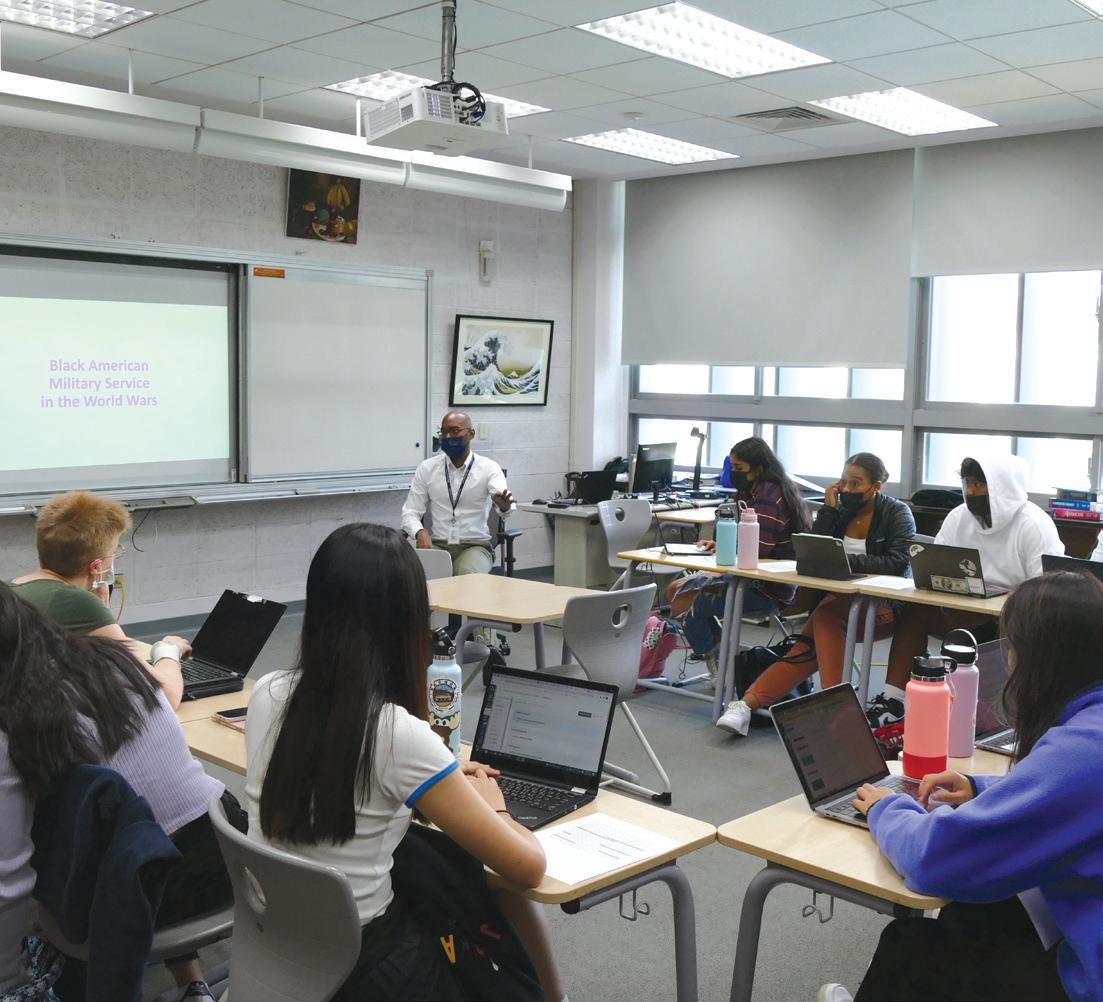
IBHL MODERN WORLD HISTORY 2 (USST20)
Duration: 1 year
Credit: 1
Grade: 12
Prerequisite: Successful completion of History of the Americas 1 or IB Diploma Student or History and Social Studies Department recommendation.
Homework: Heavy
The course, which is the 2nd year of the HL History curriculum or instead can be taken as an SL History class, is designed to teach students about important events throughout the world to better understand the 20th century while also developing skills to comprehend, evaluate, and critically analyze both the past and present. This class examines major themes of twentieth century world history: the rise and rule of authoritarian states; the rise of the Cold War, its critical crises, and its end; and the comparison of protest movements in different areas of the world. Heavy emphasis is placed on understanding the perspectives of historians and on writing persuasive essays that will prepare students for college-level writing expectations. Students will complete a major research essay and are expected to take the corresponding external IB exam in May.
Duration: 1 year
Credit: 1
Grade: 11-12
Prerequisite: Successful completion of an AP History course, or History and Social Studies Department recommendation.
Homework: Heavy
The Advanced Placement European History program provides students with the analytic skills and content knowledge necessary to deal critically with the interpretive problems of European societies. The course encompasses the social, political, economic, religious, technological, intellectual, and cultural developments of European society from 1450 to the present. The primary aim of the course is to present a history of European societies, institutions and ideals based upon a close reading of secondary source materials and analysis of primary documents. Students are required to take the external AP exam in May.
Duration: 1 year
Credit: 1
Grade: 11-12
Prerequisite: Completion of an AP History or AP Calc AB or History and Social Studies Department recommendation.
Homework: Heavy
This course covers Microeconomics, Macroeconomics, and International Economics. Students will explore topics ranging from decision-making of firms, international trade, exchange rates, monetary policies, and market failures. Students will have opportunities to apply economic theories to global current events and will be prepared to take both the AP Microeconomics and AP Macroeconomics in May.
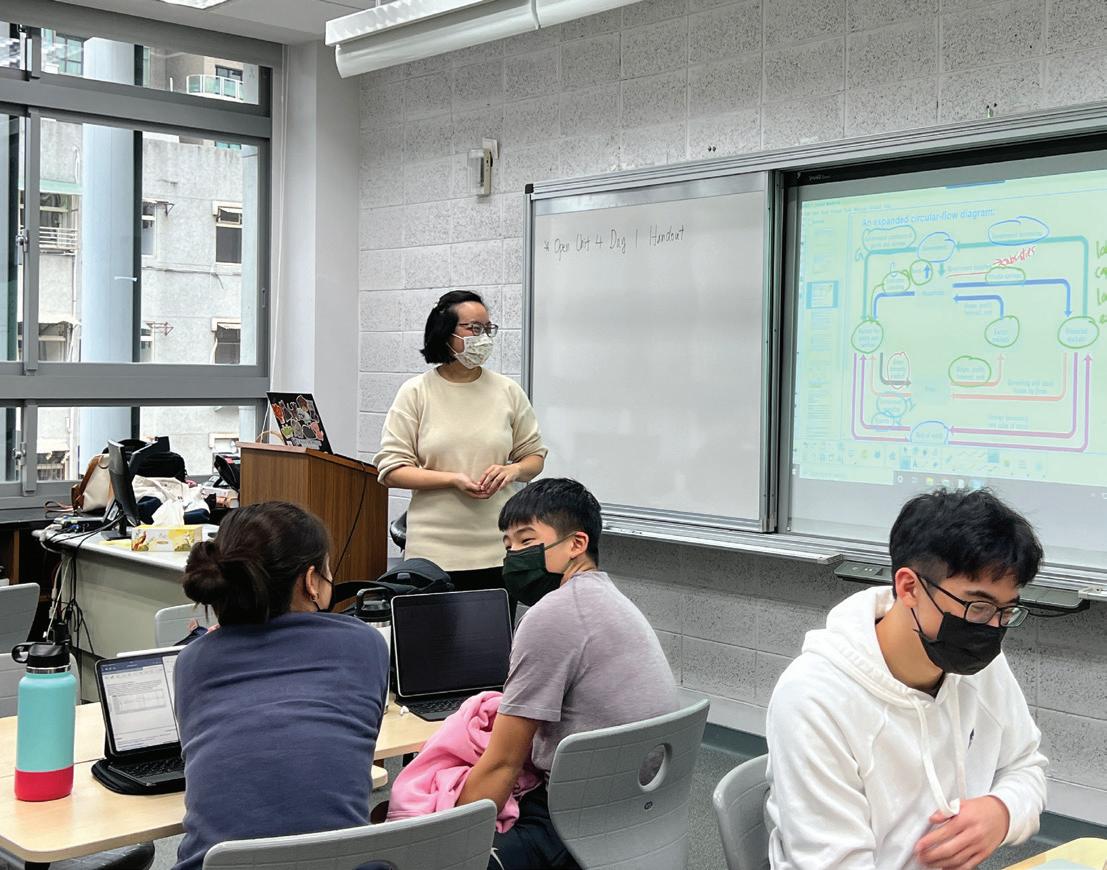
Part of the problem is that we tend to think that equality is about treating everyone the same, when it’s not. It’s about fairness. It’s about equity of access.
Judith Heumann, activist
Duration: 1 year
Credit: 1
Grade: 11-12
Prerequisite: None
Homework: Moderate
Introduction to American Law and the Western Legal Tradition is a social studies elective that offers an overview of the fundamentals of the law in the U.S., including the philosophical foundation of the American legal system. The course will include the basics of U.S. Constitutional Law, Criminal Law and the Criminal Justice Process, and Civil Law (such as Torts, Contracts and Corporate Law). This course is not meant to duplicate the rigor of a law school level course; instead, it is a survey meant to give students a basic understanding of the law and how it works, and to encourage them to be active, engaged citizens with the knowledge and skills they need to successfully participate and create change in their communities. We will use case studies, individual research, group discussion/legal arguments, and mock proceedings throughout the course in order to reach our goal.
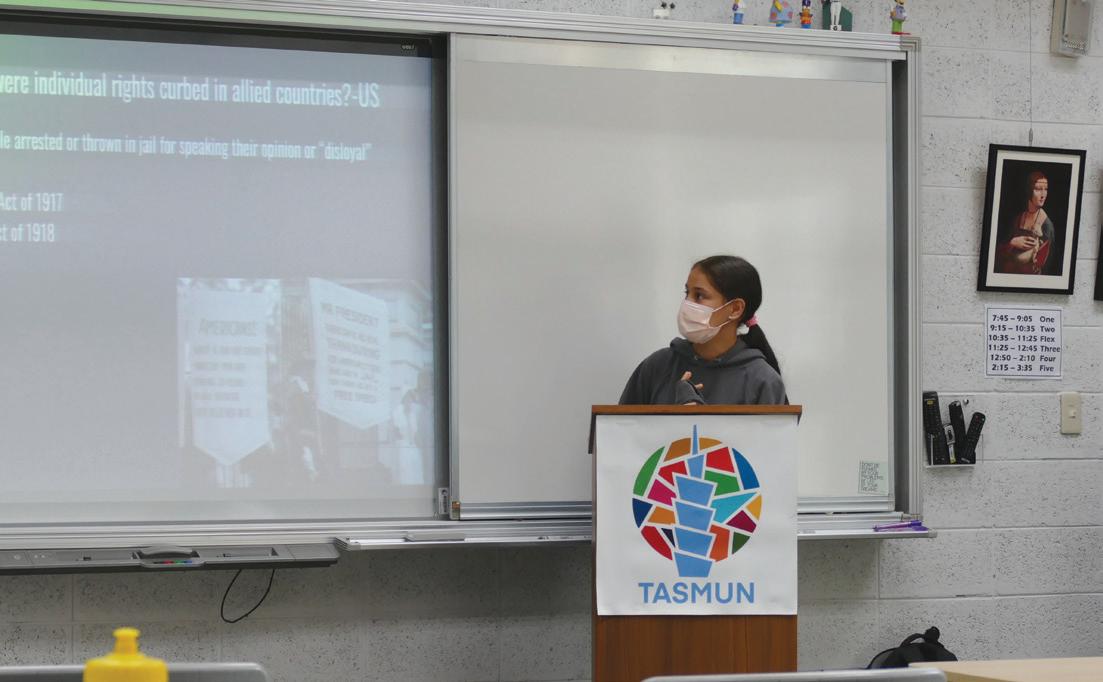
IBSL
Duration: 1 year
Credit: 1
Grade: 11-12
Prerequisite: None
Homework: Light (Moderate for Honors and IBSL)
For individuals to navigate and positively impact today’s multicultural world, one needs a deeper and meaningful understanding of the world’s major religions. In this course students will explore beliefs, practices, and modern debates around the major religions of Islam, Hinduism, Buddhism, Taoism, Judaism, and Christianity. We will also explore a variety of belief systems, such as Native American Sioux, Haitian Vodun, Wiccan Goddess, and
Taiwan Ami. Honors students can research any topic related to religion or philosophy such as Eastern Medicine, yoga, atheism, etc. Through this class students will learn about different religions and philosophies, experience some of their practices through activities, guests, and field trips, and ultimately debate current issues around these topics.
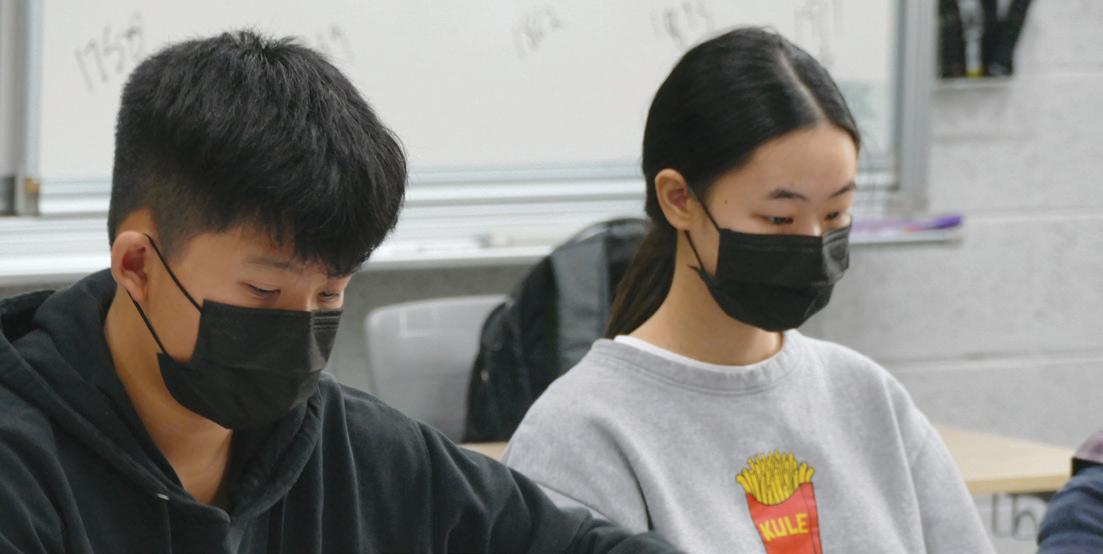
Students who chose to take the IBSL World Religions option are required to complete an investigative study and take the IB exam in May.
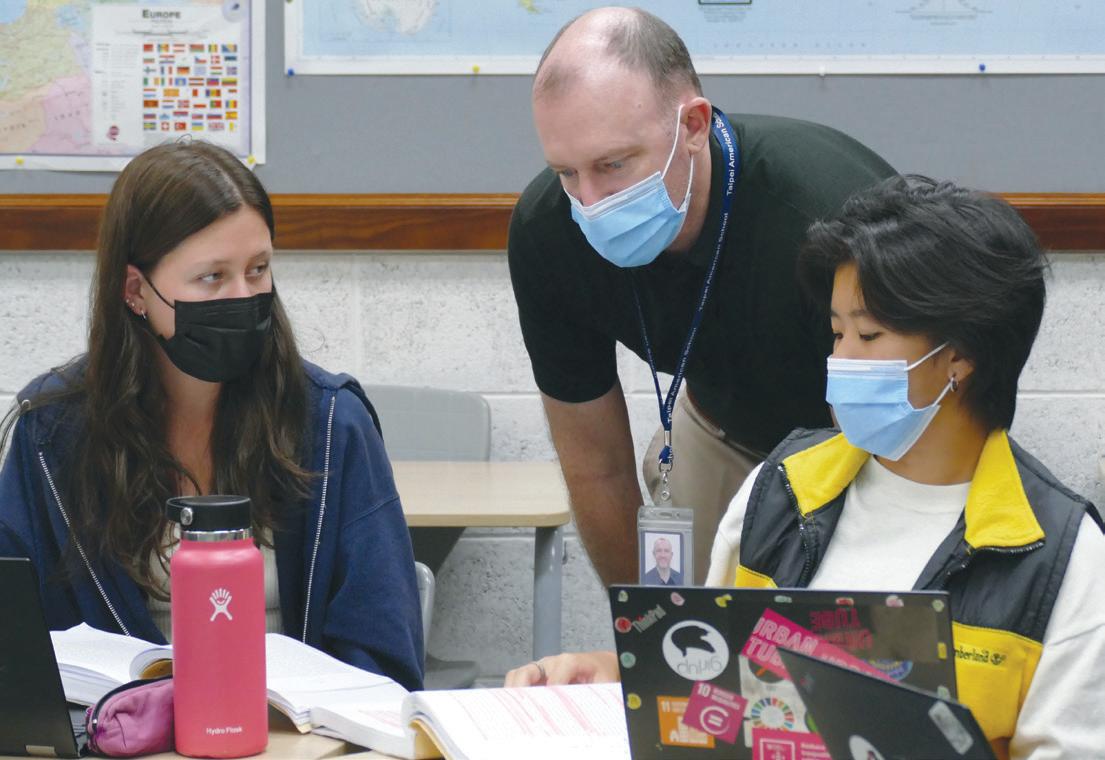
Duration: 1 year
Credit: 1
Grade: 10-12
Prerequisite: None
Homework: Heavy
In the AP Art History course, students are invited to discover the diversity of and connections among global artistic traditions. Students interact with different types of art, observing and analyzing relationships of form, function, content, and context through their reading, discussion, research, and writing. Using 250 representative works of art spanning prehistory to the present comprise the course content, students will study functions and effects of art and consider influential forces like belief, class, gender, ethnicity, patronage, and politics in their critical analyses of art forms. They will investigate how humans respond to the world and communicate their experiences through art making by examining chronology, styles, techniques, and themes to compare, contrast, and interpret art forms from varied perspectives and cultures. Students should be proficient in reading and writing. The AP Art History course is an elective credit class, meaning that it does not meet the graduation requirement for fine arts.
Duration: 1 semester, offered in Semester 1 only
Credit: 0.5
Grade: 9-12
Prerequisite: None
Homework: Light
An introduction to the history of the ancient Greek world to the end of the Hellenistic Period, this course is based on reading ancient authors and documents in translation. Examining ancient artifacts, including architecture and infrastructure, and tracing the cultural and artistic development of Greek civilization. The focus of the course is on examining the emergence and development of a Panhellenic Greek cultural identity. In addition, students will study the history of Mediterranean archaeology and learn about the most recent developments in that field as they pertain to the ancient Greek peoples.
Duration: 1 semester, offered in Semester 2 only
Credit: 0.5
Grade: 9-12
Prerequisite: None
Homework: Light
An introduction to the history of the ancient Roman world to the age of Constantine, this course is based on reading ancient authors and documents in translation, examining ancient artifacts, including architecture and infrastructure, and tracing the cultural and artistic development of Roman civilization. The focus of the course is on the problems that attended the development and spread of a shared Roman cultural identity in the disparate places that were governed from Rome. In addition, students study the history of Mediterranean archaeology and learn about the most recent developments in that field as they pertain to the history of Rome.
Duration: 1 year
Credit: 1
Grades: 10-12
Prerequisite: None
Homework: Light
Advancing in today’s competitive and continually changing environment requires business insight. This course equips students with the fundamental business and entrepreneurial principles that allow them to navigate the business landscape of today and the future. Divided into five separate modules, this course covers: basic economic theory, business structure and organization, the role of marketing in developing business strategy, accounting and finance, and entrepreneurship. Students are introduced to the concepts through discussions of the textbook reading and observations of current events and deepen their comprehension by applying the principles to case studies and simulations. This course further develops students’ critical thinking skills as they analyze and resolve real-world business issues. This survey course is good for students with an interest in business, entrepreneurship, and economics who may not be ready or have time for the college level AP Economics course.
Duration: 1 year
Credit: 1
Grades: 10-12
Prerequisite: None
Homework: Light (Moderate for Honors)
Marketing goes beyond just advertising – it involves understanding how changing customer perceptions and preferences become central determinants of an organization’s strategy and long-run success. This course introduces students to fundamental principles and analyses involved with managing marketing activities, as well as to methods used to assess and solve marketing issues. Study modules include determining marketing strategy, identifying trends in the marketplace, customer behavior and market segmentation, market research, product management, pricing, channels of distribution, and the promotional mix. Students learn concepts through classroom discussions of textbook reading and current events and deepen their understanding through case studies, group projects, and a marketing simulation program developed by an INSEAD marketing professor. Students also complete and present a research-based marketing plan for a company of their choice.
Honors students read additional books to extend their knowledge and comprehension of marketing topics covered. This course is good for students who have an interest in business and economics who may not be ready or have time for the college level AP Economics course.
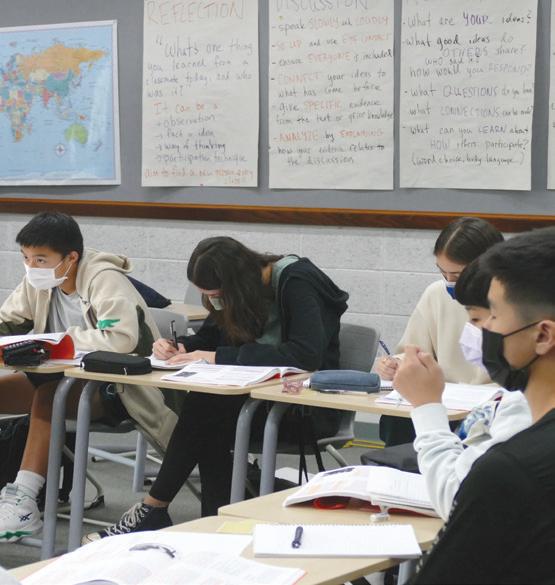

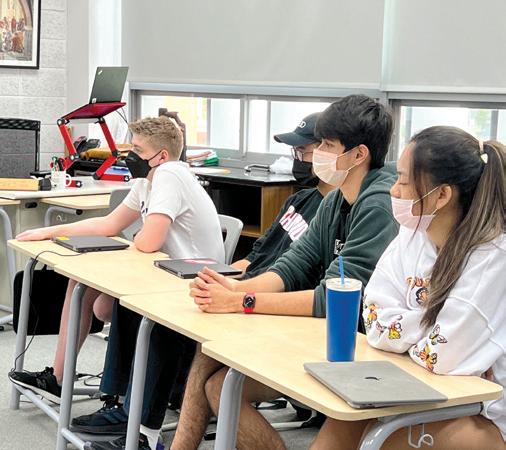
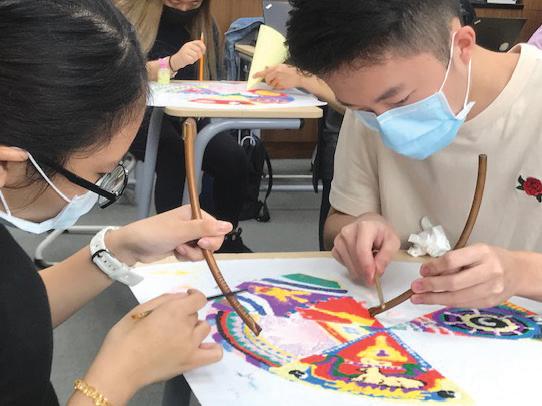

Every moment is an organizing opportunity, every person a potential activist, every minute a chance to change the world.
A TI-84 Plus CE graphing calculator is required for all Upper School math courses. Students should NOT purchase other models. Some other models have a Computer Algebra System (CAS) and IB does not allow CAS calculators to be used. Please do not purchase other TI models (or other brands), as they are not appropriate for our classes and may not have similar capabilities as the models we use. The SAT, ACT, AP, and IB will allow use of the TI-84 Plus CE model on its exams. Calculators are available in the Tiger Shop and may also be purchased through online retail sites.
Understanding that a comprehensive mathematics curriculum should help students learn to use calculators, computers, and other tools of technology as a part of learning mathematics, the US Mathematics Department promotes the use of technology as an integral part of our mathematics program. This position is supported by the National Council of Teachers of Mathematics (NCTM) that states: “…instructional programs should use technology to help all students understand mathematics and should prepare them to use mathematics in an increasingly technological world.” “…Technology is essential in teaching and learning mathematics, it influences the mathematics that is taught and enhances students’ learning.” The NCTM makes it clear that such tools do not replace the need to learn basic math skills, to compute mentally, or to do reasonable paper and pencil computation. In fact, the NCTM Standards suggest that when used appropriately, calculators and computers enable students to explore new areas of mathematics and to tackle challenging mathematical problems that would not be possible without the help of such tools. In line with this philosophy, we offer the following policy on the use of technology.
We require the appropriate use of technology in the classroom. Students need to consider when use of mental mathematics, paper & pencil, or a calculator is appropriate. Calculator dependency, as evidenced by the use of a calculator for multiplying single- or double-digit numbers, should be avoided. (Keep in mind that over one-half of the AP Calculus exam does not allow calculator use. Also note that a portion of the SAT test does not allow calculator use as well.)
We recognize that calculators left unattended may be targets for theft. To help combat theft, the US Mathematics Department has purchased an engraver that students may use at any time that classes are not in session for engraving their name on their calculator. We strongly encourage students to engrave their calculators! Engraving can be done in the math office before school, during breaks, and after school.
Students will be required to show all work in their solutions and may have to explain how they arrived at their solution as a demonstration of their understanding. This applies to homework, quizzes, and tests, whether a calculator is used or not. The calculator should not replace the understanding of fundamental concepts of mathematics. Therefore, a reasonable emphasis will be placed on teaching with mental computation and paper & pencil calculation.

The AP Calculus AB and BC courses are designed to mirror typical undergraduate college Calculus 1 and 2 courses for students heading into math-focused majors and careers. The focus is purely on differential and integral calculus with a mostly analytical approach. AP exams may be taken at any grade level. The IB math curriculum has two branches: Analysis & Approaches and Applications & Interpretation. Both branches include calculus and statistics and are equivalent in difficulty. IB Diploma students should plan on taking the SL external exam in grade 11 or 12. The HL external exam is offered in grade 12 only.
The Analysis & Approaches branch focuses more on a deep understanding of mathematics, concentrating more on calculus than statistics. Students will be asked to prove, investigate, etc. An analytical approach is encouraged. This branch is aimed at students who will go on to study subjects with substantial mathematics content such as mathematics itself, engineering, physical sciences, or economics for example. Analysis & Approaches will be offered at the SL and HL level.
The Applications & Interpretation branch focuses more on statistics than
calculus, and on the role of mathematics and technology in a diverse array of contexts. Using tech is the norm with an emphasis on interpreting those results. This branch is aimed at students who will go on to study subjects such as social sciences, natural sciences, statistics, business, some economics, psychology, and design, for example. Applications & Interpretation will be offered at the SL and HL level.
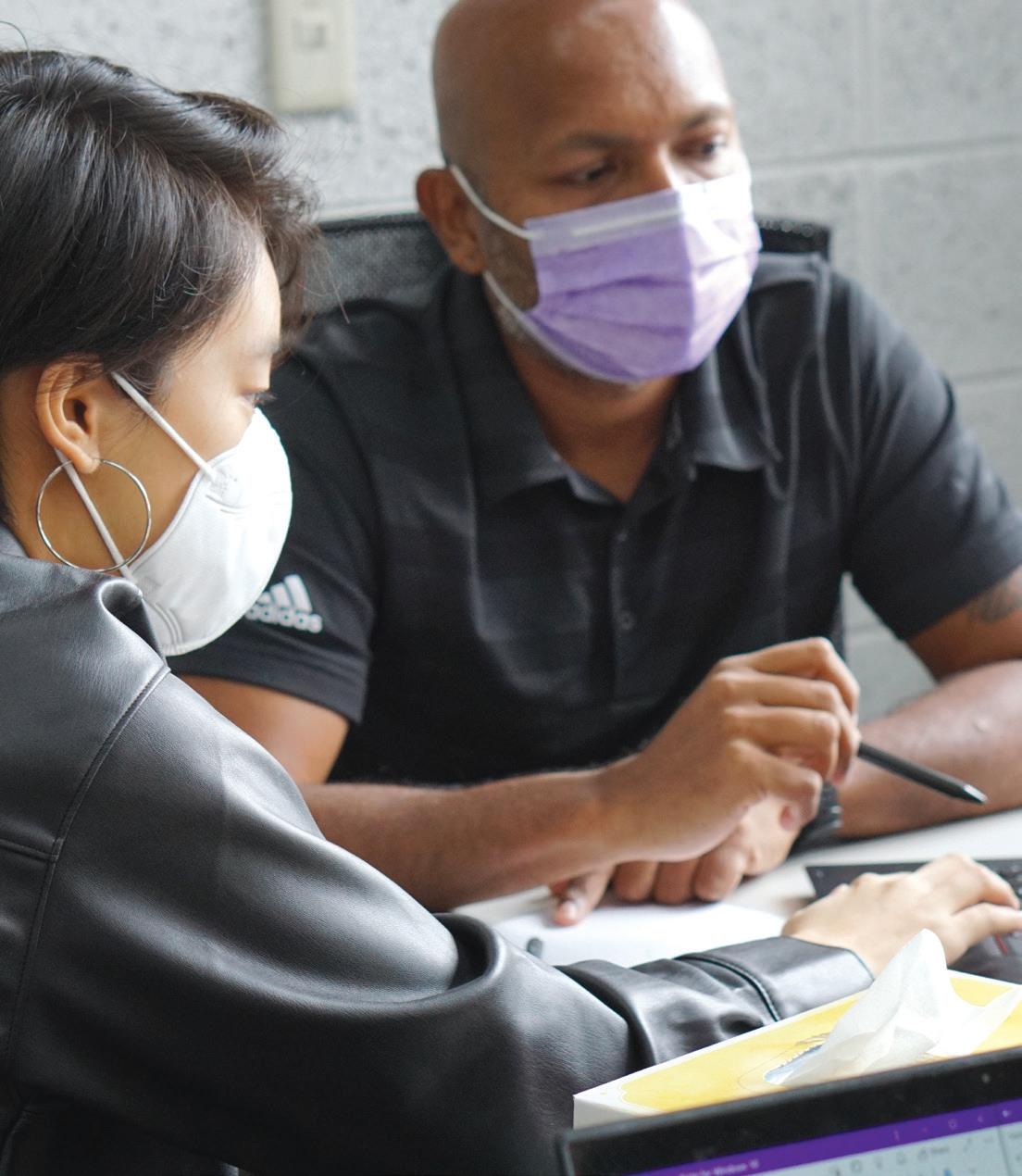
Students who complete AP Calculus BC can choose to take a math course online through Global Online Academy. Course selection varies each year and the latest information can be found at https://globalonlineacademy.org/. Please discuss with your math teacher and academic counselor about how to sign up.
Duration: 1 year
Credit: 1
Prerequisite: Successful completion of Pre-Algebra or Introduction to Algebra
Homework: Moderate
Included in this course is the real number system, linear equations and their graphs, inequalities, polynomials, rational expressions, quadratic equations, relations and functions.
Text: Beginning Algebra, 9th edition (ISBN: 978-0-13-418779-2)
Duration: 1 year
Credit: 1
Prerequisite: Successful completion of Algebra 1 or recommendation of the department
Homework: Moderate
While this course does not require proofs as Honors Geometry does, it examines many of the same concepts through constructions, drawings, and explorations. These concepts include points; lines and planes; congruence and similarity of triangles and other polygons; angles; circles; perimeter; area and volume; Pythagorean Theorem; and an introduction to trigonometry.
Text: Geometry (ISBN: 978-0-13-328115-6)
Duration: 1 year
Credit: 1
Prerequisite: Successful completion of Algebra 1 and recommendation of the department
Homework: Heavy
Students study the basic definitions used in deductive reasoning, basic principles of logic, properties of different polygons, perpendicularity, congruence, similarity of triangles, properties of circles, constructions, areas, and volumes. Proofs will be studied, but not emphasized.
Text: Geometry (ISBN: 978-0-13-328115-6)
Duration: 1 year
Credit: 1
Prerequisite: Successful completion of Algebra 1 and Geometry or Honors Geometry; recommendation of the department
Homework: Moderate
This course is a standard college prep class. Algebra 2 provides a thorough review of the topics covered in Algebra 1 and develops concepts in complex numbers, polynomial and rational functions, exponential and logarithmic functions, conic sections, probability, and sequences and series.
Text: Beginning & Intermediate Algebra, 6th edition (ISBN: 978-0-13419309-0)
Duration: 1 year
Credit: 1
Prerequisite: Successful completion of Algebra 2 or recommendation of the department
Homework: Light
This course is designed to give students access and experience to a wide range of mathematical models and techniques used for solving problems in many contexts of human endeavor. These contexts include business, probability, and research focused from the individual and community perspective. Students will work on developing proficiency with mathematical skills and strategies in problem-solving through topics such as applied geometry, financial literacy, and statistics.
Text: None
In mathematics, the art of proposing a question must be held of higher value than solving it.
Duration: 1 year
Credit: 1
Prerequisite: Successful completion of Honors Geometry and recommendation of the department
Homework: Heavy
This course extends the topics covered in Algebra 1 and develops concepts in complex numbers, polynomial and rational functions, exponential and logarithmic functions, conic sections, probability, and sequences and series.
Text: Intermediate Algebra, 4th edition (ISBN: 978-0-13-455580-5)
Duration: 1 year
Credit: 1
Prerequisite: Successful completion of Algebra 2
Homework: Moderate
This course covers essentially the same curriculum as Honors Precalculus, but several topics of study are not covered at the same depth as the Honors course. The course consists of such topics as trigonometry, polynomial functions, logarithms and exponents, and complex numbers. Successful completion of this course should prepare a student for first term introductory to calculus in a typical U.S. college.
Text: Precalculus by Robert Blitzer, 7th edition (ISBN: 978-0-13-692219-3)
Duration: 1 year
Credit: 1
Prerequisite: Successful completion of Honors Algebra 2 and recommendation of the department
Homework: Heavy
This course includes trigonometry, polynomial functions, logarithms and exponents, and complex numbers. Successful completion of this course should prepare a student for AP Calculus AB or first term calculus in a typical U.S. college.
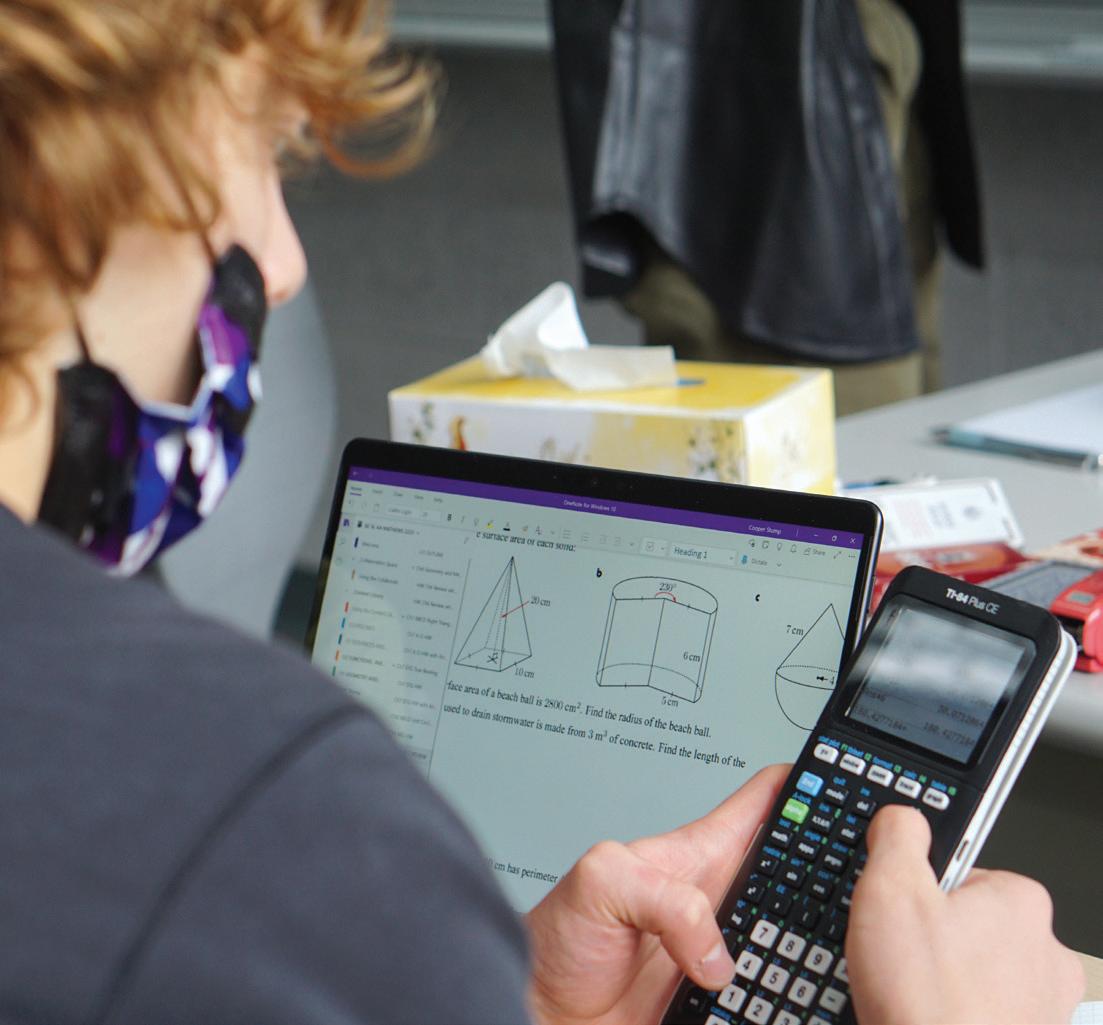
Text: Precalculus by Robert Blitzer, 7th edition (ISBN: 978-0-13-692219-3)
Duration: 1 year
Credit: 1
Prerequisite: Successful completion of Honors Precalculus and recommendation of the department
Homework: Moderate
This course includes a review of polynomials, trigonometric, exponential, and logarithmic functions, followed by discussion of limits, derivatives, and applications of differential calculus to real-world problem areas. An introduction to integration concludes the course.
Text: Calculus: Graphical, Numerical, Algebraic (ISBN: 978-0-13-331161-7)
Duration: 1 year
Credit: 1
Prerequisite: Successful completion of Honors Precalculus and recommendation of math department
Homework: Heavy
This course is similar to first semester calculus as taught in most U.S. colleges and universities. Topics include differentiation of polynomials, trigonometric, exponential, and logarithmic functions as well as integration techniques and theory. Students are required to take the AP exam at the completion of the course.
Text: Calculus: Graphical, Numerical, Algebraic (ISBN: 978-0-13-331161-7)
Duration: 1 year
Credit: 1
Prerequisites: Successful completion AP Calculus AB or Honors
Precalculus and recommendation of the department

Homework: Heavy
This course is intended for those students who have advanced mathematical ability. The curriculum is similar to the first two semesters of college calculus as taught in most United States colleges and universities. The Calculus topics covered include integration techniques, polar coordinates, vectors, parametric equations, sequences and series, differential equations and slope fields. Projects that extend the course content will be an integral component of the course. Students are required to take the AP Calculus BC exam upon completion of the course.
Text: Calculus (ISBN: 978-0-618-50304-9)
Duration: 1 year
Credit: 1
Prerequisite: Successful completion of Precalculus or concurrent with Honors Precalculus or recommendation of the department
Homework: Heavy
This course is similar to a first semester statistics course as taught in most U.S. colleges. Students are introduced to the major concepts and tools for collecting, analyzing, and drawing conclusions from data. An external exam at the end of the year can provide students with college credit. Students are required to take the AP exam.

Text: The Practice of Statistics for AP (ISBN: 978-1-4641-0873-0)
Duration: 1 year
Credit: 1
Prerequisite: Successful completion of AP Calculus BC or IBHL Year 2 Math and recommendation of math department
Homework: Heavy
This is a university-level course for advanced students who have a passion for mathematics. Topics studied will include Differential Equations, Linear Algebra, Multi-Variable Calculus, and other advanced math topics.
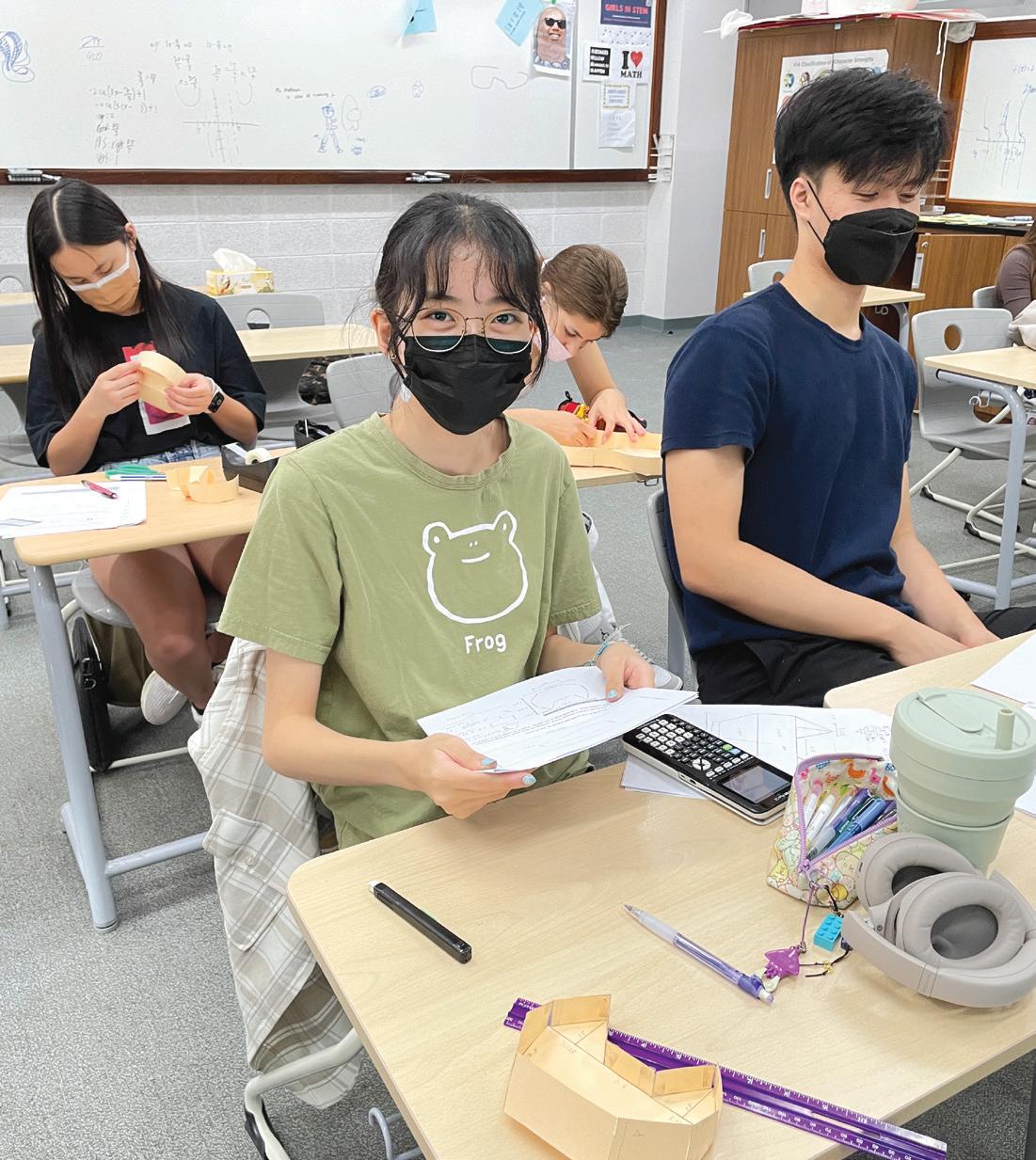
Text: Various resources will be recommended throughout the course as needed
IBSL MATH: APPLICATIONS & INTERPRETATION 1 (UMAT31)
IBSL MATH: APPLICATIONS & INTERPRETATION 2 (UMAT32)
Duration: 2 years
Credit: 1 per year
Prerequisite: Successful completion of Algebra 2 and recommendation of the department
Homework: Heavy
The IB Application & Interpretation Syllabus is followed in this two-year course. Five main topics are studied: Algebra, Functions, Geometry & Trigonometry, Statistics & Probability, and Calculus. The course culminates in an external IBSL Math Exam at the end of Year 2. Taking the IB exam is required of all Year 2 students. A Mathematics Exploration is also required of all students, which is an independent written paper into a mathematics topic that each student prepares, typically during Year 2. This paper is internally assessed as part of the IB score. This course focuses more on statistics than calculus, and on the role of mathematics and technology in a diverse array of contexts. Using tech is the norm with an emphasis on interpreting those results. This course is aimed at students who will go on to study subjects such as social sciences, natural sciences, statistics, business, some economics, psychology, and design, for example.
Text: Haese Mathematics Core Topics SL Book 1 (ISBN: 978-1-92548955-2) and Book 2 (ISBN: 978-1-925489-57-6)
Algebra is nothing more than Geometry, in words. Geometry is nothing more than Algebra, in pictures.
IBHL MATH: APPLICATIONS & INTERPRETATION 1 (UMAT33)
IBHL MATH: APPLICATIONS & INTERPRETATION 2 (UMAT34)
Duration: 2 years
Credit: 1 per year
Prerequisite: Successful completion of Honors Algebra 2 or Honors
Precalculus and recommendation of the department
Homework: Heavy
This course includes the curriculum of UMAT31 and UMAT32, with an additional 90 hours of study in the five topic areas listed in the SL course description. Year 2 students also complete a written paper assessed internally and sit for the external exam during grade 12.
Text: Haese Mathematics Core Topics HL Book 1 (ISBN: 978-1-92548958-3) and Book 2 (ISBN: 978-1-925489-60-6)
IBSL MATH: ANALYSIS & APPROACHES 1 (UMAT41)
IBSL MATH: ANALYSIS & APPROACHES 2 (UMAT42)
Duration: 2 years
Credit: 1 per year
Prerequisite: Successful completion of Honors Algebra 2
Homework: Heavy
The IB Analysis & Approaches Syllabus is followed in this two-year course. Five main topics are studied: Algebra, Functions, Geometry & Trigonometry, Statistics & Probability, and Calculus. The course culminates in an external IBSL Math Exam at the end of Year 2. Taking the IB exam is required of all Year 2 students. A Mathematics Exploration is also required of all students, which is an independent written paper into a mathematics topic that each student prepares, typically during Year 2. This paper is internally assessed as part of the IB score. This course focuses more on calculus than statistics, and on a deep understanding of mathematics. Students will be asked to prove, investigate, etc. An analytical approach is encouraged. This branch is aimed at students who will go on to study subjects with substantial mathematics content such as mathematics itself, engineering, physical sciences, or economics for example.

Text: Haese Mathematics Core Topics SL Book 1 (ISBN: 978-1-92548955-2) and Book 2 (ISBN: 978-1-925489-56-9)
IBHL MATH: ANALYSIS & APPROACHES 1 (UMAT43)
IBHL MATH: ANALYSIS & APPROACHES 2 (UMAT44)
Duration: 2 years
Credit: 1 per year
Prerequisite: Successful completion of Honors Algebra 2 or Honors
Precalculus and recommendation of the department
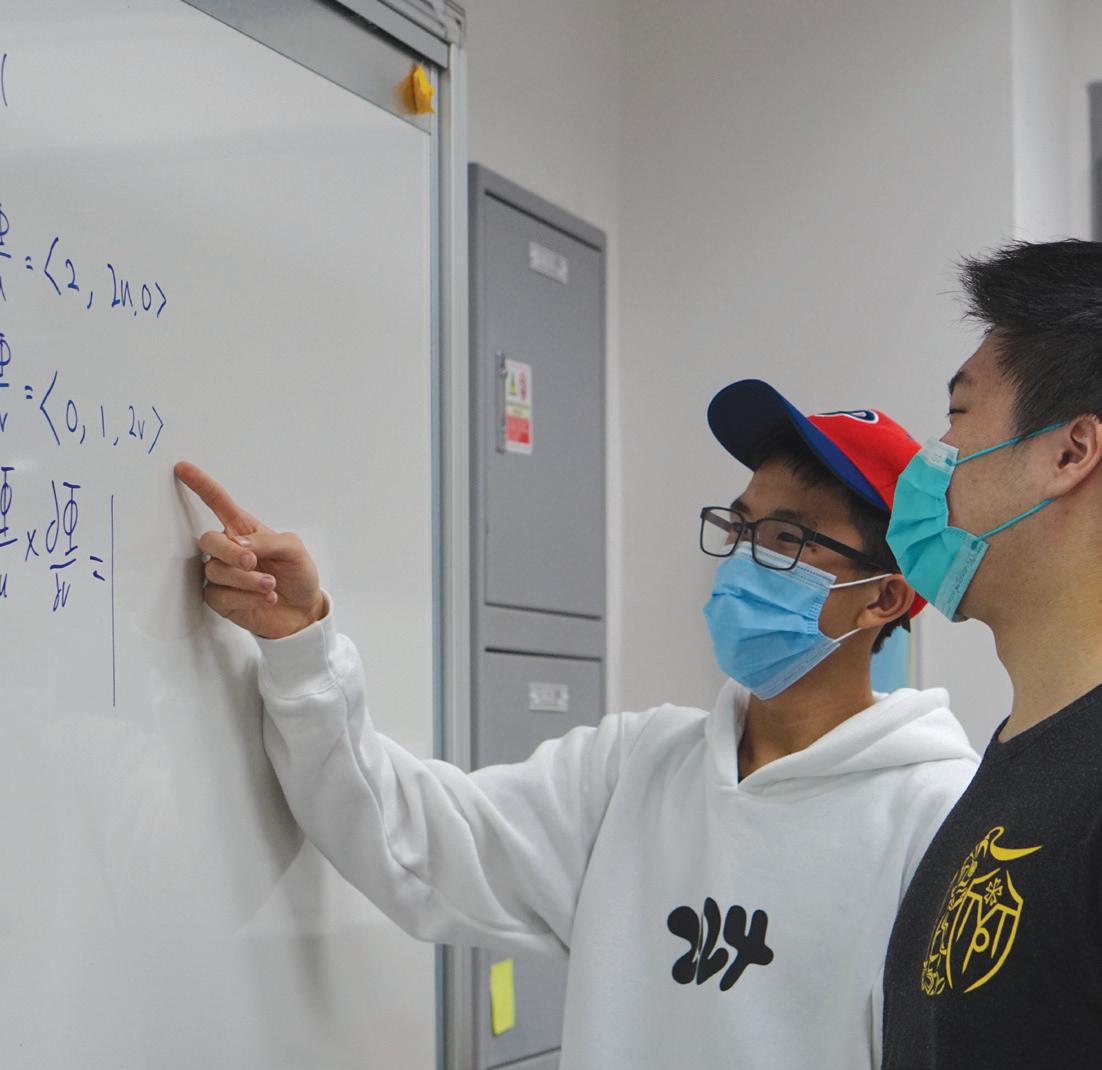
Homework: Heavy
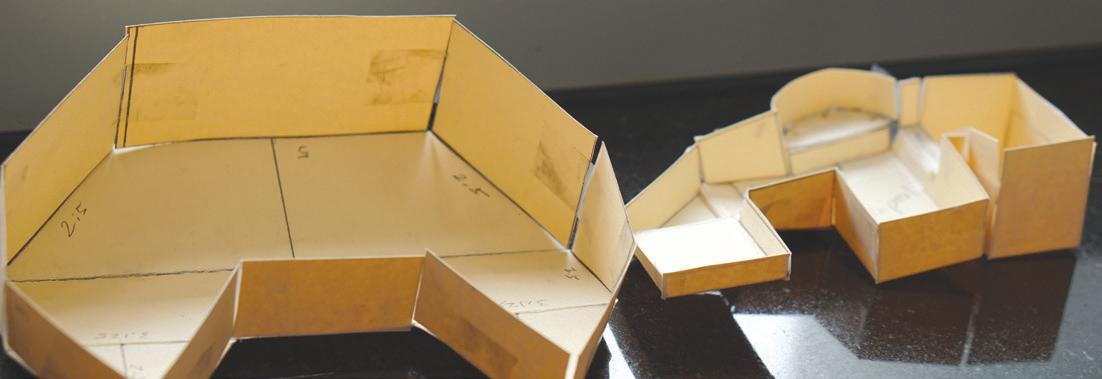
This course includes the curriculum of UMAT41 and UMAT42, with an additional 90 hours of study in the five topic areas listed in the SL course description. Year 2 students also complete a written paper assessed internally and sit for the external exam during grade 12.
Text: Haese Mathematics Core Topics HL Book 1 (ISBN: 978-1-92548958-3) and Book 2 (ISBN: 978-1-925489-59-0)
To miss out on mathematics is to live without an opportunity to play with beautiful ideas and see the world in a new light. To grasp mathematical beauty is a unique and sublime experience that everyone should demand. All of us—no matter who you are or where you’re from—can cultivate mathematical affection.
Francis Su
The Computer Science and Robotics department seeks to encourage students to become creative, team-oriented, and technologically skilled lifelong learners. We believe this is best done through a combination of skill acquisition and team-based projects, in an environment which encourages exploration, self-advocacy, and internationally competitive standards.
All students starting out in the CS/Robotics department are required to take a Level 1 course as an introduction to the program. This will give students new to CS/Robotics a skill set specialization in either Control Systems Engineering, Mechanical Engineering, or Computer Programming. If you are already experienced in your preferred specialization, take this opportunity to add a new skill or specialization that you are not as familiar with. All courses offered by the Computer Science and Robotics Department fulfill the graduation requirement for Computer Science and Robotics.
Students who plan to continue on in CS/Robotics will then select a second Level 1 project course: such as Robotic Engineering, Media Arts, or ObjectOriented Programming. In these courses, students will have the opportunity to use their new skill specializations as part of a project team. Students will be grouped into teams with diverse skill specializations and work together on several large scope projects for the semester. These project courses emphasize teamwork and interdependence and provide first year CS/ Robotics students with the experience realizing large scale projects that they will need to be successful in our more advanced course offerings. Successful completion of any combination of two Level 1 courses will qualify students for our Level 2 course offerings.
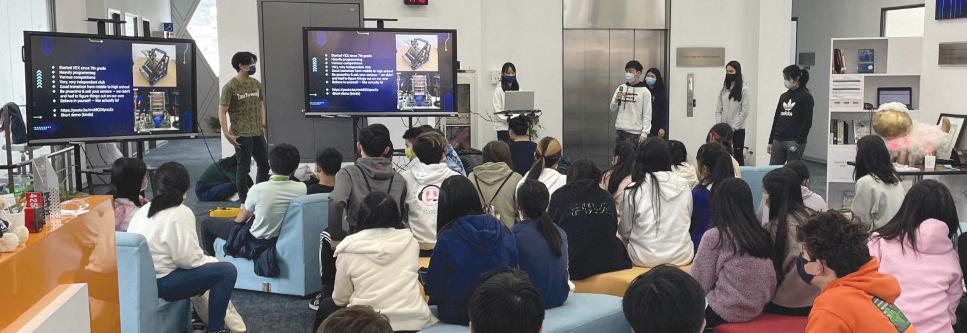
In Level 2 courses and beyond, students will be challenged to continually stretch their technical ability and understanding with topics such as Artificial Intelligence, Advanced Robotic Engineering, Machine Learning, Quantum Computing, Video Game Design, and Control System Dynamics. Students who pursue Computer Science and Robotics at Taipei American School will find themselves exceptionally well prepared to study Electrical, Mechanical, and Software Engineering at the college level, and will leave the program with useful lifelong skills in programing, design, and fabrication.
The department also sponsors a variety of extracurricular teams with a significant programming and engineering elements, including: FIRST FRC, VEX Robotics Competition, the International Rube Goldberg Competition, and the Computer Science Team, and VR club.
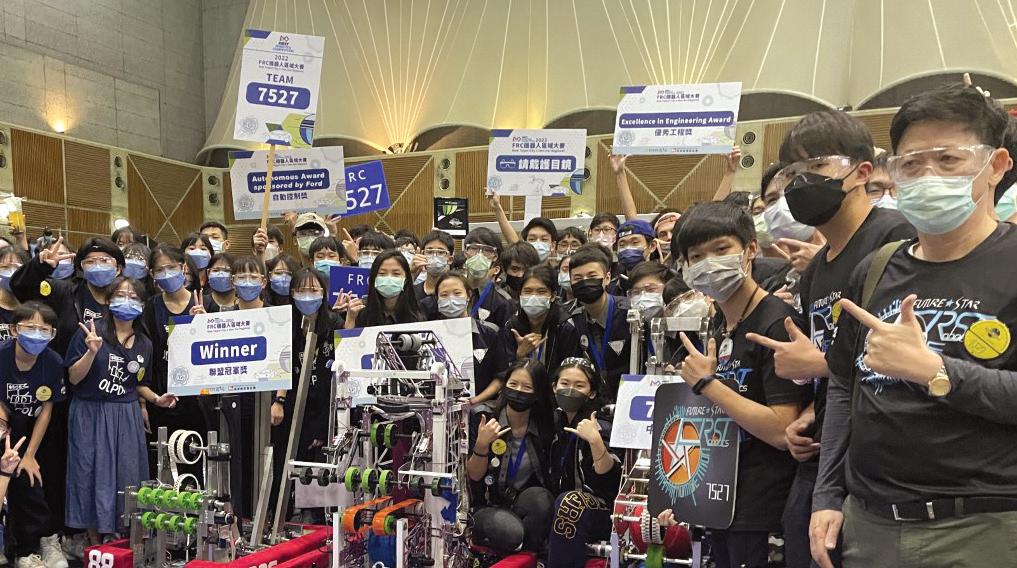
TAS students must satisfy a 1/2 credit CS/Robotics requirement. This requirement may be satisfied by any semester-long or year-long course listed in the CS/Robotics Dept. catalog of courses.
For certain courses, there are software demands that require a system that is robust and utilizes a 64 bit Operating System and 8+ GB of RAM.
Duration: 1 semester
Credit: 0.5
Grades: 9-12
Prerequisite: None
Homework: Light
Interested in automating things around your home using Raspbery Pi? Learn how to control devices in your world remotely over Wi-Fi and Bluetooth. Use python and other languages to control motors, LEDs, and remote switches. Read sensors and send information over the internet to your phone. Use your phone as a controller to automate technology in the world around you. Introductory level course. No previous experience required. Satisfies the computer science graduation requirement and can serve as a prerequisite for any other Level 1 course.
Duration: 1 semester, offered in Semester 1 only
Credit: 0.5
Grades: 9-12
Prerequisite: A laptop with 64 bit Operating System and 8+ GB of RAM
Homework: Light
This course is an introduction to Mechanical Engineering. Students will learn to use CAD software to study the principles of mechanical engineering and learn to build their designs using our lab’s state of the art CNC (Computer Numeric Control) fabrication capabilities. Students will study, design, and build many common mechanisms as well as study gear design and gear ratios, pulley and sprocket systems, lift mechanisms, projectile launchers, and mechanical arms. Students will learn about transmission of power in a mechanical system including motors, servos, lever arms, springs, and pneumatic systems. Students in this class will be trained to operate and maintain all of the equipment in the lab and learn state of the art fabrication methods, including water jet cutting, aluminum TIG welding, multi axis CNC milling, 3D printing, and lathe operations. This course requires no prior knowledge of robotics or programing. It satisfies the computer science graduation requirement and can serve as a prerequisite for any other Level 1 course.
Duration: 1 semester, offered in Semester 1 only
Credit: 0.5
Grades: 9-12
Prerequisite: None
Homework: Moderate
This course is an introduction to computer programming where students primarily focus on creating user interactive 2D games using Java and the Processing programming environment. Students learn about variables, strings, arrays, Boolean algebra, text processing, regular expressions,
loops, control statements, methods, parameters, return values, classes, constructors, creating and animating game objects, incorporating event listeners, and using various Java libraries. The course culminates in a project where students can create a new interactive game of their own design. This course requires no prior knowledge of programing. It satisfies the computer science graduation requirement and can serve as a prerequisite for any other Level 1 course.
Duration: 1 semester
Credit: 0.5
Grades: 9-12
Prerequisite: None
Homework: Light
This is an introductory, project based course in computer programming where students learn to design and code interactive websites using HTML, CSS, JavaScript, jQuery, and Processing. Special emphasis is given to developing student algorithmic thinking, logic, design best practices, and problem solving skills. This course requires no prior knowledge of programing. It satisfies the computer science graduation requirement and can serve as a prerequisite for any other Level 1 course.
Duration: 1 semester
Credit: 0.5
Grades: 9-12
Prerequisite: None
Homework: Light
This course covers the technical and experiential design foundation required for the implementation of immersive environments in contemporary social media platforms. Using Facebook’s Spark AR development environment, students will create custom reactive filters and lenses. This course
provides a basic introduction to reactive programming and visual scripting through Javascript. The course will also include discussions on the ethics of augmented reality, filters, facial recognition, and social media. This course requires no prior knowledge of programing or robotics. It satisfies the computer science graduation requirement and can serve as a prerequisite for any other Level 1 course.


Duration: 1 semester, offered in Semester 1, 5th period only.
Credit: 0.5
Grades: 9-12
Prerequisite: None
Homework: Light
This introductory course is a mix of mechanical design, programming, and mentorship. Along with learning the basics of robotic engineering and programming, students will mentor Lower School students to help them prepare for an in-house FIRST LEGO League Challenge (FLL Challenge) competition. Upper school students will quickly learn the EV3 LEGO programming platform meant to be used in these competitions. Students in this course will learn about block programming, sensor feedback use, game strategy, team management, and best practices for working with lower School students. This course requires no prior knowledge of robotics or programing. It satisfies the computer science graduation requirement and can serve as a prerequisite for any other Level 1 course.

Duration: 1 semester, offered in Semester 2 only
Credit: 0.5
Grades: 9-12
Prerequisite: Any other Level 1 course; a laptop with 64 bit Operating System and 8+ GB of RAM
Homework: Moderate
This course is intended as a first project course for students interested in pursuing robotic engineering at TAS. It is designed to be a second semester continuation of any of the first semester Level 1 course offerings. This course will combine students with different backgrounds and skill sets from the Level 1 courses into project teams focused on achieving specific goals selected by the team. Typical project teams will consist of a combination of students who are familiar with microcontrollers, programming, and/or mechanical design. Projects are selected by the teams and may include: battle bots, electric vehicles, drones, machines that assist with daily life, or other ideas proposed by student teams and approved by the instructor. Completion of this course in combination with any other Level 1 course will qualify students for Level 2 course offerings.
Duration: 1 semester
Credit: 0.5
Grades: 9-12
Prerequisite: None
Homework: Light
A first course in Engineering, Design, and Robotics; students will learn the fundamentals of Computer Aided Design (CAD), computer science, and electrical engineering through the construction of kinetic (moving) and interactive sculptures. This multidisciplinary mechatronics course is intended to introduce students to the wealth of tools and techniques found in the Tech Cube, providing a stepping stone to later computer science classes. Topics include: transmission of power in mechanical systems through motors, springs, pulley/sprocket systems, gears, linkages and additional techniques. Students will have multiple opportunities to master technical and creative skills relating to design, engineering, programming, and circuit building. This course assumes no prior knowledge, fulfills the computer science graduation requirement, and can serve as a prerequisite for any other Level 1 course.
Duration: 1 semester, offered in Semester 2 only
Credit: 0.5
Grades: 9-12
Prerequisite: any other Level 1 course; a laptop with 64 bit Operating System and 8+ GB of RAM
Homework: Moderate
This course is ideal for students who wish to take their Java-based programs to the next level, especially if they have an ambitious interactive graphics-based game or project in mind. At the start of the course, students hone their programming skills working with a standard Java IDE and external libraries such as the Processing library and Box2D physics game engine in BlueJ to create object-oriented games demonstrating inheritance, composition, and interfaces. A second large unit includes learning to use the JavaFX library to create Graphical User Interfaces and 2D games. Other topics include: object-oriented program design, file input and output, exception handling, try-catch, sorting algorithms, recursion, nested loops, matrices, hashmaps, and queues. The course culminates in a programming project focused on the student’s programming interests. Completion of this course in combination with any other Level 1 course will qualify students for Level 2 course offerings.
Duration: 1 year
Credit: 1
Grades: 10-12
Prerequisite: Successful completion of any two Level 1 courses plus teacher recommendation, Or concurrent enrollment or previous completion of Honors Algebra 2, Honors Precalculus, or above. The course is open to all seniors regardless of prerequisites.
Homework: Heavy
This is a college-level introductory course in computer science which focuses on the design and implementation of computer programs using the Java language. Successful students often have some prior programming experience before coming to this course and/or are good at solving math and logic puzzles. Topics include classes, objects, primitive data types, strings, lists, methods, control structures, search and sort algorithms, arrays, recursion, Boolean logic, inheritance, and polymorphism. Students are prepared for and are required to take the AP Computer Science-A exam in May.
Edsger W. DijkstraDuration: 1 year
Credit: 1
Grades: 9-12
Prerequisite: Successful completion of two Level 1 courses; a laptop with 64 bit Operating System and 8+ GB of RAM
Homework: Moderate
In this project based honors level course students will master the complete engineering cycle including research, prototyping, design, fabrication, and failure testing. It is especially tailored to round out a student’s growing knowledge of programming, robotics, electrical engineering, and mechanical engineering. Students will be pushed to pursue advanced topics in computer programing, electronics, sensors and actuators, and fabrication. Student driven projects can include competition robotics applications, interactive or media arts, service applications, wearable technology, musical robotics, or other topics that the student or project team is interested in pursuing. Emphasis will be placed on producing high quality innovative finished products and creating a documented portfolio of work.
Duration: 1 year
Credit: 1
Grades: 10-12
Prerequisite: Honors Robotics Engineering 1; a laptop with 64 bit Operating System and 8+ GB of RAM
Homework: Moderate
This course is for students who have already taken Honors Robotic Engineering 1 that want to pursue more advanced robotics projects.
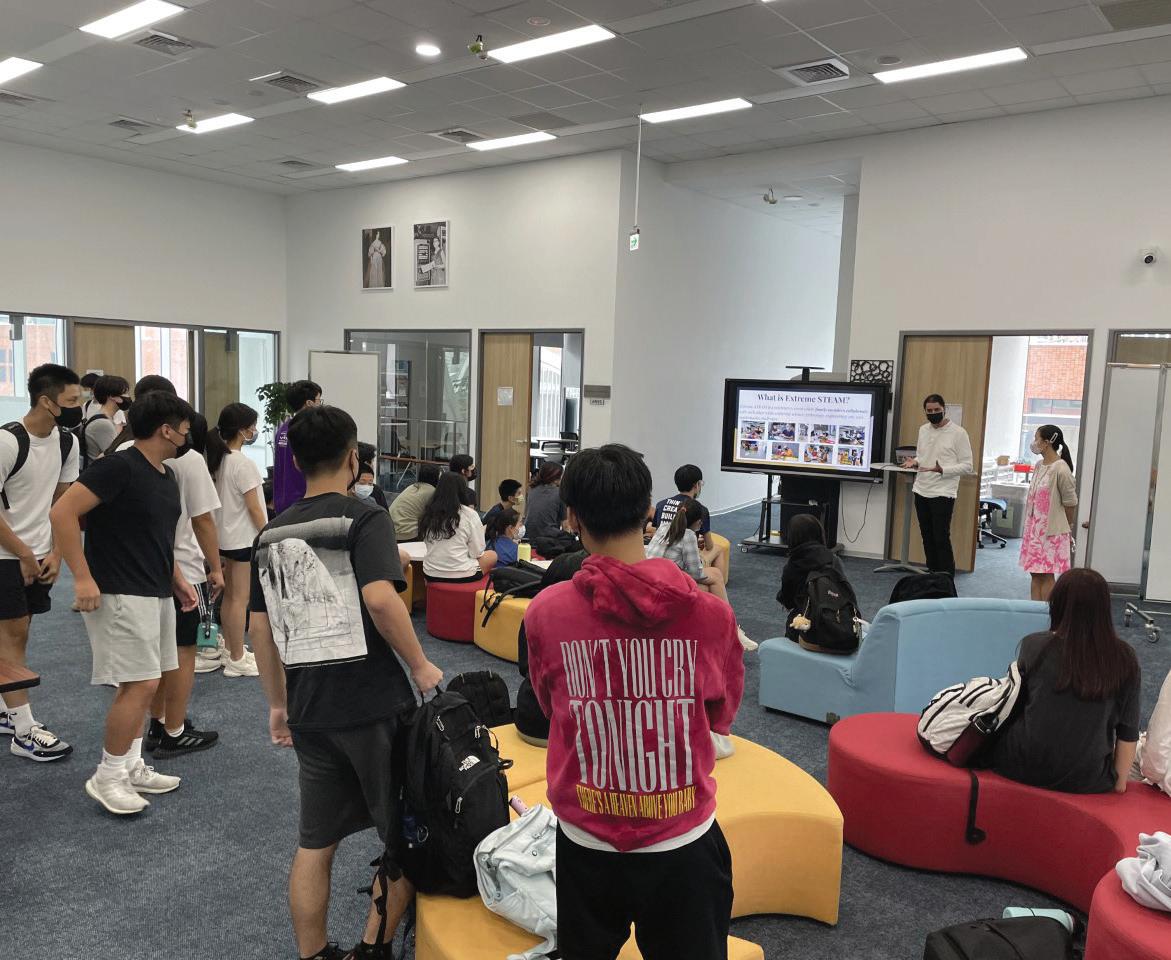

Computer Science is no more about computers than astronomy is about telescopes.
Duration: 1 year
Credit: 1
Grades: 10-12
Prerequisite: Successful completion of any two Level 1 courses.
Homework: Moderate
This is a second-level course in the CS&R department that teaches students about server administration and use of high performance computing. Students will have their own server to test, change, and work on throughout the year. The course will begin with a basic introduction to server administration by using a personal prototyping device such as a Raspberry PI. They will also have the opportunity to use high performance computers to develop and train their own machine learning models. Students in this course will learn security, networking, parallel/distributed computing, as well as high level neural network as they relate to server administration and use. As the course progresses, students will be able to use these servers to host their own tasks, set up automation systems within the tech cube, and interact with other student’s projects from other CS&R classes.
Duration: 1 Year
Credit: 1
Grades: 10-12
Prerequisite: AP Computer Science, or by permission of the CS Dept. Chair; a laptop with 64 bit Operating System and 8+ GB of RAM
Homework: Heavy
This project-based course includes a survey of major areas of artificial intelligence based in part on the text “Artificial Intelligence: A Modern Approach, 2nd edition, by Russell and Norvig”. Students receive an introduction to programming in Python during the second semester, but they are free to choose any language they wish to complete their programming assignments throughout the year. The focus of the course is not any particular language but programming and algorithm design. In a series of tutorials and challenges, students learn to incorporate elements
of artificial intelligence into their programs and applications. Students learn advanced search algorithms such as Uniform Cost Search, Greedy Search, and A*, as well as visual processing, neural networks, and fuzzy logic. A required capstone for each unit consists of completing a medium-sized project.
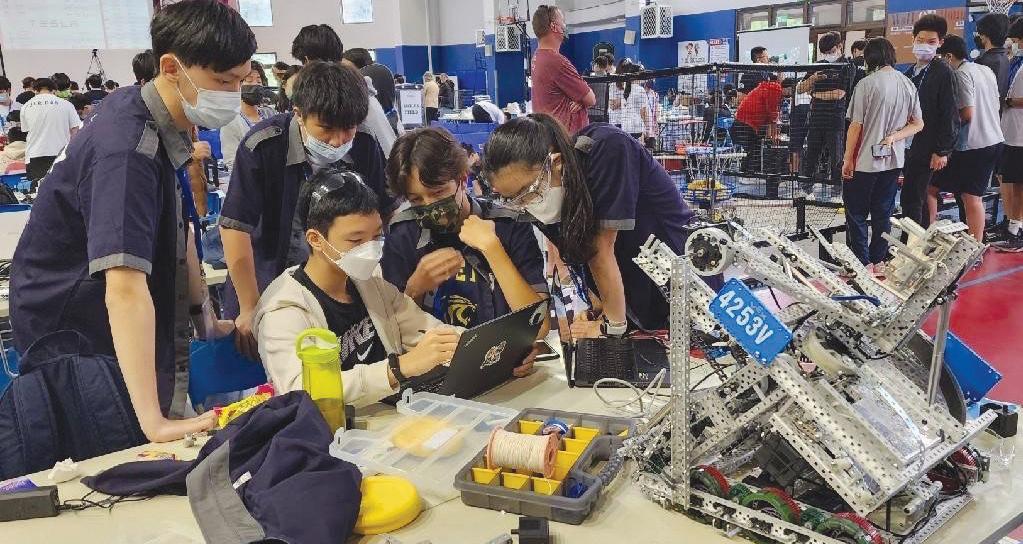
All parts should go together without forcing. You must remember that the parts you are reassembling were disassembled by you. Therefore, if you can’t get them together again, there must be a reason. By all means, do not use a hammer.
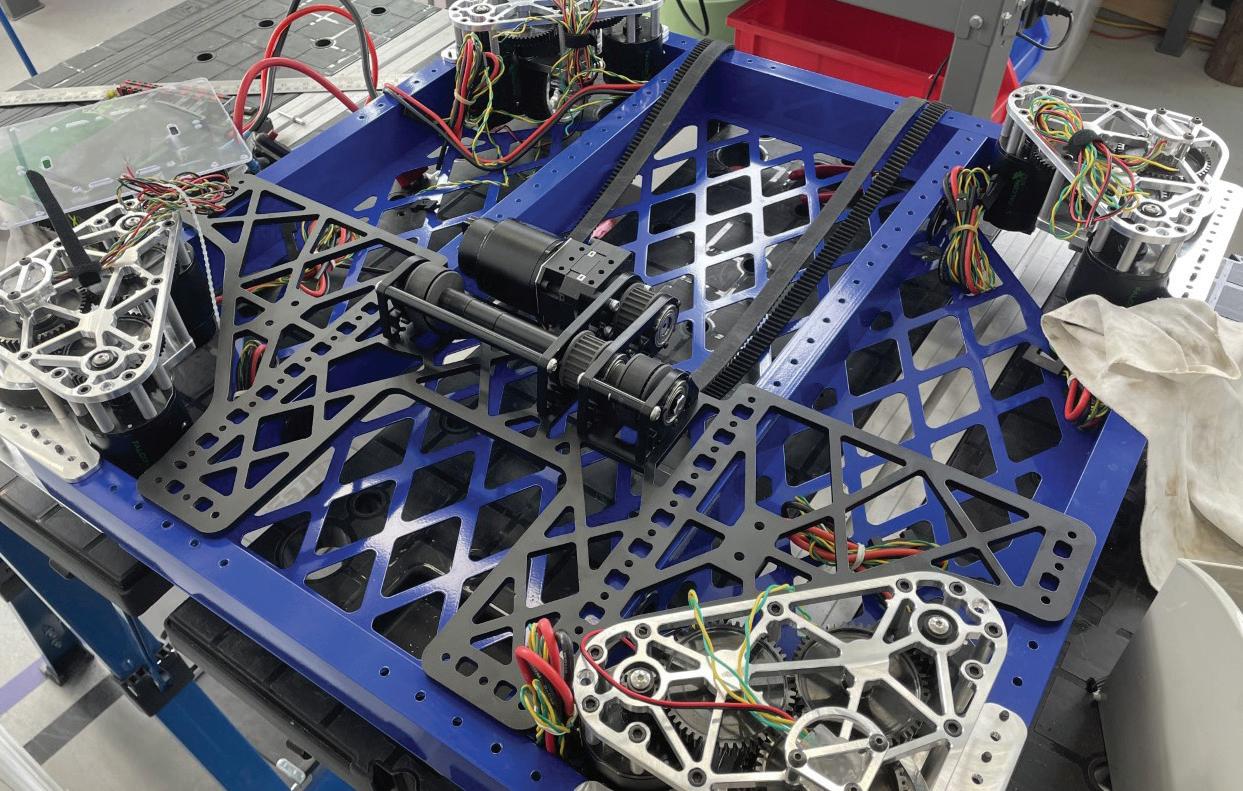
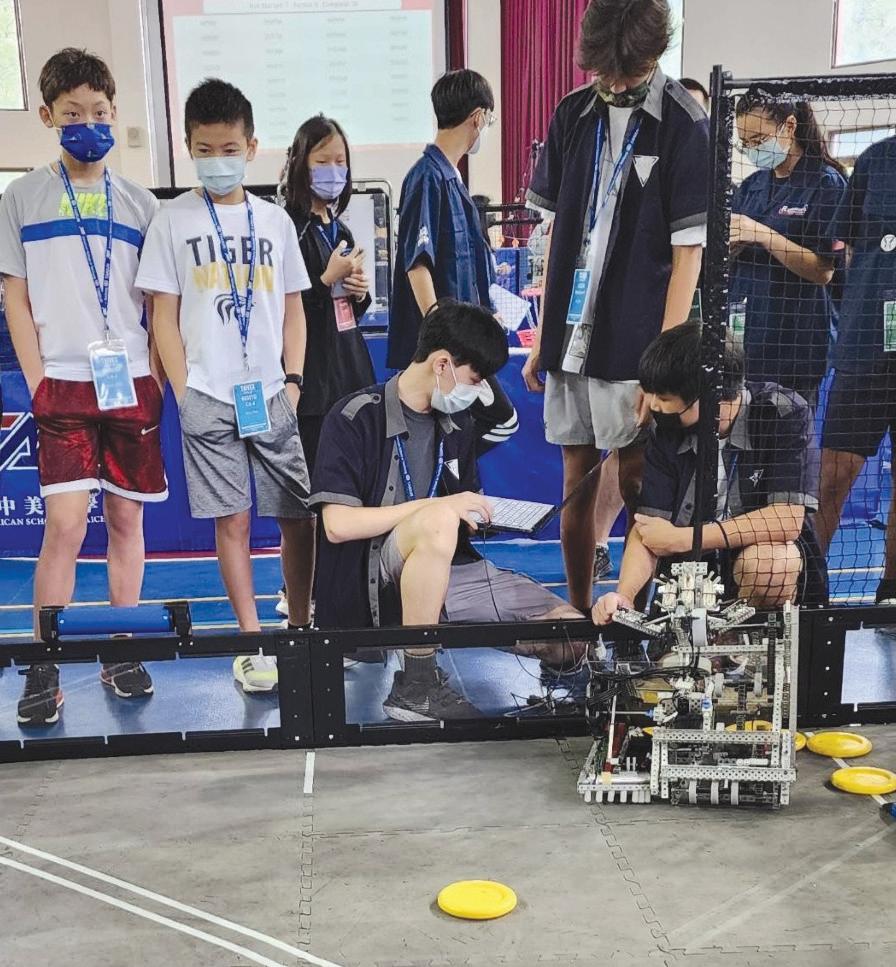
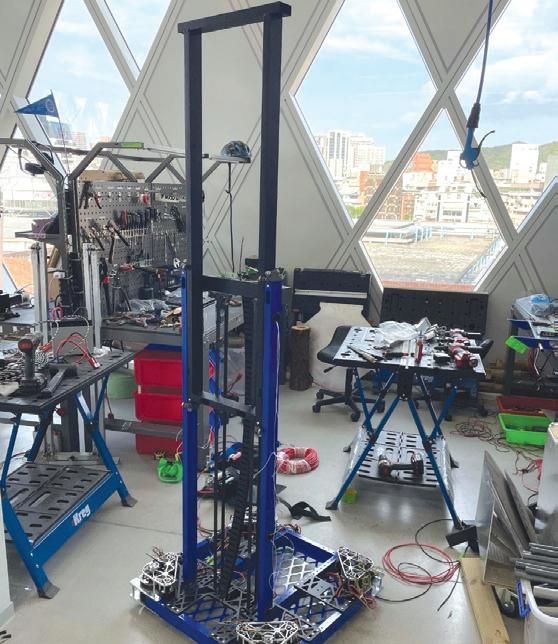
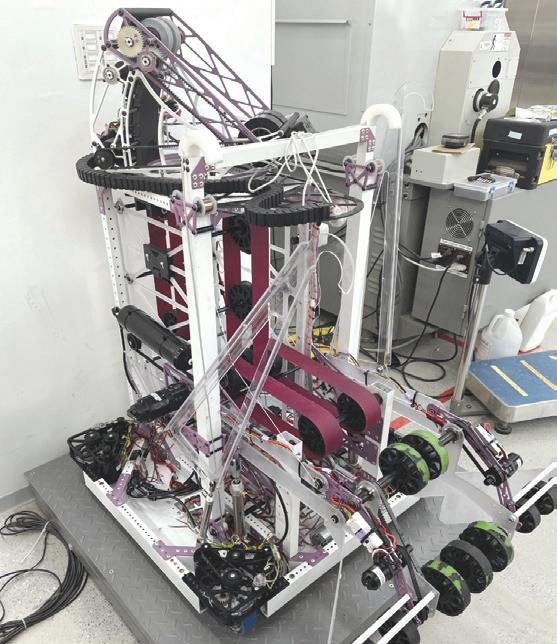
Duration: 1 year
Credit: 1
Grades: 10-12
Prerequisite: AP Computer Science, or Honors Algebra 2, or AP Physics, or permission from instructor; a laptop with 64 bit Operating System and 8+ GB of RAM
Homework: Moderate
This course provides a survey of modern computing. The primary focus of the course will be on machine learning and quantum computation. Classical logic gates will be introduced, moving onto introductory quantum mechanics, and then finally into applications of qubits. The course will transition into machine learning, neural networks and how they function. This will culminate in a personal research project at the end of the course. Recommended for students with a strong interest in applications of math, physics, or computer science.
Duration: 1 year
Credit: 1
Grades: 10-12
Prerequisite: AP Computer Science, or CS Dept. Chair’s permission; a laptop with 64 bit Operating System and 8+ GB of RAM
Homework: Heavy
This course gives an introduction to C-based object-oriented programming (C++ or C#) with a focus on creating video games. The first unit focuses on the unique syntax, advantages and pitfalls of object-oriented C-based programming. The second unit focuses on graphics using standard graphics libraries and event-based programming for interactive applications. The third unit focuses on creating games using a playcentric approach. All students complete a capstone project which consists of creating an interesting video game that will be submitted to international competitions like IndieCade and the Independent Game Festival.
Duration: 1 year
Credit: 1
Grades: 11-12
Prerequisite: Advanced achievement in Computer Science and Robotics courses and CS Dept. Chair’s approval
Homework: Moderate
Students who sign up for this course act as teaching assistants for various computer science and robotics courses. Under supervision by faculty, the student teacher helps provide timely assistance and feedback for students undertaking individualized building or programming projects. The course is graded as pass/fail.
Duration: 1 year
Credit: 1
Grades: 11-12
Prerequisite: Advanced achievement in Computer Science and Robotics courses and instructor’s permission
Homework: Heavy
This course is for students who want to pursue a research project at Taipei American School under the supervision of a faculty member. Students wishing to pursue off-campus research should instead sign up for Advanced Scientific Research.

A computer once beat me at chess, but it was no match for me at kick boxing.
Emo Philips
Duration: 1 year
Credit: 1
Grade: 9-12
Prerequisite: None
Homework: Light
This course explores the fundamentals of science and physics through experiments, demonstrations and activities designed to create a basic understanding of our physical universe. Motion, forces, energy, electricity, sound, and light are the core phenomena to be investigated throughout the year. The course will focus on experimental methods, procedures, and analysis of scientific data, with the intent of laying the foundation for success in chemistry and biology. Advanced math skills are not required for this course, which will cover the same topics as the other courses, but with a much greater emphasis on lab experiences and less on problem solving.
Text: Holt Physics (Serway-Faughn) (ISBN 978-0-030-36816-5
Duration: 1 year
Credit: 1
Grade: 9-12
Prerequisite: Successful completion of Pre-Algebra or Algebra 1 and Science Department recommendation
Homework: Moderate
This course illuminates the principles of physics through laboratory experiments, conceptual development activities, and some problem solving (but less than Honors Physics). The class includes similar activities and laboratory activities as Experimental Physics and Honors Physics with a balance of quantitative and conceptual acquisition of physics knowledge so that the students acquire the basis necessary for understanding the physical world. Motion, forces, electricity, sound, and light are some of the
topics. Science and Mathematics departments request students purchase the following calculator: TI-84 CE. It is available in the Tiger Shop.
Text: Holt Physics (Serway-Faughn) (ISBN 978-0-030-36816-5
Duration: 1 year
Credit: 1
Grade: 9-12
Prerequisite: Successful completion of Algebra 1, high level mathematics placement, and Science Department recommendation
Homework: Heavy
This course illuminates the principles of physics through laboratory experiments, conceptual development activities, and problem solving. The class includes most of the same activities and laboratory activities as Experimental Physics and Physics, but it also includes extensive problem solving for students with the appropriate mathematics background, good study skills, and proven record of accomplishment of excellent achievement in science and mathematics. Motion, forces, electricity, sound, and light are some of the topics. Criteria that will be used for student placement include student achievement in previous science courses, and mathematics placement. Science and Mathematics departments request students purchase the following calculator: TI-84 CE. It is available in the Tiger Shop.
Text: Holt Physics (Serway-Faughn) (ISBN 978-0-030-36816-5)
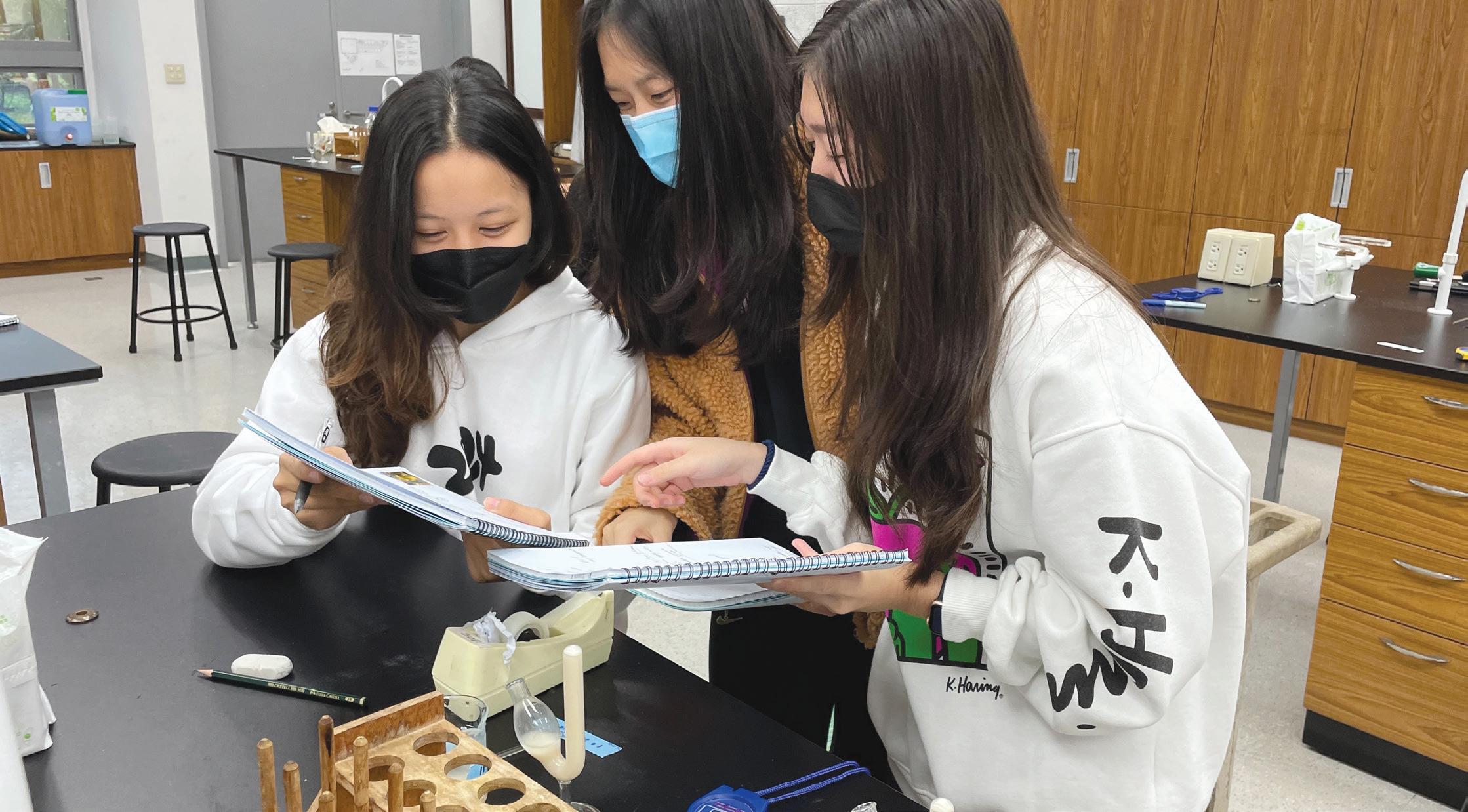
Scientific knowledge is a body of statements of varying degrees of certainty — some most unsure, some nearly sure, none absolutely certain.
Richard Feynman, theoretical physicist, 1965 Nobel Prize
Duration: 1 year
Credit: 1
Grades: 10-12
Prerequisite: Successful completion of Algebra 1 or department permission
Homework: Light
Experimental Chemistry explores the behavior of matter from a laboratoryfocused perspective. Students will perform lab exercises almost daily to attain understanding of concepts in chemistry. By analyzing and explaining what they have performed in the lab, students will develop their logic, writing, and explanatory skills in addition to becoming more critical thinkers and problem solvers. The course prepares students with the knowledge and skills to link this subject with items learned in Physics and will prepare students for the study of Biology as the same topics will be covered in this course as in the other Chemistry courses.
Text: Introduction to Chemistry 13th Edition (Hein, Wiley) and digital reader and resources are provided. (ISBN 978-0-470-50591-5)
Duration: 1 year
Credit: 1
Grades: 10-12
Prerequisite: Successful completion of Algebra 1
Homework: Moderate
This course is designed for students who may pursue science-oriented college studies after high school. The syllabus is structured to give students a strong foundational background in chemistry that will enable them to succeed in an introductory college level course. Theoretical concepts are accompanied as much as possible by “hands-on” activities; so, lab work constitutes a large proportion of class time. Students will learn to think critically, solve problems, and develop an awareness of the environment in which they live. They will also develop written communication and applied math skills.

Text: Introduction to Chemistry 13th Edition (Hein, Wiley) (ISBN 978-0-470-50591-5)
Duration: 1 year
Credit: 1
Grades: 10-12
Prerequisite: Recommendation of current (Physics) instructor
Homework: Heavy
Honors Chemistry provides an in-depth look at a wide range of Chemistry topics and their application. In laboratory situations, students will have the opportunity to develop their lab skills and problem solving skills as challenges arise. The first quarter is dedicated to forming a solid foundation in atomic theory, periodicity, and bonding.
Text: Chemistry (Brady, Senese, Jespersen) (ISBN 978-0-470-23440-2)
Duration: 1 year
Credit: 1
Grades: 11-12
Prerequisite: Recommendation of current (Chemistry) instructor
Homework: Moderate
This course is designed to be flexible in content and provide the student with a broad background in biology. The first quarter of study will be similar to the Biology course in the study of the basic nature of living things. From
there the course will diverge depending on student interest into molecular and cell biology, genetics, human anatomy and physiology, evolution, and ecology. Activities will include lectures, class discussions, laboratory experiences, and several projects.
Text: Campbell Essential Biology, 5th Edition (ISBN 978-0-321-77259-6)
Duration: 1 year
Credit: 1
Grades: 11-12
Prerequisite: Recommendation of current (Chemistry) instructor
Homework: Moderate
This course is designed to provide the student with a broad background in biology. Students will develop an understanding of the basic nature of living things, molecular and cell biology, genetics, human anatomy and physiology, evolution, and ecology. Activities will include lectures, class discussions, laboratory experiences, and projects.
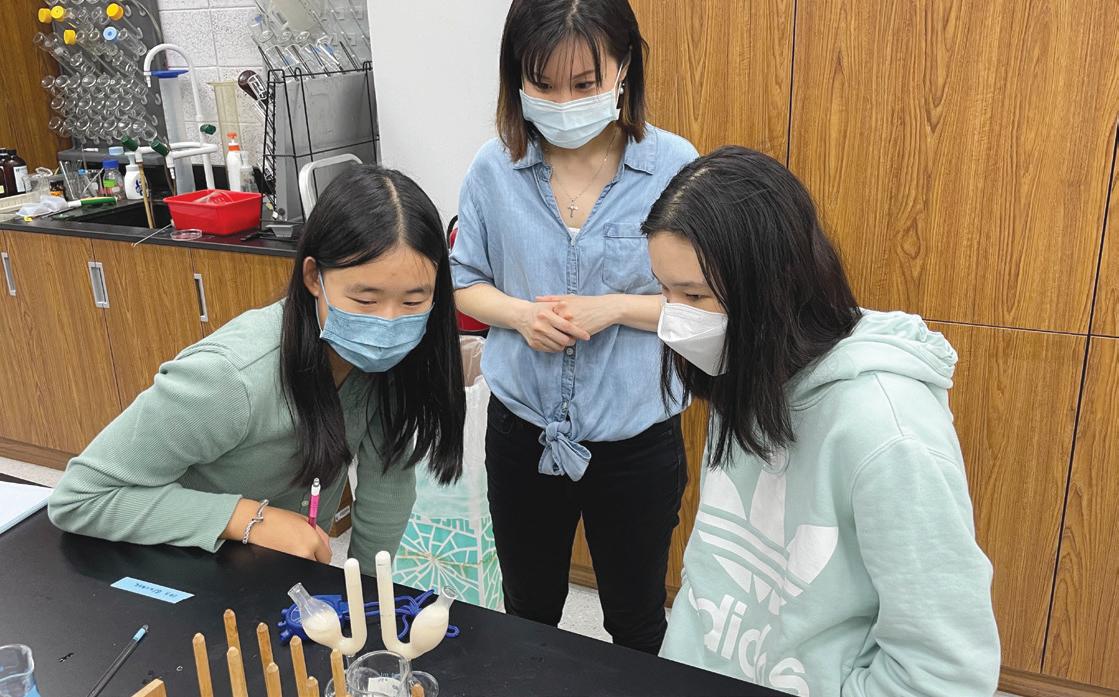
Text: Biology Life on Earth with Physiology 11th Edition (Pearson) (ISBN 978-0-133-92300-1)
Gertrude B. Elion, biochemist, pharmacologist, 1988 Nobel Prize
I hadn’t been aware that there were doors closed to me until I started knocking on them.
AP (Advanced Placement) and ELECTIVE COURSES: See prerequisites for each course. Typically, students must take the honors course in order to take the AP course in the same discipline.
See prerequisites for each course in the course descriptions. Students take physics in the 9th grade, chemistry in the 10th grade, and biology in the 11th grade. Placement in a “regular,” “conceptual,” or “honors” course does not guarantee or imply placement in the same level in subsequent years.
IB PROGRAM: This course of study starts in 11th grade. Students must meet with the IB program coordinator and commit to two-year courses.
Honors
Honors
NOTES:
• All three sciences, physics, chemistry, and biology, are required for graduation.
Honors
Honors
Honors
Honors Quantum Mechanics and Relativity
Research in Chemistry
Honors
Research in Chemistry
Independent Research Internship (1 and 2)
Anatomy & Physiology of Movement
• The TAS Summer Academy, for students with very strong student skills, offers flexibility in course selection over four years of science and enhances opportunities for scientific research.
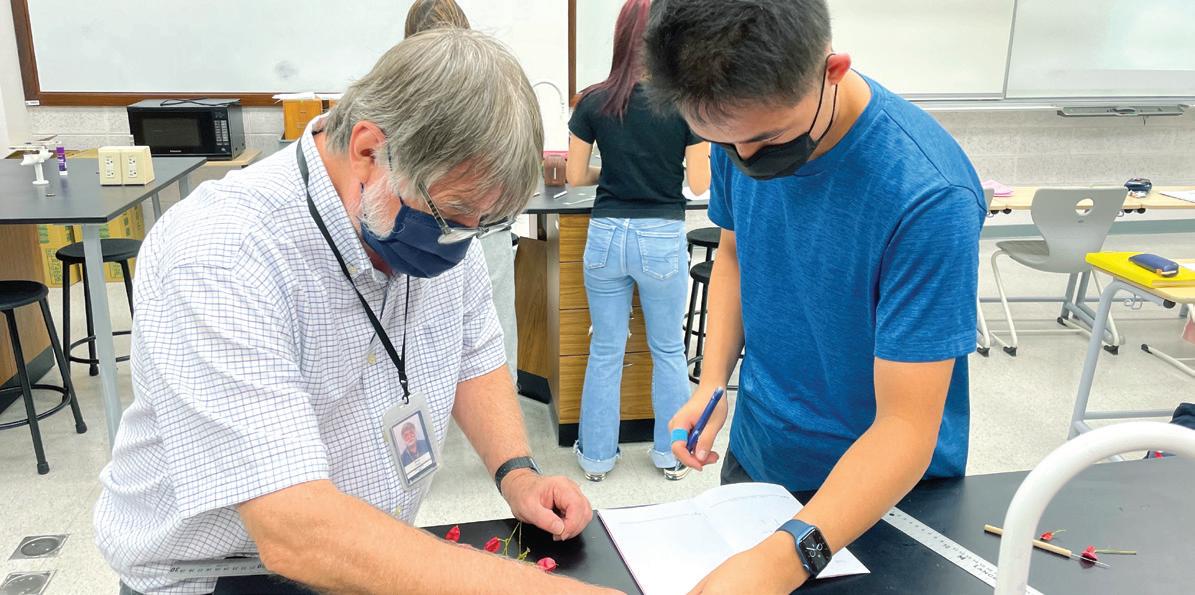
• Students with a passion for science and research are encouraged to take advantage of the opportunities in scientific research.
• Availability of elective courses depends on student interest.
• All students should make a four-year plan of study in science to meet prerequisites to achieve their goals.
• Class sizes are capped in some courses.
Duration: 1 year
Credit: 1
Grades: 11-12
Prerequisite: Recommendation of current (Chemistry) instructor
Homework: Heavy
Honors Biology is a year-long course designed to expose students to the major topics in biological science. It is a laboratory based course which emphasizes the development of biology laboratory skills, as well as critical thinking skills. The course will emphasize the gathering, assessment, and interpretation of scientific data. Topics in biology to be studied include cell biology, energy relationships, and body systems, patterns of inheritance, evolution, and ecological principles. The course provides a broad foundation in biological principles for students who wish to undertake further study in biology through enrollment in Advanced Placement Biology or in Advanced Placement Environmental Science and as an honors level introductory biology course for students who do not plan further studies in biology.
Text: Inquiry into Life, 13th Edition (Mader) (ISBN 978-0-077-28010-9)
Duration: 2 years
Credit: 1 per year
Grade: 11-12
Prerequisite: Chemistry
Homework: Heavy
The IB Standard Level syllabus is followed in this two-year course. With an emphasis on the nature of science, four basic biological concepts are woven into the course: structure and function, universality versus diversity, equilibrium within systems, and evolution. Laboratory activities will emphasize planning skills, data collection, data analysis, evaluation, and manipulative and personal skills. A multidisciplinary Group 4 Project constitutes a compulsory component of this class and requires student attendance outside of regularly scheduled class hours, most likely on one Saturday or Sunday. IB laboratory investigations and one formal Internal Assessment (IA) will require students to gain mastery in statistics, data analysis, and advanced lab writing skills. The IA will constitute 20% of the final IB score. Core concepts from the curriculum include cell biology, molecular biology, genetics, ecology and evolution, and human physiology.
Text: Pearson Baccalaureate Biology for the IB Diploma: Standard Level, (Tosto, Damon, Mcgonegal, Ward) (ISBN 9781447959045)
IBHL
Duration: 2 years
Credit: 1 per year
Grades: 11-12
Prerequisite: Chemistry
Homework: Heavy
The IB Higher Level syllabus is followed in this two-year course. With an emphasis on the nature of science, four basic biological concepts are woven into the course: structure and function, universality versus diversity, equilibrium within systems, and evolution. Laboratory activities will emphasize planning skills, data collection, data analysis, evaluation, and manipulative and personal skills. A multidisciplinary Group 4 Project constitutes a compulsory component of this class and requires student attendance outside of regularly scheduled class hours, most likely on one Saturday or Sunday. IB laboratory investigations and one formal Internal Assessment (IA) will require students to gain mastery in statistics, data analysis, and advanced lab writing skills. The IA will constitute 20% of the final IB score. Core concepts from the curriculum include cell biology,
molecular biology, genetics, ecology and evolution, and human physiology. The distinction between SL and HL is one of breadth and depth.
Text: Pearson Baccalaureate Biology Higher Level 2nd Edition, (Tosto, Mcgonegal, Ward, Damon) (ISBN 9781447959007)
IBSL CHEMISTRY 1 (USCI14)
IBSL CHEMISTRY 2 (USCI141)
Duration: 2 years
Credit: 1 per year
Grade: 11-12
Prerequisite: Successful completion of or concurrent enrollment in Algebra 2 Homework: Heavy
The IB Standard Level syllabus is followed in this two-year course. Laboratory activities will emphasize planning skills, data collection, data analysis, evaluation, and manipulative and personal skills. Students will spend at least 40 hours on practical work including 10 hours on their Group 4 Project. This multidisciplinary lab project constitutes a compulsory component of this class and will require student attendance outside of regularly scheduled class hours. The course includes stoichiometry, atomic theory, periodicity, bonding, energy, kinetics, equilibrium, acids and bases, electrochemistry and organic chemistry. The course provides excellent support for students preparing to pursue study in any of the Scientific or Engineering fields. Students are required to sit the IB exam at the completion of year two.
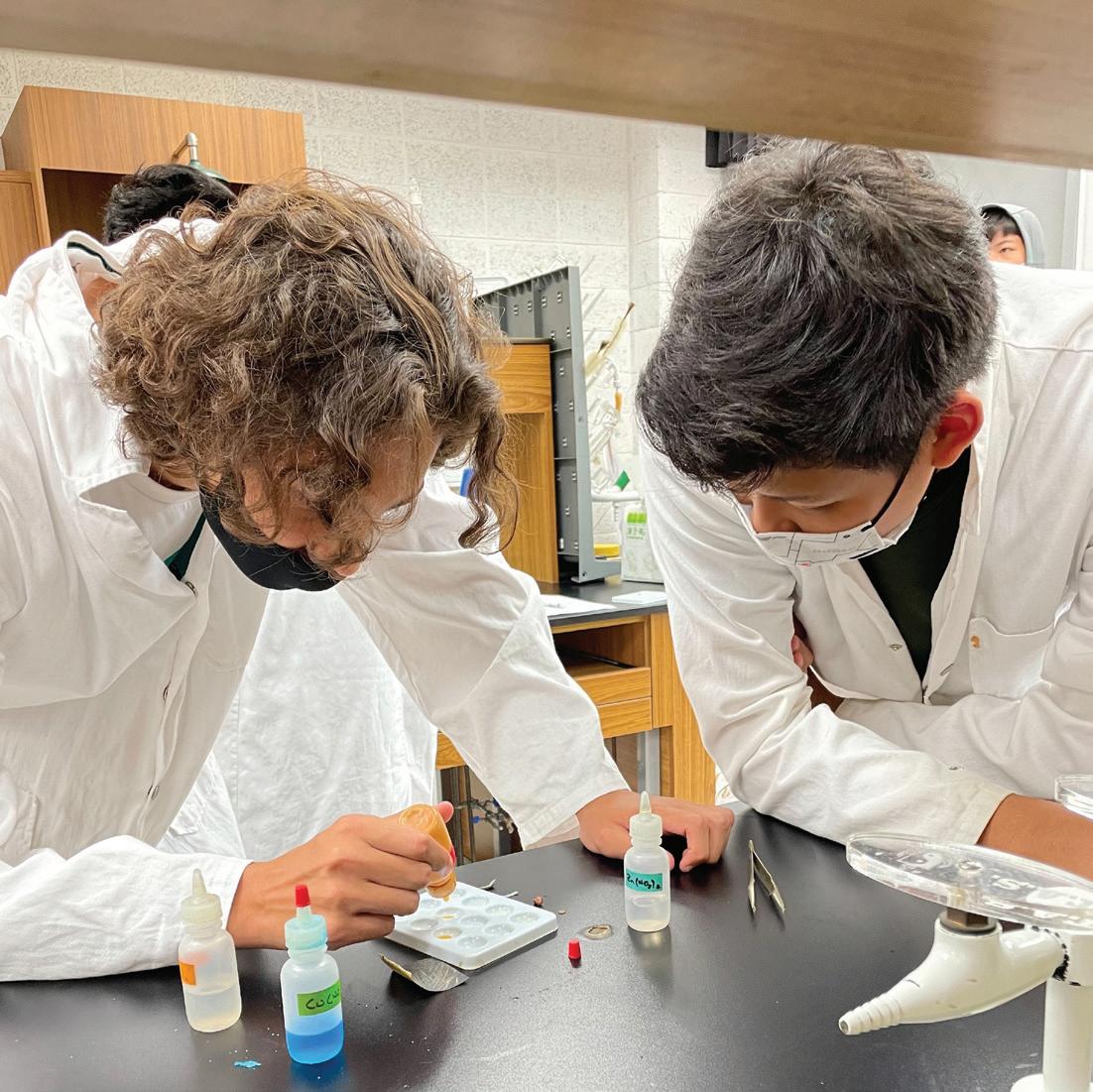
Note: Honors Chemistry cannot be taken in lieu of IBSL 1
Text: Pearson Baccalaureate Chemistry Higher Level (Pearson Education) ISBN 978-1-447-95975-5)
IBHL CHEMISTRY 1 (USCI12)
IBHL CHEMISTRY 2 (USCI13)
Duration: 2 years
Credit: 1 per year
Grade: 11-12
Prerequisite: Successful completion of or concurrent enrollment in Algebra 2 Homework: Heavy
IB Chemistry is a rigorous and fast-paced two-year sequence of courses satisfying a Higher Level (HL) requirement for an IB diploma. It is equivalent to a first-year college course and emphasizes the development of higher thinking skills by the study of theoretical concepts and laboratory investigations. Students will spend 60 hours on practical work including 10 hours on their Group 4 Project. This multidisciplinary lab project constitutes a compulsory component of this class and will require student attendance outside of regularly scheduled class hours. The course includes stoichiometry, atomic theory, periodicity, bonding, energy, kinetics, equilibrium, acids and bases, electrochemistry and organic chemistry. The course provides excellent support for students preparing to pursue study in any of the Scientific or Engineering fields. Students are required to sit the IB exam at the completion of year two.
Note: Honors Chemistry cannot be taken in lieu of IBHL 1.
Text: Pearson Baccalaureate Chemistry Higher Level (Pearson Education) (ISBN 978-1-447-95975-5)
Duration: 1 year
Credit: 1
Grades: 11-12
Prerequisite: Honors Biology and Honors Biology teacher’s recommendation
Homework: Heavy
This course is the equivalent of a college biology course and considers in detail such topics as biochemistry, cells, genetics, microbiology, and body structure and function. Emphasis is placed on laboratory activities and gaining an understanding of how biological information is collected and interpreted. The syllabus is structured so that a student will be prepared for the required AP examination at the completion of the course.
Text: Campbell Biology in Focus (Campbell) (ISBN 978-0-321-81380-0)
Duration: 1 year
Credit: 1
Grades: 10-12
Prerequisite: Honors Chemistry and Honors Chemistry teacher’s recommendation (or completion of Summer Academy Honors Chemistry course)
Homework: Heavy
AP Chemistry is equivalent to a first year university chemistry course. Students should expect a fast-paced, rigorous course, with emphasis on critical thinking skills. Laboratory work involves significant problem solving, with numerous opportunities to extend lab skills in both quantitative and qualitative analyses.

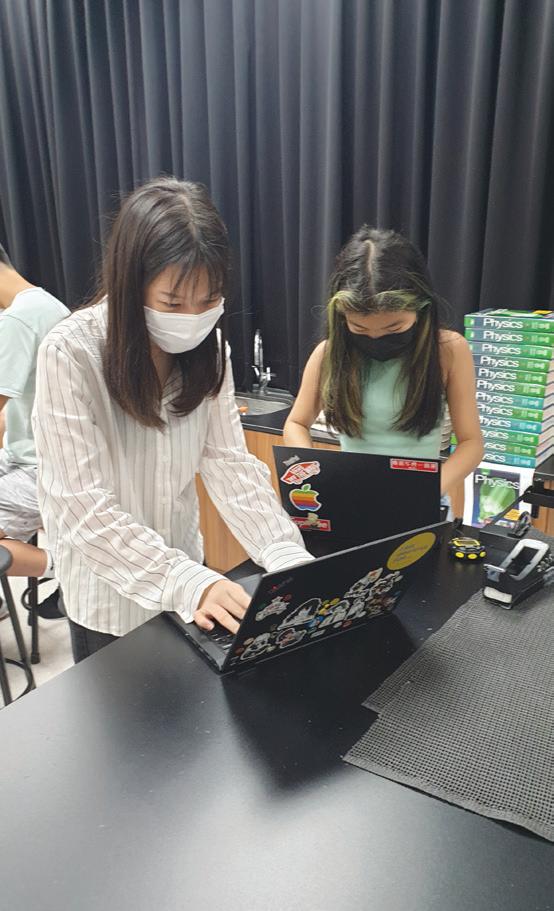
Text: Chemistry, (Wiley), 7th Edition (Jesperson, Hyslop) (ISBN 978-1-118-51646-1)
Duration: 1 year
Credit: 1
Grades: 10-12
Prerequisite: Successful completion of Algebra 2, completion of Physics, and Physics teacher’s recommendation.
Homework: Heavy
The AP Physics 1 course is equivalent to a semester college physics course. The course will foster a greater conceptual understanding of fundamental physics principals, concepts, and skills through student centered and inquiry based instruction. AP Physics 1 will focus on big ideas as opposed to content coverage. Time will be spent on engaged inquiry-based learning of essential concepts to help develop critical thinking and reasoning. Topics include Kinematics, Newton’s Laws, Torque, Rotational Motion, Angular Momentum, Work, Energy, Power, Momentum, Oscillations, Waves, Sound, and an introduction to circuits. The AP Physics 1 course provides a readiness for the study of further topics in other college level courses such as Physics 2, life sciences, pre-medicine, or applied sciences. The course meets the syllabus requirements for the required Advanced Placement Physics 1 test.
Text: Introduction to Physics 8th Edition (Cutnell and Johnson) (ISBN 978-0-470-40942-8)
Duration: 1 year
Credit: 1
Grades: 10-12
Prerequisite: Successful completion of Honors Physics, Algebra 2, and Honors Physics teacher’s recommendation.
Homework: Heavy
The AP Physics 2 course is equivalent to a semester college physics course. Understanding fundamental physics principals and applications of concepts and skills learned in Honors Physics or AP Physics 1 is essential to be successful in the course. Critical thinking and reasoning will be developed through student centered and inquiry based instructional practices. First semester topics include a review of Kinematics, Newton’s Laws, Work, Energy, Power, and Momentum. Other topics of study throughout the year include Fluids, thermodynamics, Kinetic Theory, Electrostatics, Electrical Circuits, Magnetic Fields, Electromagnetism, Optics, and Modern Physics. Students who would like to take the AP Physics 1 test will need to complete additional review materials on their own. The Physics 2 course provides a readiness for the study of advanced topics in other college level courses such as life sciences, pre-medicine, or applied sciences.
Text: Introduction to Physics 8th Edition (Cutnell and Johnson) (ISBN 978-0-470-40942-8)
The good thing about science is that it’s true whether or not you believe in it.
Duration: 1 year
Credit: 1
Grade: 10-12
Prerequisite: Successful completion or concurrent enrollment in AP Calculus BC or AB, completion of Honors Physics, AND Honors Physics teacher’s recommendation
Homework: Heavy
The Physics C course forms the first part of a rigorous college sequence that serves as the foundation of physics for students majoring in the physical sciences or engineering. The sequence is concurrent with or preceded by mathematics courses that include calculus. Methods of calculus are used wherever appropriate in formulating the physical principles and in applying them to physical problems. The sequence is more intensive and analytic than that in the AP Physics 1 and 2. Strong emphasis is placed on solving a variety of challenging problems, some requiring calculus. The subject matter of the C course is mechanics, followed by electricity and magnetism, with approximately equal emphasis on these two areas of study. The course meets the syllabus requirements for the required Advanced Placement Physics C exam.
Text: Physics for Scientists & Engineers, 7th Edition (Serway & Jewett) (ISBN 978-0-495-11223-5)
Duration: 1 year
Credit: 1
Grades: 11 and 12
Prerequisite: Honors Chemistry and Honors Biology
Homework: Heavy
This class is equivalent to a semester college environmental science course. The course is interdisciplinary, involving concepts from chemistry, biology, earth science, economics, political science, and ethics. The goal of the course is to provide students with the science principles, concepts, and methodologies required to understand the interrelationships of the natural world. A concentrated focus is made on human impact on the environment and sustainable practices. Thus, sustainability, climate change, agriculture, air and water pollution, energy and human population growth are at the heart of the course content. Students are required to take the AP exam upon completion of the course.
HONORS SPORTS AND EXERCISE SCIENCE (UHPE11H)
Duration: 1 year
Credit: 1
Grade: 12
Homework: High
The Sport, Exercise and Health Science IB and Honors course is the study of physiological and biochemical responses of the human body to exercise. This course introduces the physiology of exercise with an emphasis on topics in metabolism and muscle physiology. It describes the acute effects of exercise and the influence of chronic exercise training on various functional systems in different populations (age and gender) and under different environmental conditions. Ergogenic and nutritional factors are considered from a physiological perspective.
IB students are required to sit the external IB examination in addition to completing an internal assessment research project that includes a literature review, study design, data collection, data analysis, and results and discussion of your findings.
Honors students will conduct a review of literature in which the subject
matter will be narrowly focused on a specific issue in exercise, sport or health science. Students will be able to select from a list of preselected topics or, if approved, a self-selected area of interest.
NOTE TO STUDENTS: When possible, sign up for 2 Semester courses in Science! Sign up for Astronomy, Anatomy and Physiology, or others to round out your course schedule. Electives may or may not be offered depending on student interest.
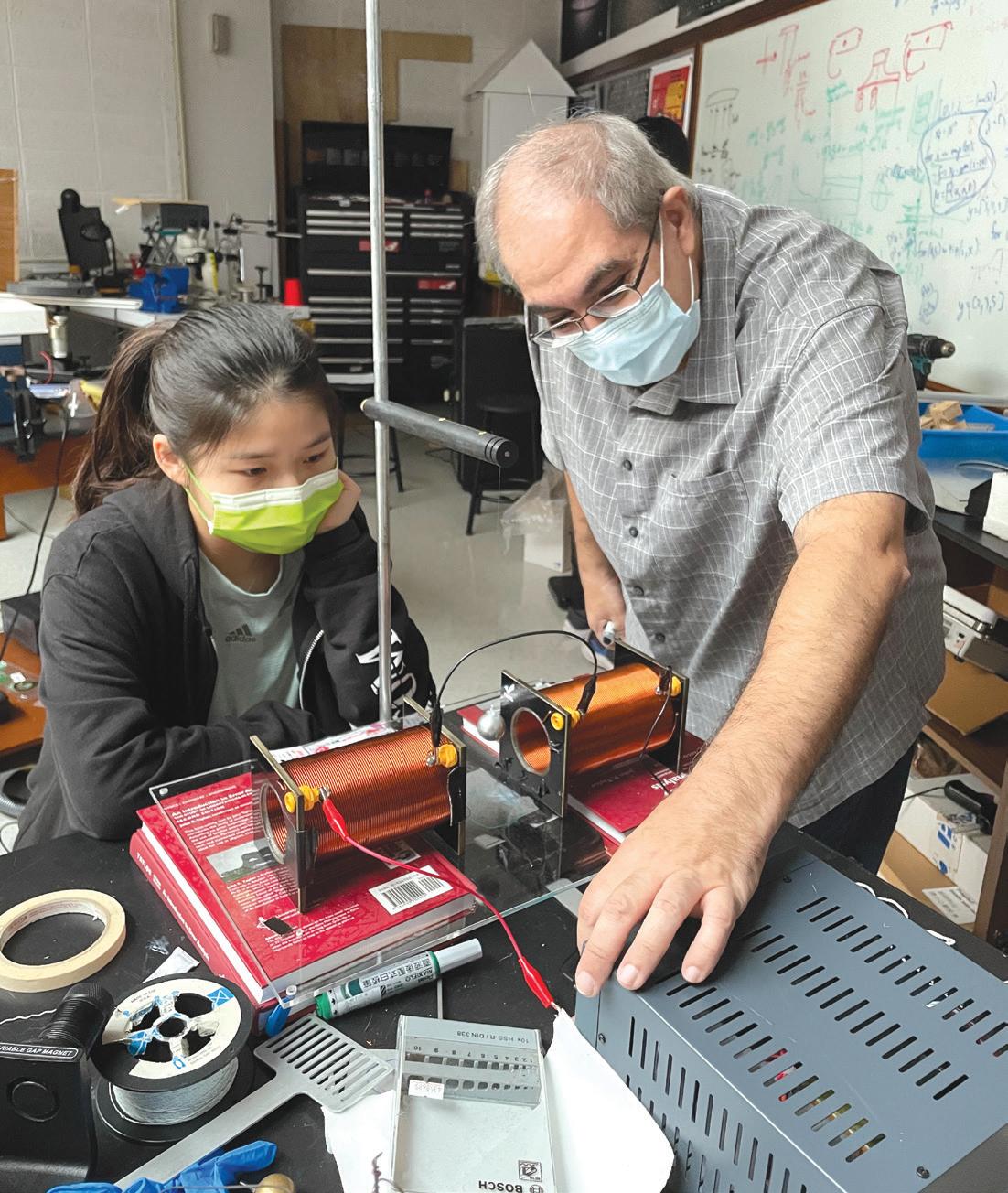
Duration: 1 semester
Credit: 0.5
Grades: 11–12
Prerequisite: Completion of Biology, Honors Biology, IBSL Biology Yr 1, or IBHL Biology Yr 1
Homework: Light
This semester-long course addresses foundational questions - how are we built? How do we move? Students will study the form and function of the human body as it relates to movement, focusing on the muscular system, energy metabolism, mechanics, and nutrition. Students will learn about the cardiovascular and respiratory responses to exercise that ensure adequate oxygen delivery to contracting skeletal muscles. Joints as levers and how neurotransmitters stimulate skeletal muscle contraction are a part of the curriculum. The content of this course is complemented through microscopy work, dissections, and experimentation. This course is wonderfully suited for those who are interested in kinesiology, physical therapy, exercise science – and those who are generally interested in the science behind being healthy and fit. At the end of the semester, students will have a better understanding of their athlete within!
Text: Biology Life on Earth with Physiology 11th Edition (Pearson) (ISBN 978-0-133-92300-1
Duration: 1 semester, offered in both semesters
Credit: 0.5
Grades: 11-12
Prerequisites: Completion of Physics and Chemistry; completion or concurrent enrollment in Biology
Homework: Light
Forensic science is a multidisciplinary applied science, encompassing Biology, Chemistry, Physics, and crime scene investigation (CSI). This course will focus on forensic science concepts, including inquiry performance, crime scene investigation, ballistics, fiber evidence, DNA analysis, fingerprinting, trace evidence, blood splatter, tool mark evidence, forensic anthropology, and other applicable concepts of student interest.
Class is lab-based and grading will consist of group lab reports, performance assessments where students practice the skills of a CSI scientist, and on student performance on a semester project. The individual or group project allows students to dive deeper into any topic of interest related to the burgeoning field of Forensic Science.
Text: Forensics Science Fundamentals and Investigations (Bertino) (ISBN: 978-0-538-73155-3)
Duration: 1 semester
Credit: 0.5
Grade: 10-12
Prerequisite: Physics or Honors Physics and completion of Pre-calculus or enrollment in higher level math course.
Homework: Heavy
This course is ideal for physics students who want to better understand the magical world of quantum mechanics and special relativity! Students first learn the essentials of special relativity, time dilation, the Lorentz transformation, relativistic momentum and energy, including the origin of Einstein’s E=mc2. The course then shifts gears to the early quantum theory of Bohr, de Broglie, and Schrodinger culminating in the Copenhagen doctrine of quantum mechanics. Students learn to solve the Schrodinger equation both qualitatively and by explicit solution of the Schrodinger equation for simple potential energy profiles corresponding to 1D quantum wells and 3D quantum dots. Python computer code also allows students to solve the Schrodinger equation for more general 1D potential energy profiles. Some previous programming experience would be useful but is not assumed. Finally, we consider the foundational issues in quantum mechanics provoked by recent experimentally verified properties of entanglement, such as non-locality, Bell’s theorems, relativity, and de Broglie – Bohm theory. We try to answer the Einstein questions: Is there “spooky action at a distance”? Does “God play dice with the universe?” For students who have a very busy schedule, there is a non-honors option for this course which will have less homework.
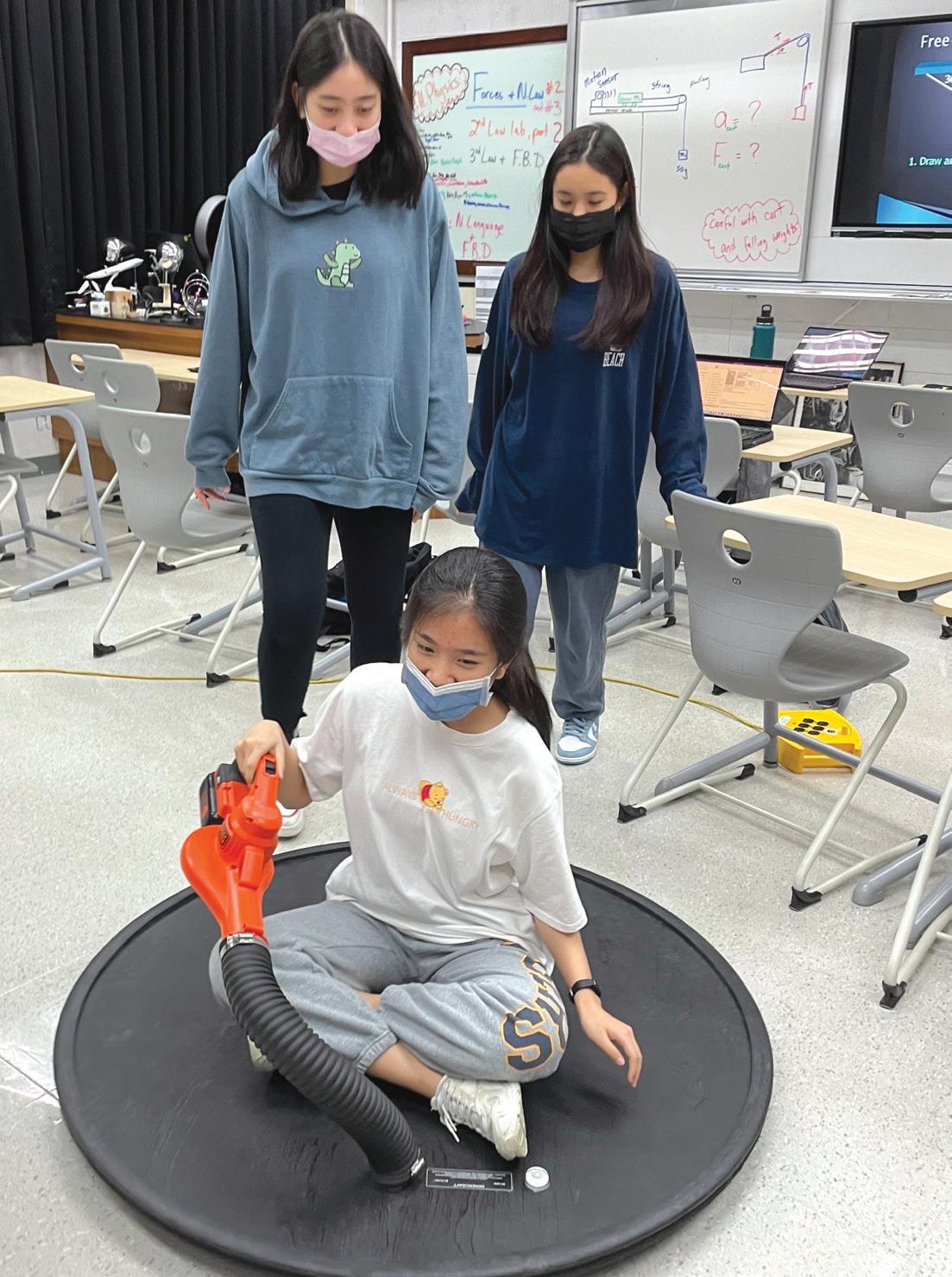
Text: Teacher’s notes plus Concepts of Modern Physics (Beiser) (ISBN: 978-9-351-34185-7) and QED: The Strange Theory of Light and Matter (Feynman)( ISBN: 978-0691164090).
Duration: 1 semester
Credit: 0.5
Grade: 10-12
Prerequisite: Physics or Honors Physics and completion of Pre-calculus or enrollment in higher level math course.
Homework: Heavy
This computer science course is ideal for science-mathematics students who wish to learn about numerical modeling of dynamic systems which vary in time and may have numerous applications in science research courses. After a quick review of Python essentials, students learn how to use Numpy and Scipy libraries in Python to quickly evaluate, solve, and visualize the solutions of the types of systems of coupled ordinary and partial differential equations that describe physical, chemical and/ or biological systems. Topics include visualization of data and solutions using Matplotlib and Vpython libraries, Fourier transform methods, initial conditions, boundary conditions, function spaces, phase space methods. Several advanced topics are introduced and demonstrated including using Lagrangian methods to obtain differential equations from potential energy expressions and finite difference and finite element for numerically solving systems of partial differential equations in complex domains.
Text: None. Course materials supplied by the teacher.
Duration: 1 semester
Credit: 0.5 (1 semester)
Grades: 9-10
Prerequisite: none
Homework: Light to Moderate
The Introduction to Science Research course is designed for high school students who are interested in understanding how scientists investigate real-world problems. Students will research, plan, design and test a series of hands-on science projects in all three major scientific disciplines: Physics, Chemistry and Biology. The main goal of this course is to introduce students who have never taken a research course to the research process and provide them with an opportunity to apply a logical approach to scientific questions. This course is ideal for 9th or 10th grade students who are looking for a solid foundation in research methods and data evaluation before they take another research course later in high school or in college.
Text: STEM Student Research Handbook (Harland, DJ) (ISBN: 978-1-936-13724-4)
NOTE: Honors Research class is a year-long class.
Duration: 1 year or 1 semester (1 semester option must be completed in Semester 1)
Credit: 1.0 (1 year); 0.5 (1 semester)
Grades: 10-12
Prerequisite: Successful completion of Physics or Honors Physics. For Honors: One semester previous research or enrollment in AP/IBHL Chem.
Homework: Moderate (Heavy for Honors)
The Research in Chemistry course is designed as an experimental based course for students interested in various research projects in Chemistry. Students will have the opportunity to design a project that involves one (or more) of the following branches of Chemistry: Material, Analytical, Biochemical, Computational, Organometallic, Organic or Inorganic chemistry. The goal of this course is threefold by providing students with 1) an understanding of how to create a viable chemical research project with multiple variables; 2) a knowledge of how to use a variety of instrumentation, chemical techniques and literature databases; and 3) an avenue to present their findings in written, oral and poster form to teachers and students of other research classes. Truly excellent work may have the option to publish their findings in a chemical journal or present at a chemistry conference. This course is ideal for students looking for a solid foundation on how a research lab operates before they attend college. In order to promote flexibility for students, this course will be designed to complement other research courses and programs.
NOTE: This course can partially fulfill the requirements for the year-long research project in AP Capstone Diploma program.
Text: STEM Student Research Handbook (Harland, DJ) (ISBN: 978-1-936-13724-4)
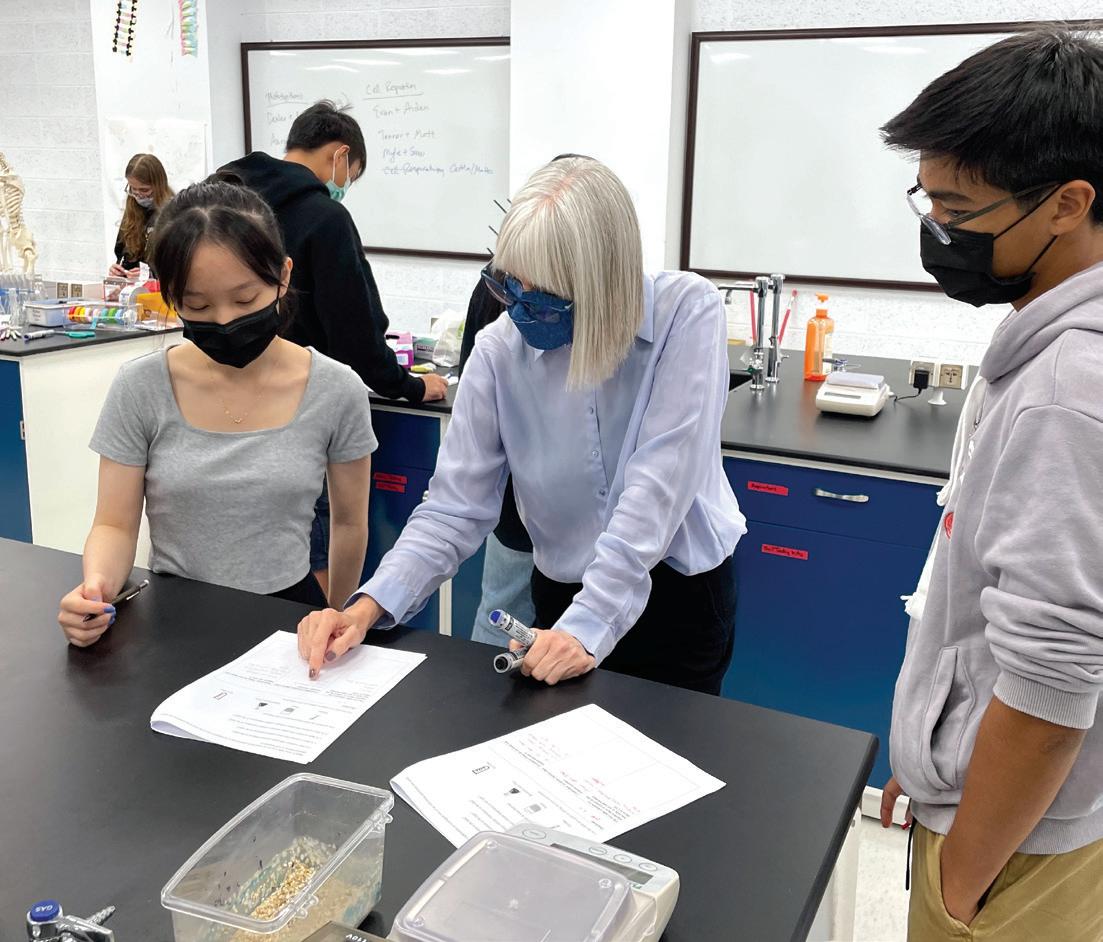
Note: Honors Research class is a year-long class.
Duration: 1 year or 1 semester (1 semester option must be completed in Semester 1)
Credit: 1.0 (1 year); 0.5 (1 semester)
Grades: 10-12
Prerequisite: Successful completion of Physics or Honors Physics. For Honors: One semester previous research or enrollment in AP/IBHL Bio.
Homework: Moderate (Heavy for Honors)
The Research in Biology course is designed as an experiment-based course for students interested in conducting their own unique research projects. All students in the class will conduct an independent research project based upon a common theme. The goals of this course are threefold: 1) develop the skills needed to design and conduct a unique and relevant research project; 2) build a knowledgebase of how to use a variety of instrumentation, analytical techniques and literature databases; and 3) provide an avenue to present their findings in written, oral and poster form to teachers and students of other research classes. Exceptional work may have the opportunity to publish their findings in a science journal, enter an appropriate scientific competition, or apply to present at a scientific conference. This course is ideal for students looking for a solid foundation in a research lab before they attend college.
Note: This coursework can partially fulfill the requirements for the year-long, research project in AP Research Capstone (Diploma Program).
Text: STEM Student Research Handbook (Harland, DJ) (ISBN: 978-1-936-13724-4)
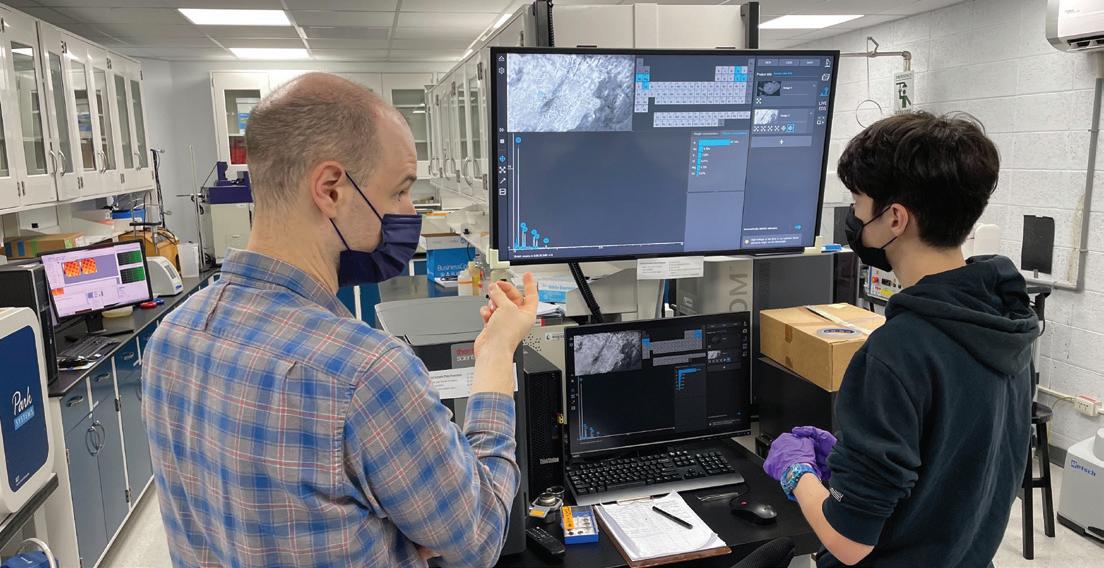
NOTE: Honors Research class is a year-long class.
Duration: 1 year or 1 semester (1 semester option must be completed in Semester 1)
Credit: 1.0 (1 year); 0.5 (1 semester)
Grades: 10-12
Prerequisite: Successful completion of Physics or Honors Physics. For Honors: One semester previous research or enrollment in AP Physics. Homework: Moderate (Heavy for Honors)
The Research in Physics course is designed as an experiment-based course for students interested in various research projects in Physics. The goal of this course is threefold by providing students with 1) an understanding of how to create a viable physics research project with multiple variables; 2) a knowledge of how to use a variety of instrumentation, techniques and literature databases; and 3) an avenue to present their findings in written, oral and poster form to teachers and students of other research classes. Truly excellent work may have the option to publish their findings in a scientific journal or present at an academic conference. This course is ideal for students looking for a solid foundation on how a research lab operates before they attend college. In order to promote flexibility for students, this course will be designed to complement other research courses and programs.
NOTE: This course can partially fulfill the requirements for the year-long research project in AP Capstone Diploma program.
Text: STEM Student Research Handbook (Harland, DJ) (ISBN: 978-1-936-13724-4)
Duration: 1 year
Credit: 1
Grades: 11-12
Prerequisite: Successful completion of a full year TAS research course, AND successful completion or current enrollment in an honors science course (chemistry or biology)
Homework: Moderate to Heavy
The Honors Research course in Synthetic Biology is for students who are interested in biotechnology and engineering. This course offers a unique opportunity to motivated high school students who possess a strong interest in pursuing advanced education in bioscience and biomedical science. The centerpiece of the course is an immersive laboratory experience in which students work in teams to learn the practical and theoretical underpinnings of synthetic biology research. Broadly, the course explores how cellular regulation can be used to engineer cells that accomplish well-defined goals. Students will first learn to critically analyze results, carefully measure and test experiments, and effectively communicate complex ideas through a variety of team-based activities and labs involving report writing, synthetic biology techniques, and presentations. Ultimately, the course culminates in a student-driven and student-chosen team project that aims to create a product or solve a problem through synthetic biology.
Students are expected to develop hands-on skills in Pipetting, Solution Preparation, Spectrophotometry, Bacterial Transformation, DNA and Protein Gel Electrophoresis, Sterile Technique, Microbiology, Molecular Cloning, PCR, and Protein Purification. In addition, students will learn to read research papers and communicate their research to peers and as oral and poster presentations at the TAS Scientific Research Symposium at the end of each semester. Students also have the opportunity to present their work at the BioBuilderClub Final Assembly, an international high school synthetic biology conference.
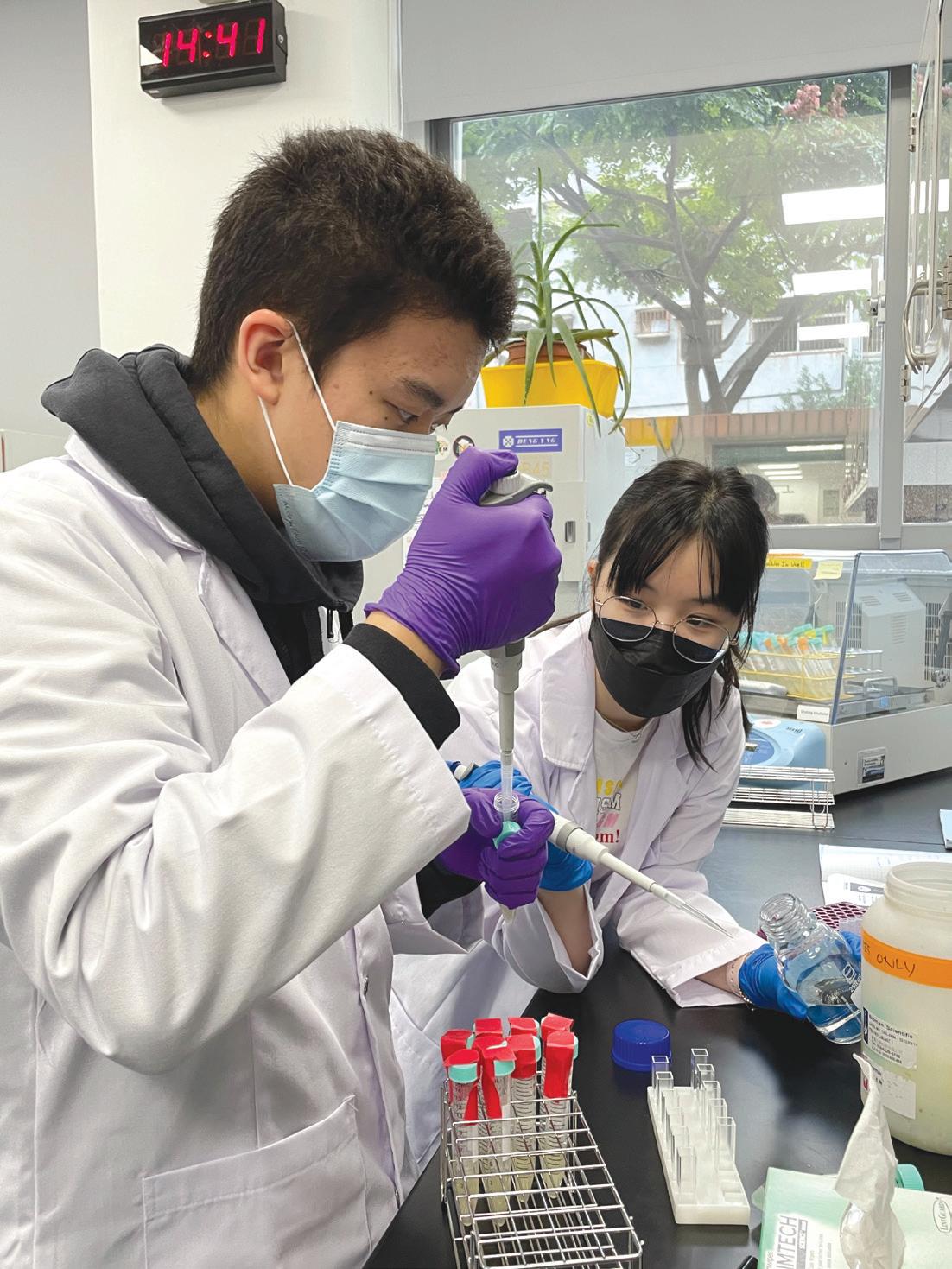
Text: Biotechnology (Brown) (ISBN 978-0-983-23960-4)
LEVEL 1
Semester 1
Introduction to Science Research
Scientific Research Flow Chart
LEVEL 2
LEVEL 3
DEPARTMENT REC.
Semester 2
Requires the completion of any Level 1 OR enrollment in respective AP/IB course
Requires the completion of any Level 2 OR 2 semesters of Level 1 course
Research in Biology
Research in Biology
Honors Research in Biology
Honors Research: Synthetic Biology
Independent Research Internship (1 and 2)
Research in Chemistry
Research in Chemistry
Honors Research in Chemistry
Honors
Research: Nanotechnology
Research in Physics
Research in Physics
Honors Research in Physics

Duration: 1 year
Credit: 1
Grades: 11-12
Prerequisite: Successful completion of a full year or 2 semesters of research.
Homework: Moderate to Heavy
The Honors Research course in Nanotechnology is for students who are interested in materials science, which is the combination of engineering with chemistry and applied physics. Students will first learn about current research in the field of nanotechnology and materials science in addition to how the use of nanomaterial will influence future developments in science. Students will then design, build and test their own independent projects in order to investigate the properties of matter on the 5-100nm scale. Using instrumentation such as a nanotube furnace and planetary ball mill, students will synthesize their own nanomaterial. Analysis of these materials can then be performed on an atomic force microscope and a scanning electron microscope at the TAS research laboratory. A possibility of interdisciplinary research with synthetic biology research exists for students interested in Nanobiotechnology and atomic force microscopy. During the year-long course, oral and poster presentations will be given at the science research symposia at the end of each semester.
NOTE: This course can partially fulfill the requirements for the year-long research project in AP Capstone Diploma program
Text: The Science of Nanotechnology: An Introductory Text (Tilstra, Broughton, Tanke, Jelski, French, Zhang, Popov, Western, George) (ISBN 978-1-600-21466-0)
Duration: 1 year
Credit: 1 (PASS/FAIL)
Grades: 11-12
Prerequisite: Successful completion of a summer research internship and Science Department recommendation
Homework: Moderate to Heavy (8 hour of off campus research time per week is required)
This independent study course is for the highly motivated student who wants to experience working in a professional, academic research institution. Students will learn how to select a proper investigation, collect data, systematically analyze results, and then communicate the results at the two TAS scientific research symposia and international research competitions. Research projects will be completed under the supervision of a research mentor at an off-campus location. Students who want to undertake a year-long, off campus research project must enroll as an intern in the TAS Summer Academy Summer Internship program in the summer preceding their enrollment in Advanced Scientific Research I course. Alternatively, students can find their own summer research internships. Students who choose these routes should consult with the Director of Scientific Research to see what internships currently available and what qualifications are necessary to be considered for placement as an intern. Students should plan on spending a significant amount of time commuting to and conducting an off-campus research project. It is recommended that students have 4th period lunch on the same day as their 5th period research class to allow adequate time for research. Some evening, vacation, and weekend time may be required for successful completion of the research. A second year of independent study may be elected as Independent Research Internship 2.
NOTE: This course can partially fulfill the requirements for the year-long research project in AP Capstone Diploma program
Text: None (papers and references will be gathered by the student
At Taipei American School, the study of world languages is considered a core subject. Students are required to reach a 3rd year level proficiency. We offer beginning, intermediate, and advanced level courses in Mandarin, Spanish, and Japanese. Students are strongly encouraged to take four consecutive years of their selected world language. Students may choose to study more than one world language course per year. Students with no prior knowledge or experience in Mandarin, Spanish, or Japanese will be placed into a beginner’s level 1 course. Students wishing to enter a new language program with prior knowledge or experience in that language are required to take a placement test. Students will need to register for the placement test through the World Languages office prior to finalizing their course selections.
Duration: 1 year
Credit: 1
Grades: 9-12
Prerequisites: None
Homework: Moderate
This course is designed to help non-native learners develop a basic proficiency in listening, speaking, reading, and computer-based writing and to prepare them for further study of the Mandarin language. The communicative approach is used to introduce vocabulary and grammar structures through the functions of language. Students will also learn the basic principles behind Chinese characters. Authentic materials and cultural information are interwoven throughout the course to provide a framework for language proficiency and an appreciation of Mandarin-speaking cultures.
Text: Integrated Chinese
Duration: 1 year
Credit: 1
Grades: 9-12
Prerequisites: Mandarin as a Foreign Language 1 + teacher recommendation
Homework: Moderate
In this course for non-native learners, previously learned vocabulary and structures are reinforced, serving as a transition into new units of study. Students will develop and expand their understanding of how the language functions while continuing to make the Mandarin language relevant to their daily lives. Speaking, listening, reading, and computer-based writing activities are related to everyday needs and experiences. The continued emphasis of this course is on authentic communication and cultural awareness.
Text: Integrated Chinese
Duration: 1 year
Credit: 1
Grades: 9-12
Prerequisites: Mandarin as a Foreign Language 2 + teacher recommendation
Homework: Moderate
This course reviews and continues to develop language skills for nonnative learners of Mandarin through a communicative approach. Speaking, listening, reading, and computer-based writing activities relate to topics which reflect students’ daily lives. The materials and activities emphasize authentic situations and require thinking, recall, and creativity. Students are encouraged to express their own needs and interests in Mandarin, thus giving them the opportunity to become more confident communicators in the target language.
Text: Integrated Chinese
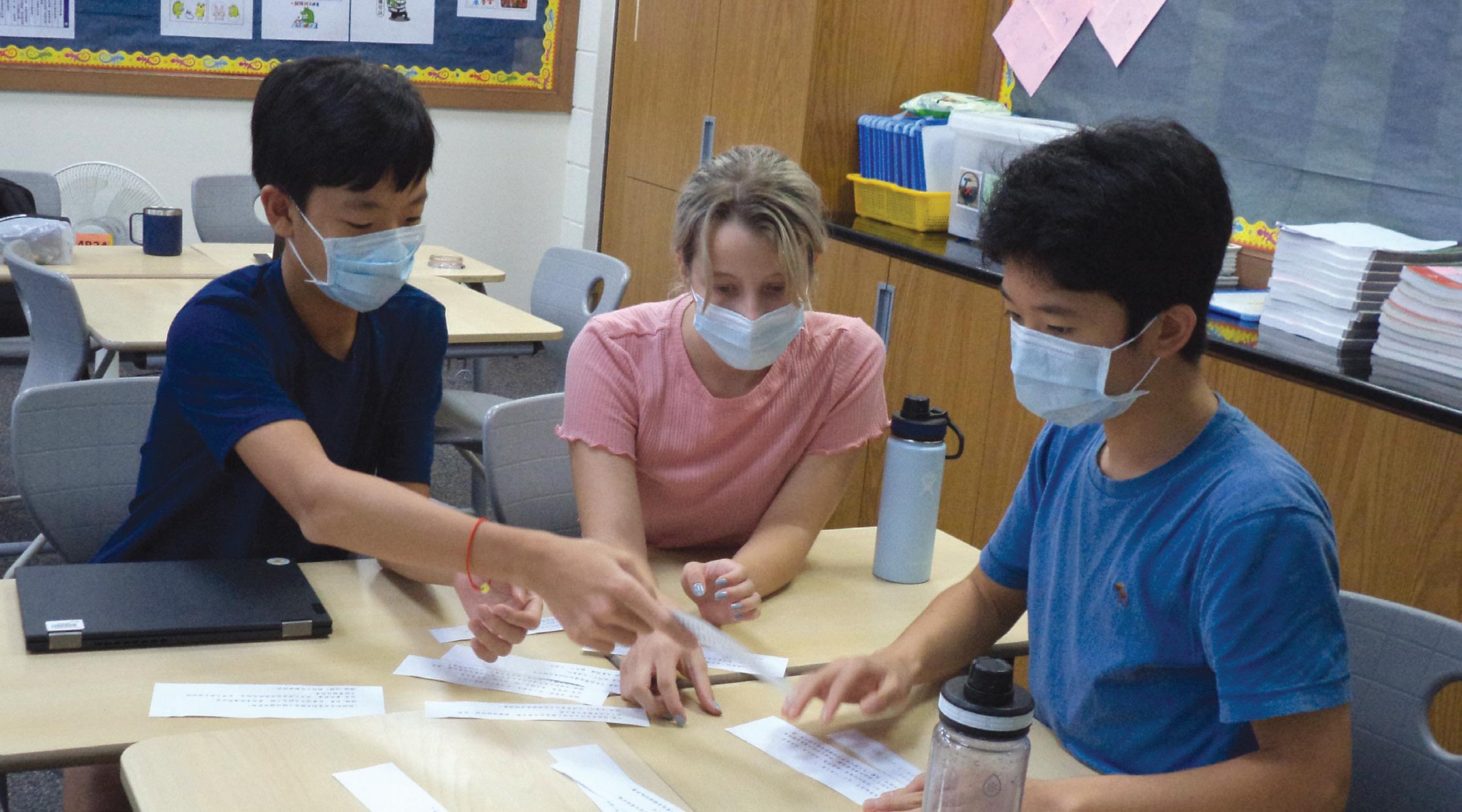
Duration: 1 year
Credit: 1
Grades: 9-12
Prerequisites: Mandarin as a Foreign Language 3 + teacher recommendation
Homework: Moderate
This course continues to develop language skills for non-native learners in Mandarin through a communicative approach. Speaking, listening, reading, and computer-based writing activities relate to topics which reflect community as well as daily lives. The materials and activities emphasize authentic situations and require thinking, recall, and creativity. Students continue to develop their ability to confidently communicate their own needs and interests in Mandarin. Supplementary materials help to further develop a continued cultural awareness of the Mandarin-speaking world.
Text: Integrated Chinese
Duration: 1 year
Credit: 1
Grades: 11-12
Prerequisites: Mandarin as a Foreign Language 4 + teacher recommendation
Homework: Heavy
This course for non-native learners provides students with opportunities to enhance language development across three modes: interpretive, interpersonal, and presentational. Students will increase their awareness of contemporary and historical Chinese culture through the study of authentic materials including public announcements, advertisements, articles, contemporary literature, and film. Students who enroll in this course are required to take the external AP Chinese Language & Culture exam near the end of the school year. Students who wish to continue their Mandarin studies after completing this course will be placed into the appropriate Heritage Mandarin class based upon their language proficiency.
Texts: Teacher-selected readings and authentic materials in accordance with AP curriculum guidelines
Duration: 1 year
Credit: 1
Grades: 9-12
Prerequisites: Teacher recommendation
Homework: Moderate
This course is targeted at native or near-native Mandarin speakers who are developing their reading and writing abilities. Emphasis is placed on developing a solid grasp of common, high-frequency characters used in one’s daily life. Students will also learn how to communicate effectively in Mandarin through handwritten characters. Speaking activities will challenge students to expand their vocabulary to encompass more abstract topics, build more complex arguments, and develop a solid understanding of proper grammar.
Text: 當代中文課程 (A Course in Contemporary Chinese)
Duration: 1 year
Credit: 1
Grades: 9-12
Prerequisites: Heritage Mandarin 2 + teacher recommendation
Homework: Moderate
This course is targeted at native or near-native Mandarin speakers to further develop their reading and character-writing proficiency. Students will be expected to compose longer, more in-depth, and well-argued compositions, as well as begin to read and discuss original written Chinese language texts. Students will further develop their ability to utilize technology as a means for authentic communication. Speaking activities will target more formal rhetorical speech elements, such as presentations and topic-based panel discussions.
Text: 當代中文課程 (A Course in Contemporary Chinese)
Students enter the Mandarin program based upon their language proficiency in reading, writing, listening, and speaking. Students who are not currently enrolled in a Mandarin course at TAS will need to take a placement test.
To complete the 3rd year proficiency requirement, students must complete one year of an Upper School course at the Mandarin as a Foreign Language 3 proficiency level or higher.
Duration: 1 year
Credit: 1
Grades: 9-12
Prerequisites: Heritage Mandarin 3 + teacher recommendation
Homework: Heavy
This course further prepares students to communicate using Mandarin in more formal language settings. Spoken activities emphasize presentations, oral reports, and debates. Students will develop further confidence and ability in written forms. Students will engage in creative writing activities, as well as conduct research and write reports in Mandarin. In this class, students transition from using prepared textbook materials to more real-life content and abridged articles. Students will build on their fluency in Mandarin to communicate through a variety of means and discourse models.
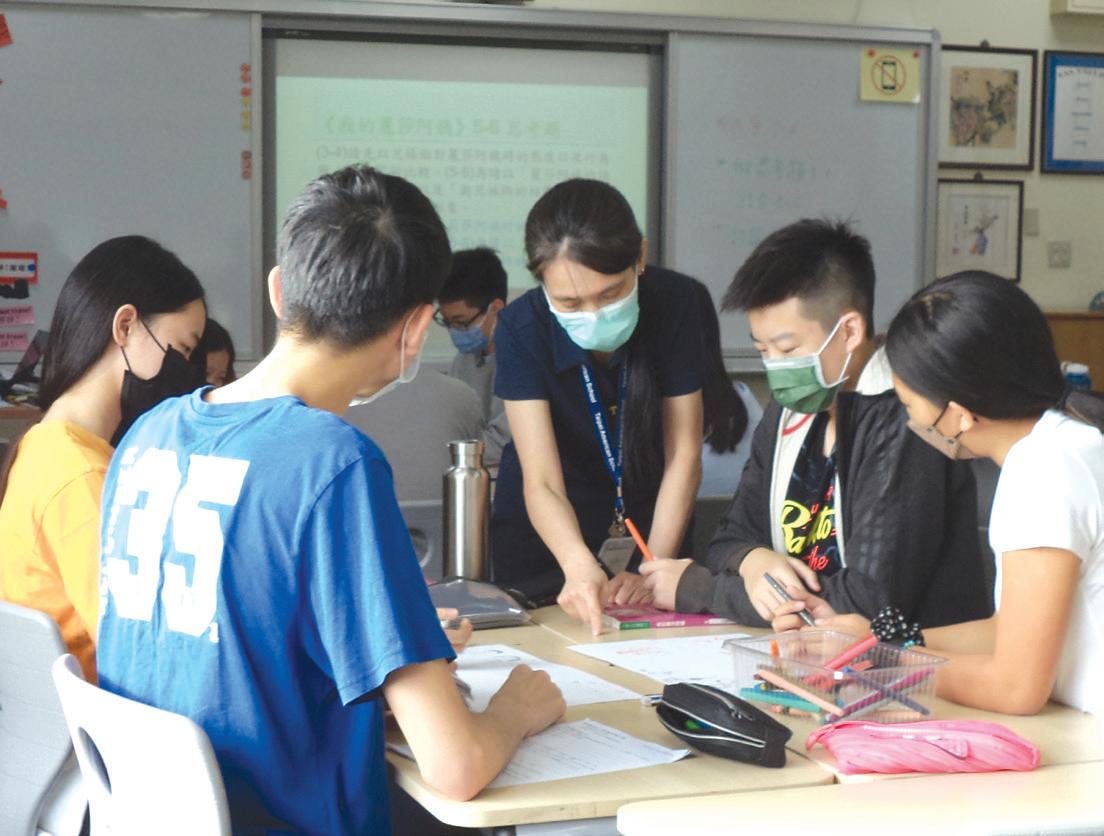
Texts: 當代中文課程 (A Course in Contemporary Chinese); teacherselected readings and authentic materials
Duration: 1 year
Credit: 1
Grades: 9-12
Prerequisites: Honors Heritage Mandarin 4 + teacher recommendation
Homework: Heavy
In this course, activities are based upon authentic materials and situations that require thinking, problem-solving, and creativity. Emphasis is placed on comprehending more complex authentic oral and written communication and responding appropriately and intelligently both orally and in writing. Students are encouraged to express not only their own needs and interests but also their opinions on a variety of contemporary and cultural issues. Supplementary materials further develop and integrate the students’ language skills as well as foster an awareness and appreciation of the Mandarin-speaking world.
Texts: 當代中文課程 (A Course in Contemporary Chinese); teacherselected readings and authentic materials
Duration: 1 year
Credit: 1
Grades: 11-12
Prerequisites: Honors Heritage Mandarin 5 + teacher recommendation
Homework: Heavy
This course prepares students to communicate comfortably and effectively in Mandarin, both orally and in written form through the use of authentic language materials. Students will study how to handle and process information, write their own texts, understand and respond to oral and written communication, and enter intellectual discussions on a range of topics. Additionally, students will continue to develop an awareness and appreciation of Mandarin-speaking cultures. Students who enroll in this course are required to take the external IBSL Chinese B exam near the end of the school year.
Texts: Teacher-selected readings and materials in accordance with IB curriculum guidelines
Students move along the program in a forward direction as indicated by the flowchart arrows. All levels starting at Heritage Mandarin 4 are indicated as honors courses. These honors courses are not interchangeable and build upon increasing language proficiency levels.
AP Chinese, IBSL/IBHL Chinese B, and IBSL/IBHL Chinese A are optional courses and may be selected when students meet the grade level and course prerequisite requirements. The IBSL ab initio exam (IB Diploma students) may be taken in senior year only; the maximum level of study is Honors Heritage Mandarin 4.
Duration: 1 year
Credit: 1
Grade: 12
Prerequisites: IBSL Chinese B + teacher recommendation
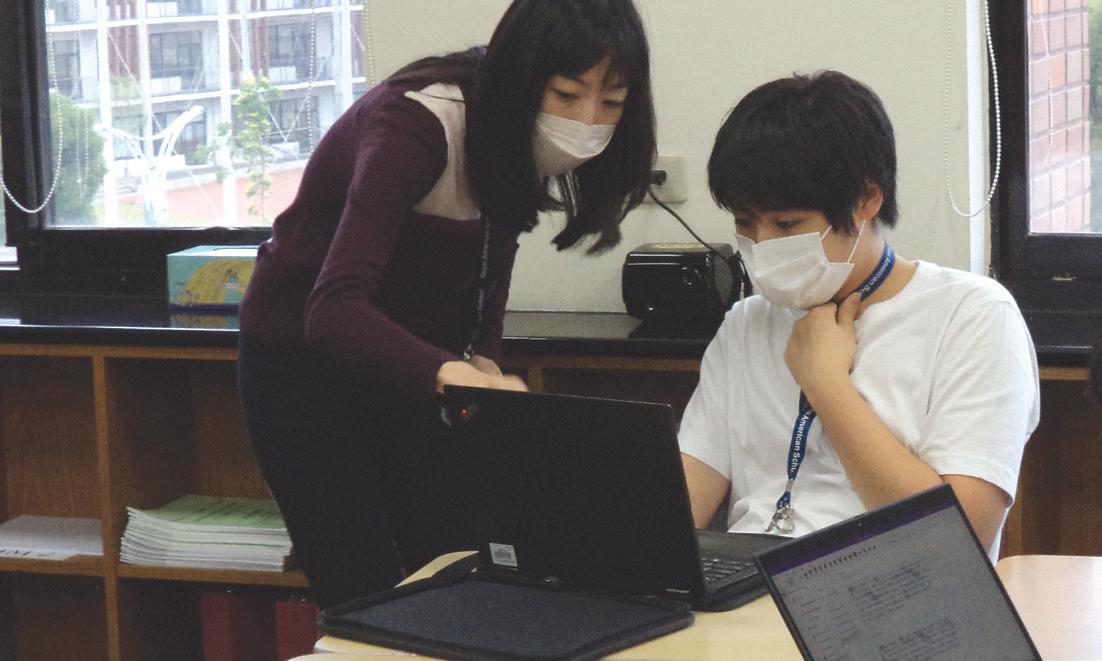

Homework: Heavy
This course further develops students’ confidence and skills to communicate effectively in Mandarin, both orally and in written form through the use of authentic language materials. Students will hone their ability to comprehend and participate in formal and informal conversations and to express their ideas with increased accuracy and fluency. They will acquire new vocabulary and build the necessary skills for in-depth reading of a variety of texts. Additionally, students will continue to develop an awareness and appreciation of the cultures and history related to the language studied.
*The offering of this course for 2023-2024 is dependent upon student interest and enrollment.
Texts: Teacher-selected readings and authentic materials
Duration: 1 year
Credit: 1
Grades: 9-12
Prerequisites: Teacher recommendation
Homework: Heavy
This course prepares students to communicate comfortably and effectively both orally and in written form. Students study a variety of texts (including novels, short stories, and selected articles) to explore themes such as traditional Chinese values and their impact on modern life, personal growth, communication, and technology. An emphasis is placed on acquisition of vocabulary and practice of sentence patterns as students work to refine their composition skills. Oral expression will be reinforced through regular class discussions and presentations.
Texts may include: 賴小禾《動物狂想曲》; 鄭宗弦《媽祖回娘家》; 王淑芬 《親愛的綠》; 陳榕笙《孤狗少年》; additional teacher-selected materials
HONORS ADVANCED HERITAGE MANDARIN 2 (UMAN22)
Duration: 1 year
Credit: 1
Grades: 9-12
Prerequisites: Honors Advanced Heritage Mandarin 1 + teacher recommendation

Homework: Heavy
This course explores modern-day themes through the study of a variety of texts (including novels, short stories, and selected articles). Continued emphasis is placed upon effective communication both orally and in written form. Vocabulary acquisition remains of primary importance as does the development of polished writing skills in a variety of styles. Oral expression will be reinforced through regular class discussions and presentations.
Texts may include: 張友漁《目擊證人》; 鄭丞鈞《我的麗莎阿姨》; 陳幸蕙 編《我只想回到自己的家》; 侯文詠《侯文詠極短篇》; additional teacherselected materials
Duration: 1 year
Credit: 1
Grades: 9-12
Prerequisites: Honors Advanced Heritage Mandarin 2 + teacher recommendation
Homework: Heavy
This course enables students to develop their language skills by exploring contemporary issues through the study of a variety of texts (including novels, short stories, and selected articles). Students will continue to refine their ability to write in a more sophisticated manner through essays and research projects. Oral expression will be reinforced through regular class presentations and discussions.

Texts may include: 林良《會走路的人》; 汪莫《寫給喧囂的37個安靜練 習》; 劉臺痕《閻王不要的小子》; 李家同選集; 蘇兒真《法律的背後,是愛的 戀習曲》; additional teacher-selected materials
Duration: 1 year
Credit: 1
Grade: 12
Prerequisites: Honors Advanced Heritage Mandarin 3 + teacher recommendation
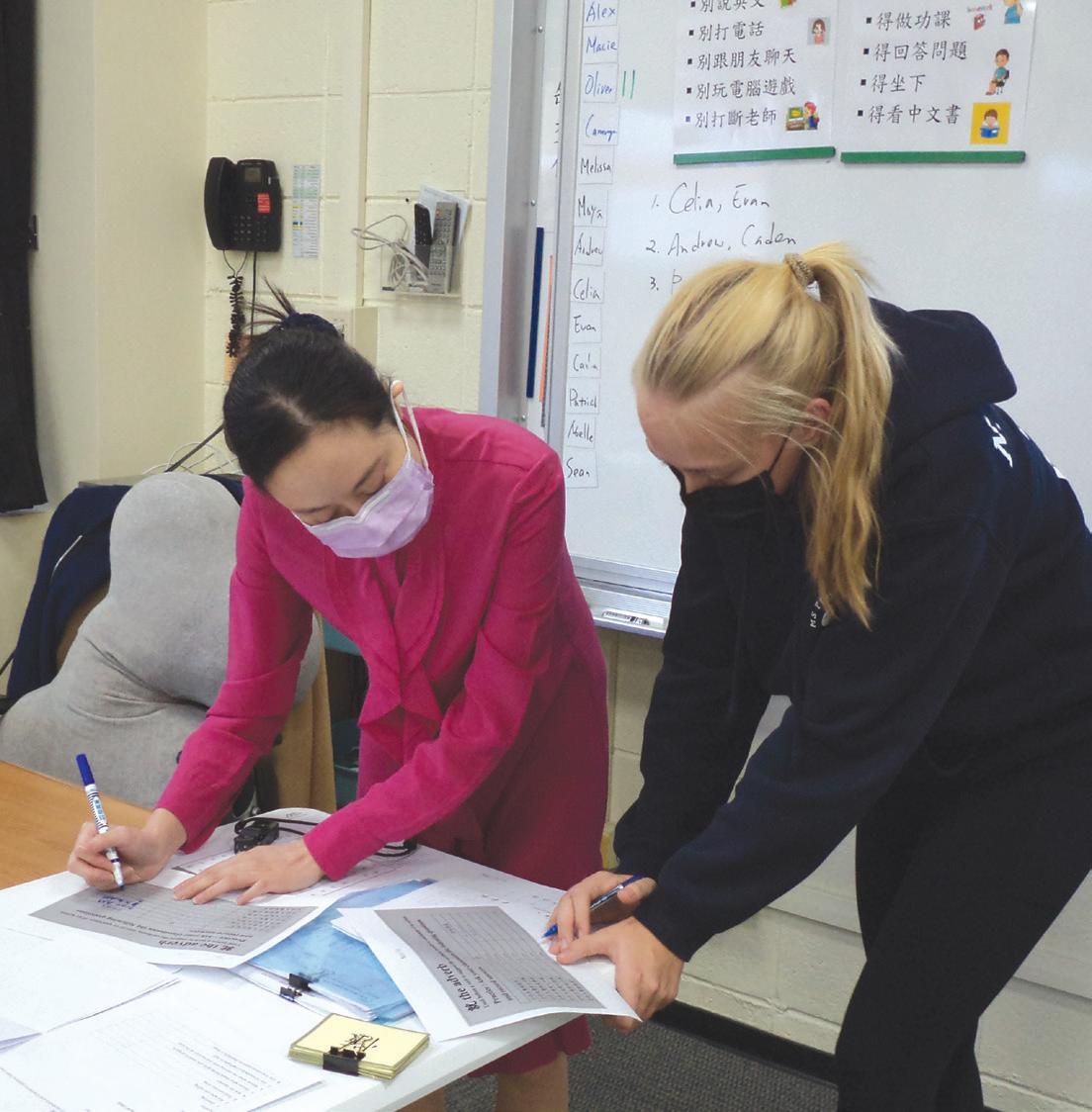
Homework: Heavy
This course continues to emphasize the use of language for active communication through the use of authentic materials. Students will work on comprehending and participating in formal and informal conversations as well as expressing their ideas with increased accuracy and fluency. They will acquire the new vocabulary and skills necessary for in-depth reading of a variety of texts and refine their ability to write in a more sophisticated manner. Students who enroll in this course are required to take the external IBHL Chinese B exam near the end of the school year.
Texts: Teacher-selected readings and materials in accordance with IB curriculum guidelines
Duration: 1 year
Credit: 1
Grades: 9-12
Prerequisites: Teacher recommendation
Homework: Heavy
In this course, students will practice critical reading, thinking, and written analysis in Mandarin. Various texts, including novels and Chinese poems, will be analyzed. Students are expected to demonstrate independent initiative when interpreting these texts and will articulate ideas with sophistication. This course has a significant reading and writing homework component.
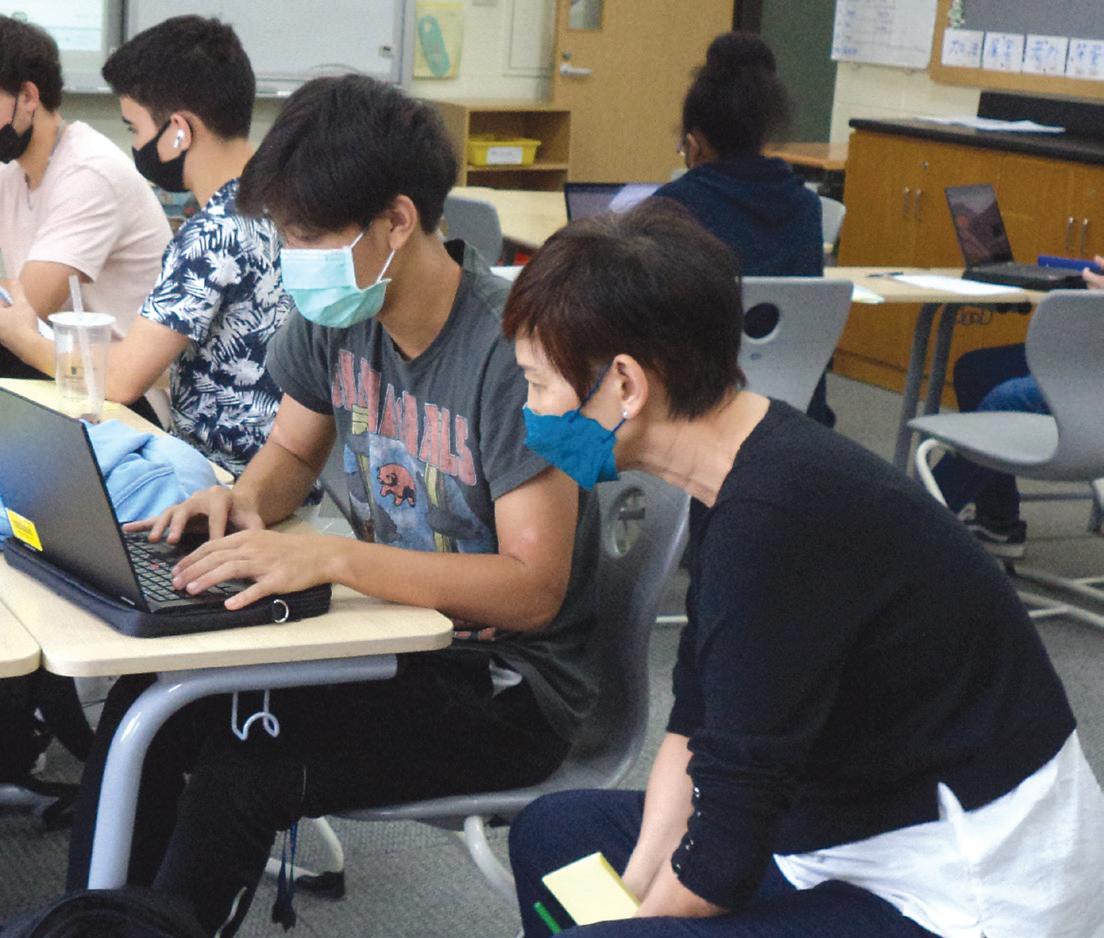
Texts may include: 亞榮隆‧撒可努《山豬.飛鼠.撒可努》; 鍾肇政 《白翎鷥之歌》; 龍應台《孩子你慢慢來》; 陳幸蕙主編《49個夕陽》; additional teacher-selected materials
Confucius
Learning without thinking leads to confusion; thinking without learning ends in danger.
Duration: 1 year
Credit: 1
Grades: 10-12
Prerequisites: Honors Advanced Literature in Mandarin 1 + teacher recommendation
Homework: Heavy
Building on the literary analysis work established the previous year, this course further strengthens students’ abilities to read critically and discuss literature through various interpretive lenses. There are rigorous expectations for in-depth written analysis and critical interpretations of various genres of literature. Moreover, oral presentations and class discussions require students to express nuanced ideas when speaking. This course has a significant reading and writing homework component.
Texts may include: 三毛《撒哈拉歲月》;《守候盼望》; 劉俐譯 Antoine de Saint-Exupéry《小王子》; 吳濁流《先生媽》; 洪醒夫《黑面慶仔》; additional teacher-selected materials
IBSL CHINESE A LANGUAGE & LITERATURE 1 (UMAN33)
IBSL CHINESE A LANGUAGE & LITERATURE 2 (UMAN35)
Duration: 2 years
Credit: 1 per year
Grades: 11 (year 1) – 12 (year 2)
Prerequisites: Honors Advanced Literature in Mandarin 2 + teacher recommendation
Homework: Heavy
This course is a concentrated two-year program focused on the study of Chinese language and literature. Students will further their command of written and spoken Mandarin by writing literary analysis essays and participating in oral activities including presentations, class discussions, dramatizations, and debates. Students will engage in the study of topics that relate to language in cultural context. Students who enroll in this course are required to take the external IBSL Chinese A exam near the end of the second year.
Texts: Teacher-selected readings and materials in accordance with IB curriculum guidelines
IBHL CHINESE A LANGUAGE & LITERATURE 1 (UMAN34)
IBHL CHINESE A LANGUAGE & LITERATURE 2 (UMAN36)
Duration: 2 years
Credit: 1 per year
Grades: 11 (year 1) – 12 (year 2)
Prerequisites: Honors Advanced Literature in Mandarin 2 + teacher recommendation
Homework: Heavy
This course is a concentrated two-year program focused on the study of Chinese language and literature. Students will further their command of written and spoken Mandarin through the study of a wide range of genres and rigorous literary analysis. Requirements of the course include both oral and written critiques, comparative commentaries, essays, and creative writing assignments. Students who enroll in this course are required to take the external IBHL Chinese A exam near the end of the second year.
Texts: Teacher-selected readings and materials in accordance with IB curriculum guidelines
HONORS ADVANCED LITERATURE IN MANDARIN 3 (UMAN37)
HONORS ADVANCED LITERATURE IN MANDARIN 4 (UMAN38)
Duration: 1 or 2 years
Credit: 1 per year
Grades: 11-12
Prerequisites: Honors Advanced Literature in Mandarin 2 + teacher recommendation
Homework: Heavy
These courses will continue to strengthen students’ abilities to read critically and discuss literature through various interpretive lenses. Students will develop the language skills necessary to become highly proficient readers and writers of Mandarin. Students will engage in the study of well-known literary works. This course has a significant reading and writing homework component.
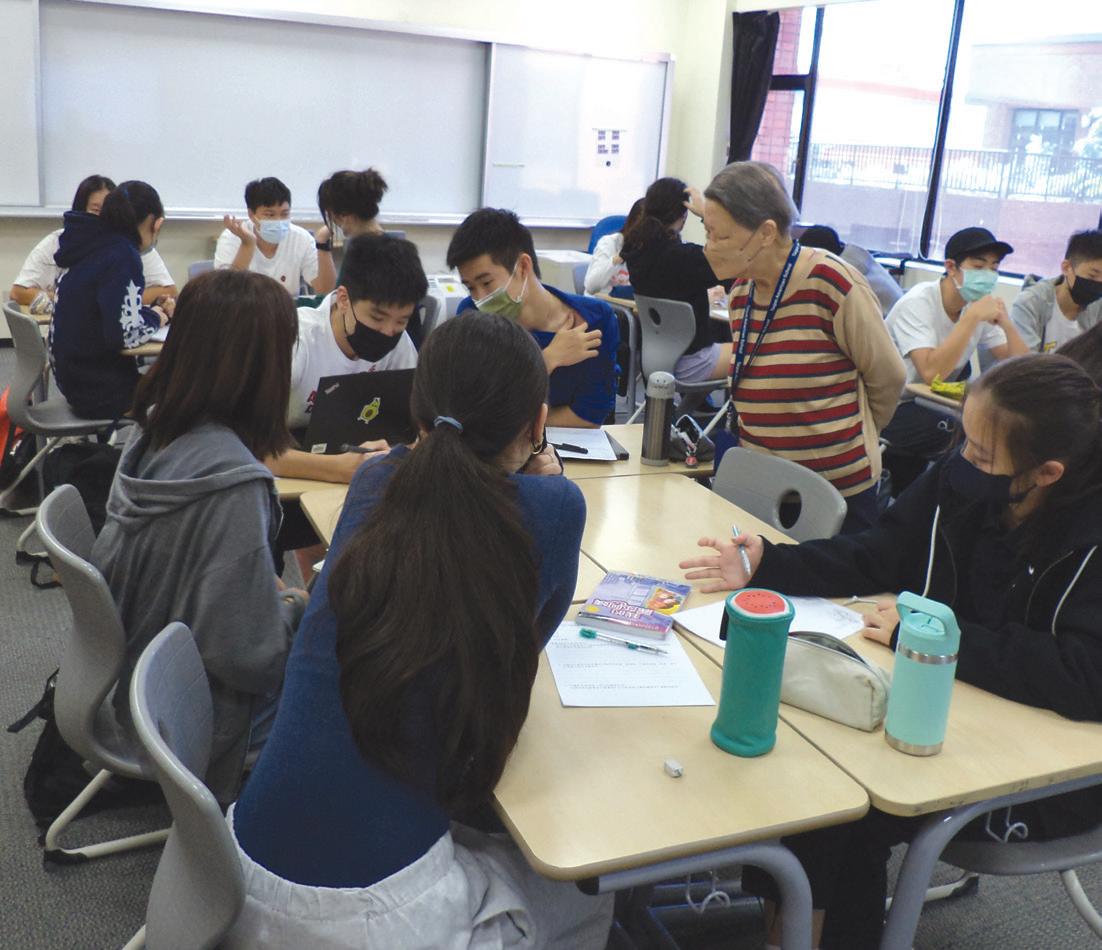
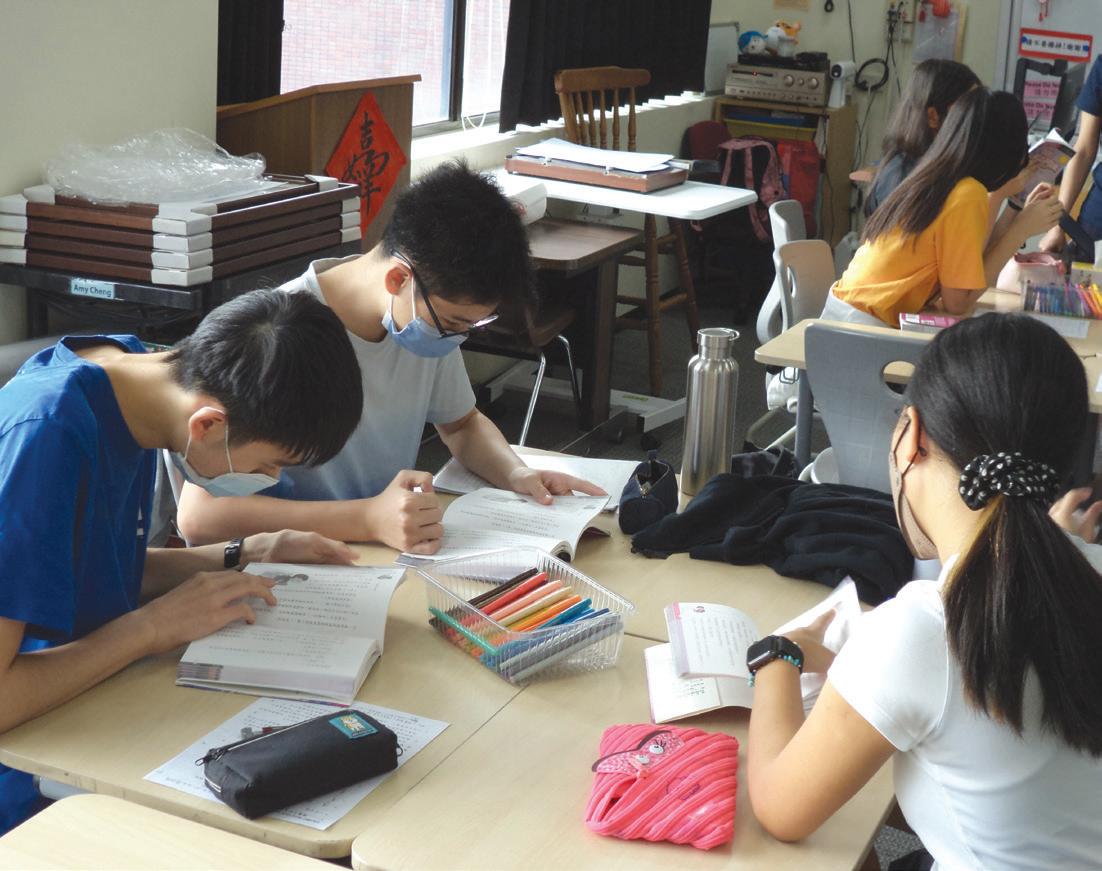
*The offering of this course for 2023-2024 is dependent upon student interest and enrollment.
Texts: Teacher-selected readings and authentic materials
Solid lines indicate the standard path; dashed lines indicate alternative path options available with teacher permission.
Students enter the Spanish program based upon their language proficiency in reading, writing, listening, and speaking. Students with previous knowledge or language experience who are not currently enrolled in a Spanish course at TAS will need to take a placement test
To complete the 3rd year proficiency requirement, students must complete one year of an Upper School course at the Spanish 3 proficiency level or higher.
The IBSL Spanish B exam may be taken in junior or senior year; students may take the course over a period of 1 or 2 years. The IBHL exam may be taken in senior year only; this is a two-year course. The IBSL ab initio exam (IB Diploma students) may be taken in senior year only; the maximum level of study is Honors Spanish 4.
Duration: 1 year
Credit: 1
Grades: 9-12
Prerequisites: None
Homework: Moderate
This course is designed to help students develop a basic proficiency in listening, speaking, reading, and writing and to prepare them for further study of the Spanish language. The communicative approach is used to introduce vocabulary and structures through the functions of the language. Authentic materials and cultural information are interwoven throughout the course to provide a framework for proficiency in the language and an appreciation of the cultures of the countries where Spanish is spoken.
Text: VISTAS Introducción a la lengua española
Duration: 1 year
Credit: 1
Grades: 9-12
Prerequisites: Spanish 1 + teacher recommendation
Homework: Moderate
In this course, previously learned vocabulary and structures are reinforced, serving as a transition into new units of study. The students’ understanding of how the language functions is expanded while continuing to make the Spanish language relevant to their daily lives. Emphasis is placed upon continued authentic communication, cultural awareness, and relying on Spanish for comprehension.
Text: VISTAS Introducción a la lengua española
Duration: 1 year
Credit: 1
Grades: 9-12
Prerequisites: Spanish 2 + teacher recommendation
Homework: Moderate
This course reviews and continues to develop language skills in Spanish through a communicative approach. Materials and activities emphasize authentic situations of daily life and require thinking, recall, and creativity. Students are encouraged to express their own needs and interests in the Spanish language, thus giving them the opportunity to become more confident in speaking, listening, reading, and writing.
Text: ENFOQUES Curso intermedio de lengua española

Duration: 1 year
Credit: 1
Grades: 9-12
Prerequisites: Spanish 2 + teacher recommendation
Homework: Heavy
This course reviews and continues to develop language skills in Spanish through a communicative approach. Speaking, listening, reading, and writing activities relate to topics which reflect daily life. Oral comprehension and proficiency will be stressed, and students will be expected to demonstrate greater independent initiative when completing practice activities. Homework expectations and standards for sophisticated and accurate language usage are significantly higher in Honors Spanish 3.
Text: ENFOQUES Curso intermedio de lengua española
Duration: 1 year
Credit: 1
Grades: 9-12
Prerequisites: Spanish 3 (or Honors Spanish 3) + teacher recommendation
Homework: Moderate
This course continues to develop Spanish language skills through a communicative approach. Speaking, listening, reading, and writing activities relate to topics which reflect community as well as daily life. Students are encouraged to express their own needs and interests in the Spanish language, thus enabling them to become more confident language learners. Supplementary materials help to further develop the students’ reading and writing skills as well as a continued cultural awareness of the Spanish-speaking world.
Text: ENFOQUES Curso intermedio de lengua española
Duration: 1 year
Credit: 1
Grades: 9-12
Prerequisites: Honors Spanish 3 (or Spanish 3) + teacher recommendation
Homework: Heavy
This course will stress proficiency in all language skills with a strong emphasis on grammar. Speaking, listening, reading, and writing activities relate to topics which reflect community as well as daily life. Students are encouraged to express their own needs and interests in the Spanish language. Supplementary materials help to further develop the students’ reading and writing skills as well as a continued cultural awareness of the Spanish-speaking world. Homework expectations and standards for sophisticated and accurate language usage are significantly higher in Honors Spanish 4.
Text: ENFOQUES Curso intermedio de lengua española
Duration: 1 year
Credit: 1
Grades: 10-12
Prerequisites: Spanish 4 (or Honors Spanish 4) + teacher recommendation
Homework: Heavy
This course prepares students to communicate comfortably and effectively in Spanish, both orally and in written form. Students will practice and be assessed on their ability to handle and process information, write their own text, understand and respond to oral and written communication, and participate in intellectual discussions on a range of topics. Authentic materials will be used throughout to integrate the language skills of reading, writing, listening, and speaking. Students are expected to demonstrate indepth cultural awareness and appreciation of the Spanish-speaking world.
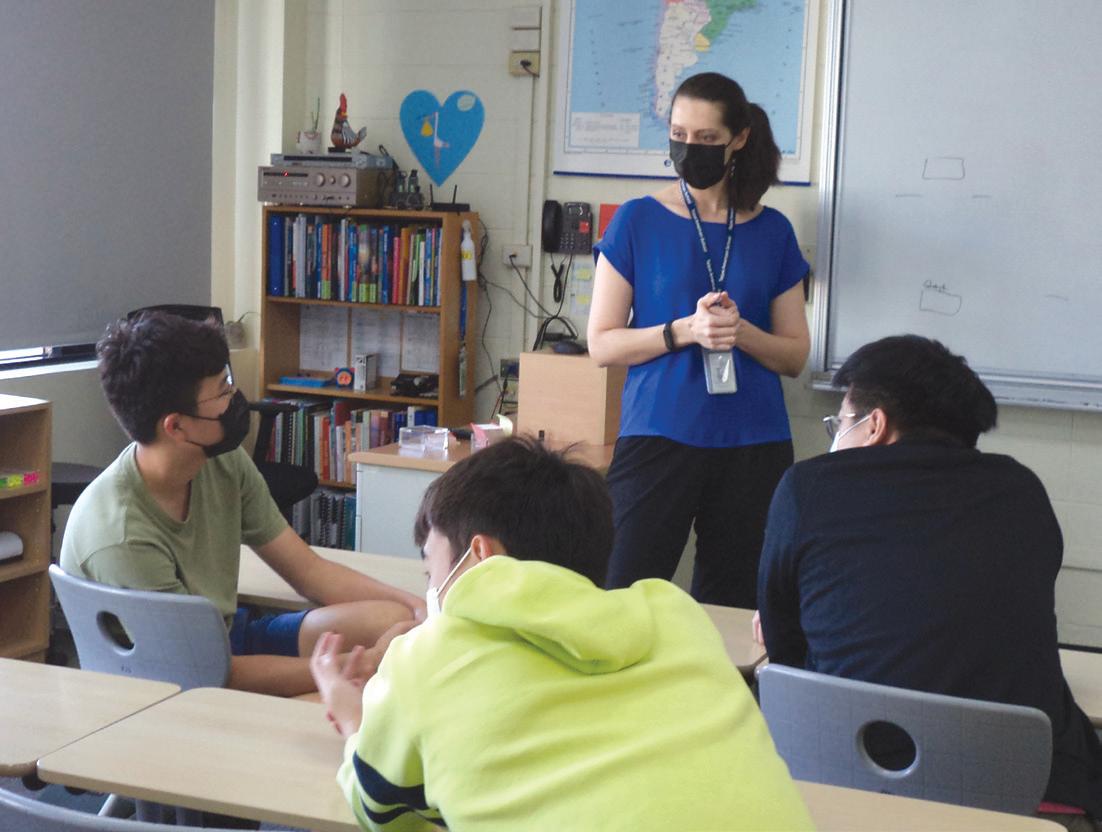
Texts: TEMAS para Español B; teacher-selected readings and materials

No quiero que pienses como yo, Sólo que pienses.
I do not want you to think like me... I just want you to think.
Frida Kahlo
Duration: 1 or 2 years
Credit: 1 per year
Grades: 11-12
Prerequisites: Spanish 4 / Honors Spanish 5 (or Honors Spanish 4) + teacher recommendation
Homework: Heavy
This course prepares students to communicate comfortably and effectively in Spanish, both orally and in written form. Students will practice and be assessed on their ability to handle and process information, write their own text, understand and respond to oral and written communication, and participate in intellectual discussions on a range of topics. Authentic materials will be used throughout to integrate the language skills of reading, writing, listening, and speaking. Students who enroll in this course are required to take the external IBSL Spanish B exam near the end of their one-year or two-year course (junior or senior year).
Texts: TEMAS para Español B; teacher-selected readings and materials in accordance with IB curriculum guidelines
Duration: 2 years
Credit: 1 per year
Grades: 11 (year 1) – 12 (year 2)
Prerequisites: Honors Spanish 4 + teacher recommendation
Homework: Heavy
This course continues to emphasize the use of language for active communication. Authentic materials are used throughout to integrate the language skills of reading, writing, listening, and speaking. Students will hone their ability to comprehend and participate in formal and informal conversations, and to express their ideas with increased accuracy and fluency. They will acquire the vocabulary and structures necessary for indepth reading of a variety of authentic texts and refine their ability to write in
a sophisticated manner. Students who enroll in this course are required to take the external IBHL Spanish B exam at the end of their two-year course (senior year).
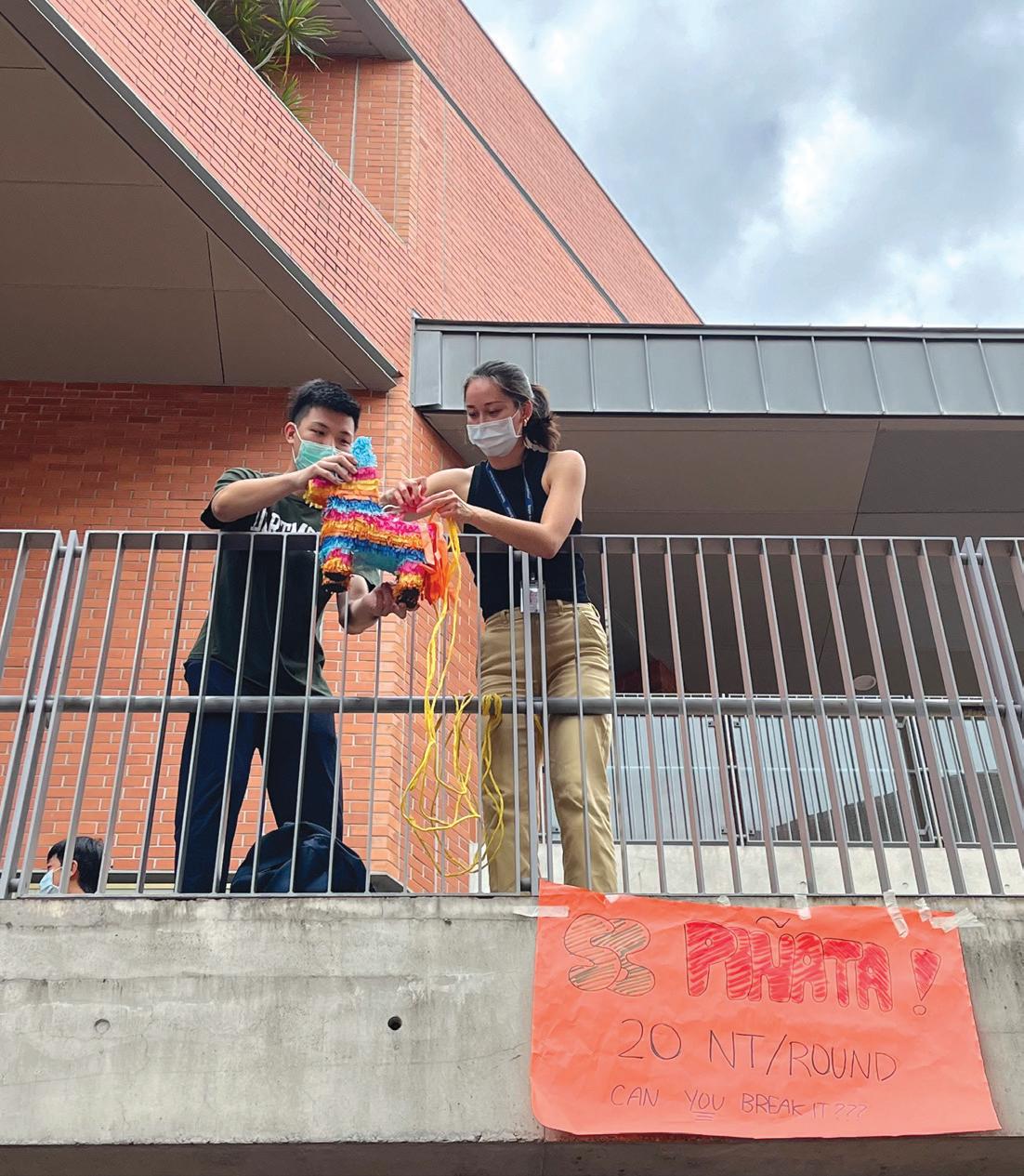
Texts: TEMAS para Español B; teacher-selected readings and materials in accordance with IB curriculum guidelines
Duration: 1 year
Credit: 1
Grades: 11-12
Prerequisites: Honors Spanish 4 or Honors Spanish 5 + teacher recommendation
Homework: Heavy
This course continues to emphasize the use of language for active communication. Authentic materials are used throughout to integrate the language skills of reading, writing, listening, and speaking. Students will hone their ability to comprehend and participate in formal and informal conversations, and to express their ideas with increased accuracy and fluency. They will acquire the vocabulary and structures necessary for in-depth reading of a variety of texts and refine their ability to write in a sophisticated manner. Students who enroll in this course are required to take the external AP Spanish Language and Culture exam near the end of the school year.
Texts: TEMAS Spanish Language and Culture; AP SPANISH Language and Culture Exam Preparation
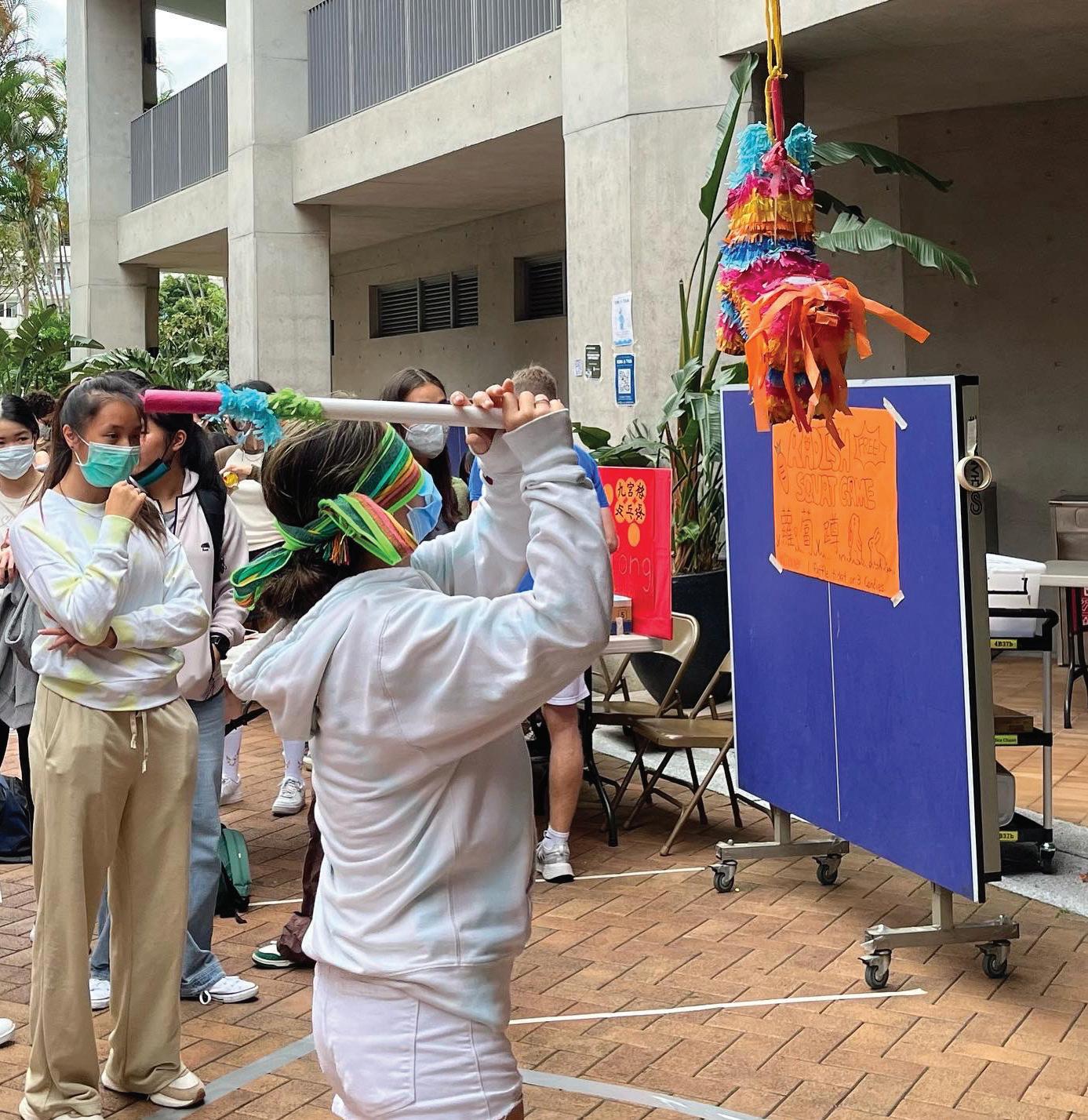
If you talk to a man in a language he understands, that goes to his head. If you talk to him in his own language, that goes to his heart.
Mandela
Duration: 1 year
Credit: 1
Grade: 12
Prerequisites: AP Spanish Language & Culture + teacher recommendation
Homework: Heavy
This intensive course is designed for students with advanced language proficiency and interest in Spanish. Students will practice critical reading, thinking, and written analysis in Spanish through the study of various types of texts including novels, short stories, poetry, and essays based on the AP Spanish curriculum reading list. Students are expected to demonstrate independent initiative when analyzing and interpreting these texts and will articulate ideas with sophistication. This course has a significant reading and writing homework component. Students who enroll in this course are required to take the external AP Spanish Literature and Culture exam near the end of the school year.
Texts: ABRIENDO PUERTAS; teacher-selected readings and materials in accordance with AP curriculum guidelines
Duration: 1 year
Credit: 1
Grades: 9-12
Prerequisites: None
Homework: Moderate
This course is designed to help students develop a basic proficiency in listening, speaking, reading, and writing and to prepare them for further study of the Japanese language. The communicative approach is used to introduce vocabulary and structures through the functions of the language. Students learn the Japanese sound system. The HIRAGANA and KATAKANA writing notations are introduced from the outset. The 72 basic characters of KANJI symbols related to the unit topics are introduced.
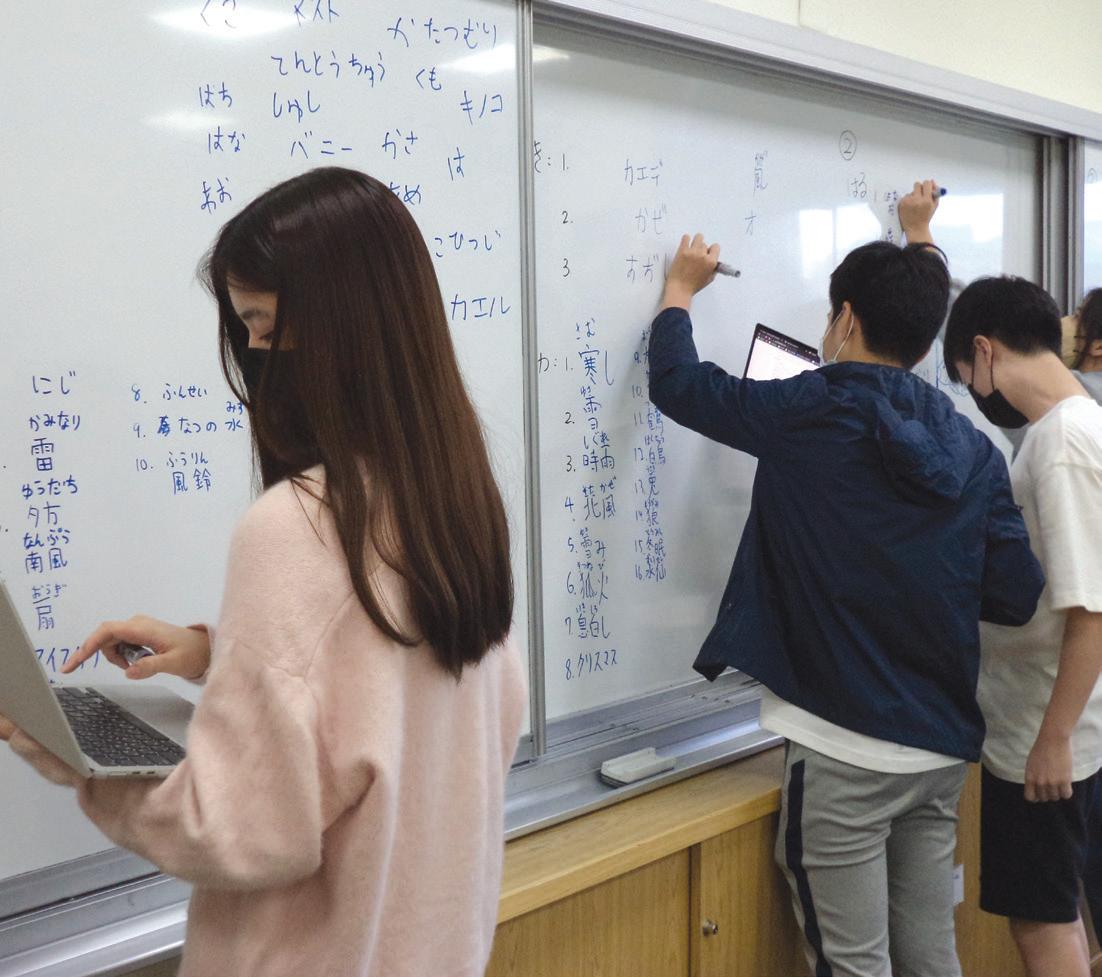
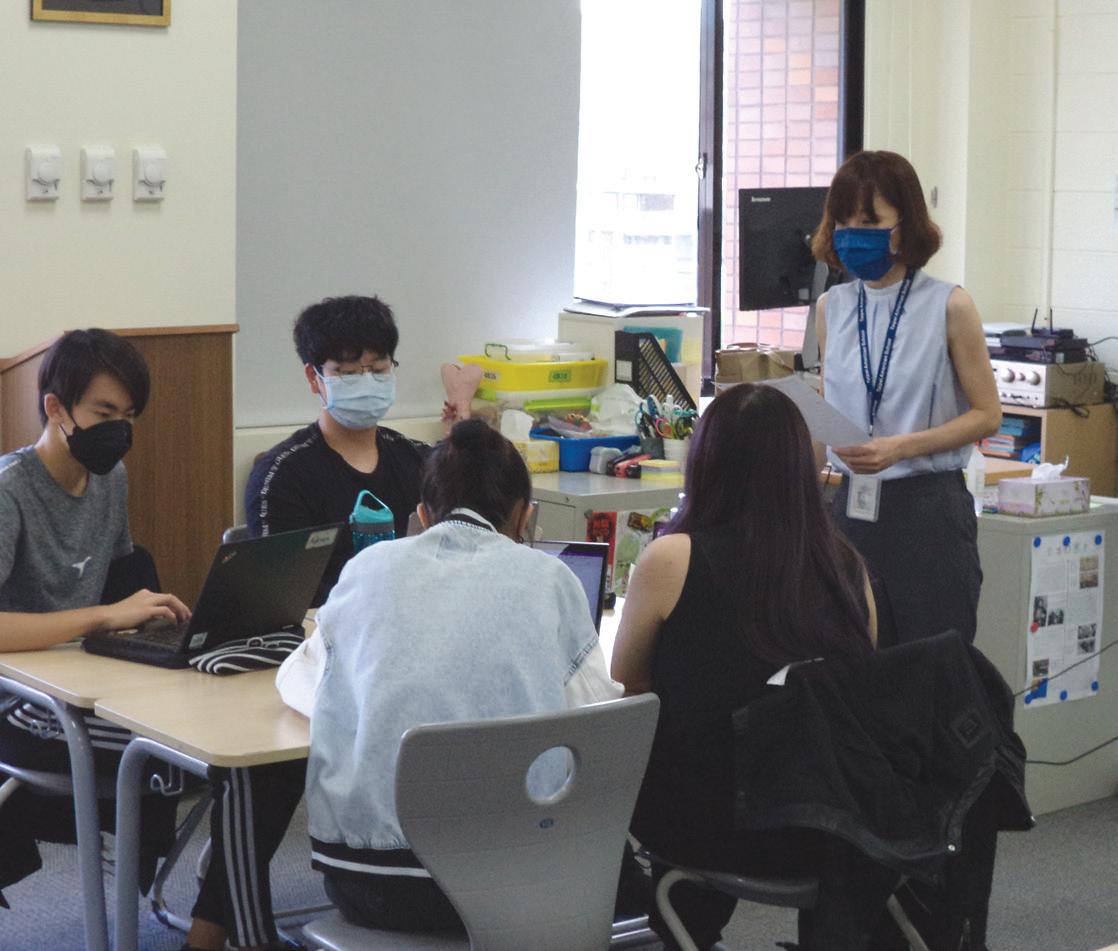

Texts: Genki 1; additional teacher-selected materials
Duration: 1 year
Credit: 1
Grades: 9-12
Prerequisites: Japanese 1 + teacher recommendation
Homework: Moderate
In this course, previously learned vocabulary and structures are reinforced, serving as a transition into new units of study. The students’ understanding of how the language functions is expanded while continuing to make the Japanese language relevant to their daily lives. Emphasis is placed upon continued authentic communication, cultural awareness, and relying on Japanese for comprehension. An additional 73 KANJI symbols related to the unit topics are introduced.
Texts: Genki 1; additional teacher-selected materials
There is always a way if you do not give up. Surely.
あきらめなければ必ず道はある。必ず。
Sakichi Toyoda
Students enter the Japanese program based upon their language proficiency in reading, writing, listening, and speaking. Students with previous knowledge or language experience who are not currently enrolled in a Japanese course at TAS will need to take a placement test.
To complete the 3rd year proficiency requirement, students must complete one year of an Upper School course at the Japanese 3 proficiency level or higher.
The IBSL Japanese B exam may be taken in junior or senior year; this is a one-year course. The IBSL ab initio exam (IB Diploma students) may be taken in senior year only; the maximum level of study is Japanese 3.

Duration: 1 year
Credit: 1
Grades: 10-12
Prerequisites: Japanese 2 + teacher recommendation
Homework: Moderate
In this course, previously learned vocabulary and structures are reinforced. Students learn to express their opinions and exchange information in a more sophisticated manner and make the Japanese language relevant to their daily lives. Students’ understanding of how the language functions is expanded thus providing the opportunity to become more confident in speaking, listening, reading, and writing. The stress is on continued authentic communication, cultural awareness, and relying on Japanese for comprehension. An additional 79 KANJI symbols related to the unit topics are introduced.
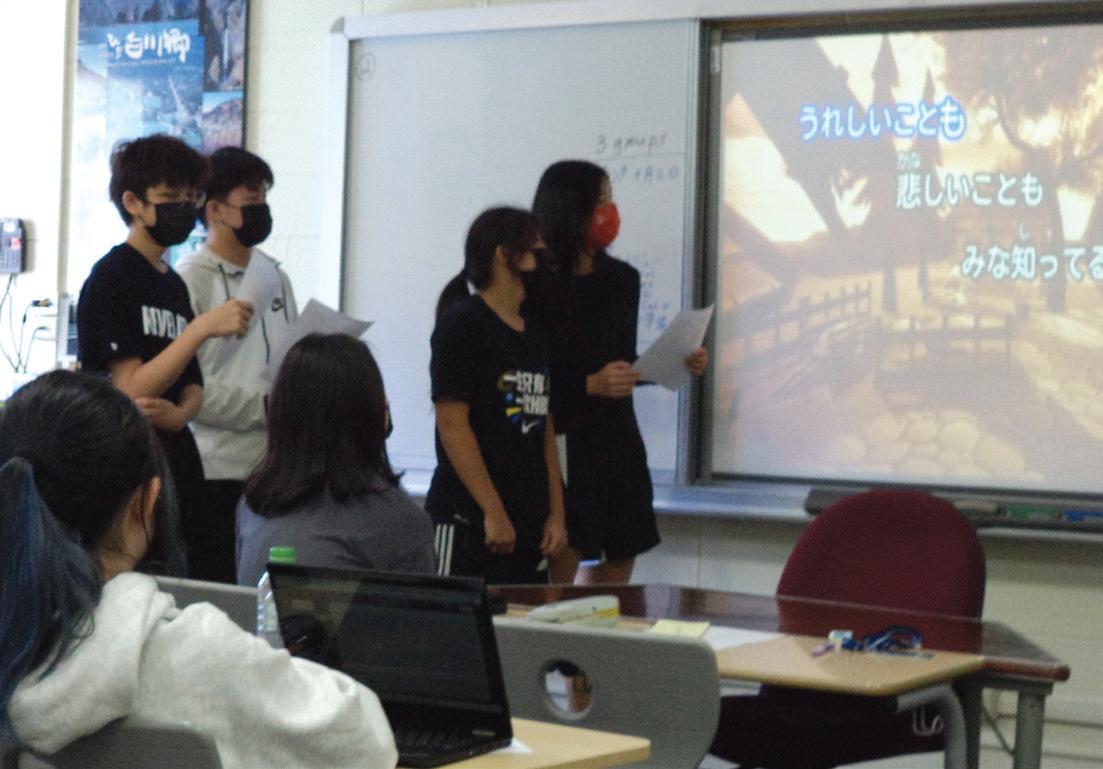
Texts: Genki 2; additional teacher-selected materials
Duration: 1 year
Credit: 1
Grades: 11-12
Prerequisites: Japanese 3 + teacher recommendation
Homework: Heavy
This course continues to develop language skills in Japanese through a communicative approach. Speaking, listening, reading, and writing activities relate to a broad range of topics. The activities are based upon authentic materials and situations that require thinking, problem-solving, and creativity. Emphasis is placed on comprehending more complex authentic oral and written communication and responding appropriately and intelligently both orally and in writing. An additional 93 KANJI symbols related to the unit topics are introduced. Students who enroll in this course are required to take the according external AP Japanese Language and Culture exam or IBSL Japanese B exam near the end of the school year.
Texts: Genki 2; teacher-selected readings and materials in accordance with AP / IB curriculum guidelines
Japanese 1 Japanese 2 Japanese 3Successful completion of Reading Greek & Latin or Honors Reading Greek & Latin satisfies the TAS graduation requirement in languages. At TAS, the Greek and Latin languages are taught together through an innovative story-telling curriculum developed at TAS. In the introductory levels, emphasis is on reading and understanding increasingly complex sentences in context, and on producing appropriate oral and written responses in Greek and Latin. The program leads to success in advanced university-level courses, the IB Greek and/or Latin Examinations, and the AP Latin Examination.
After mastering the fundamentals of reading in Reading Greek and Latin or Honors Reading Greek & Latin, students can select any advanced course in Latin or Greek, or in both Latin and Greek. All courses at all levels include the study of the myths, history, art, and culture of the ancient Mediterranean world. Each course is specifically created for the students in it, and materials for each year are custom designed and never re-used. Every course helps students improve their language skills at their own rate. Any student who works hard can succeed in Greek and Latin at TAS.
Duration: 1 year
Credit: 1
Grade: 9-12
Prerequisite: None
Homework: Moderate
No previous knowledge required. Students begin by learning the important characteristics of Greek and Latin,and comparing those to English and Chinese. Important grammatical and linguistic terms are introduced and employed in analyzing Greek, Latin, and English sentences. At the end of the year, students are comfortable reading simple stories in Greek and Latin, and they are able to respond to those stories in oral and written Greek and Latin. External contests include the National Latin Exam, the National

Greek Exam, and the National Classical Etymology Exam. Additional study includes an introduction to the history and geography of the ancient Mediterranean world.
Duration: 1 year
Credit: 1
Grade: 9-12
Prerequisite: Elementary Greek & Latin (with grade of B or higher) Homework: Moderate
Prerequisites: (1) study of Greek and Latin in the TAS middle school, or (2) study of Greek and/or Latin at another school, or (3) successful completion of Elementary Greek & Latin at TAS. Enrollment in Intermediate Greek & Latin must always be approved by the TAS Greek & Latin Department. Students rapidly review all fundamental concepts of morphology, grammar, and syntax while reading and responding to stories in Greek and Latin. Upon completion of Intermediate Greek & Latin, students are able to read complex stories in Greek and Latin, and they can respond to those stories appropriately in Greek and Latin. External contests include the National Latin Exam, the National Greek Exam, and the National Classical Etymology Exam. Students continue their study of the history and geography of the ancient Mediterranean world with a focus on late republican Rome and fifth century Athens.
Duration: 1 year
Credit: 1
Grade: 9-12
Prerequisite: Elementary Greek & Latin, and department permission Homework: Heavy
All material in Intermediate Greek & Latin and Reading Greek & Latin (see below) is covered in the course of one year. Homework expectations for this course are high. Enrollment is by permission of the department.
Greek and Latin Flow Chart
Entry into Level 1 for beginners
Intermediate level leads to Reading level. Honors Reading Greek and Latin (by department permission) leads directly to advanced classes. Entry level for students who have completed MS Classics
Elementary Greek & Latin
Intermediate
Continues work from Intermediate level
Greek & Latin Reading Greek & Latin
Honors Reading Greek & Latin
College-level study with independent research.

Duration: 1 year
Credit: 1
Grade: 9-12
Prerequisite: Intermediate Greek & Latin (grade of B or higher)
Homework: Moderate
The course begins with a review of Latin and Greek grammar, along with additional study of some more complex structures. Students then begin reading the Latin authors like Caesar, Vergil and Cicero, and selections from the works of Plato, Xenophon, and Lysias in Greek. Students sit for the National Latin Exam, and the National Greek Exam.
Advanced classes: IB Greek, IB Latin, AP Latin, Advanced Greek, Advanced Latin, Honors Advanced Greek, Honors Advanced Latin
ADVANCED ANCIENT GREEK (UCLS08)
ADVANCED GREEK & LATIN (UCLS09)
HONORS ADVANCED LATIN (UCLS07H)
HONORS ADVANCED ANCIENT GREEK (UCLS08H)
HONORS ADVANCED GREEK AND LATIN (UCLS09H)
Duration: 1 year
Credit: 1
Grade: 9-12
Prerequisite: Reading Greek & Latin (honors levels require department permission)
Homework: Heavy
Advanced courses are custom-built for the students who enroll. Topics and syllabi change every year in accord with the interests of the students. Students work with their teachers to identify topics they want to explore in detail. Their research includes reading in Greek and/or Latin, reading in translation, and the study of physical objects, datasets, maps, etc. In the past, advanced students have studied Greek mathematics, ancient history, the history of science, epigraphy, and many other topics as well. All honors courses require departmental permission, which is granted by the members of the department according to their judgment and is not based on a placement exam or grade cutoff.
“Don’t wish the things that are to be as you want, but want the things that are to be as they are, and you will be happy”
IBSL CLASSICAL LANGUAGES (GREEK) (UCLS052)
IBHL CLASSICAL LANGUAGES (LATIN) (UCLS061)

IBHL CLASSICAL LANGUAGES (GREEK) (UCLS062)
Duration: 1 year
Credit: 1
Grade: 9-12
Prerequisite: Reading Greek & Latin or Honors Reading Greek and Latin and Permission of Department
Homework: Heavy
IB courses in Greek and Latin are offered at both SL and HL levels. The IB program offers many options for prescribed readings. There are dozens of possible syllabi grouped by topic on offer every year, and all options change every five years. Accordingly, TAS never teaches the same syllabus twice. In addition to the prescribed readings, students read extensively on their chosen topics both in the original language and in translation. All IB Classical Languages courses also include an independent research project, ongoing from November through April. The IB score is based on evaluation of the independent research project and two separate examinations, one testing the student's ability to translate accurately, and the other testing the student's knowledge of the texts they have selected to read.
Duration: 1 year
Credit: 1
Grade: 9-12
Prerequisite: Reading Greek & Latin or Honors Reading Greek and Latin and Permission of Department
Homework: Heavy
AP Latin is a reading course based on selected works of Julius Caesar (Gallic Wars) and Vergil (Aeneid). Some reading assignments are in Latin, while others are in translation. These set readings do not change from one year to the next. The AP grade is based solely on the result of a two part examination which students sit on one day in May.
Duration: 1 semester, offered in Semester 1 only
Credit: 0.5
Grade: 9-12
Prerequisite: None
Homework: Light
An introduction to the history of the ancient Greek world to the end of the Hellenistic Period, this course is based on reading ancient authors and documents in translation. examining ancient artifacts, including architecture and infrastructure, and tracing the cultural and artistic development of Greek civilization. The focus of the course is on examining the emergence and development of a Panhellenic Greek cultural identity. In addition, students will study the history of Mediterranean archaeology and learn about the most recent developments in that field as they pertain to the ancient Greek peoples.
Duration: 1 semester, offered in Semester 2 only
Credit: 0.5
Grade: 9-12
Prerequisite: None
Homework: Light
An introduction to the history of the ancient Roman world to the age of Constantine, this course is based on reading ancient authors and documents in translation, examining ancient artifacts, including architecture and infrastructure, and tracing the cultural and artistic development of Roman civilization. The focus of the course is on the problems that attended the development and spread of a shared Roman cultural identity in the disparate places that were governed from Rome. In addition, students study the history of Mediterranean archaeology and learn about the most recent developments in that field as they pertain to the history of Rome.
Rerum primordia pandam, unde omnis natura creet res.
“I shall make visible to you the atoms from which physics builds all things.”
Graduation Requirement:
This requirement can be fulfilled by taking visual arts or performing arts courses which total 1 credit.
Note that students may NOT satisfy both the public speaking and the performing & visual arts requirements with the same course.
Students are admitted to an Honors Level Class who meet the following criteria:
• By approval of the class teacher
• Grade 10, 11 and 12
• Displays exceptional performance and musicianship skills
• Prior participation in Upper School music program
• Musical leadership and/or role model in ensemble classes
• Displayed service to the music program
The following classes are combined and are scheduled at the same time:
• Concert Choir and Honors Concert Choir
• Opus and Honors Opus
• String Orchestra and Honors String Orchestra
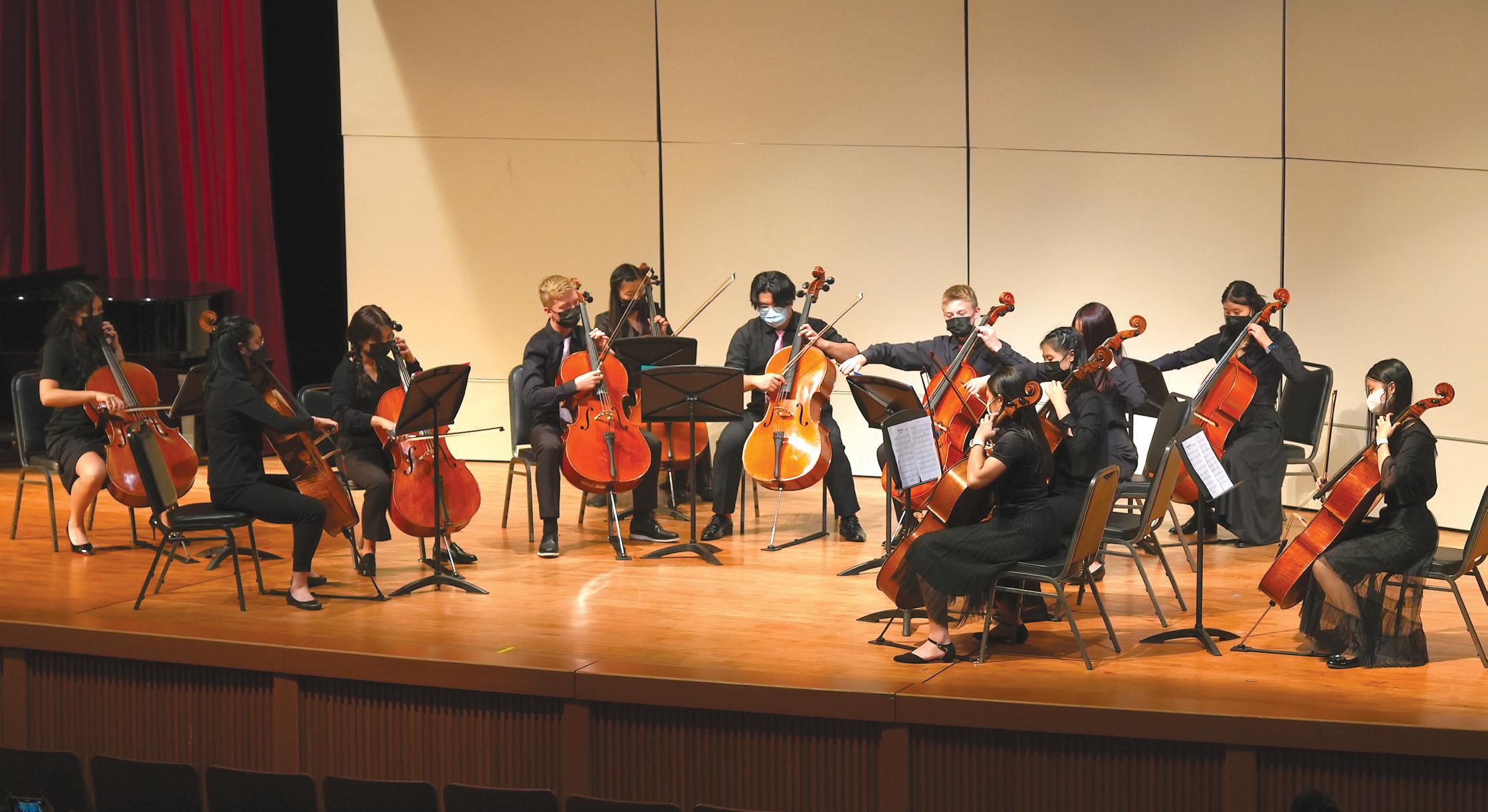
• Orchestra and Honors Orchestra
• Symphonic Band and Honors Symphonic Band
• Wind Ensemble and Honors Wind Ensemble
• Jazz Ensemble and Honors Jazz Ensemble
• Composition & Songwriting and Honors Composition & Songwriting
• Flute Chamber Ensemble and Honors Flute Chamber Ensemble
• Chamber Repertoire Performance and Honors Chamber Repertoire Performance
• Music Production and Technology and Honors Music Production and Technology
• Piano Performance and Honors Piano Performance
CONCERT CHOIR (UMUS01)
HONORS CONCERT CHOIR (UMUS02)
Duration: 1 year
Credit: 1
Grade: 9-12 (10-12 for Honors)
Homework: Light
This class is open to all students. Students in this class sing a variety of choral repertoire that spans many styles and musical periods. Instruction in solo and ensemble vocal technique, performance skills, composition concepts, rehearsal technique and music literacy is provided. Students are given the opportunity to work with master musicians from the Taipei community, furthering students’ technical foundations and musicianship. There are 3 required concert performances on campus. This choir is not auditioned, but a brief interview with the director to check pitch and range is required for new choir students prior to placement. Concert Choir students may choose to enrol in Vocal Studio (UMUS25), a supplemental vocal technique class. Students in Honors Concert Choir must have completed a year of Concert Choir as a prerequisite and are expected to take leadership roles in the choir and learn a solo art song. Additionally, Honors students are highly encouraged to enrol in the Vocal Studio (UMUS25) class referred to above.
OPUS: VOCAL ENSEMBLE (UMUS03)
HONORS OPUS: VOCAL ENSEMBLE (UMUS04)
Duration: 1 year
Credit: 1
Grade: 9-12 (10-12 for Honors)
Homework: Light
Opus is an auditioned vocal ensemble. Students in this class sing a variety of advanced choral repertoire that spans many styles and musical periods. Instruction in solo and ensemble vocal technique, performance skills, composition concepts, rehearsal technique and music literacy is provided. Students are given the opportunity to work with master musicians from the Taipei community in master class settings and in Chamber Music
* Beginning Band Gr. 9 -12 Concert Choir Gr. 9 - 12 String Orchestra Gr. 9 - 12
Symphonic Band Gr. 9 - 12
Honors Symphonic Band Gr. 10 - 12
Wind Ensemble Gr. 9 - 12 (auditioned)
Jazz Ensemble Gr. 9 - 12 (auditioned)
Vocal Studio Gr. 9 - 12 (Sem. 1)
Honors Concert Choir Gr. 10 - 12
Honors String Orchestra Gr. 10 - 12
Composition & Songwriting Gr. 9-12
Music Production & Technology Gr. 9-12
Opus Gr. 9 - 12 (auditioned)
Orchestra Gr. 9 - 12 (auditioned)
Honors
Composition & Songwriting Gr. 10-12
Honors Music Production & Technology 1 Gr. 10-12
Honors Music Production & Technology 2 Gr. 11-12
Flute Chamber Ensemble (1 semester or 1 year) Gr. 9-12 Chamber Repertoire Performance (1semester after school) Gr. 9-12
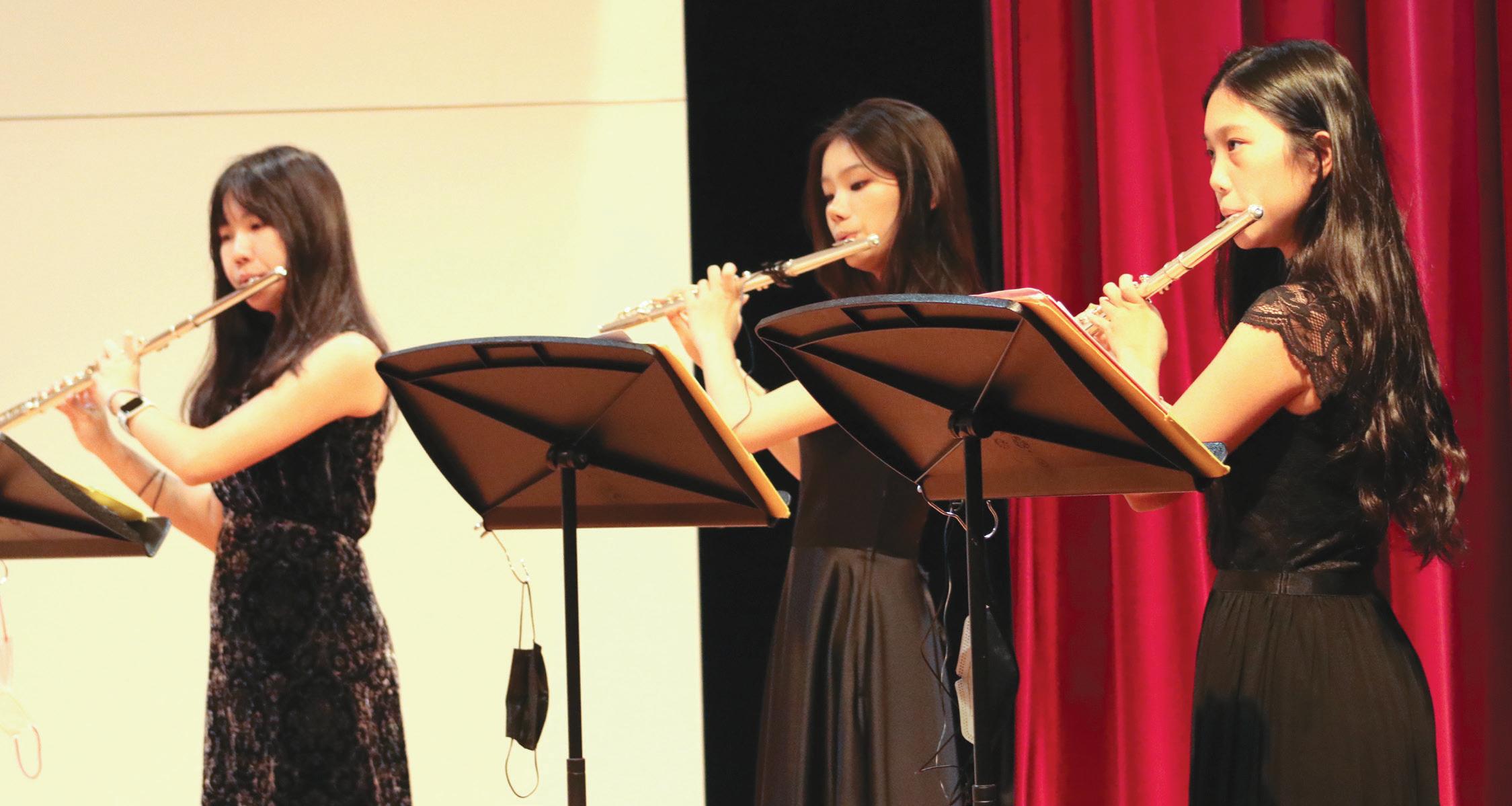
Honors Flute Chamber Ensemble (1 semester or 1 year) Gr. 10-12
Honors Chamber Repertoire Performance (1 semester after school) Gr. 10-12
Honors Wind Ensemble Gr. 10 - 12 (auditioned)
Honors Jazz Ensemble Gr. 10 - 12 (auditioned)
* pending sufficient enrollment
Honors Opus Gr. 10 - 12 (auditioned)
Honors Orchestra Gr. 10 - 12 (auditioned)
Honors Music Production & Technology 3 Gr. 12
Piano Performance (Sem. 1) Gr. 9-12
Honors Piano Performance (Sem. 1) Gr. 10-12
AP Music Theory Gr. 10-12 (teacher recommendation)
IBSL Music 1 / IBHL Music 1 Gr. 11 (teacher recommendation)
IBSL Music 2 / IBHL Music 2 Gr. 12
small ensemble preparations, furthering students’ technical foundations and musicianship. There are several concerts during the year; some performances may be off campus. Auditions are held in early spring for the following year’s choir. Opus students must have previous ensemble experience and a good working knowledge of music theory. Successful candidates are offered a place in Opus for one year. Existing members must re-audition. Opus and Honors Opus students are encouraged to enrol in Vocal Studio (UMUS25), a supplemental vocal technique class. Students in Honors Opus must have completed a year of Opus as a prerequisite. Students in Honors Opus are also expected to take leadership roles in the choir, learn a solo art song, and perform in or conduct a small ensemble.
Duration: 1 Year
Credit: 1
Grade: 9-12 (10-12 for Honors)
Homework: Moderate
Students will develop the foundation of music composition through the medium of songwriting, exploring a range of different styles and learning how to compose in each.Through listening to a range of music, students will learn to extract the key features of different genres and learn to incorporate these into their own compositions.Students will learn the nuances of melodic writing, harmony, arrangement/orchestration et al. This course is aimed at students who already play a musical instrument or sing, with some degree of musical literacy. You do not need to know to how to compose already. This course will provide a strong foundation for further academic music study. Students in Honors Composition and Songwriting must have completed a year of Composition and Songwriting as a prerequisite or submit a portfolio of work for instructor approval, they will be required to complete additional assignments and tasks.
Duration: 1 year
Credit: 1
Grade: 9-12 (10-12 for Honors)
Homework: Moderate
This class consists of intermediate to advanced players of violin, viola, cello, and bass. The students rehearse and perform orchestra music representing a variety of styles and appropriate developmental level. Solo performance
and chamber music ensembles may also be included. For the latter, the students are provided the opportunity to be coached by master musicians from the Taipei community. Along with the performance emphasis of this course, there is also integration of technical studies for skill development, music theory, and music listening. Students must own their own instruments with the exception of viola and double bass. For new students to the school, entrance into the class is based on a performance placement test; continuing string program students require teacher recommendation. Students in Honors String Orchestra must have completed a year of String Orchestra as a prerequisite. Students in the Honors class are also expected to demonstrate musical leadership and perform additional repertoire.
Duration: 1 year
Credit: 1
Grade: 9-12 (10-12 for Honors)
Homework: Moderate
This is a performance based class for advanced players of violin, viola, cello and double bass in which skills of string technique, theory and musicianship are taught through the medium of an orchestral ensemble and chamber music. The orchestral performance experiences include both string orchestra and symphonic repertoire. Required performances are at TAS and in community settings. Master musicians from the Taipei community join the orchestra to enhance and expand the symphonic repertoire experience and provide additional chamber music coaching. Entry to this orchestra class is by audition only with consideration of instrumentation needs. Students in Honors Orchestra must have completed a year of Orchestra as a prerequisite and these students have additional performance requirements.
Duration: 1 semester, offered in Semester 1 only
Credit: 0.5
Grade: 9-12
Homework: Light
This class is an entry level course for students who wish to learn how to play a band instrument (or bass guitar). No experience is required. The level of instruction is accelerated to enable students to perform with the Symphonic Band after one semester. School instruments (but not bass guitars) can be loaned to beginners. Students are encouraged to select instruments that are usually under-represented in band programs, such as French Horn, double reeds, and low brass.
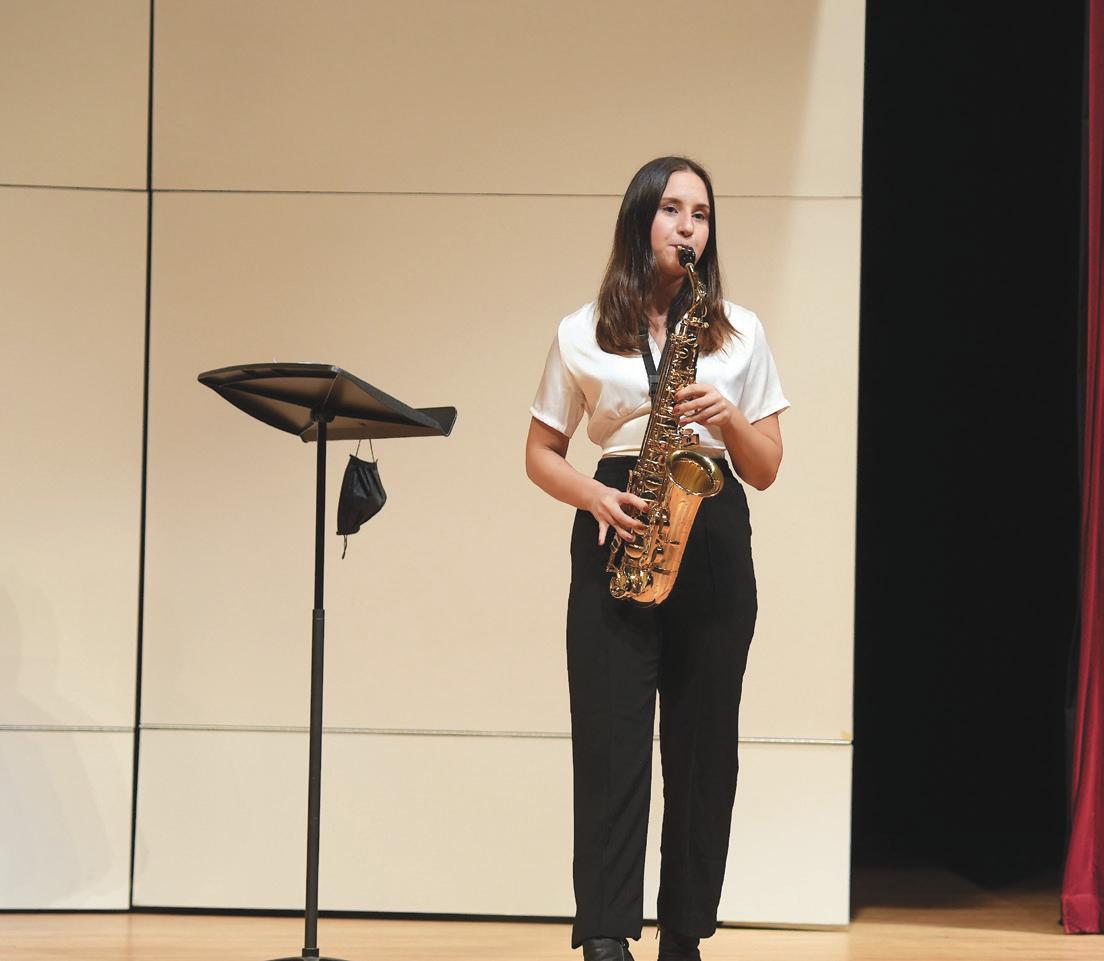
Duration: 1 year
Credit: 1
Grade: 9-12 (10-12 for Honors)
Homework: Light (Moderate for Honors)
This intermediate level upper school band meets every other day. The course provides instruction in performing music through various repertoire of level 3 – 4 (medium to medium-advanced difficulty) performance literature, technical skill exercises, sight-reading, music theory, and an understanding of musical composition through listening, original composing, and analysis. In addition to the full ensemble experience, students are offered the opportunity to play in small chamber music groups and solos. Performances are given at TAS and are a graded requirement for this course. Placement into this class is determined after an interview/ audition with the directors, and consideration of instrumentation needs. Students in Honors Symphonic Band must have completed a year of Symphonic Band as a prerequisite and are required to complete additional music assignments and tasks.
Duration: 1 year
Credit: 1
Grade: 9-12 (10-12 for Honors)
Homework: Moderate
This class is an auditioned ensemble of 45-50 players. The course provides instruction in performing music through a varied repertoire of level 3.5 – 5 (medium-advanced to advanced difficulty) performance literature, technical skill exercises, sight-reading, music theory, and an understanding of musical composition through listening, original composing, and analysis. In addition to the full ensemble experience, opportunities to perform with the orchestra or in small chamber groups are made available. In this class students are given the opportunity to work with master musicians from the Taipei community in master class teaching settings and in Chamber Music small ensemble preparations, furthering students’ instrumental technical foundations and musicianship. Required performances are given at TAS and throughout the Taipei area. Placement is determined after an interview/ audition with the directors, and consideration of instrumentation needs. Students in Honors Wind Ensemble must have completed a year of Wind Ensemble as a prerequisite and are required to complete additional music assignments and tasks.
* Students who play flute, clarinet, alto saxophone, trumpet, or trombone are required to provide their own instrument.
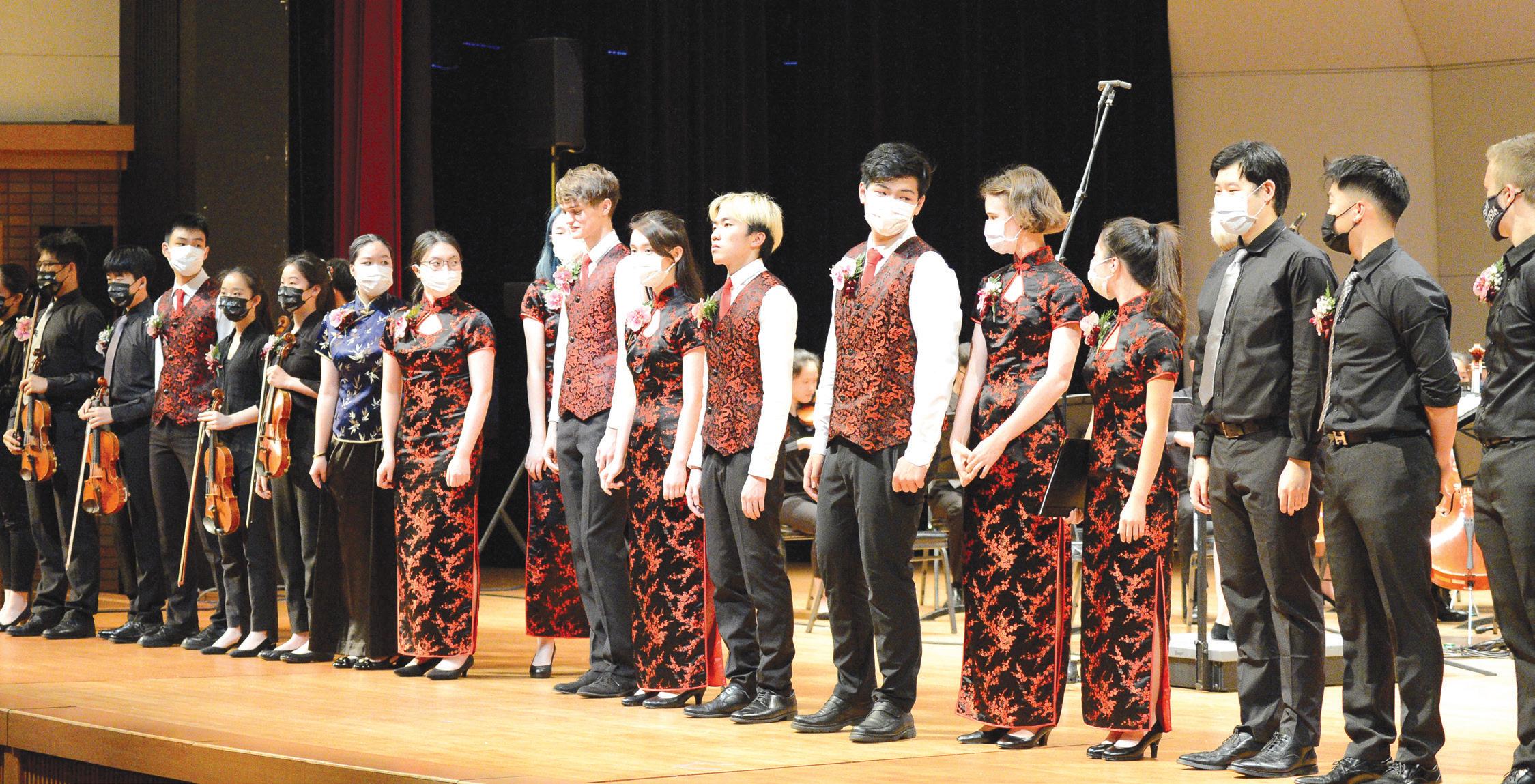
Duration: 1 year
Credit: 1
Grade: 9-12 (10-12 for Honors)
Homework: Moderate
This class is an auditioned group that studies and performs music in the swing, Latin, jazz-rock, and ballad styles. The course includes instruction on improvisation, jazz theory, history, listening, and performance in both
“big-band” and smaller combo settings. Prior knowledge of fundamental musical concepts (scales, breathing, posture, tone quality, tuning, etc.) is required. Required performances include venues at TAS as well as the local community. Placement into the group is determined after an interview/ audition with the directors, and consideration of instrumentation needs. Students in Honors Jazz Ensemble must have completed a year of Jazz Ensemble as a prerequisite and may be required to complete additional music assignments and tasks.
Duration: 1 year
Credit: 1
Grade: 10-12
Homework: Moderate
This course emphasizes music theory beyond the fundamentals through a detailed study of notation, rhythm, tonality, melody, harmony, and form. Aural skills, contextual listening skills, and composition techniques will be refined through this course. Students wishing to take this course should have a comprehensive understanding of basic theory, plus the ability to hear, read, and notate music. The AP Music Theory examination will be taken at the end of the year. Consultation with the course teacher or an ensemble music director is required prior to enrolment.
Duration: 1 semester, offered in Semester 1 only
Credit: 0.5
Grade: 9-12 (10-12 for Honors)
Homework: Moderate
This one semester course explores the avenues available to pianists who wish to perform with other musicians. Collaboration and accompanying skills are the main focus of the class. Students will have the opportunity to accompany singers, instrumentalists and choirs. Basic theory, improvisation, pedagogical and business skills of private and group instruction will also be addressed. Students are given the opportunity to work with master musicians from the Taipei community in master class
settings, furthering student’s technical foundations and musicianship. This class is for intermediate to advanced pianists and requires approval from the instructor. Students in Honors Piano Performance must have completed a semester of Piano Performance as a prerequisite along with instructor approval and will be required to complete additional assignments and tasks.

Duration: 1 semester, offered in Semester 1 only
Credit: 0.5
Grade: 9-12
Homework: Light
Vocal Studio is highly recommended for Grade 9-12 students who are enrolled in Honors Concert Choir, Opus, and Honours Opus. Students in Concert Choir may choose to take Vocal Studio as well. This class is a supplement to choir class and individual vocal technique needs will be addressed one-to-one or in small groups. Meeting times will be arranged according to each student’s class schedule. Admittance to the class is determined by enrollment in a choir class. This is a pass/fail class.
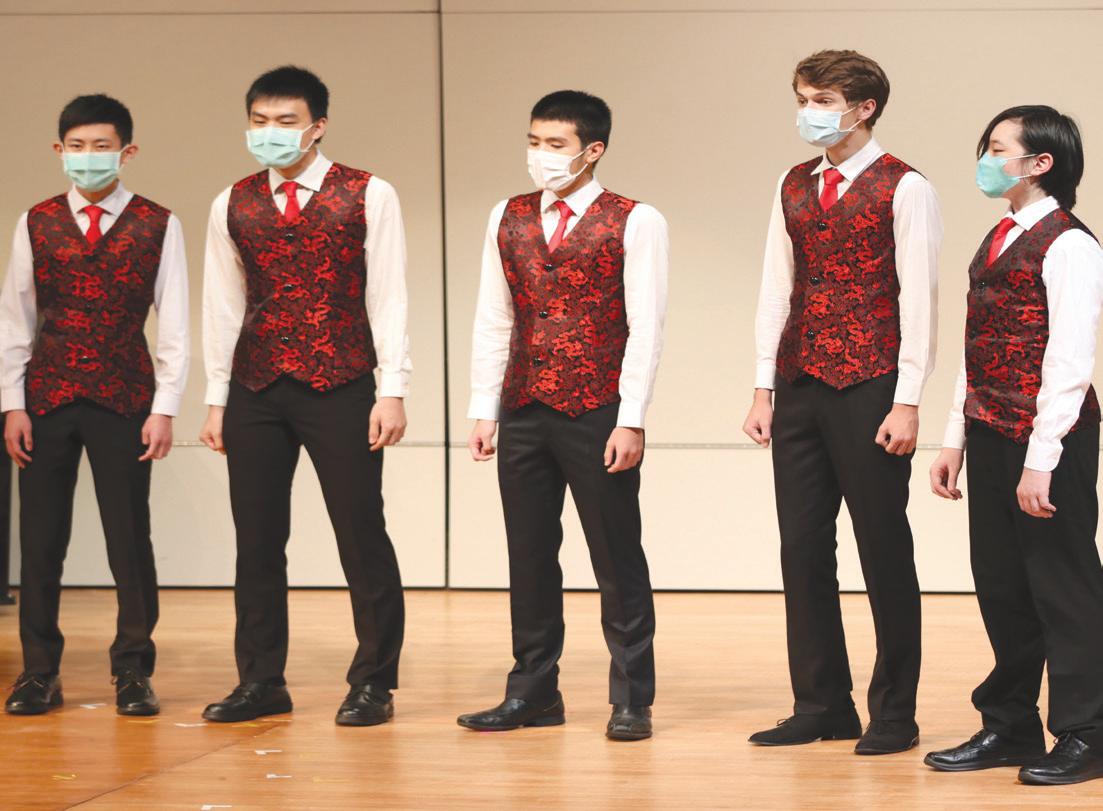
Duration: 1 year
Credit: 1
Grade: 9-12
Homework: Light
The Music Production & Technology course is designed for students who are interested in using technology together with music for the purposes of creating and engineering music. The course is intended for students with varied music experience levels as well as non-musicians who are interested in gaining skills that will help them to integrate music into other disciplines. Lessons are designed to provide hands-on study of recording studio techniques and music creation. Students will create original work while developing listening and technical skills for audio production. Students will focus on many aspects of contemporary music production and creation that will assist them as they prepare for experiences that are utilized by 21st century professionals: film scoring, commercial advertising, media production, acoustic engineering, TV/Radio production, e-media/ web production, electronic systems design, music composing and engineering. Core strands of music production and technology will be covered by all students: recording/sound design; mixing; film scoring; composition/arranging; production. Topics include but are not limited to:
mastering, mixing, microphones, listening, physics of sound, sound effects, recording, sound editing, MIDI, composing, arranging and film scoring. Recommendation by the course teacher is required prior to enrolment.
Duration: 1 year
Credit: 1
Grade: 10-12
Prerequisite: Music Production & Technology
Homework: Moderate
The Honors Music Production & Technology 1 course is designed for students who are interested in furthering their potential to create and engineer music. The course is intended for students with prior experience in music production and technology and who are interested in pursuing more advanced challenges in creating their own studio work. Lessons are designed to provide continued hands-on study of recording studio techniques and music creation. Students will create original work while further refining their listening and technical skills for audio production. Students will focus on many aspects of contemporary music production and creation that will assist them as they prepare for experiences that are utilized by 21st century professionals: film scoring, commercial advertising, media production, acoustic engineering, TV/Radio production, e-media/web production, electronic systems design, music composing and engineering. While core strands of music production and technology will be covered by all students, individuals may also choose to specialize in one or more of the music tech strands: recording/sound design; mixing; film scoring; composition/arranging; production. Topics include but are not limited to: mastering, mixing, microphones, listening, physics of sound, sound effects, recording, sound editing, MIDI, composing, arranging and film scoring. Recommendation by the course teacher is required prior to enrolment.
Music is important for the following reasons: it is abstract, it doesn’t mean anything outside itself. Music does not describe. Music does not narrate. Music does not tell stories. Music evokes. Music suggests, music implies, and music opens up the mind of a child in an extraordinary way. This abstraction about music is what offers a child the chance to move into a really special way of thinking.
Richard GillDuration: 1 year
Credit: 1
Grade: 11-12
Prerequisite: Honors Music Production & Technology 1
Homework: Moderate
The Honors Music Production & Technology 2 course is designed for students who are interested in furthering their potential to create and engineer music. The course is intended for students who have completed the Honors Music Production & Technology 1 course and who are interested in continued advancement creating and producing music. Lessons are designed to provide hands-on study of more complex recording studio techniques and music creation. Students will create original work while further refining their listening and technical skills for audio production and will be required to create a personal portfolio. Students will focus on many aspects of contemporary music production and creation that will assist them as they prepare for experiences that are utilized by 21st century professionals: film scoring, commercial advertising, media production, acoustic engineering, TV/Radio production, e-media/web production, electronic systems design, music composing and engineering. Students from this course will have prior experience with the core strands of music production and technology and will likely elect to specialize in one or more of the music tech strands: recording/sound design; mixing; film scoring; composition/arranging; production. Topics include but are not limited to: mastering, mixing, microphones, listening, physics of sound, sound effects, recording, sound editing, MIDI, composing, arranging and film scoring. Recommendation by the course teacher is required prior to enrolment.
Duration: 1 year
Credit: 1
Grade: 12
Prerequisite: Honors Music Production & Technology 2
Homework: Moderate
The Honors Music Production & Technology 3 course is designed for students who are interested in furthering their potential to create and engineer music. The course is intended for students who have completed the Honors Music Production & Technology 2 course and who are interested in continued advancement creating and producing music. Lessons are designed to provide hands-on study of more complex recording studio techniques and music creation. Students will create original work while further refining their listening and technical skills for audio production and will be required to create a personal portfolio. Additionally, students from this course will elect a large scale independent project that will utilize the advanced skills they have developed through their prior courses and experience. Students will focus on many aspects of contemporary music production and creation that will assist them as they prepare for experiences that are utilized by 21st century professionals: film scoring, commercial advertising, media production, acoustic engineering, TV/Radio production, e-media/web production, electronic systems design, music composing and engineering. Students from this course will have prior experience with the core strands of music production and technology and will likely elect to specialize in one or more of the music tech strands: recording/sound design; mixing; film scoring; composition/arranging; production. Topics include but are not limited to: mastering, mixing, microphones, listening, physics of sound, sound effects, recording, sound editing, MIDI, composing, arranging and film scoring. Recommendation by the course teacher is required prior to enrolment.
Duration: 1 semester, offered in Semester 1 only.
Credit: 0.5
Grade: 9-12 (10-12 for Honors)
Homework: Moderate
This class is open to all instrumental students and pianists who would like to take an additional chamber ensemble class. Focus is on projects for collaborative performance in small groups, including sonatas, resulting in several live performances and/or recordings. Groups can include various combinations of piano, strings, winds and brass instruments as well as instrumental family specific ensembles. Admission by director approval for all instruments with consideration for collaborative instrumentation needs. Offered first semester only and meets after school. Students may enroll every year. Students may take the class for no credit, but are still required to complete a final performance project. Participation will be recorded on the student transcript. Students in Honors Chamber Repertoire Performance must have completed a year of Chamber Repertoire Performance or have permission from the teacher as a prerequisite and may be required to complete additional music assignments and tasks. Students in Honors Chamber Repertoire must take the class for credit.
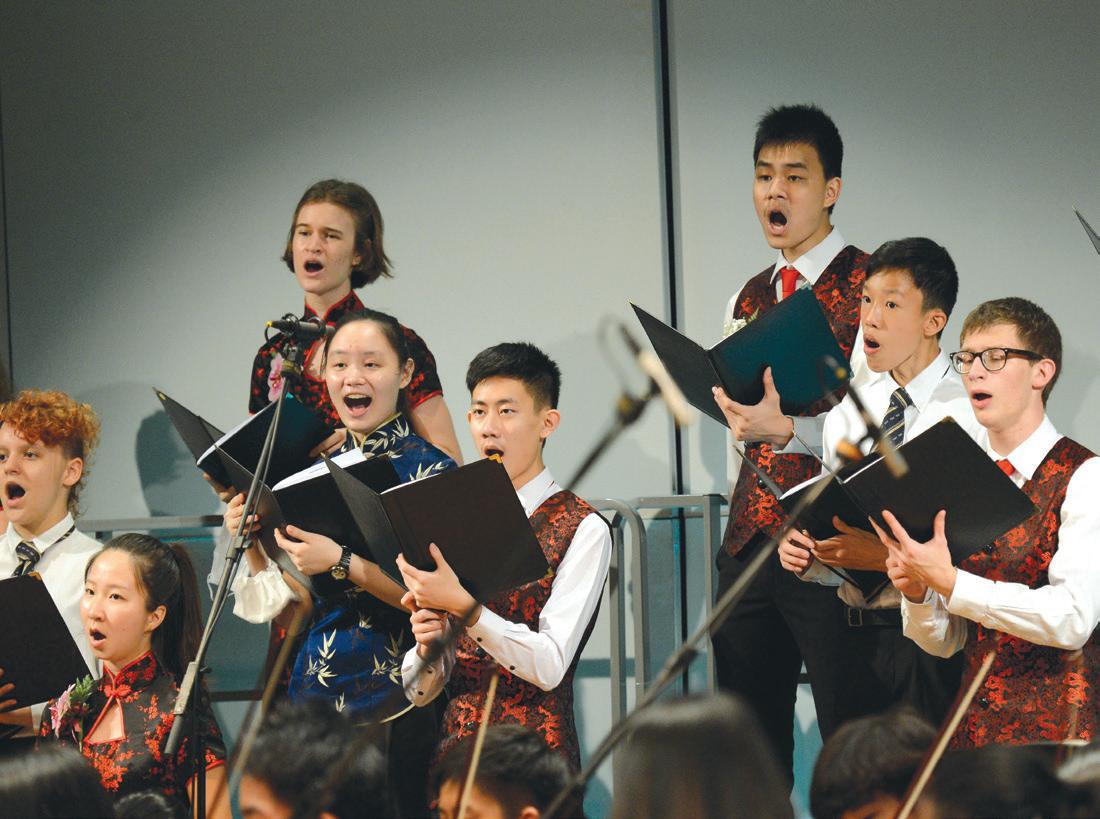
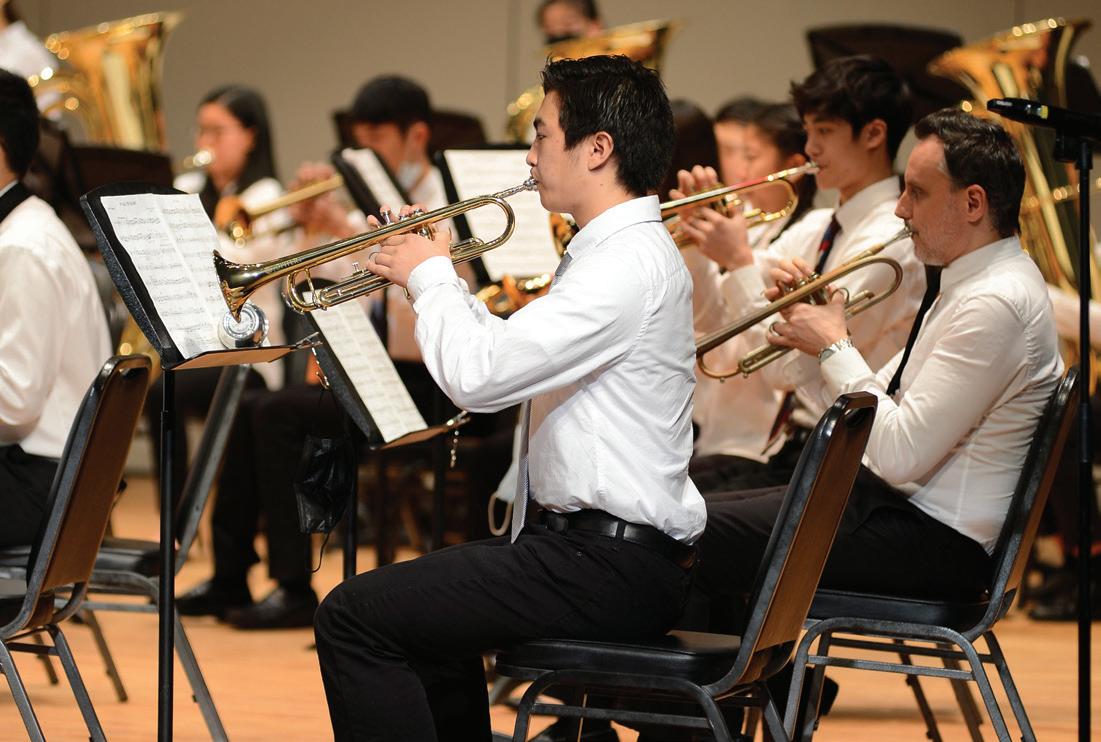
If we are to hope for a society of culturally literate people, Music must be a vital part of our children’s education.
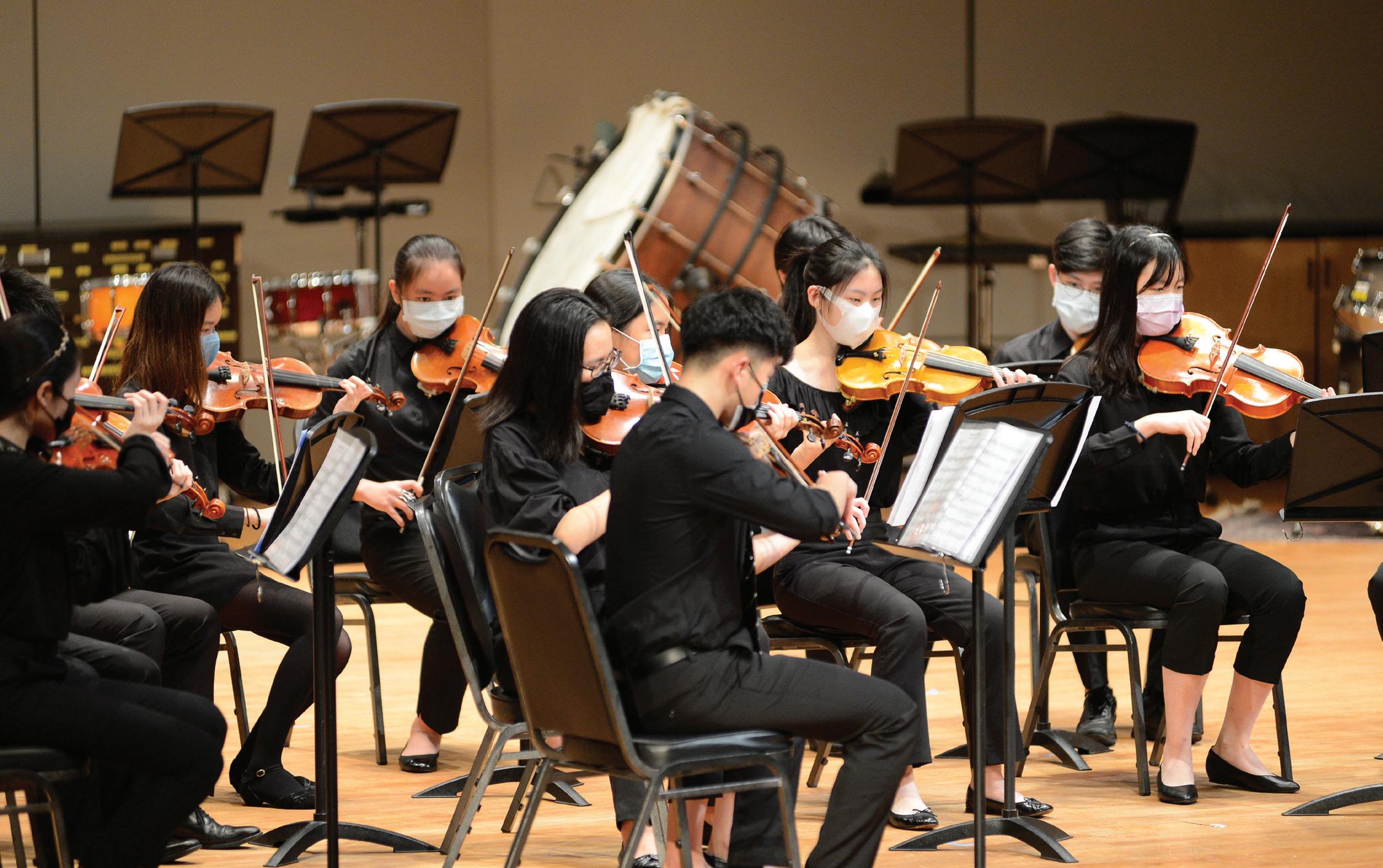
Duration: 1 semester or 1 year
Credit: 0.5-1
Grade: 9-12 (10-12 for Honors)
Homework: Moderate
Flute Chamber Ensemble is a performance-oriented class intended for flute players with intermediate to advanced technical skills. The class will explore the rich literature of music which has been composed over several centuries for flute duets, trios, quartets, and larger ensembles. Students in this class will have the opportunity to improve their musicianship and technical skills using the complete instrumentation of a flute choir (piccolo, flute, alto and bass flute). Repertoire will be performed from the Renaissance, Baroque, Classical and Contemporary Eras, with attention to the techniques and styles appropriate for each musical period. Students will also have the opportunity to creatively explore composition for flute ensembles and study, analyze and listen to representative works of the genre. The class will perform in chamber music settings and concerts throughout the year. Participation in the class will be based on audition or teacher recommendation. Students may elect to enroll in one or both semesters of this course. Students in Honors Flute Chamber Ensemble must have completed a year of Flute Chamber Ensemble as a prerequisite and may be required to complete additional music assignments and tasks.
IBHL
Duration: 1 year
Credit: 1
Grade: 11 (SL or HL)
Prerequisite: Teacher recommendation
Homework: Moderate
Through this course, students will be empowered to recognize how technical training and creative competencies combine to inform practical work and contribute to the formation of well-rounded modern musicians. Students will embody three roles: the researcher, the creator, and the performer. In these roles, they inquire, create, perform and reflect on the course’s three musical processes: exploring music in context, experimenting with music, and presenting music. Four musical areas will be explored through personal, local and global contexts: music for sociocultural and political expression, music for listening and performance, music for dramatic impact, movement and entertainment, and music technology in the electronic and digital age. Assessment will consist of written analysis, musical composition and/or improvisation, and solo and/or ensemble performing. In Year 2, HL students will take on an additional project as a contemporary music maker. IB external assessment will take place in the spring of Year 2 for students completing both years of the program.
IBSL MUSIC 2 (UMUS172)
IBHL MUSIC 2 (UMUS182)
Duration: 1 year
Credit: 1
Grade: 12 (SL or HL)
Prerequisite: Previous enrollment in UMUS171 or USMUS181 Homework: Moderate
In this course, students will continue to embody three musical roles: the researcher, the creator, and the performer. Year two will have a more practical focus as students complete the assessment components required by IB. Assessment will consist of written analysis, musical composition and/ or improvisation, and solo and/or ensemble performing. HL students will take on an additional project as a contemporary music maker. IB external assessment will take place in the spring of 2024 for students completing both years of the program.
Duration: 1 semester or 1 year
Credit: 0.5 or 1
Grade: 9-12
Homework: Light
No previous dance experience is required but a desire to explore a variety of dance forms is necessary. In this course, students will develop technical skills from various dance styles such as jazz, hip hop, ballet, theatre dance, with a focus on contemporary dance. Students will learn to manipulate space, time and energy in making dances. An emphasis will be placed on improving individual levels of fitness and physical skills. For students interested in continuing their dance studies, this course is strongly recommended prior to studying IB Dance. (May receive grade 10 PE or Arts credit)
Duration: 1 semester or 1 year
Credit: 0.5 or 1
Grade: 9-12
Homework: Moderate
Prerequisite: Middle School dance, previous dance training and/or at least one semester of Dance 1
This course is for dancers who have taken at least one semester of upper school dance, one year of middle school dance and/or recent dance training. The focus of this course is on developing intermediate to advancedintermediate technical and performance skills. The emphasis will be on contemporary technique though a variety of dance genres will be used throughout the course. The students will also develop basic choreographic skills. Students will be expected to choreograph and perform their work in an informal setting. This course is strongly recommended for students wishing to pursue Honors Dance or IB Dance.
Dance first. Think later. It’s the natural order.
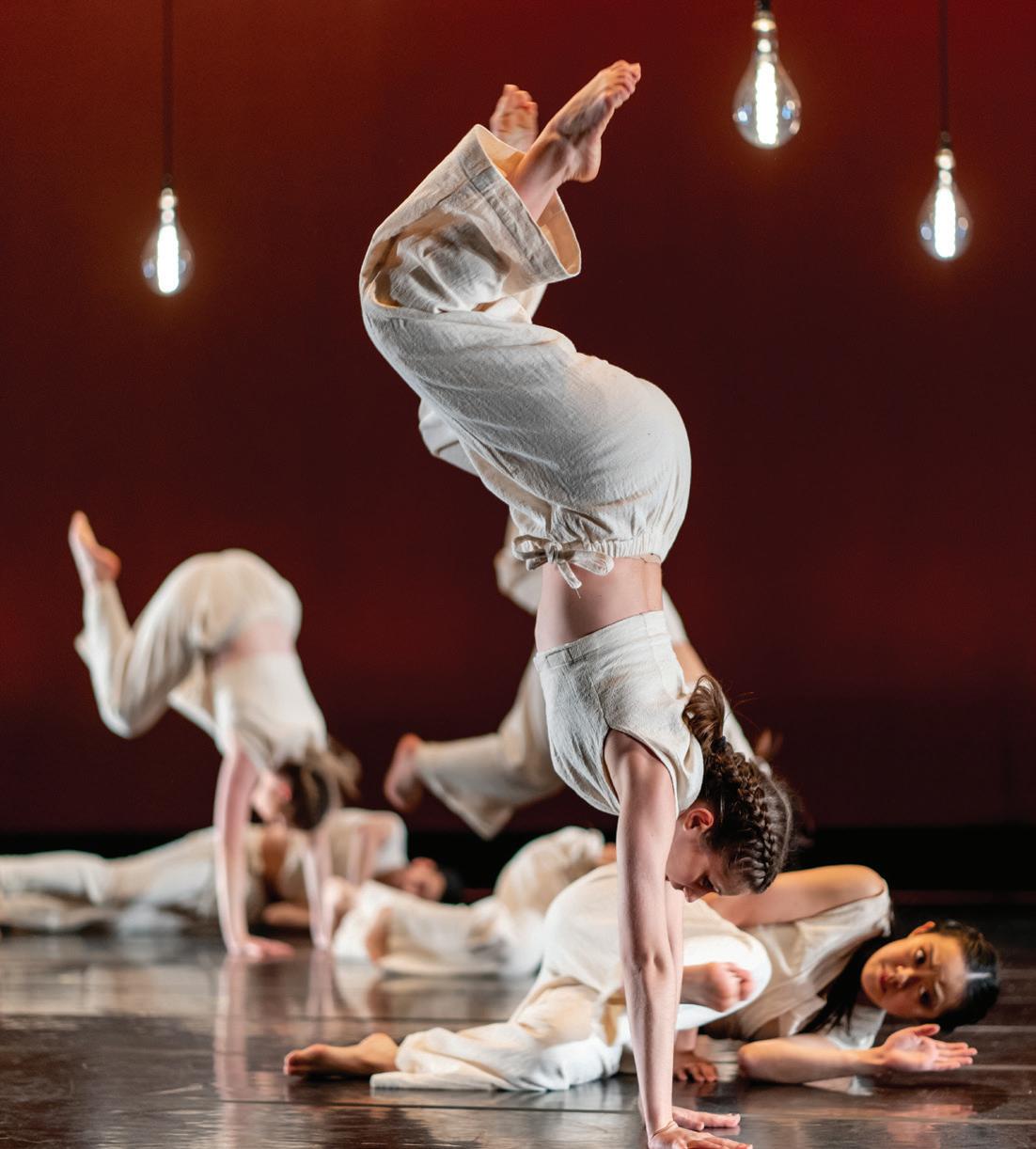 *Photos courtesy of Dustin Rhoades
Dance Flow Chart
*Photos courtesy of Dustin Rhoades
Dance Flow Chart
IBSL
IBHL DANCE 1 (UART03)
Duration: 1 year
Credit: 1
Grade: 11 (SL or HL)
Prerequisite: Teacher recommendation; previous dance experience is not required, but at least one semester of dance is strongly recommended
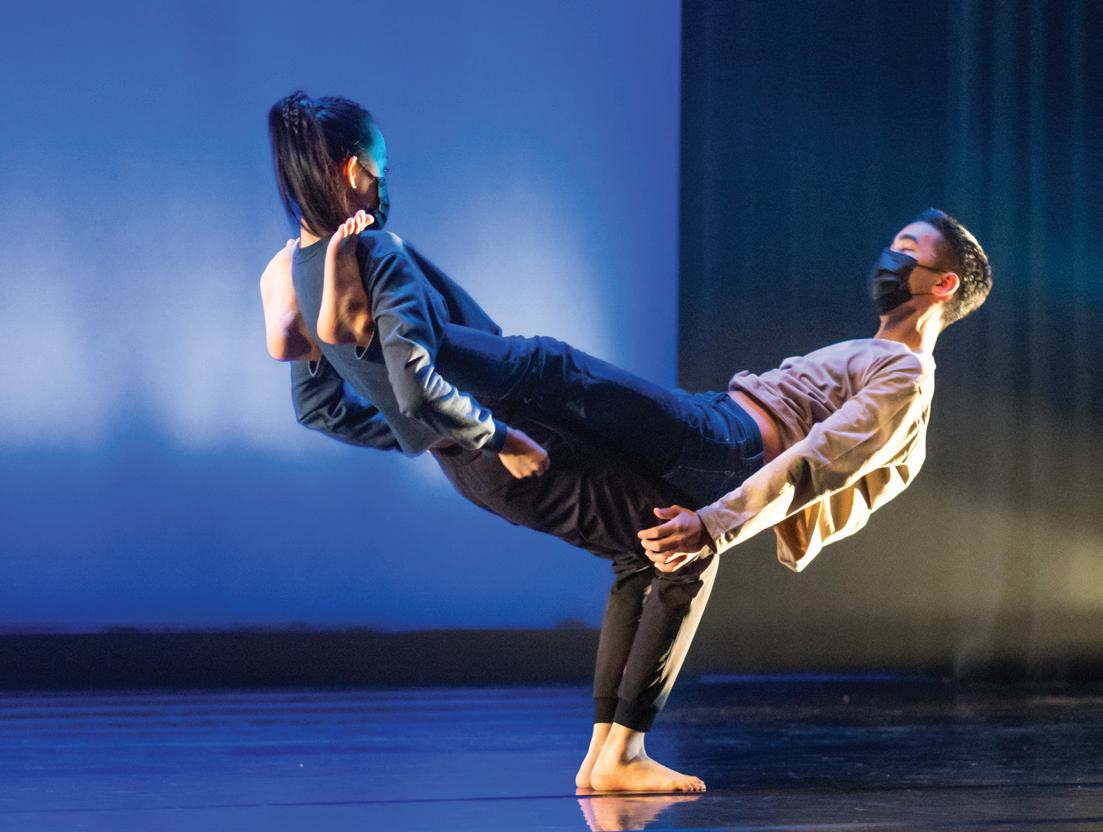
Homework: Moderate
In this course, students will study three areas of dance: Performance, Composition and Analysis, and World Dance Studies. Students will develop a high level of proficiency in technical and performance skills. They will also work through various creative processes in choreographing their own dances. World dance studies will require students to experience and explore dance from more than one culture. Some work outside class time will be required for rehearsals and research. Assessment will consist of performance work in the dance style of the student’s choice. IB external assessment will take place in the spring of 2025 for students completing both years of the program.
IBSL
IBHL
Duration: 1 year
Credit: 1
Grade: 12
Prerequisite: IBSL/IBHL Dance Year 1
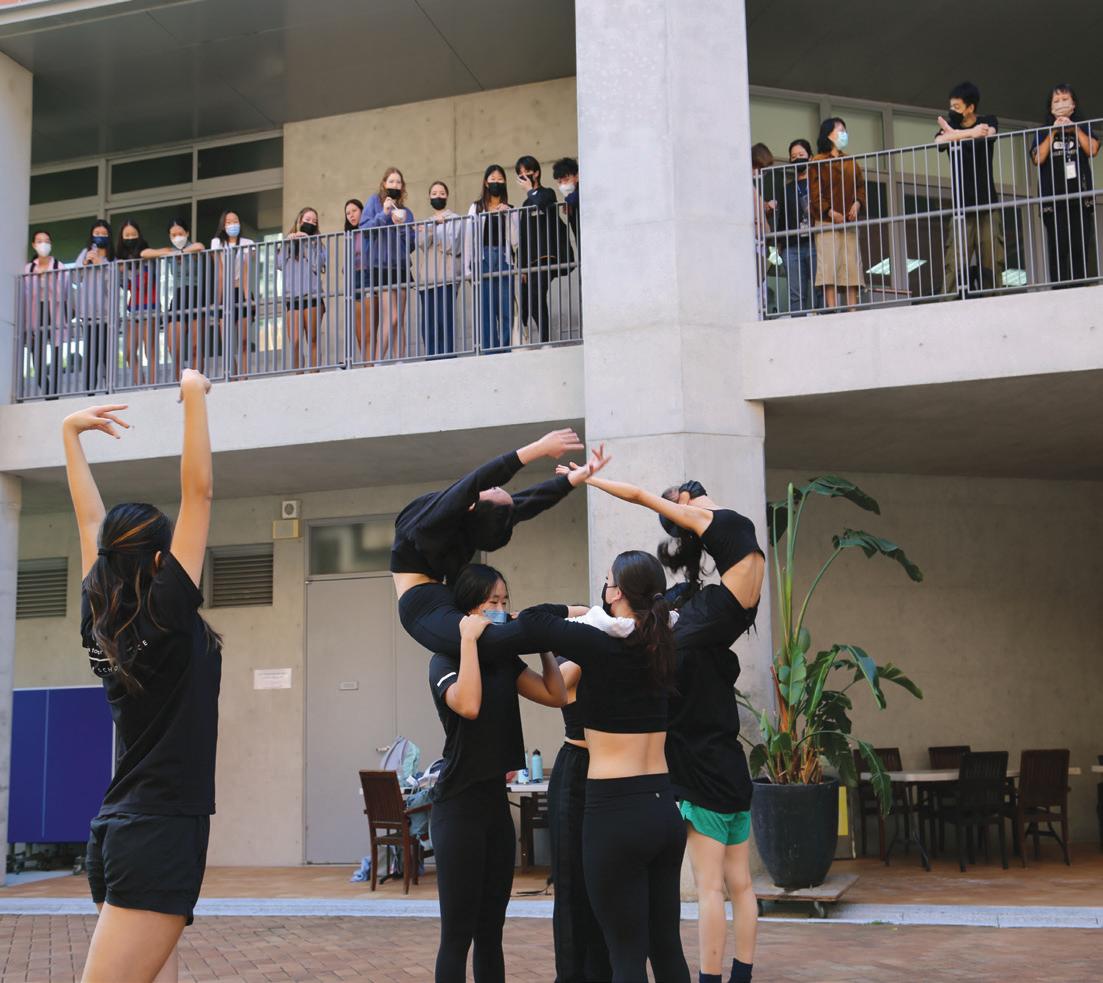
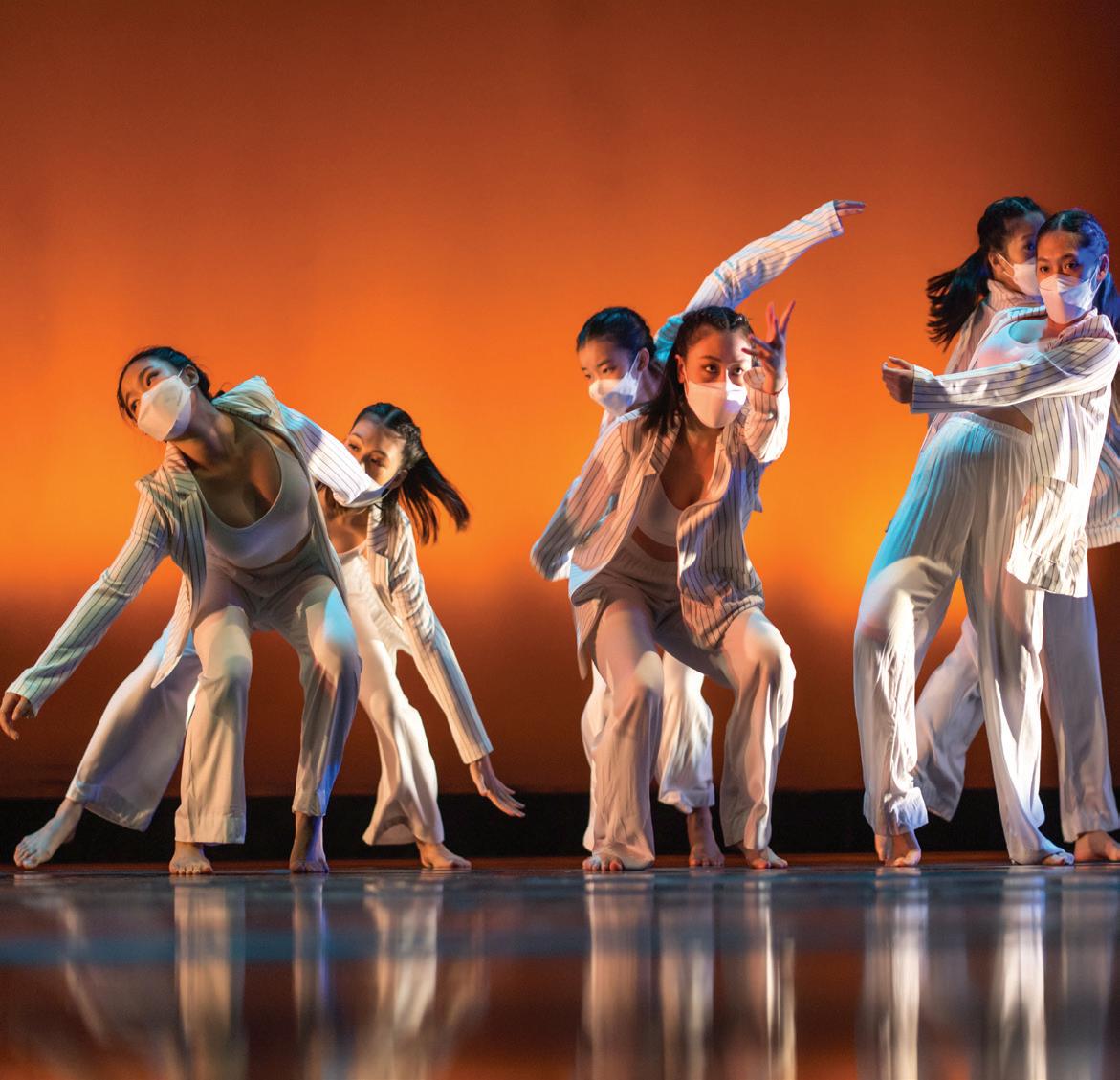
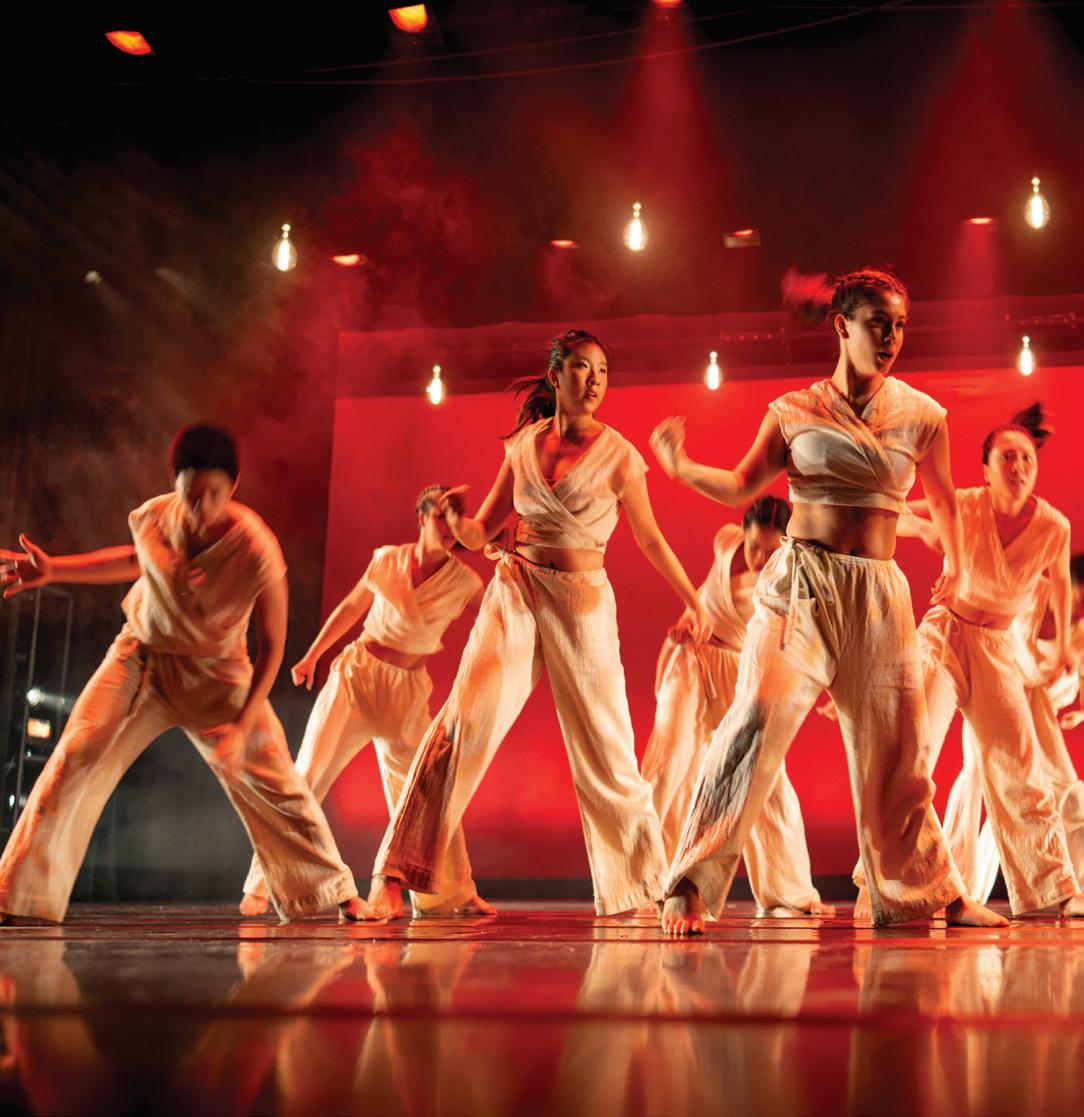
Homework: Moderate to Heavy
In this course, students will continue their study in the three areas of dance: Performance, Composition and Analysis, and World Dance Studies. The practical emphasis in year two will be on composition and performance. Students will complete the research and writing required in World Dance Studies. Some work outside class time will be required for composition, rehearsals and research. Research and composition and performance work will be submitted to IB for examination in the spring of 2024.
Duration:1 year
Credit:1
Grade: 10-12
Prerequisite: Dance 1 or Dance 2 with teacher recommendation, teacher permission for dancers with previous training
In this course, students will study three areas of dance: Performance, Composition and Analysis, and World Dance Studies. Students will develop a high level of proficiency in technical and performance skills. They will also work through various creative processes in choreographing their own dances. World dance studies will require students to experience and explore dance from more than one culture. Some work outside class time will be required for rehearsals and research. Assessment will consist of performance and composition in the dance style(s) of the student’s choice.
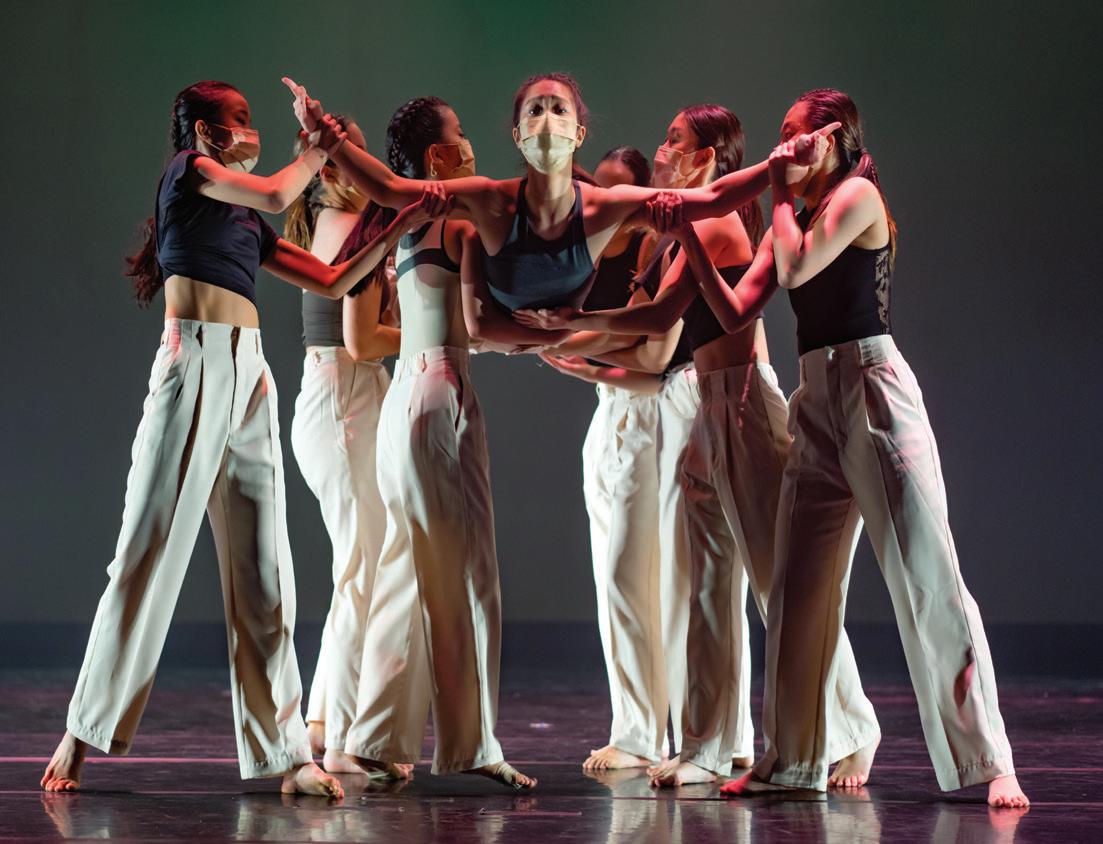
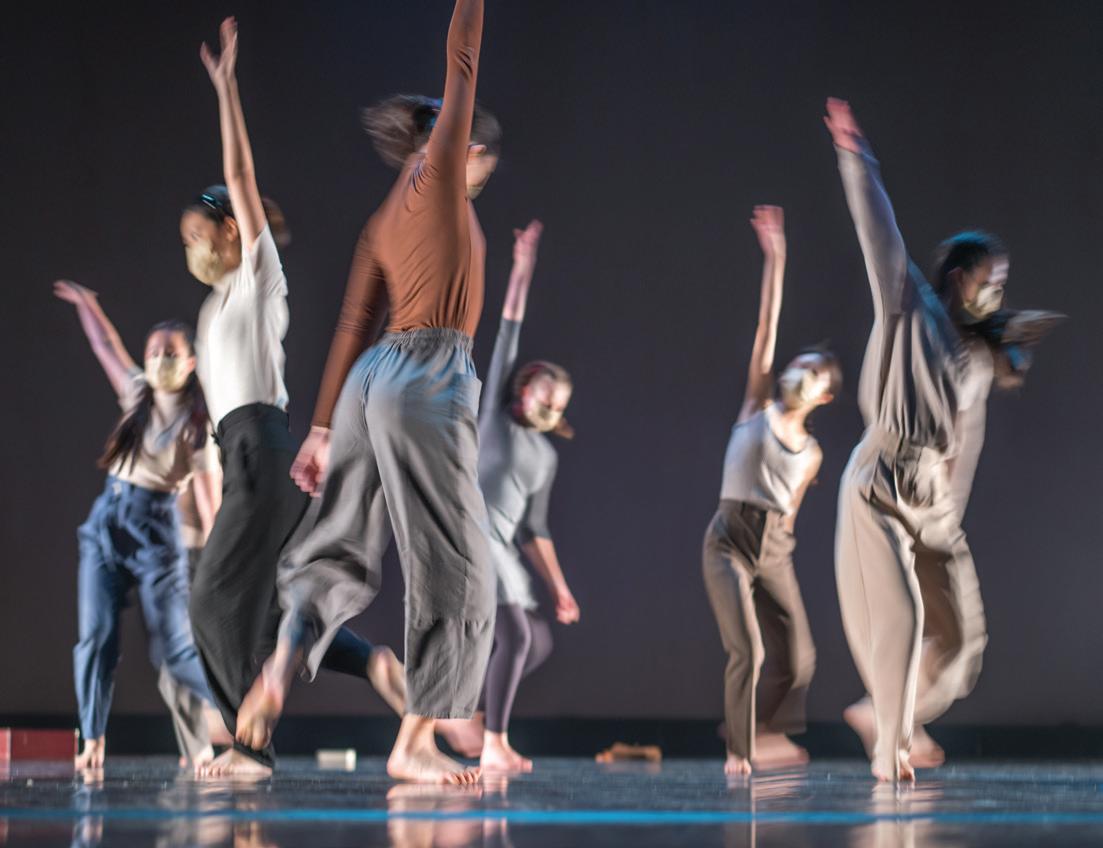
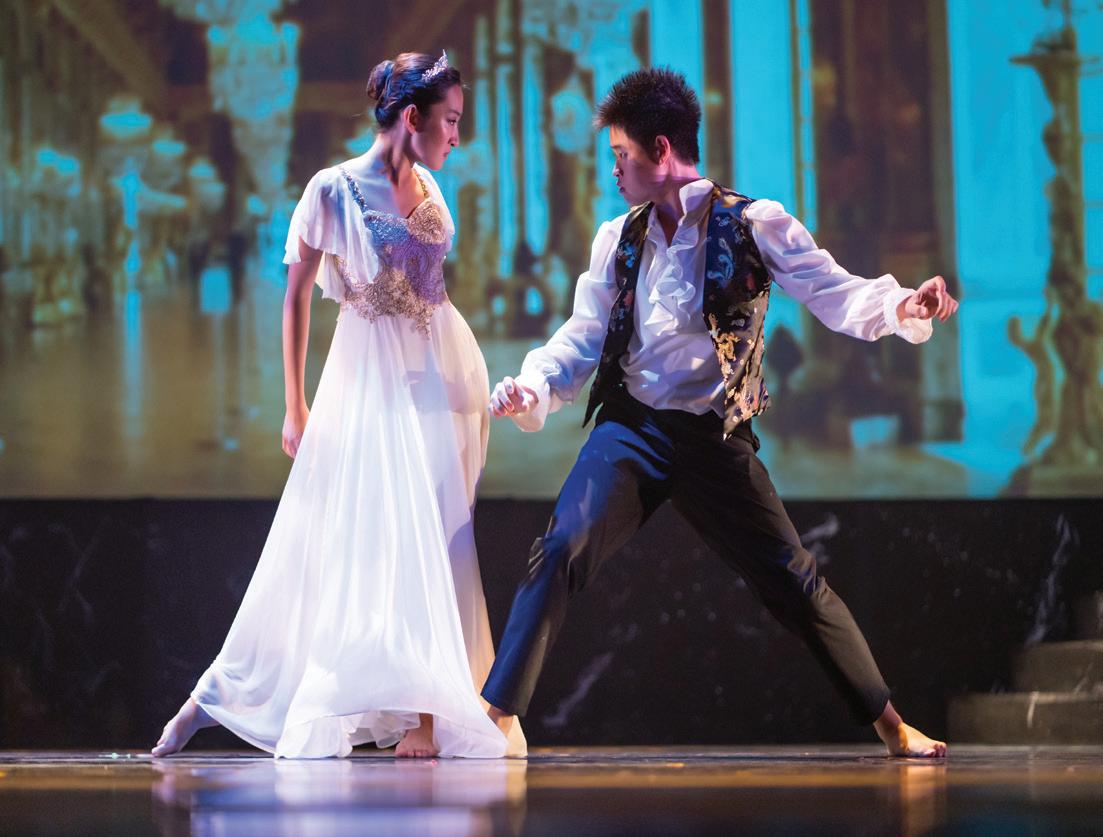
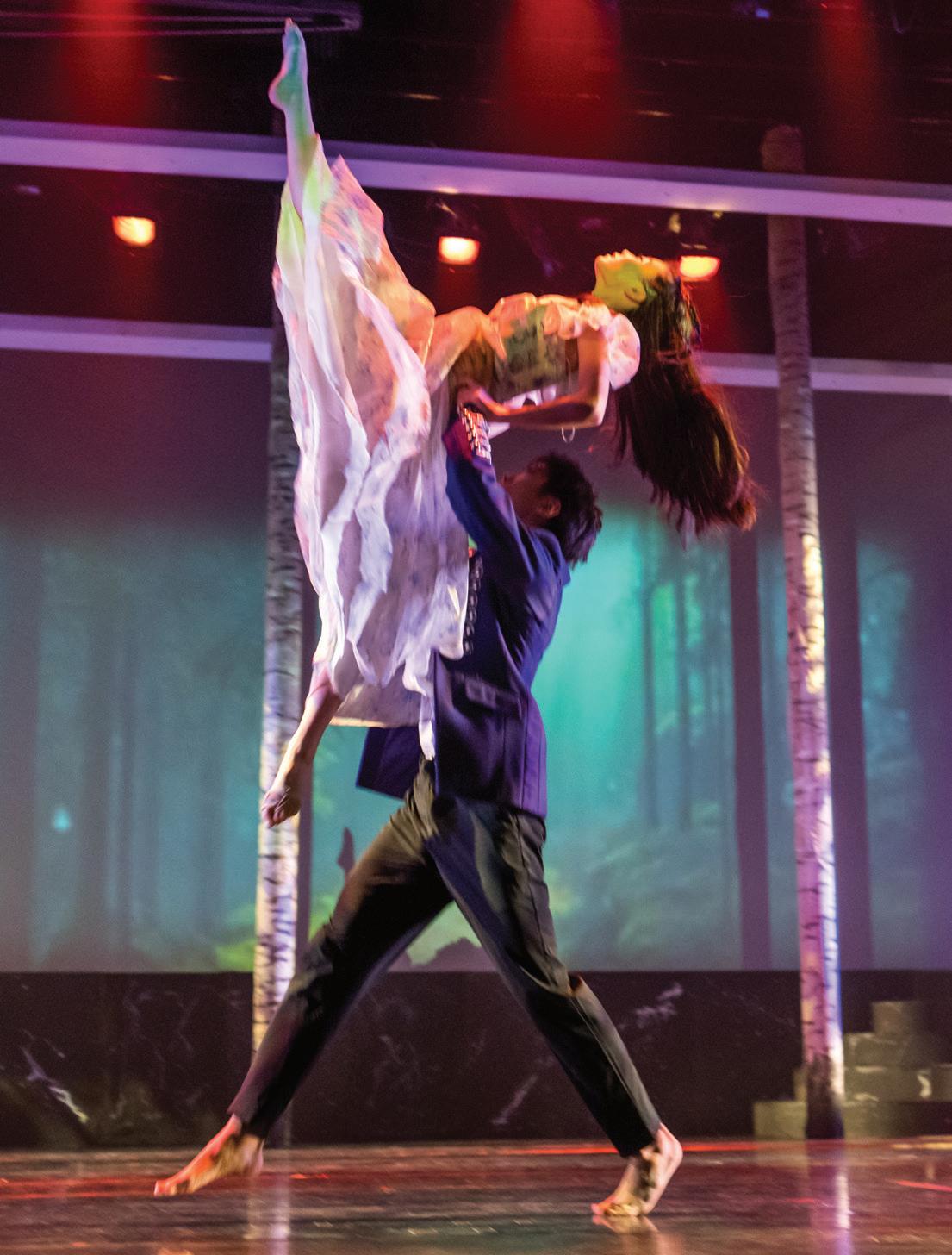
Duration: 1 year
Credit: 1
Grade: 11-12
Prerequisite: Honors Dance 3, IBSL/HL dance 1, or teacher permission for dancers with previous training
Homework: Moderate to Heavy
This course is for dancers who have taken at least two years of upper school dance and/or two or more years of recent dance training. In this course, students will continue their study in performance, composition and analysis and world dance. The practical emphasis will be on performance and composition. Some work outside class time will be required for composition, rehearsals and research. Major assessments will consist of performance exams, two compositions and written research.
Every day brings a chance for you to draw in a breath, kick off your shoes, and dance.
Duration: 1 year
Credit: 1
Grade: 9-12
Prerequisite: None
Homework: Light
Units of Study Include:
• Orientation/Trust/Ritual
• Movement/Ensemble
• Improvisation
• Voice/Diction and Storytelling
• Script Analysis/Script Creation
• Production Theater
This class satisfies either the performing arts requirement or the public speaking requirement but not both.
This course gives students an introduction to theater and provides frequent opportunities for speaking in front of others. Students will be working in a variety of dynamic orientations designed to bolster their confidence, creative problem solving, imagination and confidence. There will be a wide array of projects tackled, including (but not limited to) short memorized monologues and scene work, acting for the camera, improvisation, devised work and full play creation.
Duration: 1 semester, offered in Semester 1 only
Credit: 0.5
Grade: 9-12
Prerequisite: None
Homework: Light
This introductory course explores the challenges of mounting a theatrical production by providing a glimpse into each of the major facets of technical production – scenic design, lighting design, costume design, sound design, stage management, and basic production materials and techniques. In addition to exploring the design theories and their history, students have the opportunity to work on productions staged during the course of the semester. The main goal is to generate enthusiasm for and an understanding of the varied crafts which constitute theatrical design and production.
Duration: 1 semester, offered in Semester 2 only
Credit: 0.5
Grade: 9-12
Prerequisite: Theatrical Design & Technology, or permission of instructor
Homework: Light
This course extends the knowledge gained in Stagecraft and provides students with the skills, techniques, and experiences necessary to work collaboratively behind the scenes in the performing arts. With a combination of theory in the specialized technology of theater and practical hands-on
What does the director do? He bears to the preparation of a play much the same relation as an orchestra conductor to the rehearsal of a symphony. But the symphony is performed by the conductor with each member of the orchestra playing under his leadership. He does not play the leading part. He does more. He interprets, shapes, guides, inspires the entire performance.
Tyrone Guthriecollaboration with peers, advanced technical theater engages students to think critically about production methods and techniques and trains them to think creatively about theater as an art form which is easily greater than the sum of its component parts.
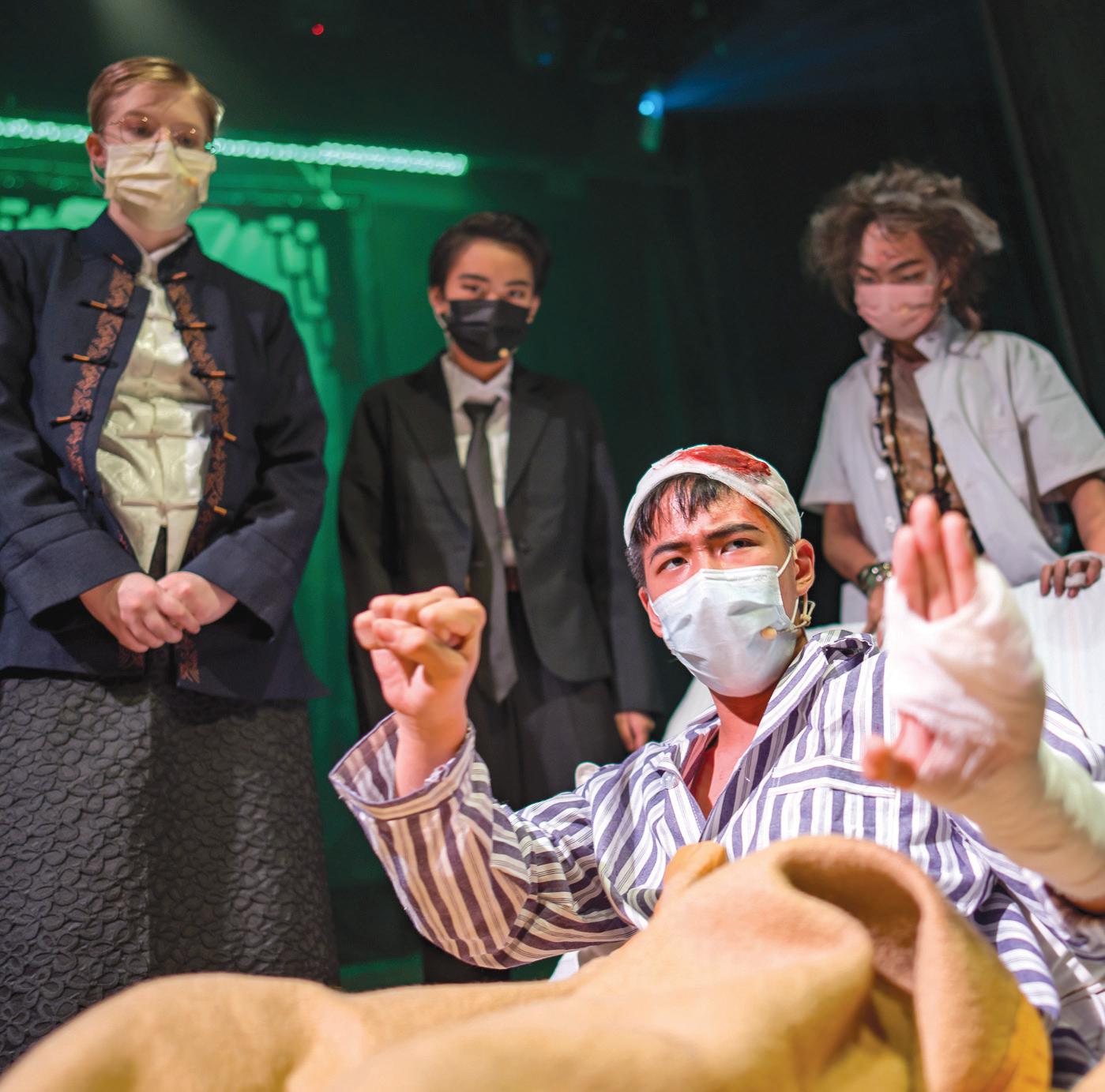
Duration: 1 semester, offered in both semesters
Credit: 0.5 or 1
Grade: 10-12
Prerequisite: Permission of instructor
Homework: Moderate
This class is restricted to students with previous commitment and involvement in theatrical production who wish to focus in depth on putting the training and theory of stagecraft into actionable practice with the major productions in the TAS theater venues. The course meets after school and requires the same number of class hours as any normally scheduled class; it may be taken more than once. Students are expected to fulfill the leadership roles of lighting master electrician, stage manager, costume manager, or other production team role approved by the instructor.
Duration: 1 semester, offered in both semesters
Credit: 0.5 or 1
Grade: 11-12
Prerequisite: Stagecraft Production
Homework: Moderate
This course is restricted to highly motivated students with advanced experience in practical stagecraft production. Students complete production assignments after school working on all the theatre and dance productions over the course of the semester, committing the same number of class hours as any normally scheduled class. Students also create a portfolio showcasing their depth of knowledge in a given facet of stagecraftstage management, lighting design, costume design, or other technical theater area of focus. Students will face real world design challenges and the increasingly complex electronic and mechanical components of the entertainment industry in a unique supportive environment as part of a creative team. At the completion of the course, students will be prepared to pass the United States Institute of Theatre Technology’s essential skills competency exam.
*Photos courtesy of Dustin RhoadesGr. 9 - 12
Honors Theater 1
Gr. 9 - 12 / IB Theater 1
Gr. 11
Honors Theater 2
Gr. 9 - 12 / IB Theater 2
Gr. 12
Gr. 9 - 12
Gr. 9 - 12
Gr. 10 - 12
Gr. 11 - 12
Duration: 1 year
Credit: 1
Grade: 10-12 (grade 11 for IB students)
Prerequisite: Theater Arts or permission of instructor (No prerequiste for IB students)
Homework: Moderate
The IB (International Baccalaureate) Diploma Programme theatre course is a multifaceted theatre-making course of study. It gives students the opportunity to make theatre as creators, designers, directors and performers. It emphasizes the importance of working both individually and collaboratively as part of an ensemble. It offers the opportunity to engage
actively in the creative process, transforming ideas into action as inquisitive and productive artists. This is not an “acting course,” nor a literature class – but a practical study of the theatre arts. Involvement in this live art form demands discipline, creativity, risk-taking, and an ability to collaborate. Over the course of the 2-year program students will engage in a variety of tasks outlined by the IB that will require a robust mix of performance, analysis and original creation. Substantial writing components are a feature of this course.
This class satisfies either the performing arts requirement or the public speaking requirement but not both.
Duration: 1 year
Credit: 1
Grade: 9-12
Prerequisite: Theatre Arts or Teacher Permission
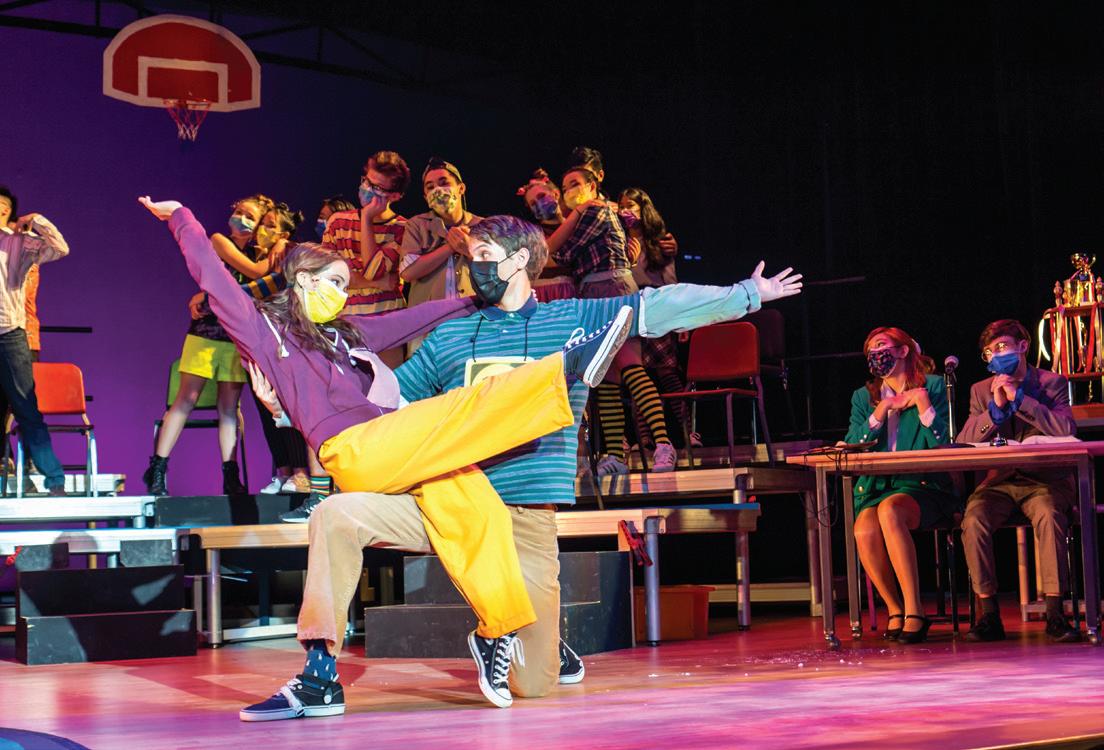

Homework: Light
This course is intended for students wishing to continue the study of Theater. Students will develop a range of performance and communication skills in depth. The course will require students to investigate the history of theater and apply theories and skills to performance. Students will engage in detailed studio driven performance pieces designed to put them in front of multiple audiences and experiment a wide array of theatrical styles and content. These studies engage students in challenging, creative, and collaborative projects (individual and small group) through
Theater Arts Stagecraft Production Honors Stagecraft Production Advanced Technical Theater Theatrical Design And Technologyreading, writing, speaking, performance, and research. Active participation in a wide variety of activities and assessments is a major expectation of students in the course. Students will also maintain a journal, write critically and informatively, and create original text. Students do not need previous stage experience; instead, they need curiosity and initiative, plus a desire to explore communication in many forms. Units of study include:
• Historical Theatre Conventions and their Application (Exploring Artistic, Cultural and Theoretical Context)
• Performance skills (Naturalism, Abstract, Movement Traditions, Advanced Film Acting)
• Advanced Scene and Monologue Work
• Musical Theatre and The Singer as Storyteller
• Script Analysis
• Directing and Techniques for Staging and Audience Impact
Possible Texts: Medea; The American Dream & The Zoo Story; The Importance of Being Earnest; The Caucasian Chalk Circle; A Doll’s House; A Streetcar Named Desire; Selected Noh plays; selected contemporary plays; fall play/The Studio/IASAS scripts
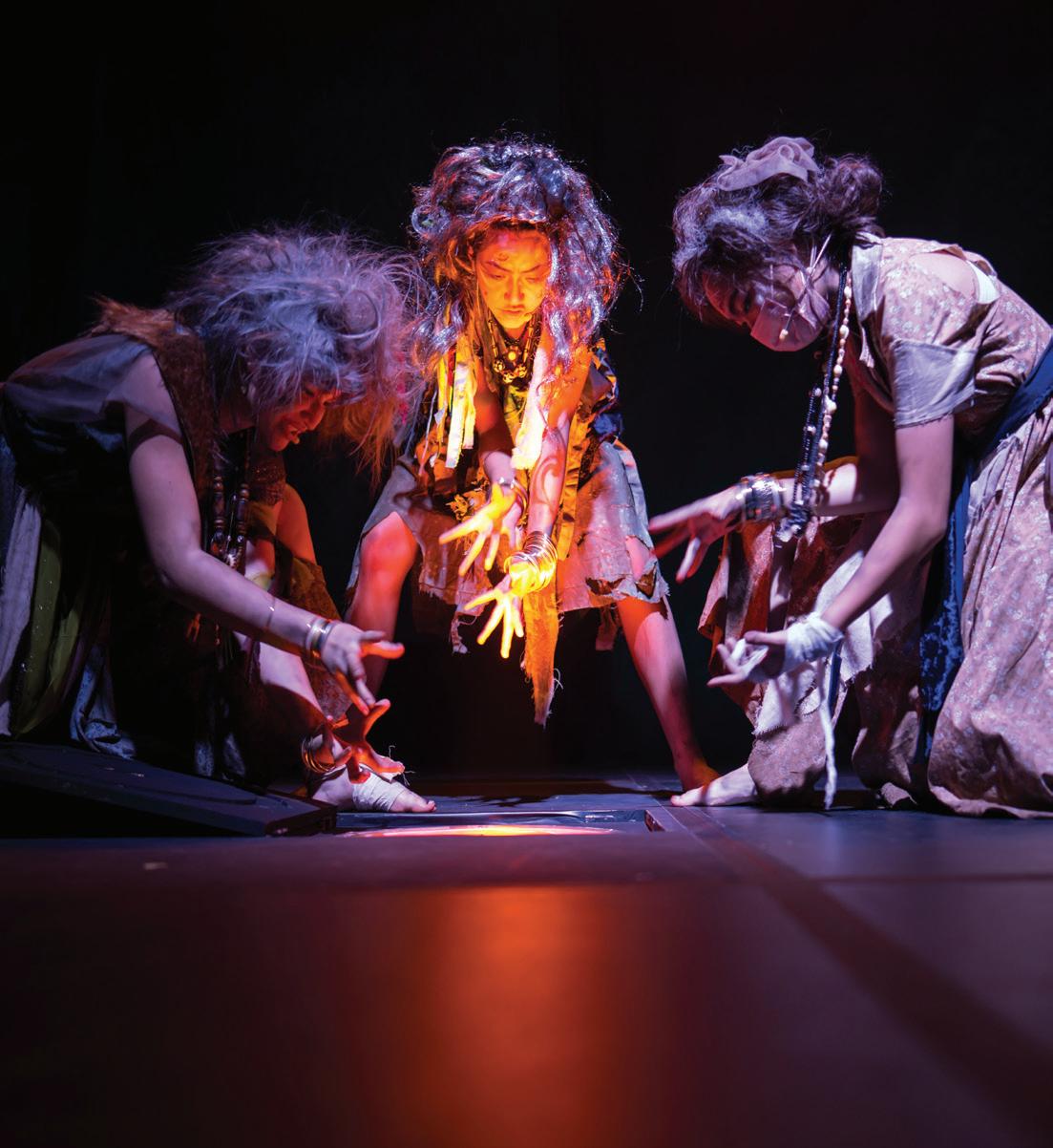
For students who are not taking IB.
Grade: 10-12
Prerequisite: Honors Theater 1
Duration: 1 year
Credit: 1
Homework: Light
This course represents the final stage in theatrical training offered by TAS. In this class students will be guided through advanced actor training techniques including (but not limited to) The Meisner Technique, Viewpoints, Linklater and Laban. The course will require students to investigate the history of theater and apply theories and skills to performance. Students will engage in detailed studio driven performance pieces designed to put them in front of multiple audiences and experiment a wide array of theatrical styles and content. In addition students will be led through a dynamic devising process in the second semester resulting in an original live piece performed for an audience.
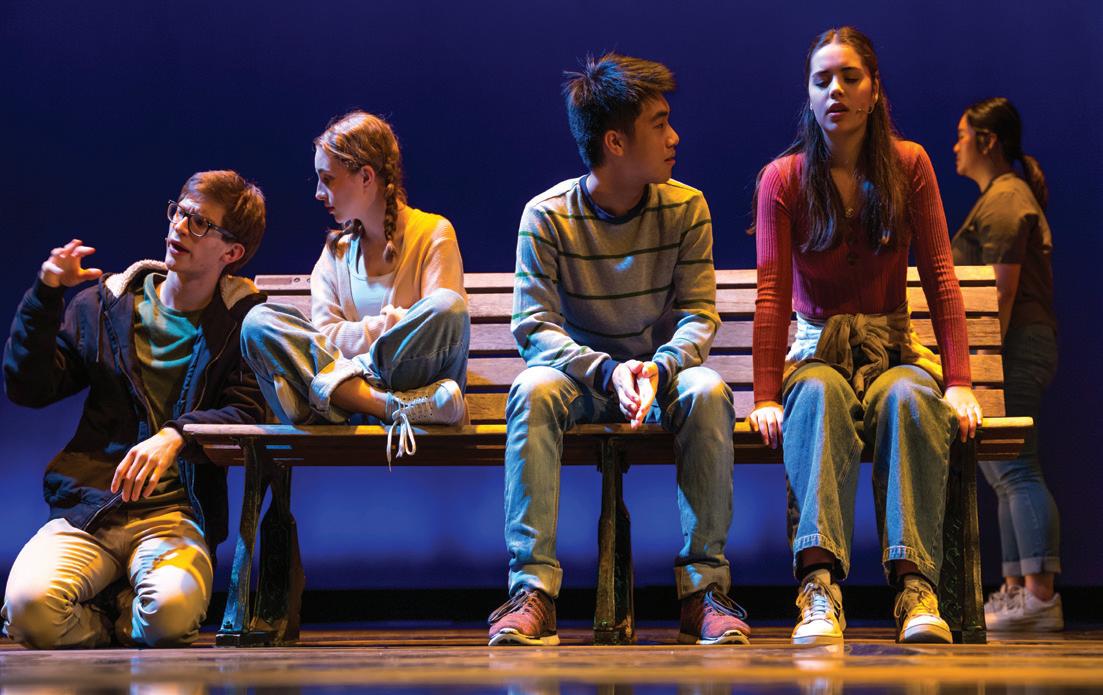
Grade: 12
Prerequisite: IB Theater 1
Duration: 1 year
Credit: 1
Homework: Moderate
The IB (International Baccalaureate) Diploma Programme theatre course is a 2-year multifaceted theatre-making course of study. It gives students the opportunity to make theatre as creators, designers, directors and performers. It emphasizes the importance of working both individually and collaboratively as part of an ensemble. It offers the opportunity to engage actively in the creative process, transforming ideas into action as inquisitive and productive artists. This is not an “acting course,” nor a literature class – but a practical study of the theatre arts. Involvement in this live art form demands discipline, creativity, risk-taking, and an ability to collaborate. Over the course of the 2-year program students will engage in a variety of tasks outlined by the IB that will require a robust mix of performance, analysis and original creation. Substantial writing components are a feature of this course.
Duration: 1 year (2, 1-semester blocks)
Credit: 1
Grades: 9-12
*Satisfies Public Speaking requirement
Homework: Light to Moderate
Note: Class is taught in semester sections. One semester will be taught by the Social Sciences teachers and one semester via the Theater teachers.
The ability to express, defend, and compare ideas in a confident and fact-based way is critical regardless of one’s profession or field of study. In this year-long course, students will receive formal training in effective public speaking and argumentation, as well as examine the physiological connections between thought, breathing, the physical body, and the performative aspects of speech. By experimenting with a variety of speech types and techniques, students will be able to create effective speeches with solid openings, main points, transitions and conclusions whilst understanding the importance of audience analysis. Students will also be introduced to the structure of arguments and taught how to effectively construct, refute, and compare between them. Using NSDA Debate events as a vehicle, students will get extensive experience in a variety of formats including public forum and world schools debate. Through supportive critiques, observation of peers, rehearsal, examination of text, research, refutation, and a general understanding of presence in a room, students will be able to speak and debate confidently, fluently and prolifically in no time.
Duration: 1 semester, offered in Semester 1 and/or 2
Credit: 0.5
Grade: 9-12
Prerequisite: None
Homework: Light
In this course, students work with a wide range of drawing materials –both traditional and digital – in order to investigate the nature of drawing itself through mark-making. Students will learn to see like an artist through observation drawing, perspective drawing, and using positive negative space. They will use the Elements of Art and apply the Principles of Design when creating compositions that demonstrate an understanding of emphasis, unity and balance. They will maintain a sketchbook to draft ideas and document compositional solutions. They will use the materials, methods, and techniques they learn to create drawings with sophisticated imagery. At the end of the semester, students will have a number of images capable of going into a college portfolio in terms of composition, craftsmanship and creativity. This course will prepare those students who are interested in taking higher level classes like AP Studio Art or IB Art.
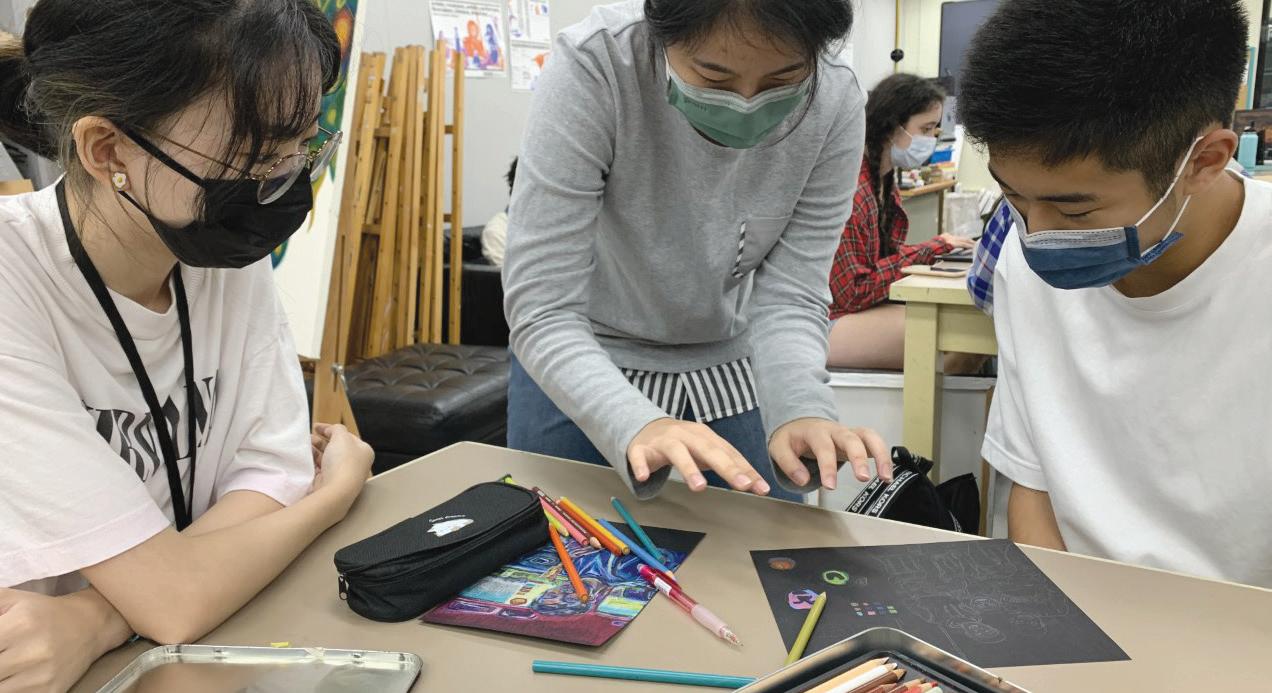
Duration: 1 semester, offered in Semester 1 and/or 2
Credit: 0.5
Grade: 9-12
Prerequisite: None
Homework: Light
In this course, students work with a wide range of painting materials – both traditional and digital – to explore and experience a variety of painting techniques, media, and historical approaches to art. Students interpret and express the painter’s world in mediums including acrylic and oil paint, gauche, watercolor, and ink, as well as a variety of experimental media.
They will also learn to paint digitally on applications such as Procreate on the ipad. Students will develop their sensitivity to color and learn and become proficient in employing color theory in their works. The works created during the course will utilize subjects from observation and imagination, applying design and composition principles. At the end of the semester, students will have a number of images capable of going into a college portfolio in terms of composition, craftsmanship, and creativity. This course will prepare those students who are interested in taking higher level classes like AP Studio Art or IB Art.
Duration: 1 semester, offered in Semester 1 and/or 2
Credit: 0.5
Grade: 9-12
Prerequisite: None
Homework: Light
Students use the computer as an artistic tool to understand how text and visual elements are created, manipulated, and used to communicate effectively. Using design apps and the Adobe Creative Suite, creativity, concept development, and craftsmanship are stressed in each assignment. Students learn about contemporary artistic trends in the design world while developing their own complex ideas. They will explore design thinking processes, investigate typographic experimentation, and explore the impact of color and scale. Students will use their knowledge of the design principles to compose their own graphic imagery. Students are asked to consider what design is and how it can be used to create, engage, and even drive social change.
You can't use up creativity. The more you use, the more you have.
Maya Angelou
Semester Courses open to all 9-12 No prerequisites
3D Modeling & Character Design*
Visual Arts Flow Chart
Ceramics Hand Building: Coil, Slab & Sculpt
Ceramics Digital Modeling & Rapid Prototyping
Ceramics Wheel Throwing: Objects of Purpose
Digital Photography*
Fashion & Costume Design*
Year-Long Courses
Higher Level Prerequsite: 3 semesters of art
Journalism: Yearbook 1, 2, 3, 4 AP 3D Art & Design
IB Visual Arts (2 yrs)
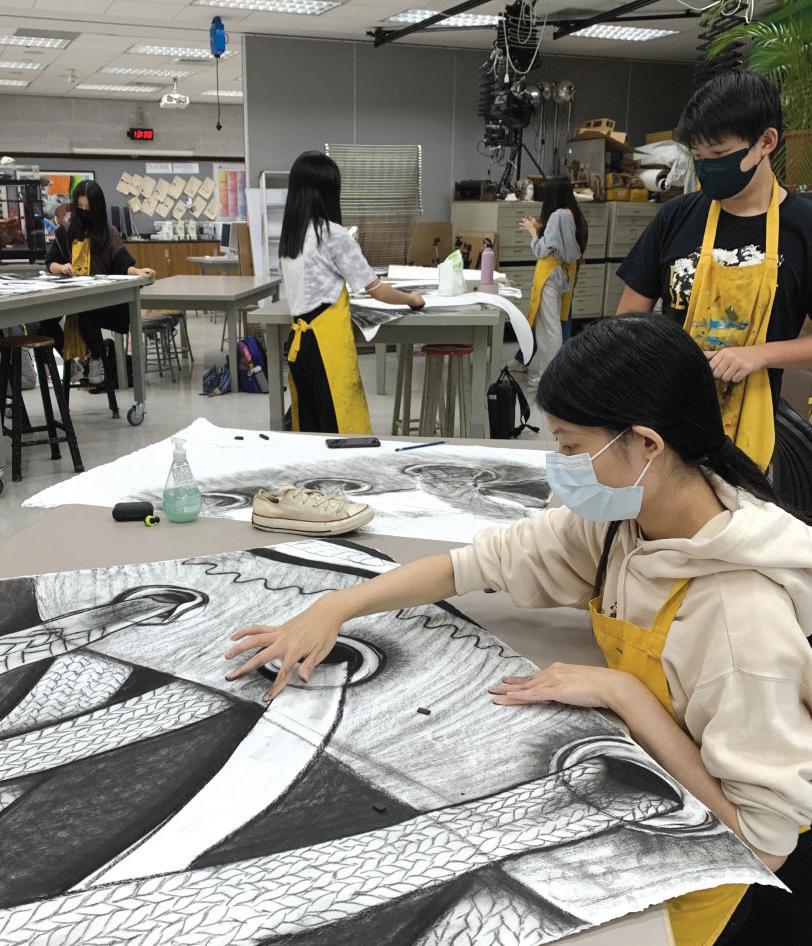
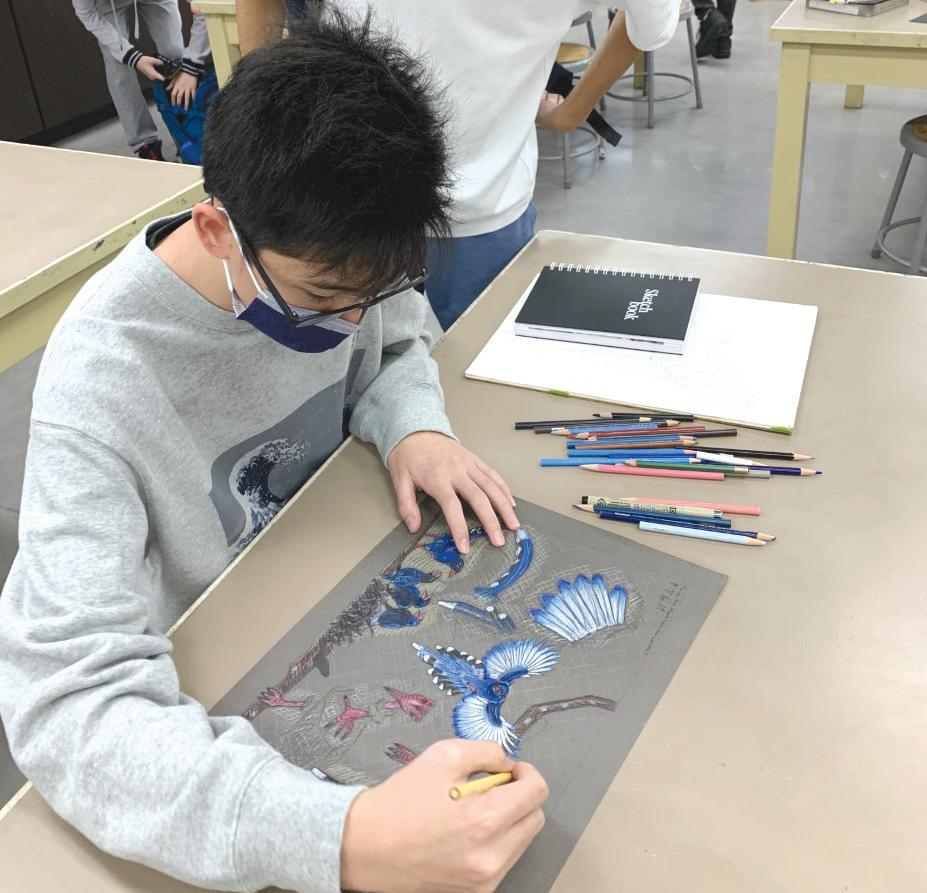
IB Film Studies (2 yrs)
Honors Advanced Design
*Honors level available, runs concurrently. Prerequisites in course descriptions
Duration: 1 semester, offered in Semester 1 and/or 2
Credit: 0.5
Grade: 9-12
Prerequisite: None
Homework: Light
This course introduces the fundamentals of product design and design thinking. It will give students an overview of many practical and theoretical skills used in a design project, including identifying client/customer needs based on design briefs, ideation techniques, creative problem-solving, concept generation, and documentation. The course focuses on projectbased learning and hands-on experimentation predominantly by creating product boards and model-making. Students will become familiar with the outcome of fabrication from the design software, as well as using the laser and vinyl cutters, CNC cutters, 3D printers, and other equipment available in the art department.

Duration: 1 semester, offered in Semester 1 and/or 2
Credit: 0.5
Grades: 9-12
Prerequisite: None
Homework: Light
The course is designed for students to explore in greater depth the collaborative potential for visual art and literature, providing them the platform to appreciate the interconnectedness of the world of words and the world of images. They will learn and experiment with a variety of tools, mediums, and techniques such as drawing, painting, and mixed media as we read and discuss poetry and short stories. The course will explore symbolism, imagery and characterization, and students will learn to use visual art as a tool to communicate their interpretation of these authorial choices. Students will also examine works of art and interpret the story behind these artworks through individual and collaborative creative writing. Literary texts that we will explore for this course will include poetry, plays, social commentaries, memoirs and more. Students are assigned readings for homework and are expected to record their observations and ideas in their sketchbook so that they are prepared to come into class to share and discuss. Most assignments are completed in class, though they might need to work on their art and/or creative writing pieces beyond regular class time. At the end of the course, students will develop a body of work and produce a final portfolio along with written reflections of their creative choices. This course is dual-listed under both the English and Visual Art departments and fulfills 0.5 of the Visual Art credit but does not fulfill the English Core credit.
Duration: 1 semester, offered in Semester 1 and/or 2
Credit: 0.5
Grade: 9-12
Prerequisite: None
Homework: Light
For cinema lovers who want to learn more about film history, theory, and the practical production of films. Through the study and analysis of film texts, the Film Studies course develops students’ critical abilities and their appreciation of artistic, cultural, historical, and global perspectives in film. Students examine film concepts, theories, practices, and ideas from multiple perspectives so that they become adept in viewing, interpreting, and analyzing. Film Studies is a one semester non-honors elective which is combined with the IB Film year 1 course.

Duration: 1 semester, offered in Semester 1 and/or 2
Credit: 0.5
Grade: 11-12
Prerequisite: None
Homework: Light
This course is designed to prepare the portfolios for admission to college art programs. The course is catered for individuals to address school specific portfolio requirements and provide guidance for submitting to competitions such as Young Arts. Students will complete a range of projects to produce high-level additions to their portfolios. They will work both from observation and imagination and be provided with the necessary tools and resources to take on assignments that cater to what college art programs are looking for in applicants. They will be guided through the process of portfolio selection, documentation, artist statements and writing supporting descriptions to their artwork.
Cinema is a matter of what's in the frame and what's out.
Duration: 1 semester, offered in Semester 1 and/or 2
Credit: 0.5
Grade: 9-12
Prerequisite: None
Homework: Light
Ceramics Digital Modeling & Rapid Prototyping gives students the basic skills necessary to digitally model, Slice, and print ceramic forms using the Potter Bot and Lutum clay 3D printers. Students discover how to prepare the clay by getting the right clay consistency for printing and filling the necessary cartridges using the de-airing pugmill. Students will use the Rhino 3D modeling software and the clay printer to create functional, architectural, and sculptural works, exploring vessels, furniture forms, and architectural facades. Students will learn how to set up the Ultimaker Cura Slicer software and be guided through the settings step by step. Students may add finishing touches to their forms by hand before completing the traditional ceramic process by glazing and firing their pieces in a kiln. Students are encouraged to bring their own research and interests into the coursework, and to develop a personal approach and artistic direction which may complement the work in AP and IB Art portfolios. The course is open to students of all knowledge and experience levels.
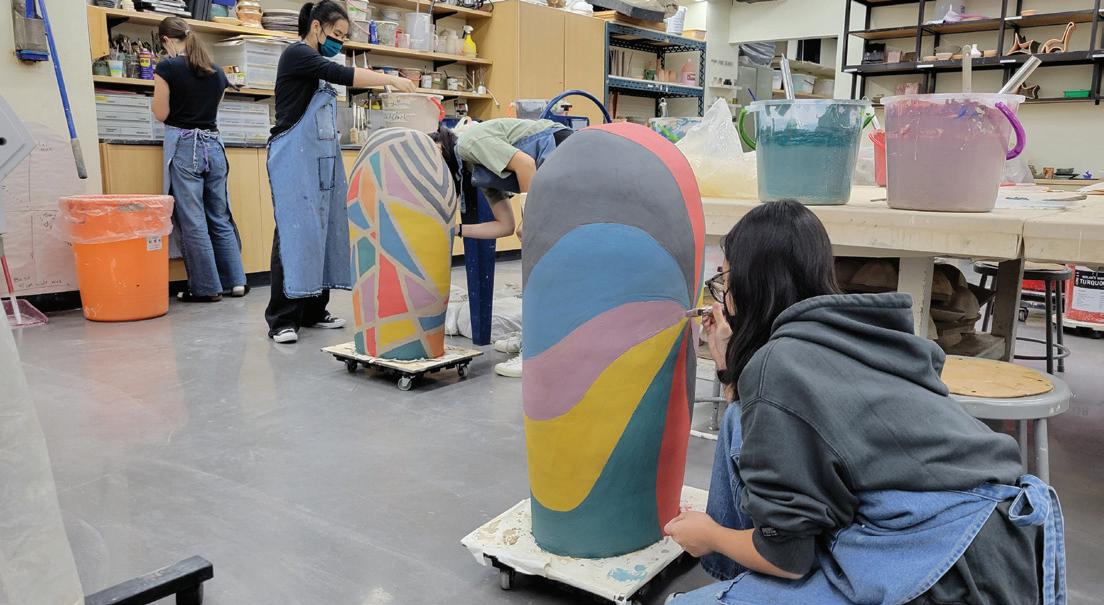
Duration: 1 semester, offered in Semester 1 and/or 2
Credit: 0.5
Grade: 9-12
Prerequisite: None
Homework: Light
Hand-building will give students the skills necessary to produce, glaze, and fire a variety of hand-built ceramic forms. Commonly used ceramic construction and surfacing techniques will be covered, including but not limited to a variety of slab construction methods, coil-building, clay extrusion, and solid/hollowing sculpting methods. Through presentations, demonstrations, and hands on practice, students will gain a greater awareness of how these different forming methodologies have enabled ceramic artists to create meaningful works of art for centuries. The curriculum allows students to work independently and collaboratively. Students will have the opportunity to explore both functional and sculptural applications of the ceramic material in this course. Ceramic surface and appropriate finishing techniques will be covered. Students are encouraged to bring their own research and interests into the coursework. Students will be encouraged to create individual and original ideas in the ceramic media, and to develop a personal approach and artistic direction which may complement the work in AP and IB Art portfolios. Prior experience in ceramics is not required to enroll in the course.
Duration: 1 semester, offered in Semester 1 and/or 2
Credit: 0.5
Grade: 9-12
Prerequisite: None
Homework: Light
Wheel Throwing gives students the basic skills necessary to produce, glaze, and fire a variety of forms on the potter’s wheel. Students will be introduced via demonstrations and presentations to throwing, trimming, and finishing. Methods of altering and attaching wheel thrown components, glazing, and finishing techniques will also be explored. Students will use these options to create works for their everyday lives centered around their habits, rituals, living or workspace. Through this coursework we will also examine the connections between function, form, composition, and meaning to create personal works related to their own point of view and how they
navigate the world. Concerns of function and use as well as opportunities to research contemporary and historical traditions will be incorporated into the coursework. A series of projects offers the chance to make both functional vessels and sculptural forms. Students will be encouraged to create individual and original ideas in the ceramic media, and to develop a personal approach and artistic direction which may complement the work in AP and IB Art portfolios. The course is open to students of all knowledge and experience levels. Class size is limited to 15.
Duration: 1 semester, offered in Semester 1 and/or 2
Credit: 0.5
Grades: 9-12
Prerequisite: None
Homework: Light
This course will teach students about Unreal Engine, Maya and virtual reality production. Projects will include how to use the tools in Unreal Engine and Maya to design games, simulations, visualizations, and level design. There will be multiple projects throughout the entire course so students can understand how to utilize several digital software to deliver virtual worlds with real-time technology from Unreal Engine. Other game development tools such as Autodesk Maya, Adobe Substance Painter and Photoshop will also be utilized to help create 3D content. We will look at how industry professionals create their project structures, work flows, environment creation for virtual reality content. Virtual Reality headset equipment includes the Oculus Quest for students to see their virtual reality creation. By the end of the semester, students should understand the entire process from concept design, set modeling, texturing, shading, and real time lighting for 3D assets which include 3D character, creature, vehicle, or environment.
Duration: 1 semester, offered in Semester 1 and/or 2
Credit: 0.5
Grades: 9-12
Prerequisite: None
Homework: Light
This course covers the basic concepts of 3D modeling where students will build a solid foundation of the basic tools of Maya and Mudbox. Modeling, texturing, lighting, and rendering are introduced, and students will learn how computer graphics can be created for computer animation films, video games, commercials, and 3D printing. This is a project oriented course where students are exposed to the tools used by computer graphic artists working in the computer animation, video game, visual effects, and commercial industry. They will gain the basic knowledge of production practices and work flow. Semester projects will include how to design a 3D organic creature and hard surface robot, as well as how to prepare 3D models for 3D printing, texture and lighting 3D models for film or animation, and making renders for print commercials. Students will also learn how to build 3D assets for Virtual Reality headsets such as HTC Vive or Oculus Rift.
Duration: 1 semester, offered in Semester 1 and/or 2
Credit: 0.5
Grades: 10-12
Prerequisite: 3D Modeling & Character Design, 2 semesters of art
Homework: Moderate
In this course, students will investigate the tools involved in the creation of digital worlds such as the metaverse. They will learn what big tech companies such as Adobe, Autodesk, Epic games, Microsoft, Nvidia, Sony, and Meta are doing to create the content for augmented reality, virtual reality, and other 3D assets. They will learn concepts and techniques behind immersive experiences including digital twins, simulations, and level design for games. Projects include creating digital worlds such as urban or landscape environments in 3D. Characters such as metahumans will be covered to show students the creation of real time digital humans. Students will explore the more advanced features of Maya and game engines for real time rendering and world building. There will be more emphasis on polishing finished renders for photo-realism along with good composition and learning about camera angles. Students are expected to understand the entire process from concept design, modeling, texturing, UV mapping, shading, lighting, rendering and then post work in Adobe Photoshop. Advanced digital sculpting software such as Zbrush and Substance painter will be explored to help improve project workflow and create advanced models and materials. There will also be the option to 3D print with the Form 3 for industrial-quality SLA for finished 3D models. Final projects include creating animation, high quality commercial prints, or designing virtual reality environments in Unreal Engine using an Oculus Quest.
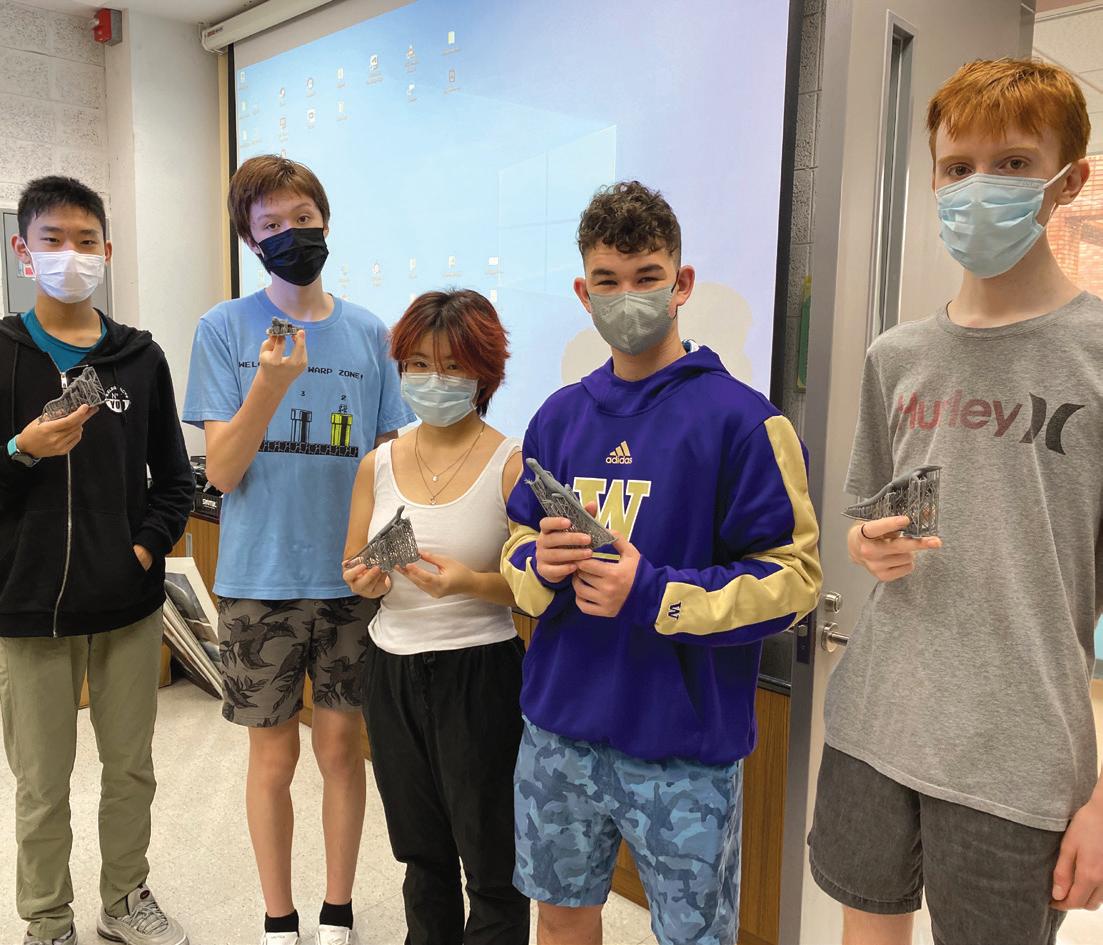
Duration: 1 semester, offered in Semester 1 and/or 2
Credit: 0.5
Grade: 9-12
Prerequisite: None
Homework: Light
In this course, students will tap into their creativity through design research, textile studies and character illustrations. Both costume and fashion act through the human body, with the intention of influencing behavior and thought, as well as communicating a sense of identity or character. Students will sketch the human body, study perspectives of anatomy and draw fashion garments. We will work with a range of mediums from markers, watercolors, pastels, digital and mixed media. Students will explore how
mediums create various textures on different surfaces. The course will include discussions on fashion history and character concept design. Fashion Illustration studies will include art history paintings, fashion plates, and technical drawings. There will be opportunities to work collaboratively and perform design presentations. By the end of this course, students will develop and refine their personal style of illustration and have more confidence in realizing their visual ideas.
Duration: 1 semester, offered in Semester 1 and/or 2
Credit: 0.5
Grades: 9-12
Prerequisite: None
Homework: Light
This course offers the opportunity to sew. The student will leave this class feeling comfortable with hand sewing and machine sewing. Students will be exposed to different tools that are available to support the sewing process and learn how to troubleshoot the sewing machine. We will look at the history of sewing from the ice ages to the development of sewing machines during the Industrial Revolution and see where sewing technology is headed. The bulk of this class will be focused on making various products that eventually accumulate sewing experience to efficiently create a simple garment piece. Students are required to speak and engage in discussions prompted by the instructor that relate to the world of fashion.
Duration: 1 semester, offered in Semester 1 and/or 2
Credit: 0.5
Grades: 10-12
Prerequisite: Fashion & Costume Design, 2 semesters of art
Homework: Moderate
This course offers a behind-the-scenes look at the world of the fashion designer and the costume designer. The class will be focused on design research and communicating the page-to-stage process. Students will go through the motion of fashion sketching, discussing textile materials and bringing a character or full garment to life. Students will be exposed to the principles of design through the lens of various industries and will have the opportunity to develop designs inspired by different stimuli. There will also be opportunities for involvement in the design and construction process for the Dance and Drama productions here at TAS. Honors students are required to take on a leadership role to assist their classmates with sewing and construction skills.
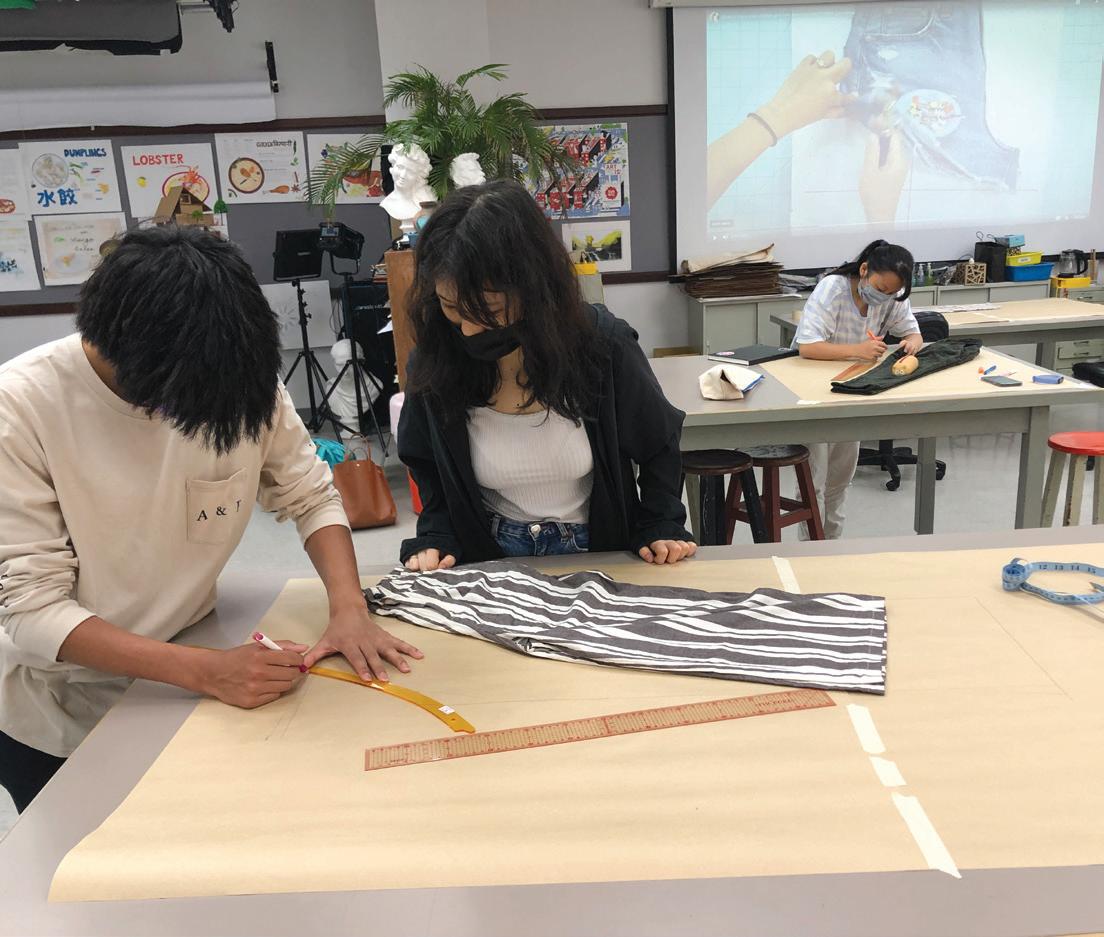
Duration: 1 semester, offered in Semester 1 and/or 2
Credit: 0.5
Grade: 9-12
Prerequisite: None
Homework: Light
This introductory course will cover the technical, historical, and contemporary elements of analog photography and wet (traditional) darkroom processing as a form of artistic expression. Students will learn to shoot with 35mm film cameras, mix photographic chemistry, develop roll film, make enlargements, and create full-sized negatives for contact processes. Students will establish a foundational understanding of art and design principles in photography, camera operation, and exposure. This course will expose students to a wide range of contemporary photographers’ work and provide opportunities to explore the many different aspects of photography. Much of the coursework will be done in a black-and-white 35mm film environment. Students will participate in constructive critiques and assess their work’s technical, aesthetic, and conceptual aspects. Camera equipment and all necessary supplies will be provided. No prior photography experience is required, but digital photography, film production, or experience using a Single-Lens Reflex (SLR) is strongly encouraged. The class size is limited to six students.
Duration: 1 semester, offered in Semester 1 and/or 2
Credit: 0.5
Grade: 9-12
Prerequisite: None
Homework: Light
Students will use their smart devices to create amazing visually engaging content. This course is designed to improve artistic vision and storytelling while utilizing the power of a smartphone. The class, with project-based work, will include developing Instagram Reels and Stories; concepts for Facebook; producing and editing both still and motion graphics; in addition to exploring the relationships of text and visuals. As a creator, students use professional tools and techniques to help master composition, lighting, and narrative skills that will dramatically improve imagery no matter what device is used. Specifically, students will learn key features like timer mode, panoramic mode, portrait mode, selfie mode, and timelapse mode and make edits on the phone using apps such as: Lightroom, Snapseed, and VSCO. This class will help students improve their artistic voice and raise communicative presence with social media best practices and tips for printing photos.
Duration: 1 semester, offered in Semester 1 and/or 2
Credit: 0.5
Grade: 9-12
Prerequisite: None
Homework: Light
This is an introductory course in which students will learn about the camera as a communicative tool. The department has 17 DSLR cameras available for student use. Students will learn about the technical aspects of the camera and use portions of the Adobe Creative Suite-- specifically Photoshop-- to manage and manipulate their images. They will learn a wide variety of skills in order to express themselves as photographic artists. Most of the curriculum is based on digital workflow; however, students will be exposed to traditional film photography processes including darkroom developing, printing, and finishing black and white photos, cyanotype and palladium printing. Students develop the artistic understanding of photography as a means of communication. Student work is assessed on composition, use of class-time, craftsmanship, and creative solutions and graded from the art department website. The curriculum allows for students to work independently and collaboratively whereas each student prepares a portfolio of work to be exhibited. Class size is limited to 17.
Duration: 1 semester, offered in Semester 1 and/or 2
Credit: 0.5
Grade: 10-12
Prerequisite: Digital Photography, 2 semesters of art
Homework: Moderate
The curriculum emphasizes the development of comprehensive visual language that allows students to demonstrate both technical and conceptual mastery reflective of contemporary photography. Instruction will support individual student interests aimed at further developing the visual foundation through both analog and digital technical practices. Emphasis is placed on the student’s individual ideation and portfolio design as it relates to a personal vision of the image making process. In a workshop setting, students will explore how to successfully employ photographic imagery in contemporary society, culture, economy, and politics through art, advertising, social documentary, fashion, and activism. The course focuses on the specialization of a student’s practice through the formations of a self-motivated body of work in photography and/or video, which reflect the technical, conceptual, historical, and practical knowledge that the student has gained to-date.

Duration: 1 semester, offered in Semester 1 and/or 2
Credit: 0.5
Grades: 9-12
Prerequisite: None
Homework: Moderate
As an introductory course, students will design structures, build models, use technology to create forms and render images while learning about various types of architecture. Students will develop their visual problemsolving skills, learn about spatial organization. Students will explore various kinds of relationships between people and built form as well as consider the impact of sustainability and concern for the environment through designing, drawing, and model-making. Assignments will explore fundamental design principles that outline the elements of architectural design like those found in the university. Students will gain hand-drawing abilities that inspire and guide them in their own creative process. Computer software such as Rhino and Adobe suite are introduced as additional artistic tools. Students will develop a positive web presence by maintaining the web gallery.
Duration: 1 semester, offered in Semester 1 and/or 2
Credit: 0.5
Grades: 10-12
Prerequisite: Architecture, 2 semesters of art
Homework: Moderate
As an honors course, Architecture is required before taking the class. Students will continue to design structures, build models, use technology to create forms, and render images while learning about various concepts and design principles. Students will build on their visual problem-solving skills and spatial organization while exploring various kinds of relationships between people and built forms and consider sustainability through designing, drawing, and model-making. Assignments will explore advanced design principles that outline the elements of architectural design like those found at the university level. Students will gain design thinking abilities that inspire and guide them in their own creative process. Students will develop a positive web presence by maintaining the web gallery.
Duration: 1 year
Credit: 1
Grade: 9-12
Prerequisite: None
Homework: Light
This introductory course will immerse students in editorial design, photojournalism, and publishing. The class is the core team producing the annual upper school yearbook, Gateway. Students will learn the basics of photography, photo filtering and editing, graphic design, and layout design through use of the Adobe Creative Suite. They will also learn caption and copy writing, as well as become familiar with the workflow involved in publishing. Creating the yearbook is a rewarding and collaborative experience between editors, members, and the broader school community. Students are often called upon to help document events happening throughout the school. The publication seeks students of all interests, capabilities, and personalities to add to a comprehensive, creative, and professional annual.
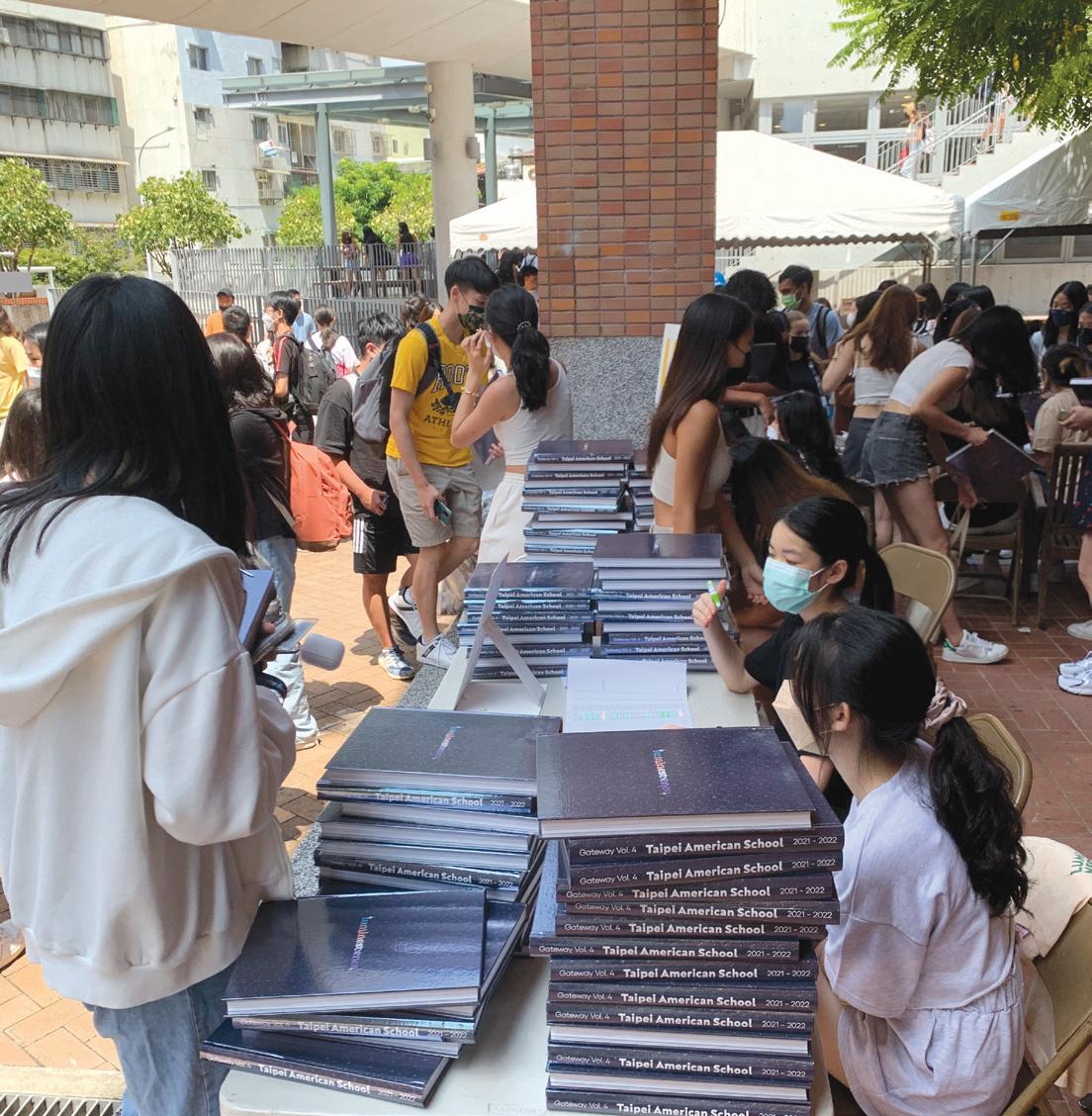
Duration: 1 year, may be taken multiple years
Credit: 1
Grade: 10-12
Prerequisite: Journalism-Yearbook
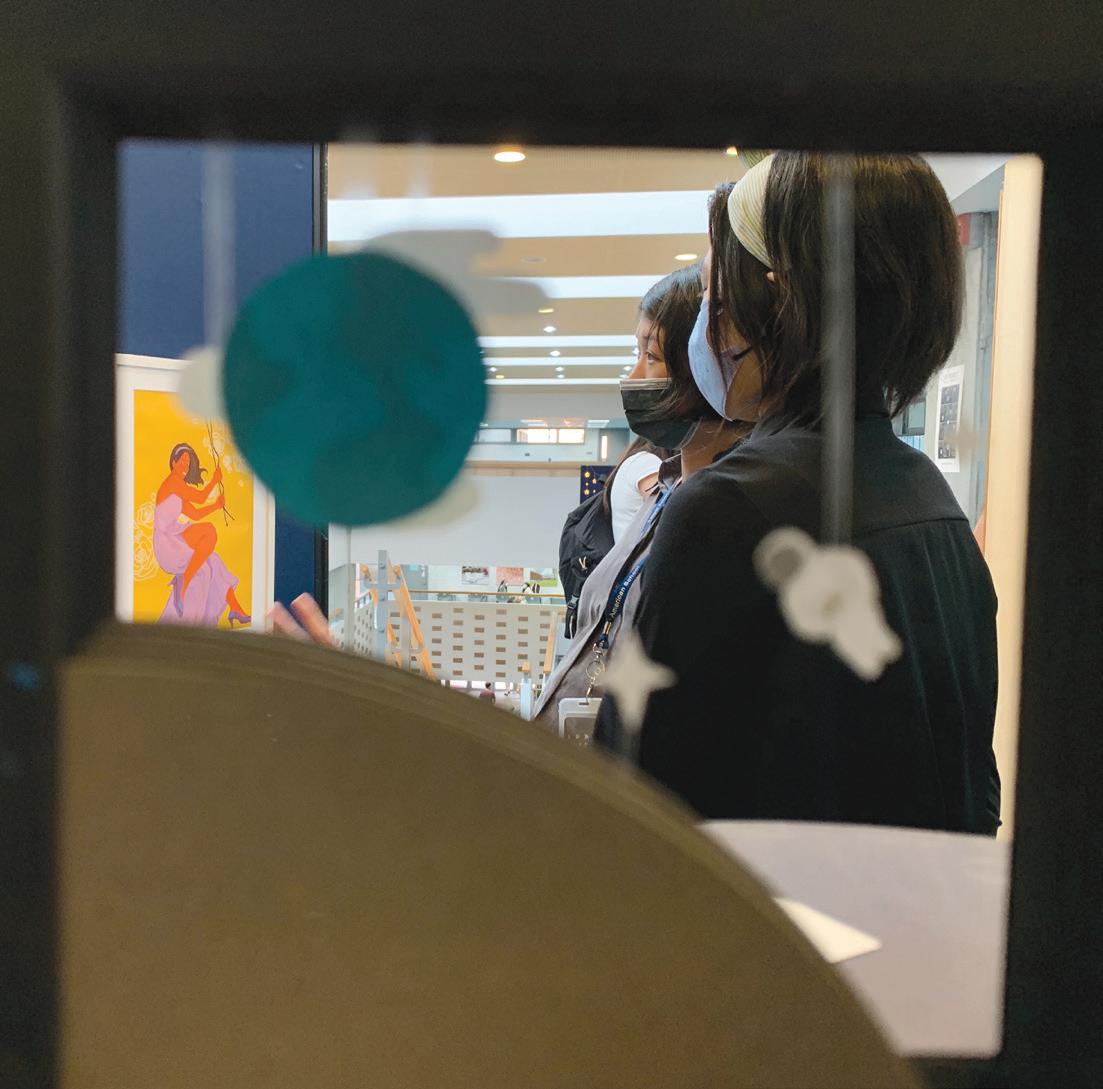
Homework: Moderate
For students who have successfully completed the introductory class and want to build upon the skills learned in Journalism-Yearbook. The yearbook class is the core team producing the annual upper school yearbook. As returning members to the editorial team, honors students are expected to take on more of a leadership role. This involves leading as editors or mentors to new members in both the class and the club. Creating the yearbook is a collaborative experience between editors, members, and the broader school community. Students are often called upon to help document events happening throughout the school. Students and parents should be aware that honors students who take this course are expected to spend extra time at school; students must occasionally devote weekends to the production of publication.
Duration: 1 year
Credit: 1
Grade: 9-12
Prerequisite: None
Homework: Moderate
The introductory film course will immerse students in video production. The primary focus is on using film as a communicative art. Students will learn the basics of cinematography, camera functions, video editing, media analysis, and visual communication. This project-based class will challenge students to explore and produce many different types of films. Projects will include but are not limited to micro-documentaries, narrative short films, public service announcements, commercials, montages, and music videos. Students should have the ability to work independently and collaboratively and see a project from inception to completion. Students must obtain a 1TB or larger external hard drive to store and manage their digital assets. Class size is limited.
HONORS FILM PRODUCTION 2 (UART52)
HONORS FILM PRODUCTION 3 (UART521)
HONORS FILM PRODUCTION 4 (UART522)
HONORS FILM PRODUCTION 5 (UART523)
Duration: 1 year
Credit: 1
Grade: 10-12
Prerequisite: Film Production 1 or instructor approval
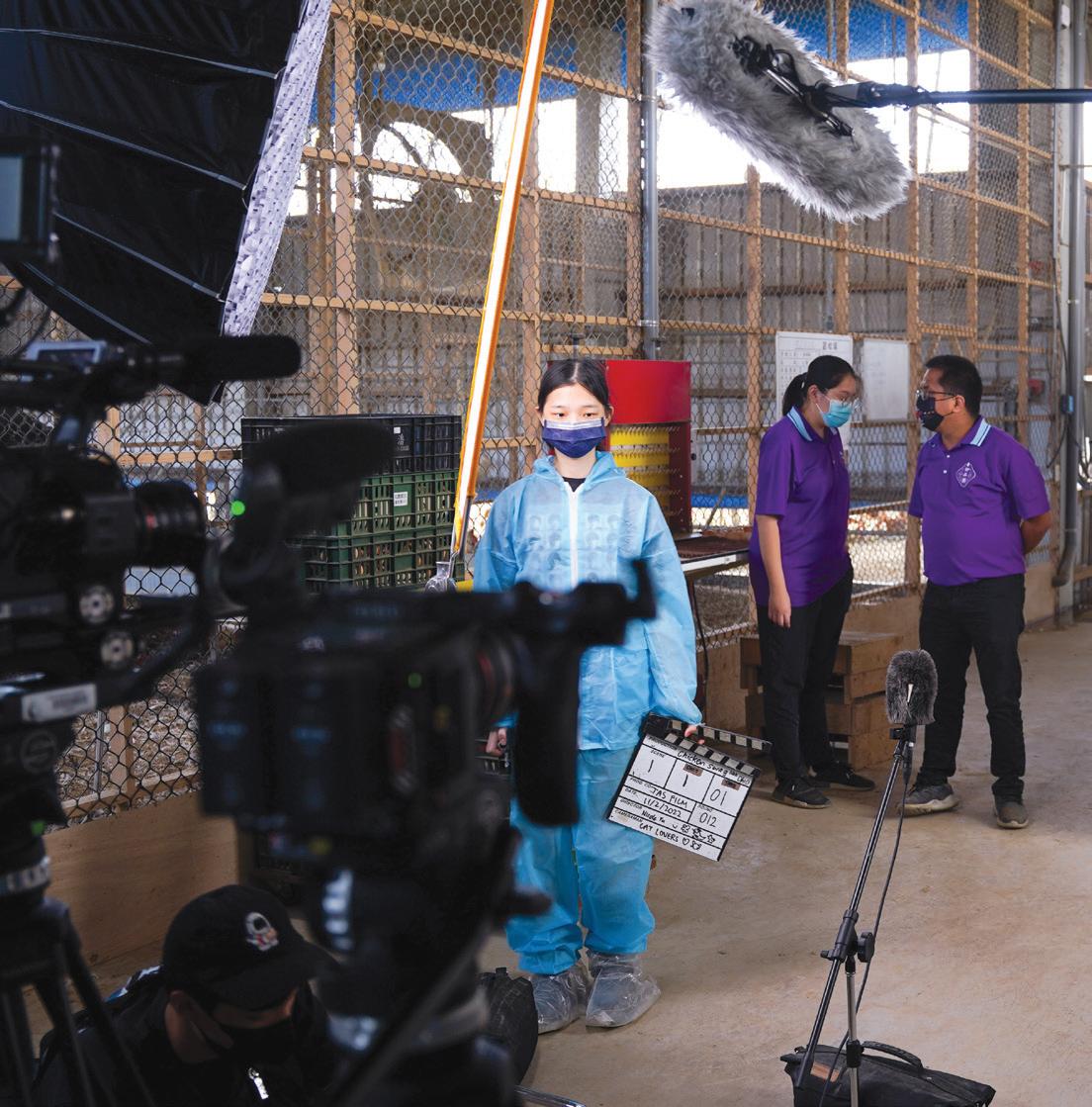
Homework: Heavy
The Honors Film Production courses are for students who have completed Film Production 1 and want to build on the skills learned. There will be continued hands-on experience in advanced video production and postproduction techniques with additional instruction in using professional production equipment. Students are expected to develop more sophisticated films, emphasizing visual communication, production design, sound design, and cinematography. Students can apply for various roles on international competition teams and submit their work to YoungArts and other international film competitions. These project-based courses will aim to provide opportunities for students to collaborate on real-world projects and apply their skills outside the walls of TAS. Students should be able to work independently and collaboratively and see a project from inception to completion. Students and parents should be aware that students who take this course are expected to spend extra time at school; students must occasionally devote evenings and weekends to producing assignments. Students must obtain a 1TB or larger external hard drive to store and manage their digital assets. The class size is limited.
IB FILM STUDIES 1 (UART530)
IBSL FILM STUDIES 2 (UART532)
IBHL FILM STUDIES 2 (UART542)
Duration: 2 years
Credit: 1 per year
Grade: 11-12
Prerequisite: None
Homework: Moderate
For cinema lovers who want to learn more about film history, theory, and the practical production of films. Through the study and analysis of film
texts, the IB Film/Film Studies courses develop students’ critical abilities and their appreciation of artistic, cultural, historical, and global perspectives in film. Students examine film concepts, theories, practices, and ideas from multiple perspectives so that they become adept in viewing, interpreting, and analyzing. IB Film, which has external assessments, is given honors weighting and must be taken over two years. The first year focuses on theory and analysis while the second year is dedicated to production and creating films. Previous film experience is not required, but a commitment to mastering both technical and theoretical concepts is essential.
Duration: 1 year
Credit: 1
Grades: 11-12
Prerequisite: 3 semesters of art and teacher recommendation
Homework: Moderate
This course is designed for students at a high level who are looking to be challenged in design thinking and creative problem-solving. This is a project-oriented course where students are exposed to the professional level of design work, in which they understand the experience of a design entrepreneur. Students will be only focused on their interests to drive their projects; it can be in any area that is related to design. Students will have access to a variety of tools to design and manufacture prototypes, sculptures, and architectural models, which will also allow them to take on international competitions. Students will be able to generate industry level works using Rhino and the Adobe Creative suite. The course will also cover design management and strategy and introduce students to entrepreneurship in the design industry.
Duration: 1 year
Credit: 1
Grades: 11-12
Prerequisite: 3 semesters of art and teacher recommendation
Homework: Heavy
AP 3D Art & Design is a natural progression for those who have already completed Ceramics, Architecture, and/or Product Design. This course allows students interested in working dimensionally the opportunity to
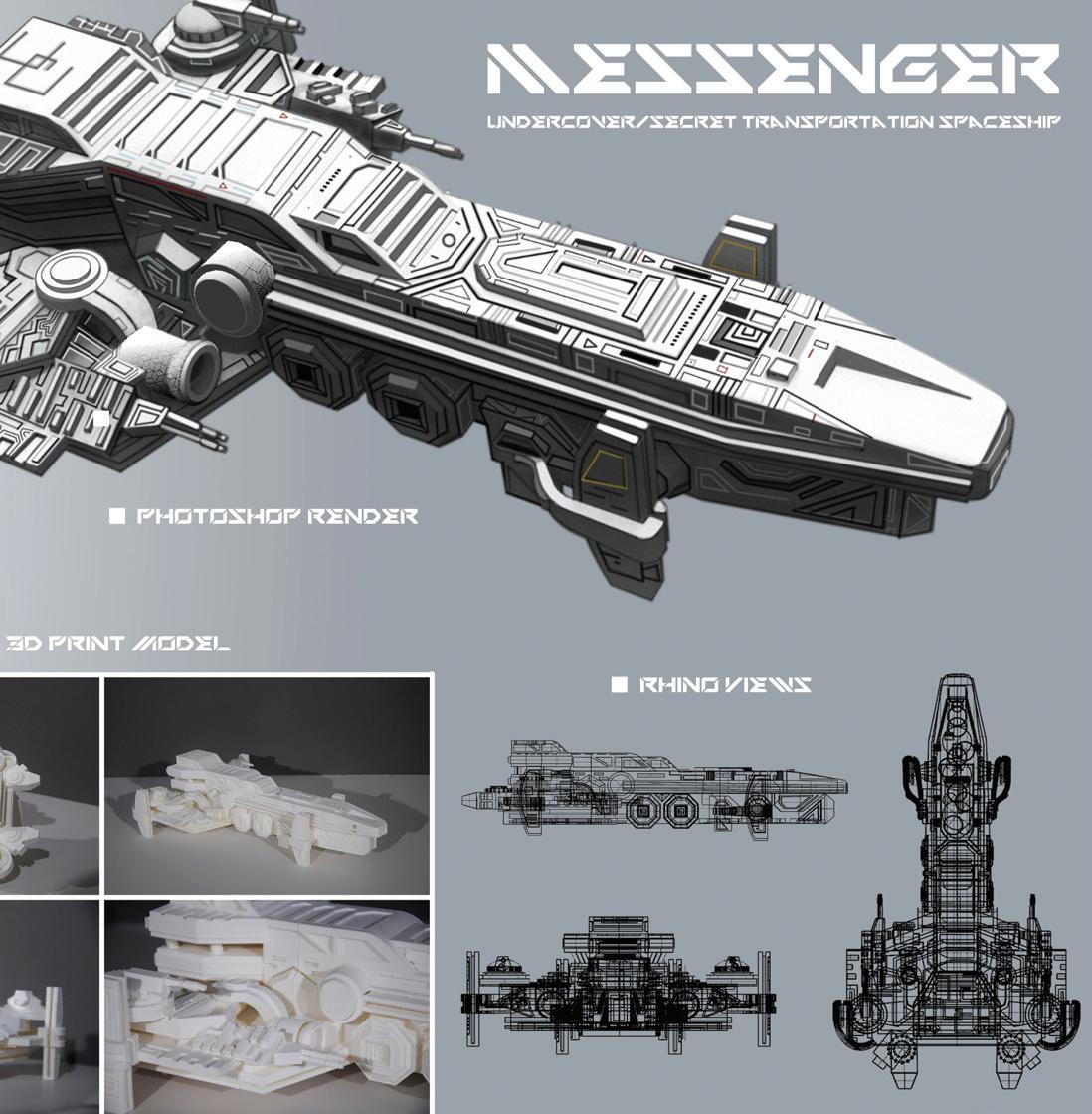
explore structural and sculptural concepts. Students will create a portfolio that addresses broad sculptural concerns. Students will utilize 3D printers (both clay and plastic), the laser cutter, and CNC paper cutter to solve visual problems that directly solve or address the integration of depth and space, volume and surface. Students need to demonstrate their knowledge of and ability to use the Elements of Art and Principles of Design. 3-D Design portfolio students demonstrate an understanding of 3-D design through many approaches, such as additive, subtractive, and relief. Students will investigate forms that are figurative or non-figurative, sculpture, architectural models, metal work, ceramics, glass work, installation, performance, assemblage, and 3-D fabric/fiber arts.
Duration: 1 year
Credit: 1
Grade: 11-12
Prerequisite: 3 semesters of art and teacher recommendation
Homework: Heavy
AP 2D Art & Design is a natural progression for those who have already completed Visual Arts, Graphic Design, and/or Digital Photography. This portfolio is designated for work that focuses on the use of two-dimensional (2-D) elements and principles of art and design, including point, line, shape, plane, layer, form, space, texture, color, value, opacity, transparency, time, unity, variety, rhythm, movement, proportion, scale, balance, emphasis, contrast, repetition, figure/ ground relationship, connection, juxtaposition, and hierarchy. Students should consider how materials, processes, and ideas can be used to make work that exists on a flat surface. Students can work with any materials, processes, and ideas. Graphic design, digital imaging, photography, collage, fabric design, weaving, fashion design, fashion illustration, painting, and printmaking are among the possibilities for submission. The course is intended for students who have a high degree of motivation and a willingness to contribute many hours in the studio outside of class. A minimum of 15 exceptional pieces of art are required to complete the portfolio. The AP 2D Art & Design Portfolio offers students an opportunity to pursue a distinctly individualized program, as each will create and develop a cohesive concentration, exploring a single visual concern in depth. This sustained investigation is assessed based on the AP rubric as to whether it reflects college-level thinking in terms of the use of composition, cohesion, use of class-time, craftsmanship, and creative solutions.
Duration: 1 year
Credit: 1
Grade: 11-12
Prerequisite: 3 semesters of art and teacher recommendation
Homework: Heavy
AP Drawing is a natural progression for those who have already completed Drawing, Visual Arts, or Architecture. This course is designated for work that focuses on the use of mark-making, line, surface, space, light and shade, and composition. Students should consider marks that can be used to make drawings, the arrangement of marks, the materials and processes used to make marks, and relationships of marks and ideas. Students can work with any materials, processes, and ideas. Drawing (analog and digital), painting, printmaking, and mixed media work are among the possibilities for submission. AP Drawing is a college-level course offered to sophomores, juniors and/or seniors. The course is intended for students who have a high degree of motivation and a willingness to contribute many hours in the studio outside of class. A minimum of 15 exceptional pieces of art are required to complete the portfolio. The AP Drawing Portfolio offers students an opportunity to pursue a distinctly individualized program, as each will create and develop a cohesive concentration, exploring a single visual concern in depth. This sustained investigation is assessed based on the AP rubric as to whether it reflects college-level thinking in terms of the use of composition, cohesion, use of class-time, craftsmanship, and creative solutions.
Duration: 1 year
Credit: 1
Grade: 10-12
Prerequisite: None
Homework: Heavy
In the AP Art History course, students are invited to discover the diversity of and connections among global artistic traditions. Art History prepares students interested in fine arts careers such as: art critics, art selling agents, museum curators, art investment researcher, and art restoration. Students interact with different types of art, observing and analyzing relationships of form, function, content, and context through their reading, discussion, research, and writing. Using 250 representative works of art spanning prehistory to the present comprise the course content, students will study functions and effects of art and consider influential forces like belief, class, gender, ethnicity, patronage, and politics in their critical analyses of art forms. They will investigate how humans respond to the world and communicate their experiences through art making by examining chronology, styles, techniques, and themes to compare, contrast, and interpret art forms from varied perspectives and cultures.
IBSL VISUAL ARTS 1 (UART30)
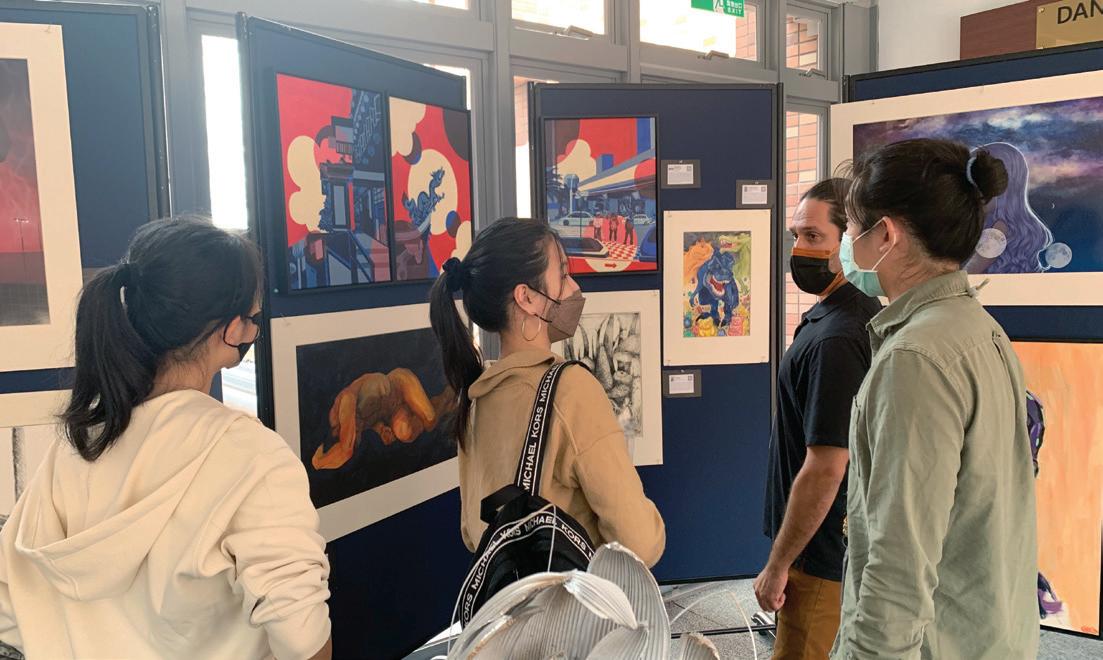
IBSL VISUAL ARTS 2 (UART301)
IBHL VISUAL ARTS 1 (UART31)
IBHL VISUAL ARTS 2 (UART310)
Duration: 2 years
Credit: 1
Grade: 11-12
Prerequisite: 3 semesters of art and teacher recommendation, or IB Diploma candidate
Homework: Heavy
IB Visual Art is a 2-year commitment, which requires endurance, a strong commitment to growth and continual self-improvement, critical awareness, and an eagerness to connect images and ideas. Throughout the course, students develop independent research skills while making a variety of artwork that is personally meaningful and form the basis of a cohesive body of work. Students maintain a process journal that demonstrates cultural understanding, creative problem-solving skills, idea development, and reflections on their artistic successes and failures. In addition, students explore a variety of artist references on which to draw inspiration, as well as to learn how to critically analyze works of art. Artworks will be showcased through a digital portfolio by maintaining a web gallery. At the end of junior year, students will have a number of artworks that can be included in a college portfolio. At the end of the two years, students will showcase a selection of their artwork in the IB Art Exhibition. Students will also enter artwork into competitions such as IASAS Art, and YoungArts. Extra expenses related to this course include: the IB registration fee, matting and presentation costs, and tools or materials beyond what is available in the Art Department.
Required
Duration: 1 year
Credit: 1
Grade: 9
Homework: Light
The co-educational HPE program is designed to provide each student with experiences in fitness, water polo, self defense, health and a variety of team sports. The program emphasizes team concepts and strategies as well as developing and improving fundamental motor skills. Students will develop social and personal responsibilities associated with participation in team sports. They will also learn how to monitor and maintain a healthy level of physical fitness. Health topics include first aid & CPR, human sexuality, current health issues, and nutrition. All health units encourage students to acquire the skills and attitudes that will assist them in managing their lives and relationships in a responsible and healthy manner.
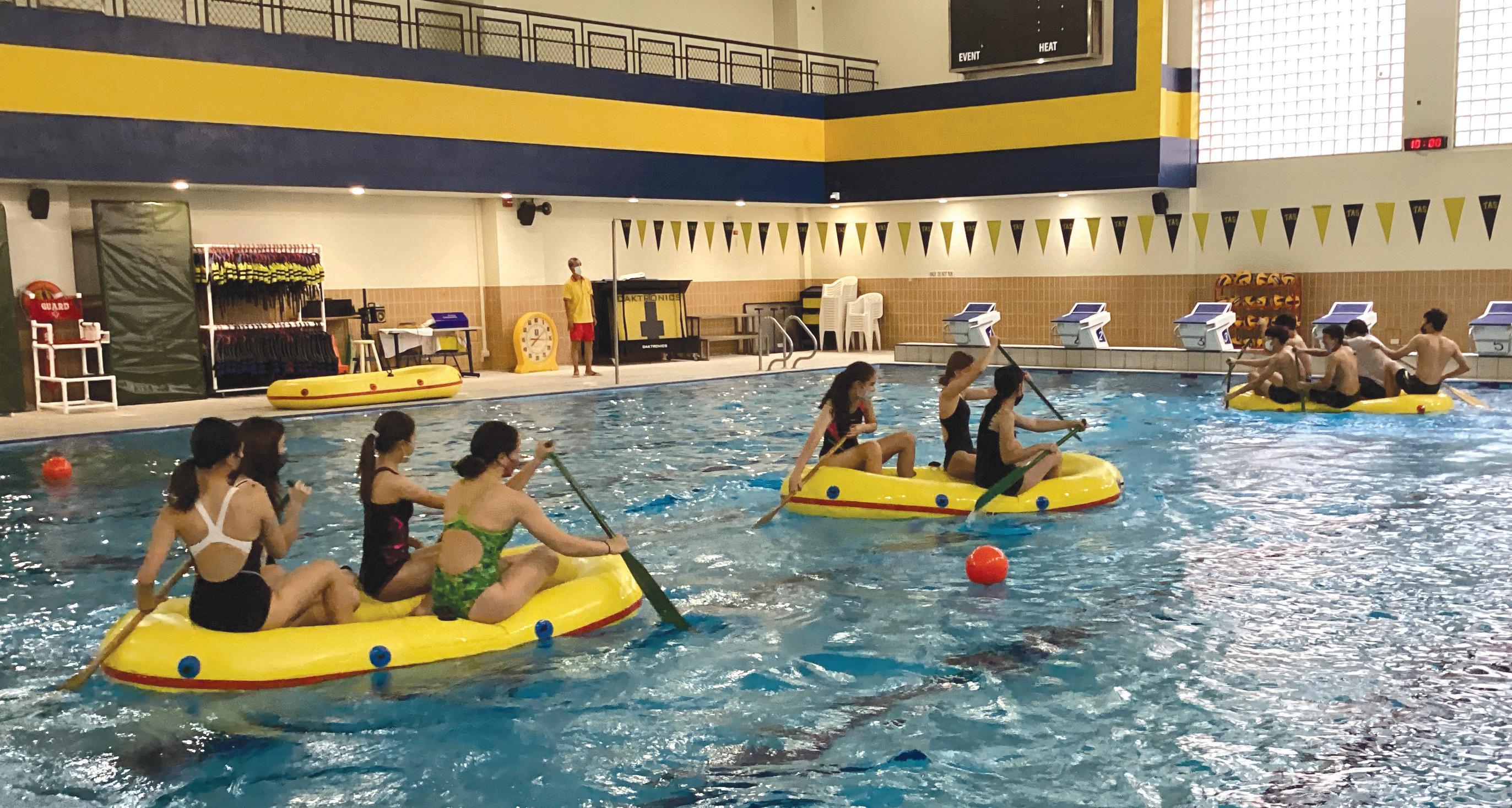
Required: Selection of two courses below
Duration: 1 each semester
Credit: 0.5 each semester, total 1
Grade: 10
Homework: Light
Through the co-educational HPE program, students will learn how to maintain an active and healthy lifestyle through their engagement in their choice, where possible, of a variety of physical activities. All grade 10 students will take a required human sexuality unit within their chosen HPE elective during semester 2.
* The same course can not be taken twice.
This course will be covering an introduction to strength training, ropes course (confidence course) and aquatics. In the confidence course, we will be growing as a group through various team building exercises. We will explore our comfort levels by challenging ourselves with low, medium and high level elements. The course will help us gradually grow our confidence by challenging our comfort levels in a safe space. Students with an extreme fear of heights should consult with a PE teacher. In the aquatics unit, we will be covering boating, kayaking, survival swimming and rescue techniques. We will continue to build on our foundation of fitness that will help us maintain a healthy lifestyle.
This course will be covering introduction to strength training, social dance, Brazilian jiu jitsu, tennis, and social dance. We will gain a better understanding of our body, our comfort levels and ways to challenge ourselves physically and mentally. We want to be comfortable with being uncomfortable within a safe space as this provides us with the opportunity to grow and develop. We will continue to build on our foundation of fitness that will help us maintain a healthy lifestyle.
This course will be an introduction to a variety of recreational sports including Volleyball, Basketball, Pickleball, and Floor Hockey. Students will continue to develop their skills and have ample time to play the above sports with their peers. As with all of our course offerings, fitness will be a component to class and students should expect to sweat during class.
*The above three classes (UHPE02, UHPE03, and UHPE04) are the only classes that can be taken as Sports for Credit.
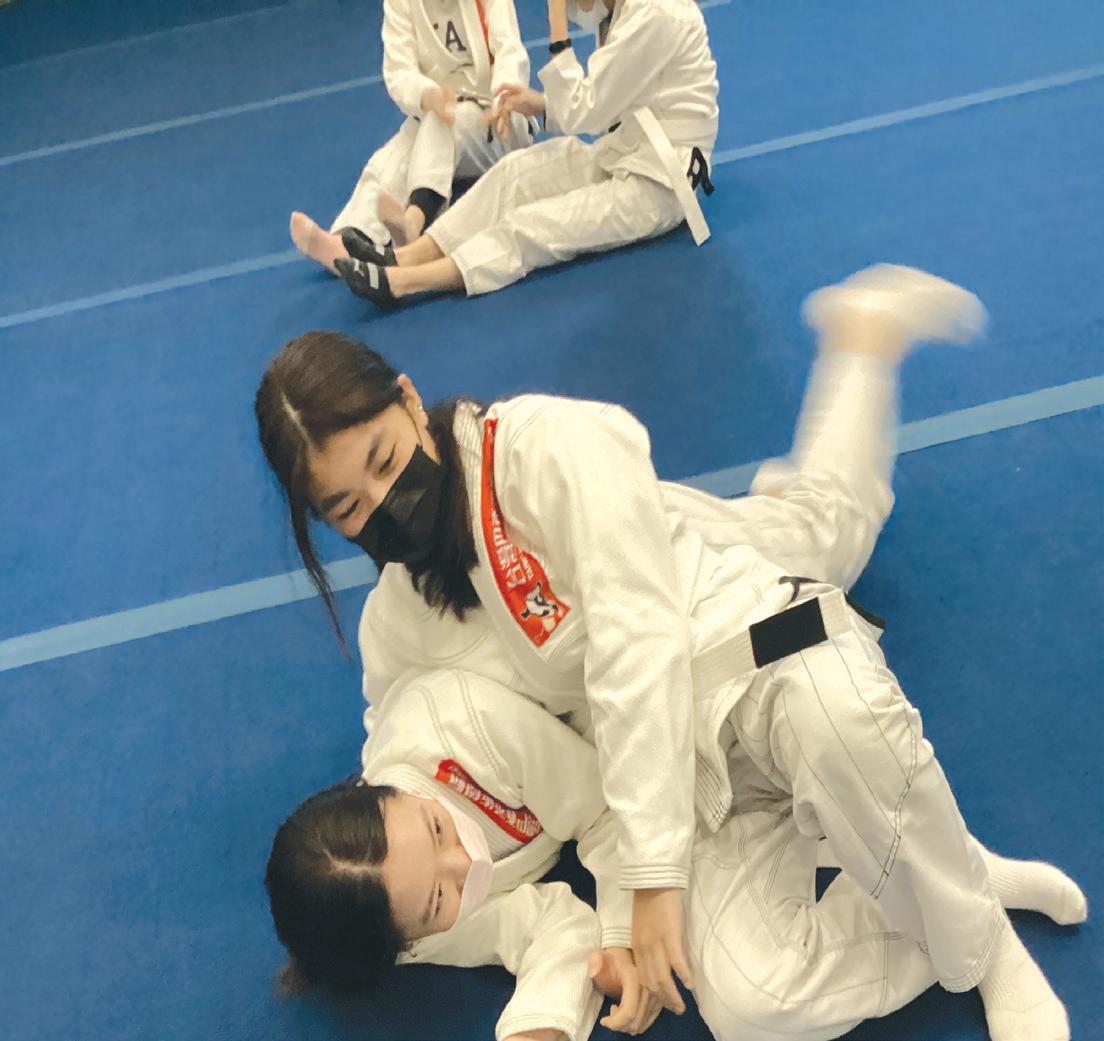
In this course students will learn techniques from various dance styles such as jazz, hip hop, ballet, and theatre dance with an emphasis on modern dance. Students will learn to manipulate space, time, and energy in creating dances. An emphasis will be placed on improving individual levels of fitness.
(Please see Performing and Visual Arts Department for other Dance courses.)

This course is open to students who want to continue to learn about and improve their personal fitness. It is also open to junior/senior transfers who need to fulfill TAS HPE requirements. Students will work towards personal fitness goals, develop a personalized fitness program and develop a greater understanding of the wide range of fitness-related activities in which they can participate. These activities include: weight training, plyometrics, and cardio-respiratory workouts. Students will also develop an awareness of health-related aspects of fitness training such as sports injuries, posture analysis, physiological affects of exercise on the body, and nutrition.
In recognition of the time and effort expended in athletic activity during practices and games, sophomore students who are involved in TAS JV or Varsity Sports teams may choose to use their HPE class time (only UHPE02,03,04) as a free period during the sports season.
Intelligence and skill can only function at the peak of their capacity when the body is healthy and strong.
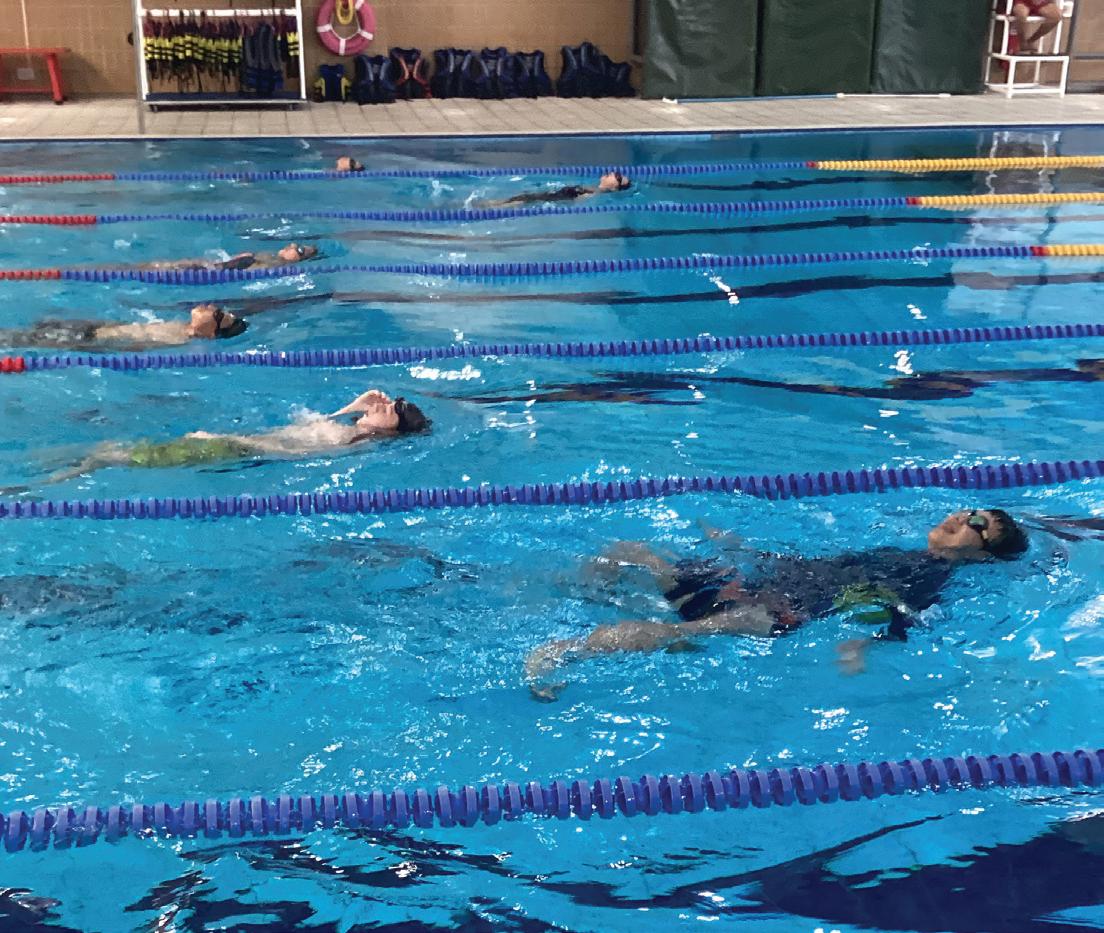
Exercise and recreation are as necessary as reading. I will rather say more necessary, because health is worth more than learning.
Thomas JeffersonPHYSICAL EDUCATION ELECTIVES FOR GRADE 11 & 12
The below courses are available for any 11th or 12th grade student, if space allows.

INDIVIDUAL ACTIVITIES & FITNESS (UHPE03)
RECREATIONAL ACTIVITIES 1 & 2 (UHPE04)
Duration: 1 semester / 1 year
Credit: 0.5 or 1
Grade: 10-12
Homework: None
DANCE/PE (UHPE05)
Duration: 1 semester / 1 year
Credit: 0.5 or 1
Grade: 10-12
Prerequisite: No previous dance experience is required, but a desire to explore a variety of dance forms is necessary
Homework: Light
Duration: 1 semester / 1 year
Credit: 0.5 or 1
Grade: 10-12
Homework: Light
Duration: 1 semester / 1 year
Credit: 0.5 or 1
Grade: 11-12
Prerequisite: Fitness Training (ULSK03)
Homework: Light
This course will take a deeper look into strength and conditioning performance aspects by teaching students how to measure exercise performance parameters and develop exercise prescription. Topics of study will include: assessment of aerobic/anaerobic capacities, modes of strength and conditioning training (i.e. interval, circuit, non-linear, linear training), proper warm-up and cool down practices, program design for muscular strength, power, hypertrophy, and flexibility, as well as sport medicine theory and pre/rehabilitative processes (i.e. pre-screening, risk classification, back to play, etc.)
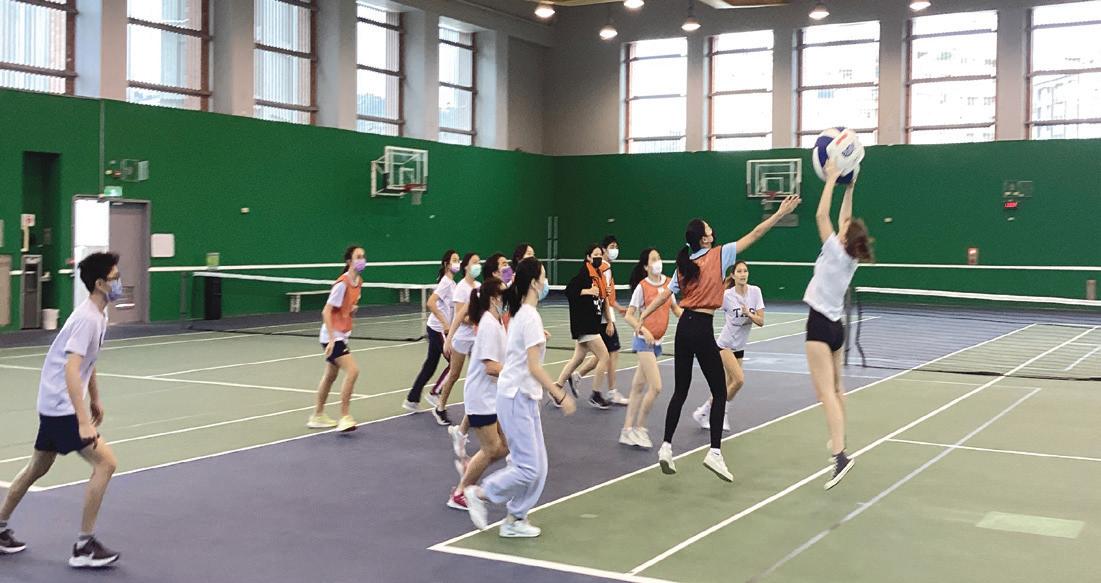
Duration: 1 year
Credit: 1
Grade: 12
Homework: High
The Sport, Exercise and Health Science IB and Honors course is the study of physiological and biochemical responses of the human body to exercise. This course introduces the physiology of exercise with an emphasis on topics in metabolism and muscle physiology. It describes the acute effects of exercise and the influence of chronic exercise training on various functional systems in different populations (age and gender) and under different environmental conditions. Ergogenic and nutritional factors are considered from a physiological perspective.
IB students are required to sit the external IB examination in addition to completing an internal assessment research project that includes a literature review, study design, data collection, data analysis, and results and discussion of your findings.
Honors students will conduct a review of literature in which the subject matter will be narrowly focused on a specific issue in exercise, sport or health science. Students will be able to select from a list of preselected topics or, if approved, a self-selected area of interest.
Duration: 1 semester or 1 year
Credit: None
Grade: 9 - 12
Prerequisite: Student Resources Team (SRT) recommendation only

Homework: None
Academic Support is a highly individualized program that is based on the educational needs of each student. Instruction may be provided in the areas of reading, writing, mathematics, notetaking, test preparation, meta-cognition, planning, and time management. In most cases, parental permission, individualized evaluation and implementation of either an Individualized Learning Plan or an Individualized Accommodation Plan are required for participation in the program. Speech-Language therapy may also be a part of the class in certain cases. (see Speech/Language Therapy Services USSS09)
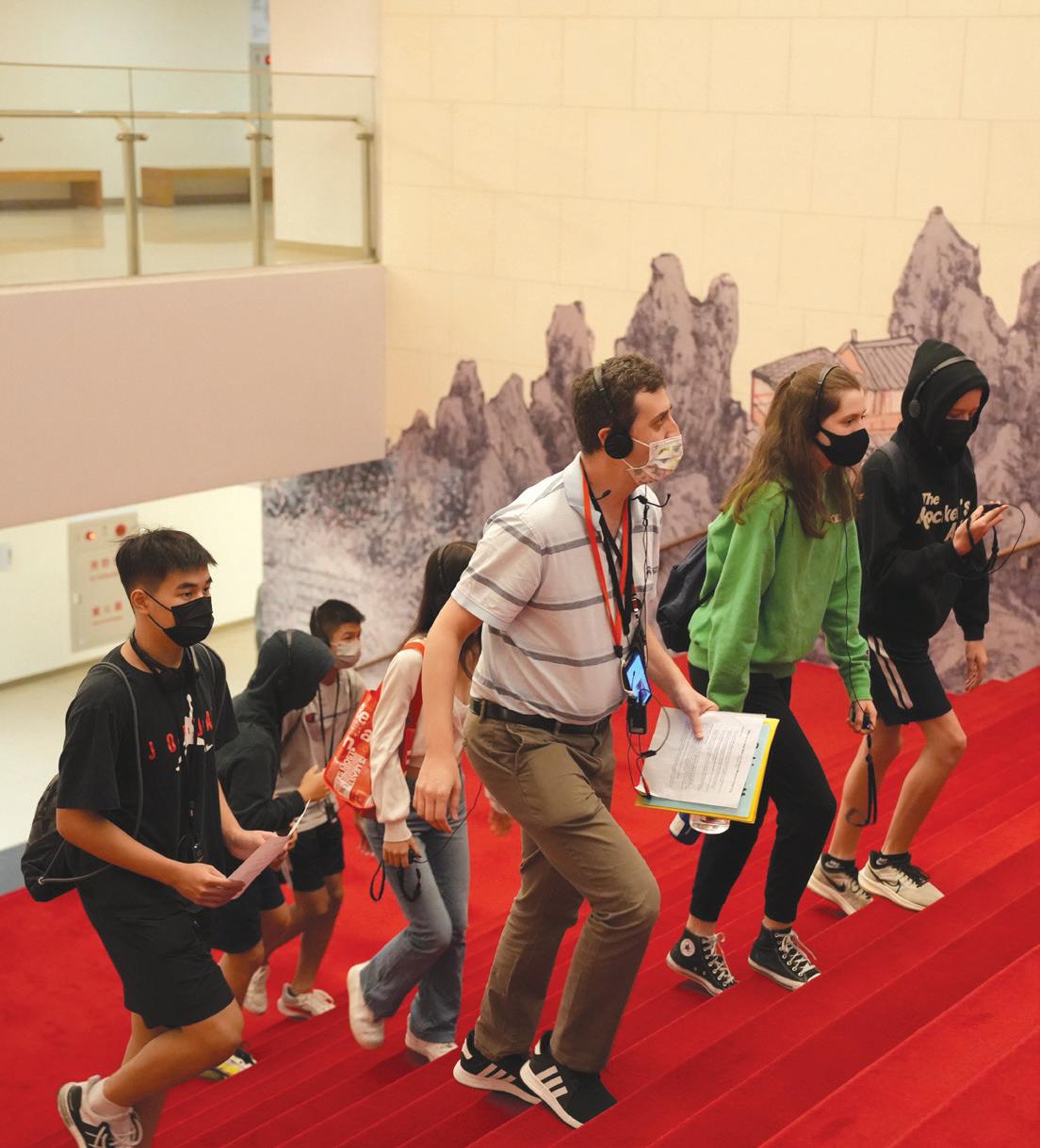
(A component of the Academic Support Class)
Homework: None
Speech-language therapy is an individualized program that supports students’ communication skills. Speech-language therapy can support a student’s speech, spoken language, written language, fluency, voice, or social communication skills. Parental permission, completion of a speechlanguage evaluation, and implementation of an Individualized Learning Plan are required for participation in this course. Interventions are taught by a licensed speech-language pathologist.
Requests for independent study must begin with an agreement between the student and an instructor who is willing to supervise, support, and evaluate the student; they will propose coursework, projects, and homework load.
Upper School students have the option to take courses online through two partner programs: Pamoja and Global Online Academy (GOA). Students interested in pursuing a GOA or Pamoja course should speak with their academic counselor prior to course registration. Additional fees may be associated with taking these courses. Details of these fees will be shared with families before a student registers for a course.
Full IB Diploma Candidates who wish to take a language or social science course that is not offered as part of the diploma program at TAS may choose to do so through the online provider Pamoja. Any student choosing to enroll in a Pamoja course must take an additional free period to provide a time during the school day to complete coursework.
Global Online Academy (GOA) is a consortium of independent and international schools that offer courses online. TAS is a member of the Global Online Academy (GOA), a consortium of independent and international schools that offer courses online. These courses present students with the opportunity to take a wide range of elective subjects and provide them with global connections and modern learning skills. GOA supplements our course catalog for additional learner-centered experiences with peers in different countries. While the workload in GOA courses does vary (roughly 5-6 hours per week), class participation is mandatory, and students are required to do project-based assignments with partners and small groups. The course(s) and credit(s) will, in most cases, appear on the transcript along with the other classes taken at TAS and will be counted towards the GPA. To register for a GOA course, the student will be interviewed by the Site Director to assess if GOA is a good fit and manageable with the student's overall course and co-curricular commitments.
Confucius
Education breeds confidence. Confidence breeds hope. Hope breeds peace.We recommend using this form to make a tentative plan for the student’s four-year academic experience that will fulfill TAS graduation requirements, provide appropriate rigor and challenge, establish a strong record for admission to and success in college, and ensure that appropriate foundation courses are taken to qualify the student to take desired advanced classes.
PERFORMING and VISUAL ARTS 1
ADDITIONAL CLASSES & ELECTIVIES
Courses beyond requirements count as additional courses
CREDITS (EACH YEAR)
CUMULATIVE CREDITS: (22 minimum for TAS Diploma)
Taipei American School’s mission is to cultivate an enduring commitment to learning, personal well-being, and service. We provide a broad Americanbased education with a global perspective that develops students of character who are committed to making the world a better place.
台北美國學校的使命在於培育熱愛學習、
重視身心健康、和服務他人的持續堅持。
我們提供具有全球觀的多元化美式教育,
支持學生健全品格的發展,以及致力讓
世界變得更加美好的熱忱。





